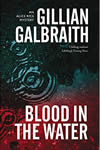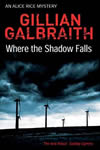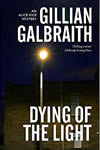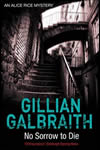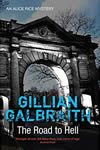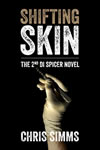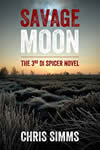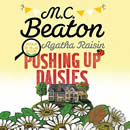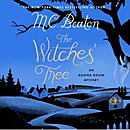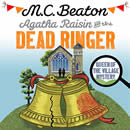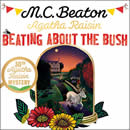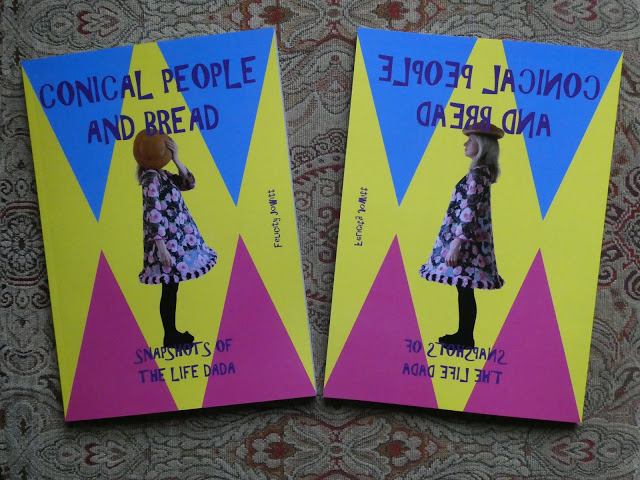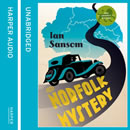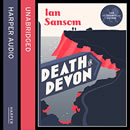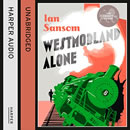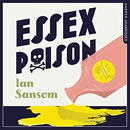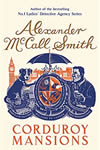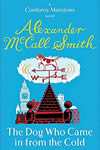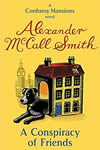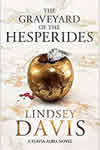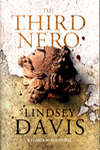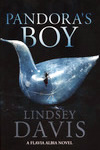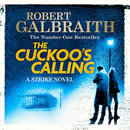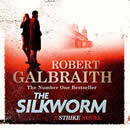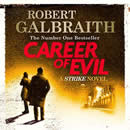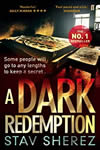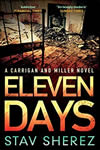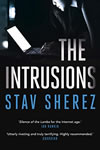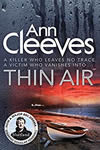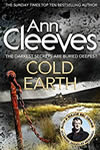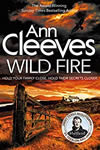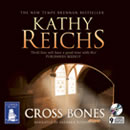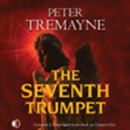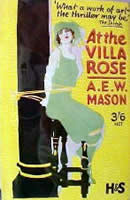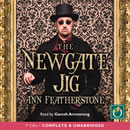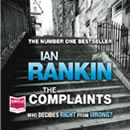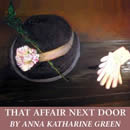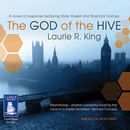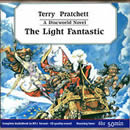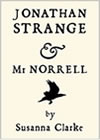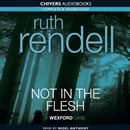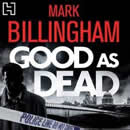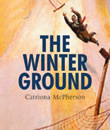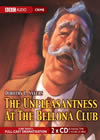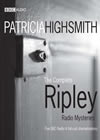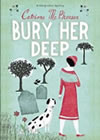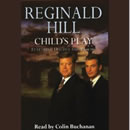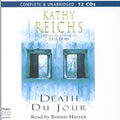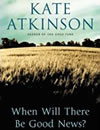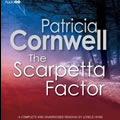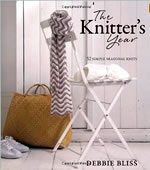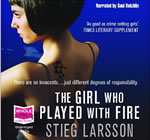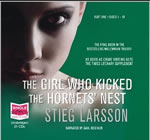Category Entries for Books of the Month
« Previous entry | Main | Next entry »Thursday February 29, 2024
Books in February
- Close to Death by Anthony Horowitz
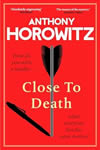
The fifth in the perfectly splendid DI Hawthorne series. In this book, as promised in an interview I heard in 2022, Horowitz (Anthony) varies the style in his role as "Watson" recording the cases of Hawthorne, the "consulting detective".
It seems Anthony has a contractual obligation to the publishers for another book, and since, as he explains to Hawthorne, they can't just wait for another case to turn up, Anthony persuades Hawthorne that he will write about an old case which took place in Richmond in Surrey 5 years previously. However, when it comes to it, they've agreed on a case that proves somewhat unsatisfactory in many respects, not least because Hawthorne seems unwilling to reveal all the relevant information to Anthony. Consequently - despite being warned off by a number of people - Anthony goes off on his own, investigating and re-interviewing witnesses...
Again we are treated to a fictionalised but plausibly real version of Anthony's life with anecdotes and insights into an the art of writing a novel. [Plus an opportunity for him to play with the fiction he has created: "A lot of writers say that their characters talk to them but very few of them mean it literally."].
A sheer delight.
Can't wait for more.
[Again lucky enough to be given a review copy of this novel due to be published in April.] - The Night House by Jo Nesbo
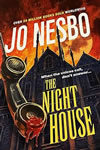
This Jo Nesbo novel was quite a surprise for me (not an unpleasant one). Having only ever read his Harry Hole detective fiction previously, I was expecting a dose of conventional Scandi Noir. I suppose, to be fair it is pretty noir, and given that Jo is Norwegian, it is also Scandi; it is, however, far from conventional.
I remained unsure for most of the novel if the genre were science fiction/fantasy/horror or if we had a case of the unreliable narrator, but whatever I settled on, I was undoubtedly gripped from the opening chapter, and found it hard to put the book down thereafter. With two (or more...) major twists to the plot, and - all important for me - a most satisfactory ending, this is an excellent book. Recommended if you can cope with weird. - The Casebook of Sherlock Holmes by Sir Arthur Conan Doyle [Read by Stephen Fry]
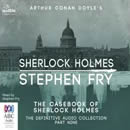
I have read most of the short story collections but notice, from where I left a bookmark in this last volume, I did not read all of them. So I chose to listen to ones that were new to me, and found - a surprise to me - that Doyle varied the form a little, for example, having Holmes write and narrate a story himself without Watson.
Once again Stephen Fry is an excellent narrator.
[Again I downloaded The Casebook of Sherlock Holmes from my local library, as opposed to buying the whole collection from Audible.]
Posted on February 29, 2024 at 9:15 AM | Comments (0) Leave a comment
« Previous entry | Main | Next entry »Wednesday January 31, 2024
Books in January
-
Death in a Lonely Place by Stig Abell
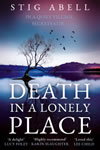
An excellent follow-up to Death Under a Little Sky, having accepted the premise of our hero Jake managing to live off-grid, subsisting only on his small inheritance, and without a "proper" job. Once again, Jake manages to make up for the lack of the latter by embroiling himself in uncovering a major criminal enterprise - albeit not without a considerable amount of help in the shape of a useful (though slightly bordering on criminal) neighbour, ex-colleagues in the police, slightly implausible tech wizards, and Jake's veterinarian girlfriend, Livia. [It could be argued that Livia and her daughter are more of a liability than a help but...].
The plot moves at a good pace and culminates in tense action scenes, with an unexpected twist of an ending. Once again, the descriptions of the English countryside are a delight to read, and provide a peaceful counterpoint to the sinister atmosphere and sense of anxiety which pervade the plot.
I remain less than keen on the allusions to sex in the novel - from reading the author's acknowledgements, I think he should listen to his teenage sons... Less is more. [Don't get me wrong here - there is not "a lot" of sex in the novels - just .... basically, maybe it's not romantic enough...] - The Adventures of Sherlock Holmes by Sir Arthur Conan Doyle [Read by Stephen Fry]
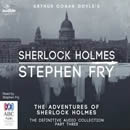
I have read this collection and I'm a huge fan of the Jeremy Brett TV series, so I am well familiar with these stories. However, Stephen Fry is an excellent narrator and I chose some of my favourites to hear again.
I think my overall top story - I admit, based mainly on the TV adaptation - is The Adventure of the Blue Carbuncle. The drama includes a delightful character performance by Frank Middlemass (love him), as well as that slavish attention to detail, where, for example, we see "The Pink 'Un" peeking out of the pocket of the poulterer (a betting man), even though - unlike on the written page - the referencing dialogue has been cut (not vital to the plot). In addition, the TV story is full of Christmas nostalgia, and thus there is more focus on the fate of the wrongly-arrested chimney sweep and his family - Holmes and Watson abandoning their evening meal on Christmas Eve to ensure he is released back to his wife and kids, which they do not do in the original as written. Again I salute the staging of this TV series - the sweep/wife/kids are depicted as a very ordinary working family and they do not attempt to over-glamorise them, (or the reverse!).
[I downloaded The Adventures of Sherlock Holmes from my local library, as opposed to buying the whole collection from Audible.]
Posted on January 31, 2024 at 9:16 AM | Comments (0) Leave a comment
« Previous entry | Main | Next entry »Sunday December 31, 2023
Books in December
- The Janus Stone, The House at Sea's End, and A Room Full of Bones
by Elly Griffiths [Read by Jane McDowell]
Another three installments following the life and times of Dr Ruth Galloway, forensic archaeologist at North Norfolk University. Times have changed for our heroine - she is now the Mother of a little girl, which occupies most of her thoughts and hours either at work or home. Her friendship with Harry continues, engendering not a little gossip and rumour from their colleagues.
Rather like the Kathy Reichs books (although not actually very similar to them in style), all the plots inevitably involve old bones, and murder (ancient and modern):
In The Janus Stone, the bones of a child are found under a modern doorway during a dig prior to refurbishment; in The House at Sea's End, bones are revealed through coastal erosion of what was once a domestic garden; and, in A Room Full of Bones, there is a protest movement to repatriate indigenous ancestor bones removed from their original burial grounds in less enlightened times.
Of these particular stories, I liked The House at Sea's End the best - basically, I'm a sucker for anything involving the word "sea". The mystery dated from WW2 and gave a new perspective on the "Home Guard" - not quite as it was presented in Dad's Army! These days I think it's hard to really remember that these were men trained to protect England as a last stand - the threat of the invasion on that coastline was very real, which is pretty evident even in the TV comedy.
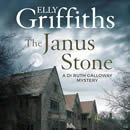
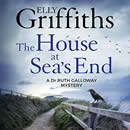
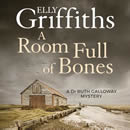
Posted on December 31, 2023 at 3:31 PM | Comments (0) Leave a comment
« Previous entry | Main | Next entry »Thursday November 30, 2023
Books in November
- Queen & Country by Alan Judd [Read by John Telfer ]
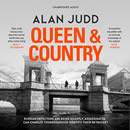
This is a "Charles Thoroughgood novel", though I have not read any of the earlier ones. [I have to admit I was looking for A Fine Madness which was in a 2021 round-up of recommended reading - and which is a "faction" account of the death of Christopher Marlow - but failed to find it in audio book form so...]
Charles is now retired but called in to help the secret service put a stop to mysterious deaths of defectors in the UK. It's an excellent story in the more traditional spy genre providing thrills and interesting espionage capers in foreign lands. Here are the author's own words about it: "My aim was to produce a taut, focussed novel with contemporary reference and a little more physical action than I usually put in - as well as, of course, the underlying ethical questions for Charles which are made clear at the end. It was written during lockdown before - unfortunately - Ukraine.".
In the same interview, the author says he's a friend of Mick Herron with this delightful recommendation: "....a most original and amusing take on the spy genre, nothing to do with reality, of course - as Mick well knows - but that doesn't matter in the least. He writes well, they work, and they're deservedly very popular...". Judd also recommends - as do I - Andrew Taylor's Ashes of London series "... of espionage novels in that turbulent but (nowadays) curiously neglected period of English history...". - The Crossing Places by Elly Griffiths [Read by Jane McDowell]
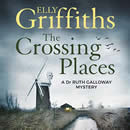
This is the first in an excellent series of mystery novels featuring Dr Ruth Galloway, a forensic archaeologist teaching at the University of North Norfolk. It was written in 2009, and the author has recently rounded off the stories after a total of 15 novels.
The plot is intriguing with our heroine demonstrating her high degree of professional skill in identifying some long-buried bones - and ending in a suitably high degree of jeopardy for a thrilling climax on the wild and inhospitable salt marshes of the area.
The characters are well-described, and the books have attracted a considerable fan base who are all invested in the outcome of Ruth's love life and her stop/start relationship with the local police inspector. That aspect is reminiscent of Andrew Taylor's Lydmouth stories, though Ruth and Harry do not develop their rather back to front relationship in quite the same way.
Rob was completely fascinated by the description of the local (non-fictional) archeology; he looked up all the info about the "Crossing Place" - Seahenge on Holme Beach - (and then went on to consume the entire series).
In the authors own words again: "[her husband] mentioned that prehistoric man had thought that marshland was sacred. Because it's neither land nor sea, but something in-between, they saw it as a kind of bridge to the afterlife. Neither land nor sea, neither life nor death. As he said these words the entire plot of The Crossing Places appeared, full formed, in my head."
- The Man Who Didn't Burn by Ian Moore
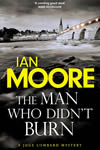
This is an excellent mystery story, set in the Loire valley, but with a less than picturesque murder to deal with. Juge d'instruction Matthieu Lombard is (in the way of policemen with tortured souls) still suffering acute depression after the death of his wife, but is called in from "sick leave" to apply his unique skills - or more cynically to act as a useful scapegoat. Despite the usual antagonistic figures in authority over him, he manages to pull himself together, uncover all the local secrets and solve the case.
The author lives in the Loire valley and is thus able to offer convincing insights into a local community as well as the French Judicial system. In addition to his writing, Moore currently runs a B&B - his previous novels have been more lighthearted and comedic (about a middle-aged man who runs a B&B in the Loire Valley...).
I can't help but draw - positive - comparisons with Peter May's series, set in France, with a mystery-solving university professor of Scottish/Italian descent. If you miss Enzo as much as I do, you will certainly enjoy this book. - The Rising Tide by Ann Cleeves [Read by Janine Birkett]
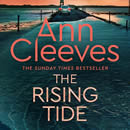
Ann Cleeves has an admitted fascination with islands and closed communities and this is another great mystery story based around that format. In this case, the murder takes place during a school friends' reunion on an island, which can only be reached by a causeway at low tide. So as with many of her stories this is effectively a "locked room" mystery; yet she always executes them with such skill, that the killer is revealed without the need for any Poirot-style plot distortions or rabbits out of a hat. I rarely, if ever, guess the outcome, (in this case a very sad outcome in many ways), but all the evidence is always there for the reader. I refer again to the apparent simplicity at the end of "The Darkest Evening" where the killer says "how did you know it was me?" to which Vera replies "who else could it have been, pet?".
I have to say, I do like the fact that a lot of her books feature older or even retired people with a lot of life history and depth of character; speaking as one who may be stereotypically aged, they did not seem "stereotypically ageist" to me (as one reviewer complained). Of all her characters, I particularly like Vera Stanhope, who (unlike her TV persona*) is really fascinating, and never over-explained - you always want to know more, and there is always a lot more to know.
* To be fair, her books are so rich in detail that, in a TV drama, they barely have the time to get through the plot never mind focussing on the characters. - The Christmas Appeal by Janice Hallett
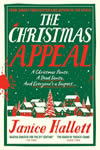
The Fairway Players have moved on from the dramatic events described in The Appeal, and all their energies are now focussed on pantomime season and "Jack and the Beanstalk". For anyone who has taken part in local voluntary organisations, or on local committees, these novels (this one and The Appeal) will prove particularly hilarious. The character foibles, snobbery, and petty politics are all splendidly displayed in emails, text messages, and postings on social networks.
Anyone enamoured of the classic round-robin Christmas letter will curl up in delight at the perfect pastiche provided in the opening chapters; if you have already read The Appeal, you will appreciate the stretching of the truth behind the descriptions of the fantastic year the writers have had - but if not, it is all beautifully revealed by the recipients scathing reactions in their emails to one another.
This is an obvious stocking filler for Christmas, but also a lovely follow-on revisiting the characters we met in the Appeal.
[Though I did rather miss Issy, who does appear but only rather briefly].
As an aside - I have read these books on paper, and as an ebook, and I do think I prefer the traditional paper format. I also listened to The Appeal as an audio book, where I can only congratulate the publishers in doing an excellent job of distinguishing all the different media types (particularly post-it notes!) in audio form.
- Overboard by Sara Paretsky [read by Liza Ross]
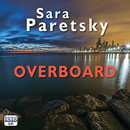
It is a bit of a cliche that fictional dead bodies are discovered by dog-walkers - probably based in reality as, out of necessity, they are often out early in green spaces - and dogs do like a good mystery...
So our story begins mundanely enough with VI exercising her dogs, who immediately, and irritatingly, rush off to find the inevitable dead body - but no - wait - they have actually found an injured young woman wedged awkwardly between rocks on Lake Michigan. The authorities are duly informed, and after a great deal of difficulty (and a lot of red tape issues for VI) the girl is taken to hospital. She seems unable to provide her identity and, somewhat mysteriously, her injuries seem to include burns...
When the girl subsequently absconds from the hospital, and then VI herself appears to be being pursued by threatening individuals, (among others, the more dubious members of her own family, and even some members of the police), she feels bound to investigate.
This is another case of family greed, and coercion, including corruption in high places and real estate fraud. Good thing we have VI to sort it all out.... - Call the Dying, Death's Own Door, and Naked to the Hangman
by Andrew Taylor [Read by Philip Franks]
As ever, the murder mystery plots in these last three books are as excellent and sharply written as ever, and I will not describe the plots in any detail. However, looking back at these last three books, I realise I have been drawn much more into the social dramas of Lydmouth, and my interest in the characters (if it were not already quickened) has deepened. The characters have become far more three-dimensional than they were at first.
We were always privilege to Jill and Richard emotions and dilemmas, but over the series, the other more peripheral characters have become more fully rounded. I particularly liked the development of Richard's wife, who started out as an almost cardboard cut-out figure seen mostly through the eyes of her husband. We did experience her confusion over the emotional stalemate in her marriage, but mostly she existed only as a foil to demonstrate the difficulty of Richard's position and his increasingly conflicting emotions. By the fifth book we are made aware that Edith is no only an interesting and attractive woman in her own right, but that she has her own choices to make in life, with options other than to remain as an unappreciated fifties housewife and mother.
As to Richard and Jill - we move beyond the romance and yearning of unrealised passion, but in doing so the tawdry reality of an extra-marital affair is exposed. When Edith announces she is having a third child, a number of factors coincide, and Jill moves back to London - despite promises to the contrary, contact with Richard is broken. However, (of course), a year later or so, Jill is called back to act as editor of the Gazette, while her friends Charlotte and erstwhile editor Philip (who is the victim of a stroke) have their own stressed circumstances to contend with. Here we see another aspect of the post-war decline of the upper middle-classes in the shape of Charlotte, with her dwindling resources and social influence as a business woman in the community.
In the final book, we see a very different side to Richard. He served as a policeman in Palestine at the end of the forties, and his past has come back to haunt him; he is threatened, blackmailed, and finally suspected of murder. Previously solid and dependable, he is unable to defend himself, and becomes hopelessly withdrawn and distressed. Edith and Jill are forced into an uneasy alliance to help him overcome what is effectively a mental breakdown.
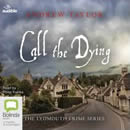
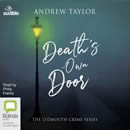
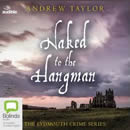
Posted on November 30, 2023 at 3:29 PM | Comments (0) Leave a comment
« Previous entry | Main | Next entry »Tuesday October 31, 2023
Books in October
Posted on October 31, 2023 at 12:11 PM | Comments (0) Leave a comment
« Previous entry | Main | Next entry »Saturday September 30, 2023
Books in September
Posted on September 30, 2023 at 3:53 PM | Comments (0) Leave a comment
« Previous entry | Main | Next entry »Thursday August 31, 2023
Books in August
-
You'd Look Better as a Ghost by Joanna Wallace
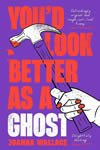
I was immediately grabbed this story from the first chapter, even though I am generally not so keen on the kind of psychological thriller where you know who dunnit at the outset. And initially it seemed clear that this was that kind of book. However, it soon developed into another kind of mystery altogether with a skillfully layered plot, and splendid characterisations.
Our heroine is Claire, (a deeply disturbed individual), whose murderous actions alongside her unfiltered critical observations of those around her provide the darkly comic elements of the book. We see many sides of Claire, including the poignantly awful memories of her mother, delivered in the form of "stories" she wrote as a child, and her fierce loyalty to her Father (who to be blunt should have had her sectioned at an early age but....). Claire directs her violence towards those she feels deserve it - those whom she "sees as ghosts" before they die; unfortunately, the shortcomings of her justice system are obvious when there seem to be a few extra corpses evident as collateral damage along the way. Despite all this, we are all rooting for Claire with her warped sense of morality; she is rather comparable to Highsmith's Ripley, or (as others have observed) Jennings' Villanelle. -
A Death in the Parish by Richard Coles [Read by Richard Coles]
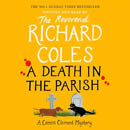 Another solid offering from our favourite Reverend.
Another solid offering from our favourite Reverend.
As I predicted he is already having trouble with one too many corpses "after all that dreadful business last year"; so again I wonder how he'll manage with the next book - unless Canon Clement moves parishes. Still, I'm getting ahead of myself.
In this story Daniel has acquired an assistant Chris, who is a born-again Evangelist who sees the world in black and white; he does not see it as his duty to, for example, visit the sick if they don't really accept Christ as their saviour - no point as they simply cannot then be saved, and will have to take the consequences. This is contrary to Daniel's take on his ministry where he is not only a committed Christian but also a kind and gentle social worker. This leads to interesting theological wrangles between the two, which I very much enjoyed reading, plus the dose of parish and Anglican politics, and church rituals, all described with the author's undeniable intelligence, wit, and good humour. I liked the mystery though I did pretty well guess the murderer immediately - maybe that was intentional - and the surprise deflating of Daniel's hopes in love brought a tear to the eye.
I've read a number of - mostly minor - criticisms from other readers which in the main do not apply for me. I think you get what you expect from these books - although I do agree with one reader who said that a subsequent book in a series should not reveal all about plot and murderer in previous books!
No - my only criticism - and it's a serious one in my opinion - relates to the audio book specifically. Coles chooses to read these books himself - I guess he feels as a broadcaster and entertainer that he's qualified to do so. However to put it bluntly he may read well but he does not read well enough. Sometimes I like an author reading their own work - they know how they wanted it to sound - but that is not the case here. An actor's delivery would be far preferable - narrating a book is a specialised skill - they do not act out every scene but almost imperceptibly (actually sometimes quite overtly) alter their voices according to who's speaking, and this is vital as Coles writes a lot of unattributed dialogue, which would be obvious on the page, but is not when read out. I enjoyed the heated discussions between Chris and Daniel, but they would have been much more comprehensible if I'd known which of them were speaking.
I've said before that I am often surprised at how much the narrator can make or break a book - and Richard does not break it, but he does not add to it. So.... for goodness sake, Richard, employ an actor. -
The Bullet that Missed by Richard Osman [Read by Fiona Shaw]
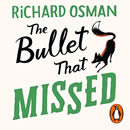 There are several threads to this story: the Murder Club's usual cold case - the disappearance of a journalist investigating a fraud case; the death of a prison inmate imprisoned for said fraud case; and a blackmail attempt on Elizabeth who is required to kill a retired KGB agent. I would say that Richard has strayed into a rather less feasible plot line here - but that would be rather silly given the premise of a bunch of people in an old folks home creating a Thursday Murder Club. What I mean is that he is following in the (gigantic) footsteps of Agatha Christie, having staged murder plots that would be hard, or at best chancy, to succeed in carrying out in real life...
There are several threads to this story: the Murder Club's usual cold case - the disappearance of a journalist investigating a fraud case; the death of a prison inmate imprisoned for said fraud case; and a blackmail attempt on Elizabeth who is required to kill a retired KGB agent. I would say that Richard has strayed into a rather less feasible plot line here - but that would be rather silly given the premise of a bunch of people in an old folks home creating a Thursday Murder Club. What I mean is that he is following in the (gigantic) footsteps of Agatha Christie, having staged murder plots that would be hard, or at best chancy, to succeed in carrying out in real life...
But it's all good clean gruesome fun.
I missed Lesley Manville as the narrator but Fiona Shaw did an excellent job. Not sure if the two do actually have similar speaking voices, but their choice of delivery in tone and cadence are comfortably similar in these books. - The Lover of the Grave, The Suffocating Night, and Where Roses Fade
by Andrew Taylor [Read by Philip Franks]
Another excellent set of mysteries, with the backdrop of the soap opera which is Richard and Jill's relationship.- A man is found at the "hanging tree" on a freezing winter night - an apparent suicide but with many obvious and unanswered questions. DI Richard Thornhill gets into difficulties while revisiting the area on the outskirts of a village near Lydmouth; he is rescued from potential hypothermia by Jill Francis who, luckily enough, is also investigating the scene as a journalist. Jill delivers Richard back to his wife Edith at home where she is able to properly revive him.
- An unscrupulous freelance reporter is found murdered at the Bathurst Arms. He was representing himself as sympathetic to a group of squatters being evicted from a nearby military camp when in fact he planned quite a different slant to his story, so initially his demise was linked to that. However, developments in the three-year old case of a missing girl make the picture altogether more complex. Meanwhile Richard and Jill finally acknowledge their feelings for one another.
- The double standards of attitudes to sexual activity during the 1950s is thoroughly scrutinized here. Violet is struggling to care for her new baby, Grace, while having to deal with the cruel attitude of her disapproving father. When Vi's "good time girl" best friend Mattie Harris is found dead floating the river, quite a number of Lydmouth's most prominent citizens seem anxious have it deemed an accident. ..... and Jill and Richard finally give in to their passion for each other.
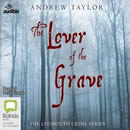
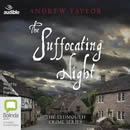
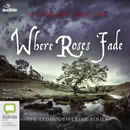
Posted on August 31, 2023 at 10:24 AM | Comments (0) Leave a comment
« Previous entry | Main | Next entry »Monday July 31, 2023
Books in July
- The Mortal Sickness by Andrew Taylor [read by Philip Franks]
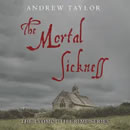 As I said last year I was so enamoured of the first Lydmouth book that I immediately wanted to move on to the second, but decided to wait until the summer as that's the season in which this is set.
As I said last year I was so enamoured of the first Lydmouth book that I immediately wanted to move on to the second, but decided to wait until the summer as that's the season in which this is set.
So - at the height of summer, we see Jill Francis herself actually discovering a body in the church, which naturally brings her back into contact with police detective Richard Thornhill. As well as the murder of an apparently uninteresting woman, a valuable church artifact has gone missing, which seems unlikely to have been a straight forward robbery as it's too famous to sell. Despite the sunshine, there is still the gloomy veil of the post-war era enveloping Lydmouth, and we get to understand more about Thornhill's and Jill's (separate) home lives, as each starts to acknowledge his underlying feelings about the other.
For her part, Jill has outstayed her welcome with Charlotte and Philip, and is relieved to find an ally in the vicar's wife, who is able to offer her a cottage to rent. -
A Heart Full of Headstones by Ian Rankin [Read by James Macpherson]
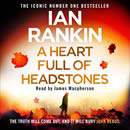 Past cases of police corruption are being investigated after one corrupt cop threatens to tell all - and then mysteriously disappears. Siobhan Clarke is the unwilling investigator in a case where all roads lead to Rebus. Working against Rebus are many who have an axe to grind, and would like to see him finally brought to book - or at the very least "go down with them".
Past cases of police corruption are being investigated after one corrupt cop threatens to tell all - and then mysteriously disappears. Siobhan Clarke is the unwilling investigator in a case where all roads lead to Rebus. Working against Rebus are many who have an axe to grind, and would like to see him finally brought to book - or at the very least "go down with them".
The story starts and ends with Rebus, unwell and in the dock (literally), facing charges that could put him in prison for the rest of his life. So we end on a cliff-hanger. I can't believe the next book will see Siobhan as a prison visitor, and Rebus solving crimes from his cell - but then Rankin is an inventive author - always full of surprises.
While I salute Rankin for avoiding turning Rebus, Siobhan, and Malcolm Fox into a cosy gang, the result is that I do find it hard to keep any clear or consistent picture of each of them in my head. The one thing that emerges is that none of the three is a team player - all very much lone wolves. Rebus and Siobhan did seem to have an underlying loyal friendship, but looking back, it was always based on their chain of command, with Rebus being the "boss". Over time, Siobhan has become more cynical of his continual and undisguised exploitation of their friendship. And neither of them seem able to accept or trust Malcolm - who I always felt was one of the "Good Guys". I know in real life, people are never one-dimensionally uncomplicated, but I think friendship transcends that - especially if you accept the fact that "there is never anything so bad that your friend won't do it to you". -
The Royal Secret by Andrew Taylor [Read by Leighton Pugh]
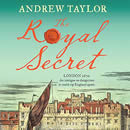 I'm listening to this book out of sequence, as I read the subsequent one last February. Our two protagonists have developed their friendship as companions, with visits to musical evenings and the theatre. However, a small rift occurs due to a social misunderstanding at one such event, leading to misdirected jealousies. So they cease to see quite so much of each other, and the plot follows each of their separate paths - which of course inevitably end up crossing at regular intervals.
I'm listening to this book out of sequence, as I read the subsequent one last February. Our two protagonists have developed their friendship as companions, with visits to musical evenings and the theatre. However, a small rift occurs due to a social misunderstanding at one such event, leading to misdirected jealousies. So they cease to see quite so much of each other, and the plot follows each of their separate paths - which of course inevitably end up crossing at regular intervals.
The secret of the title is based on communications between Charles II and his sister at the court of Louis XIV, and which led to the Treaty of Dover. As well as the official treaty, offering English military support to France, there was a secret element which stated that Charles would (in exchange for money) convert to the Roman Catholic Church "at some future date", and return England to Catholicism. Needless to say this was never enacted, and only became public a century later.
The book covers interesting details about the 17th century fashion for gentlemen of substance to keep exotic animals - in this case a lion - with clearly no idea of how they should be looked after. [Poor lion...]
I note there had been a menagerie at the Tower of London from medieval times, with animal welfare seemingly reaching an all-time low in the 1700s. Although welfare improved through the next century, a few accidents finally confirmed the impracticality of humanely keeping wild beasts there, and in the 1830s the animals were removed to the new London Zoo at Regent's Park.
Posted on July 31, 2023 at 2:47 PM | Comments (0) Leave a comment
« Previous entry | Main | Next entry »Friday June 30, 2023
Books in June
-
Grave Expectations by Alice Bell
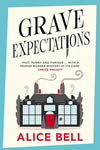
I loved this light-hearted mystery thriller.
Though serious enough, especially in some of the less prominent descriptions of living on the breadline, it has comic overtones (I note some describe as "hilarious") populated by a delightful set of characters. True, a certain amount of suspension of disbelief is definitely required, and some of the peripheral characters may be considered slightly two dimensional but this is outweighed by the overall enjoyable nature of the story.
Personally I loved the fact that, as well as London, the book is set in Brighton - a town (or city as it is now) very dear to my heart, and a highly suitable backdrop for a misfit group of would-be sleuths. The main protagonist Claire is flawed personality but very appealing, who earns a meagre living as a medium - and is thus regarded generally as a charlatan. During a one-off engagement at a country house, she teams up with a few members of the - mainly sceptical - family, to investigate a death. And, no, it's not as simple as asking a ghost what happened, though you would think....
By the end of the book our heroes have (along with Claire's "spirit guide") firmly developed into a "gang" and I confidently hope and expect we will see more of them in future books. - The Angel's Mark, The Serpent's Mark:, The Saracen's Mark, and The Heretic's Mark
by S.W. Perry [read by Kris Dyer]
Once again - no doubt attracted by the medieval illustration on the book cover (reminiscent of the SJ Parris books) I decided to try the Jackdaw Mysteries albeit with very low expectations - I think having been so scarred by E M Powell's "Stanton and Barling" books, I am permanently suspicious of book blurbs saying things like: "would appeal to fans of the Shardlake novels".
Anyway - enough negativity. These books are brilliant. The historical detail is a delight, and the mysteries are excellent. Everything a fan of the Shardlake series would want (assuming they can't have any more by Sansom).
As an aside - I live close to Nonsuch (which features in the books) and was driven to look up its history, as well as looking at maps, old and new.. Nothing left of the palace now, of course - except the name, which is still much used: eg for the park, school, and various local social groups.
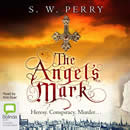
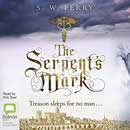
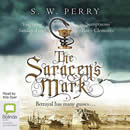
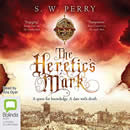
Posted on June 30, 2023 at 3:25 PM
« Previous entry | Main | Next entry »Wednesday May 31, 2023
Books in May
- The Detective by Ajay Chowdhury
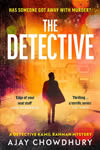 Another excellent mystery plot from Ajay Chowdhury, investigated by Kamil with his diverse set of friends. Happily for me, Kamil is now where I feel he belongs... that is: in the police force, rather than operating as a talented hanger-on. Some other readers found his swift acceleration through the Met a bit implausible, but I found I could accept it better than the Famous Five type of investigations that preceded it.
The story line itself is very topical, involving a kind of advanced (and as written: fantasy - but who knows?) recognition software; however the twist is that this software is combined with what I will term "AI" giving it some rudimentary, but nonetheless sinister, deductive and predictive abilities - shades of "The Capture" combined with "Minority Report".
I am warming to Kamil and his friends, though the cast of suspects were pretty unappealing, such that it didn't really matter to me which of them dunnit! What held most appeal for me personally was the sub plot, where Anjoli takes it upon herself to find out the identity of three historical bodies found near the site of the modern day killing. I won't say how she does this (much luck and co-incidence of course - but that's what stories are all about, after all), but naturally the AI software has some part to play, and the result of her efforts has an unexpected link the live investigation.
Looking forward to Kamil's next outing...
Another excellent mystery plot from Ajay Chowdhury, investigated by Kamil with his diverse set of friends. Happily for me, Kamil is now where I feel he belongs... that is: in the police force, rather than operating as a talented hanger-on. Some other readers found his swift acceleration through the Met a bit implausible, but I found I could accept it better than the Famous Five type of investigations that preceded it.
The story line itself is very topical, involving a kind of advanced (and as written: fantasy - but who knows?) recognition software; however the twist is that this software is combined with what I will term "AI" giving it some rudimentary, but nonetheless sinister, deductive and predictive abilities - shades of "The Capture" combined with "Minority Report".
I am warming to Kamil and his friends, though the cast of suspects were pretty unappealing, such that it didn't really matter to me which of them dunnit! What held most appeal for me personally was the sub plot, where Anjoli takes it upon herself to find out the identity of three historical bodies found near the site of the modern day killing. I won't say how she does this (much luck and co-incidence of course - but that's what stories are all about, after all), but naturally the AI software has some part to play, and the result of her efforts has an unexpected link the live investigation.
Looking forward to Kamil's next outing...
- The Unexpected Return of Josephine Fox, Treachery at Hursley Park House, and
A Conflict of Interests by Claire Gradidge [Read by Lucy Price-Lewis]
I stumbled across Treachery at Hursley Park House in the local library on the "hot to trot" shelves - and it was irresistible due only to the title. My erstwhile employer runs their research labs there, so I'm pretty familiar with the building, and found it amazing that someone had actually written a mystery series set there. I'd not heard of it before, and had expectations of its being pulp detective fiction. Well! how arrogant am I? It's an outstanding series, and definitely plays to my taste in the genre. I quickly moved on to read the third in the series then went back and listened to the first.- The action starts in 1941, when (illegitimate) Jo Fox returns to her home town of Romsey, searching for her father. She is disconcerted to re-encounter an old school friend, Bram, - now a local solicitor and coroner - because she had last seen him during a brief impetuous romantic interlude while sheltering from an air raid in London. They are drawn together to investigate the death of a young girl whose body was wrongly included with others killed in an explosion at the local pub.
- In 1942, Jo is is seconded to Hursley House with a code name and a mission to uncover the network responsible for information leaks to the enemy.
- By 1944, Jo is back working in the coroner's office in Romsey when Bram is hospitalised with an infection caused by his severe wounds from WW1. Added to this her estranged husband reappears in her life, and after her initial relief when he disappears again, she is distressed to find he is somehow involved when a burning car is discovered with a body inside.
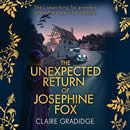
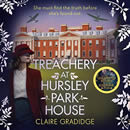
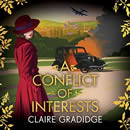
- The Windsor Knot, A Three Dog Problem, and Murder Most Royal
by S J Bennett [Read by Samantha Bond]
Somewhat against my better judgement, I listened to the next two books in the "Queen Elizabeth Investigates" series. They are well-written and fun to listen to - but seem somehow disrespectful now that both Her Majesty and Prince Philip are no longer with us - not sure why - just a personal reaction.
I see there is now a fourth in the series A Death in Diamonds where the action is moved back in time to 1957 - which I imagine makes things somewhat easier for both writer and reader.
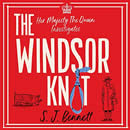
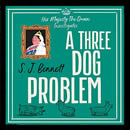
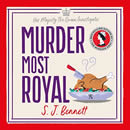
Posted on May 31, 2023 at 2:56 PM
« Previous entry | Main | Next entry »Sunday April 30, 2023
Books in April
-
Death Under a Little Sky by Stig Abell
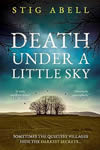
I enjoyed this book a great deal. It's a debut crime novel, but Stig Abell, as a journalist, is already an experienced and proven skilled writer. Thus it's no surprise that the story is well-plotted, and progresses at a good pace. I found the premise of the book a bit of a stretch - almost a dream scenario of inheriting a property with a small income attached - but the lifestyle is painted very realistically. The property is somewhat remote, and lacks 21st century home comforts, being essentially "off-grid". This in turn is a good plot device enabling the author to create a backdrop harking back to the Golden Age of detective fiction - a world where communication is not a trivial matter, and help cannot be summoned at the touch of a button. That said, looking to future novels in the series, I'm not sure how long Jake can realistically remain without any means of communication at all; despite embracing the back-to nature existence and the lack of network coverage, he did have the means to charge a mobile phone (though he never seemed to do so!).
One thing I did not enjoy quite so much was the descriptions of the relationship as it developed between Jake and Livia. In particular, I was not convinced by Livia's attitude to their sexual encounters, which seemed to be a direct translation of male attitudes and unconvincing words put into a female's mouth. This may be due to my age or gender, (or both) but I think more subtlety was required. At the same time, exploring men's attitudes and lust for attractive young women - especially including Jake's own reactions - added an excellent perspective on, and dimension to, the plot. However, (and this was surprising for me since I am a plot-driven reader rather than appreciating beautiful prose), it is the glorious descriptions of the environment that captivated me most in this book. Because of the situation into which Abell has put his protagonist, the wonderful descriptions of the very English woods and countryside took me straight back to the childhood experience of emerging from an ex-army canvas tent at 6am to the sound of a wood pigeon, and with the prospect of a wash in clean but cold water... (Girl Guides circa 1967....).
Apparently this is the first of a potential series, so I am looking forward to finding out how Jake progresses. - To Die but Once, The American Agent, The Consequences of Fear, and A Sunlit Weapon
by Jacqueline Winspear [read by Julie Teal]
I had a rather solid catch-up on Winspear's books this month, and managed to get her through 1940 towards the end of 1942. There's a lot going on in Maisie's life - she is finally finding herself with feelings of love towards her American friend, Mark, as well as setting out to adopt an orphan evacuee (which is complex since she would be a "single Mother" and this does not fit with the social mores of the time).
As usual, historical themes and politics are addressed in each book:
An apprentice lad working on a 'hush-hush' government contract turns up dead - but is the camouflage paint they have been working with altogether safe?.
An American correspondent reporting on the war in Europe, is found murdered in her London digs, but news of her death is concealed by British authorities. The importance of wartime propaganda aimed at drawing the Americans into the war cannot be compromised.
A message runner for a government office, witnesses an argument that ends in murder. Maisie thinks she spots the killer in a Special Operations training facility.... but he is engaged in vital war work, and the authorities seem unwilling to investgate.
A female ferry pilot, is delivering a Spitfire when she has the unnerving experience of someone shooting at her aircraft. A few days later, another ferry pilot is shot down and killed. Maisie wants to find out why someone appears to want to take down much needed pilots, but as her investigations progress she is drawn into an obvious case of prejudice against a black American serviceman, as well as facing similar issues at the school attended by her newly adopted daughter.
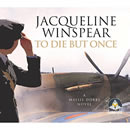
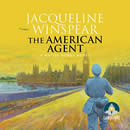
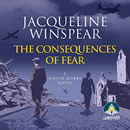
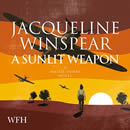
Posted on April 30, 2023 at 2:13 PM
« Previous entry | Main | Next entry »Friday March 31, 2023
Books in March
-
The Murder Book by Mark Billingham [read by Mark Billingham]
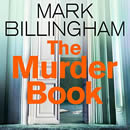 We are set firmly back in the present with this book, which sees the return of Thorne's bête noire - or nemesis. Personally.I'm not fond of bête noires, and this includes Stuart Nicklin, "the most dangerous psychopath [Thorne] has ever put behind bars". However, many other aspects of this thriller/mystery plot are so excellent that I can put my natural prejudices aside. Keeps you guessing right to the end...
We are set firmly back in the present with this book, which sees the return of Thorne's bête noire - or nemesis. Personally.I'm not fond of bête noires, and this includes Stuart Nicklin, "the most dangerous psychopath [Thorne] has ever put behind bars". However, many other aspects of this thriller/mystery plot are so excellent that I can put my natural prejudices aside. Keeps you guessing right to the end...
As an aside to the real detective story, I admit I am very interested in the soap opera that is Thorne's domestic life. So I was pleased to find the (lovely) Helen and her son Archie make a reappearance - I was a bit worried about Archie as Thorne seemed to have gone from full surrogate to total absentee father - anyway, contact is renewed. Helen seems to be the only sensible woman Thorne has ever met as far as I can see, and is clearly a solid friend not to be discarded lightly (either by Thorne or by the author). In addition, with one mighty bound, Mark has neutralised my objection to the apparent ease with which Thorne finds himself in improbable relationships with beautiful and intelligent women.... you'll have to read it to find out how. - The Nine Tailors by Dorothy L. Sayers [read by Ian Carmichael]
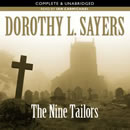 I was encouraged to read this novel from 1934 after listening to one of the podcasts from SheDunnit which pointed out to me that it's critically acclaimed as her "her greatest literary achievement"; she spent a long time with the research for the background to this bellringing puzzle and the Campanological Society of Great Britain felt that her handling of the bell ringing plot was so masterly that they invited her to become their vice president.
I was encouraged to read this novel from 1934 after listening to one of the podcasts from SheDunnit which pointed out to me that it's critically acclaimed as her "her greatest literary achievement"; she spent a long time with the research for the background to this bellringing puzzle and the Campanological Society of Great Britain felt that her handling of the bell ringing plot was so masterly that they invited her to become their vice president.
I have heard the radio dramatisation with Ian Carmichael as well as seeing a TV adaptation in 1974, but I never really fully appreciated the subject matter so felt that revisiting the text might be of interest. The title refers to the nine strokes of a church bell to announce the death of a man - a point which again (almost unbelievably) passed my younger self by.
And so to the plot: storm-bound over the New Year at a Fenland rectory, Lord Peter Wimsey willingly steps in to take the place of a bellringer who has the flu (as you do) and lend a hand in the ringing of a New Year's Eve peal of the church bells.
Some months later, a handless, disfigured corpse is discovered in a fresh grave in the churchyard. Lord Peter receives a plea for help from the rector and embarks on one of his most complicated investigations - for this is not the first crime the village has experienced. Fifteen years ago the Wilbraham Emeralds were stolen, and they are still missing. Can there be any link?
[Well of course there can!] -
Murder Before Evensong by Richard Coles
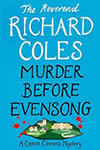 A Christmas gift from George, which I devoured and then passed around any of my fellow cosy crime enthusiasts who had not already read it! And I would say it is surely the definition of cosy crime, with a local village setting, and a crime-solving vicar? However, Coles makes a sincere effort at realism in his setting, and tries to make it clear that someone dying, and worse, being murdered, is no trivial matter in a small community, and not something to be treated lightly (or cosily). However, if this is to be a "Canon Clement Mystery Series" I'm not sure how long he can continue to do so as dead bodies are likely to abound beyond the plausible unless Clement is reduced to unravelling more trivial mysteries - we'll have to see.
A Christmas gift from George, which I devoured and then passed around any of my fellow cosy crime enthusiasts who had not already read it! And I would say it is surely the definition of cosy crime, with a local village setting, and a crime-solving vicar? However, Coles makes a sincere effort at realism in his setting, and tries to make it clear that someone dying, and worse, being murdered, is no trivial matter in a small community, and not something to be treated lightly (or cosily). However, if this is to be a "Canon Clement Mystery Series" I'm not sure how long he can continue to do so as dead bodies are likely to abound beyond the plausible unless Clement is reduced to unravelling more trivial mysteries - we'll have to see.
One of my friends observed that all his female characters were described rather caustically - which I have to say I did not really notice in quite that way. It is true that the "church ladies" were in some ways rather figures of fun or even overtly unpleasant, but I suppose I did not feel much affinity with them, and didn't see them as representative of "women" in general. It seemed to me he was just describing in a humorous manner the factions that arise in local or volunteer organisations - which might be unkind, but to me no more than in Agatha Christie's "Murder at the Vicarage" which is narrated by the vicar poking fun at his parishioners in much the same vein.
So.. was it any good? The plot was a bit convoluted - but sound - and Coles wit and obvious intellect, both of which I very much enjoy, were definitely to the fore - and I did really enjoy his diversions into interesting aspects of church ritual, church politics, and points of theology which he would have liked to take up with his bishop (but didn't...).
So - yes - it was good and I'm looking forward to the next installment. -
The Blue Movie Murders by Ellery Queen
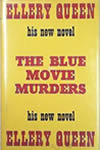 A vintage volume that was another Christmas gift.
A vintage volume that was another Christmas gift.
Although a supposed golden-age thriller enthusiast, there are many famous authors I have never dipped into, and although I have read a number of the short stories as part of crime anthologies, Ellery Queen is one of them - or are one of them, since it's the pseudonym of two writers Frederic Dannay (1905-1982) and Manfred Bennington Lee (1905-1971).
Anyway, this was excellent, with a good plot and an interesting writing style. However this novel, published in 1972, was probably their last. It was ghost written (as many of them were) by Edward Hoch, and edited and supervised by Dannay since Lee had died in 1971.
Being written in the seventies, I guess it needs to come with the usual "good taste" warning that it "reflects language and attitudes of the time" which may now be deemed offensive. [However, it stands up pretty well against, for example, The Eiger Sanction from 1975, which I viewed recently; I was genuinely horrified by the casual sexism and homophobia displayed in such a mainstream piece of entertainment!]. -
Death of a Dreamer and Death of a Maid by M C Beaton [Read by Graeme Malcolm]
I read the first Agatha Raisin book as I was intrigued by the title, and then quickly fell for Agatha herself. While I was aware of the pre-existing series, I had only ever read a short story featuring Hamish McBeth. Beaton herself put me off going any further as she clearly loathed the TV series - which I loved; her major objection was the casting of Robert Carlyle - and to be fair he is not Hamish who is a huge red-headed Highlander - but other than that I thought the series was very true to the rather quirky spirit of the rural society described in the books.
Anyway - time to try a couple of "Death of a ..." - and I found them charming enough. However, Hamish does not really speak to me as Agatha did, so I doubt I will try any more. [Having said that, I doubt I will be reading any more of Agatha now that the original author is no longer with us].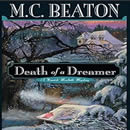
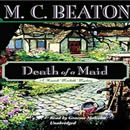 .
.
- A Death in the East, and The Shadows of Men by Abir Mukherjee
[Read by Simon Bubb and Mikhail Sen]Time to move on with this excellent series.
It's 1922 and Captain Sam Wyndham (ex policeman relocated from Scotland Yard), is facing up to the fact that he can no longer deal with his opium addiction. He has travelled to a remote ashram where he endures a gruelling regime to achieve a cure. While there he believes he sees a face he recognises from 1905 when he was a newly qualified PC in England. After a man is murdered - possibly in mistake for Wyndham - he calls on his friend and colleague Sergeant Surendranath Banerjee to travel up country to assist in solving the case (and perhaps help save his life).
In his stories, the author addresses (or at least describes) the many social injustices inherent in the times, and had expressed the view that his two protagonists could not continue as a conventional "Morse and Lewis" type pairing, and that the younger man was obviously going to be influenced by and ultimately involved in the pressure for social change in India. So it starts mildly - Sam is taken to task over his continued use of the almost derogatory nickname Surrender-not despite the supposed true friendship between the two - and then in The Shadows of Men Suren gets his own voice. The pair are split up and so control of the narrative alternates between the two as the plot unfolds. At the end of the book, the ridiculous accusation of murder levelled at Suren is rescinded, but despite the fact he has no need to be on the run any longer, he has chosen not to return to India.
I think the author is taking a break from this series for a while and plans a couple of stand-alone novels, but I hope he returns to Sam and Suren - I want to hear what happens next....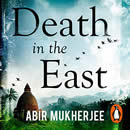
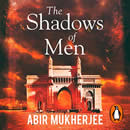
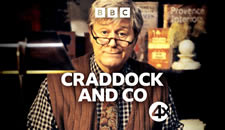 Craddock and Co
Craddock and Co
Turn of the Century (yes, ok, I mean 1899 not 1999) tongue-in-cheek drama by Chris Thompson, starring Martin Jarvis and Emma Tate:
Lucy joins her uncle Charles working at his London book shop, but discovers he has a secret profession as a private investigator. [First broadcast on BBC Radio 5 in October 1993]- The Crompton Canvas - an Earl is assaulted and a painting stolen; it's up to Victorian bookseller-cum-detective Charles Craddock and his niece, Lucy, to solve the crime.
- The Play's the Thing - Charles and Lucy investigate some mysterious backstage dramas at a London theatre.
- My Dear Isabelle - the reappearance of an old flame prompts a trip to France for Charles and niece Lucy.
Posted on March 31, 2023 at 12:13 PM
« Previous entry | Main | Next entry »Tuesday February 28, 2023
Books in February
- I Will Find You by Harlan Coben
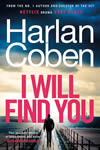 Harlan Coben has an excellent track record writing best sellers, so really it is almost superfluous to say how thrilling his books are, with dramatic twists and turns throughout. I've read several of his stand-alone novels and this is another star performance. I should say I have liked some of his books more than others - specifically: I'm personally less keen on his basketball themed series since I find that subject a bit esoteric (much I suspect as the Americans in general regard cricket). However, I really enjoyed this book; I found it pacy an hard to put down (no basketball in sight).
It's worth warning that the plot is written from the point of view a man jailed for the violent murder of his own child some years before. He is mentally too numb to protest his innocence, and so traumatised by the situation that he has accepted his prison sentence with a burden of guilt for not being able to protect his son. But then he is shown a photograph... which changes everything...
The mystery part of the plot is skillfully executed, allowing the reader to piece together the solution -possibly slightly ahead of the protagonist - at the pace the author intends. And finally, if, like me, you enjoy a well-rounded ending - I would say happy ending but that's always less easy with this underlying subject matter - then you will be well-satisfied here.
If this is your first Coben thriller, then it's a great place to start - and if not, you'll find it well up to his excellent standard.
Harlan Coben has an excellent track record writing best sellers, so really it is almost superfluous to say how thrilling his books are, with dramatic twists and turns throughout. I've read several of his stand-alone novels and this is another star performance. I should say I have liked some of his books more than others - specifically: I'm personally less keen on his basketball themed series since I find that subject a bit esoteric (much I suspect as the Americans in general regard cricket). However, I really enjoyed this book; I found it pacy an hard to put down (no basketball in sight).
It's worth warning that the plot is written from the point of view a man jailed for the violent murder of his own child some years before. He is mentally too numb to protest his innocence, and so traumatised by the situation that he has accepted his prison sentence with a burden of guilt for not being able to protect his son. But then he is shown a photograph... which changes everything...
The mystery part of the plot is skillfully executed, allowing the reader to piece together the solution -possibly slightly ahead of the protagonist - at the pace the author intends. And finally, if, like me, you enjoy a well-rounded ending - I would say happy ending but that's always less easy with this underlying subject matter - then you will be well-satisfied here.
If this is your first Coben thriller, then it's a great place to start - and if not, you'll find it well up to his excellent standard.
- Eight Detectives by Alex Pavesi [read by Emilia Fox]
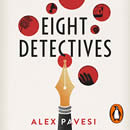 I was absolutely delighted by the basic premise of this book.
I was absolutely delighted by the basic premise of this book.
Grant McAllister, was a renowned professor of mathematics and writer 30 years ago, but is now living in seclusion on a remote Mediterranean island. He developed a theory that all detective fiction could be expressed as a mathematical formula based on "n" detectives, and "n" suspects, which can be applied to all stories, barring those where "n" tends towards 1 - which are special cases. He wrote a series of seven stories illustrating the various combinations of "n" - and these short stories form the basis of this book.
Our story is taken up when Grant is approached by Julia, a young editor, who apparently wants to republish his book. She works through each story with the author (and with us), pointing out apparently intentional anomalies and discussing their relevance, each in some detail... but Julia has her own agenda for this project, and nothing is as it seems.
The stories are presented with multiple alternative endings, which some readers said they found confusing. However, as I said, I loved all this, and I found the overarching mystery quite compelling.
[Note that this book is also published under the title The Eighth Detective.] -
The Shadows of London by Andrew Taylor
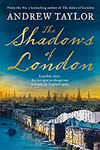 The is the latest in the Ashes of London series, and if you have not encountered it before, you are in for a treat.
I came upon this author and the Marwood-Lovett novels by a chance reading of a review in the Guardian - and what a terrific find they are. Taylor's ideas for the mysteries are excellent, always including fascinating historical insights, and all executed with the aplomb of a brilliant historian and writer. They are set in the era of Charles II after the Restoration, which provides an interesting political landscape. I know a little of this period, having studied it at school, and it is tempting to imagine that life in the 17th century is in some way modern though only a mere century or so after the Tudors - an age of enlightenment, scientific discovery, and elegance in both dress and manners. However Taylor really highlights many other less appealing aspects life with a need for constant wariness against casual assault and robbery, or offending the wrong person in a time of heavy dependence on patronage; add to that: primitive medical treatments, and a general level of poor hygiene, which, despite the huge rebuilding programme in London after the Great Fire, was not really addressed until two centuries later with the creation of the London sewer network.
This story involves a "simple" murder of "no-one in particular", but it affects Cat's business enterprises so negatively, and she is forced unwillingly to involve James to represent her interests in an attempt to resolve the matter. The many threads that his enquiry throws up lead to a political conspiracy involving the King himself - and needless to say, with Taylor, it has some basis in historical fact.
In addition to the story-lines, I am strong drawn to the depiction of protagonists with their, in one way loose, bonds of friendship and yet deep underlying connection and mutual dependence. So far, Taylor has managed to walk a difficult tightrope of maintaining that unspoken relationship without turning them into Tommy and Tuppence - but their relationship is shifting and developing with every book, so who knows what the next book will bring. (I, for one, can't wait!).
If you enjoy skillfully written historical mysteries you will love this series.
The is the latest in the Ashes of London series, and if you have not encountered it before, you are in for a treat.
I came upon this author and the Marwood-Lovett novels by a chance reading of a review in the Guardian - and what a terrific find they are. Taylor's ideas for the mysteries are excellent, always including fascinating historical insights, and all executed with the aplomb of a brilliant historian and writer. They are set in the era of Charles II after the Restoration, which provides an interesting political landscape. I know a little of this period, having studied it at school, and it is tempting to imagine that life in the 17th century is in some way modern though only a mere century or so after the Tudors - an age of enlightenment, scientific discovery, and elegance in both dress and manners. However Taylor really highlights many other less appealing aspects life with a need for constant wariness against casual assault and robbery, or offending the wrong person in a time of heavy dependence on patronage; add to that: primitive medical treatments, and a general level of poor hygiene, which, despite the huge rebuilding programme in London after the Great Fire, was not really addressed until two centuries later with the creation of the London sewer network.
This story involves a "simple" murder of "no-one in particular", but it affects Cat's business enterprises so negatively, and she is forced unwillingly to involve James to represent her interests in an attempt to resolve the matter. The many threads that his enquiry throws up lead to a political conspiracy involving the King himself - and needless to say, with Taylor, it has some basis in historical fact.
In addition to the story-lines, I am strong drawn to the depiction of protagonists with their, in one way loose, bonds of friendship and yet deep underlying connection and mutual dependence. So far, Taylor has managed to walk a difficult tightrope of maintaining that unspoken relationship without turning them into Tommy and Tuppence - but their relationship is shifting and developing with every book, so who knows what the next book will bring. (I, for one, can't wait!).
If you enjoy skillfully written historical mysteries you will love this series.
Posted on February 28, 2023 at 9:32 AM
« Previous entry | Main | Next entry »Tuesday January 31, 2023
Books in January
- The Mysterious Case of the Alperton Angels by Janice Hallett
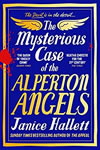 Another deliciously layered mystery from Janice Hallett, and if you have enjoyed her innovative way of presenting her previous stories, you will love it.
Rather like "The Appeal", the story is presented as a series of emails, Whats App messages, letters, news clippings - and phone recordings, transcribed by a faithful assistant, Ellie, whom we can also thank for the excellently curated presentation of the materials. The dossier was originally compiled by Amanda, a true-crime journalist who has decided to write her next story focusing on several grizzly murders which took place decades ago. The murders were centred around a small group dabbling in the occult, and convinced they were saving the world from the anti-Christ; the perpetrator was instantly taken into custody at the time, and is now (thankfully) incarcerated in secure institution. After the group was disbanded, a baby was taken into care, and, seeing her way into the story, Amanda starts her mission to locate the surviving members of the group, and, most importantly, "the baby" - a mission which she pursues obsessively and ruthlessly, without any apparent ethical or moral considerations. If all that were not difficult enough, Amanda is forced by her publishers to work with Oliver, an old colleague - perhaps nemesis even - upon whom, it becomes clear, she is intent on meting out some kind of personal revenge.
Another deliciously layered mystery from Janice Hallett, and if you have enjoyed her innovative way of presenting her previous stories, you will love it.
Rather like "The Appeal", the story is presented as a series of emails, Whats App messages, letters, news clippings - and phone recordings, transcribed by a faithful assistant, Ellie, whom we can also thank for the excellently curated presentation of the materials. The dossier was originally compiled by Amanda, a true-crime journalist who has decided to write her next story focusing on several grizzly murders which took place decades ago. The murders were centred around a small group dabbling in the occult, and convinced they were saving the world from the anti-Christ; the perpetrator was instantly taken into custody at the time, and is now (thankfully) incarcerated in secure institution. After the group was disbanded, a baby was taken into care, and, seeing her way into the story, Amanda starts her mission to locate the surviving members of the group, and, most importantly, "the baby" - a mission which she pursues obsessively and ruthlessly, without any apparent ethical or moral considerations. If all that were not difficult enough, Amanda is forced by her publishers to work with Oliver, an old colleague - perhaps nemesis even - upon whom, it becomes clear, she is intent on meting out some kind of personal revenge.
Seen through their communications, Amanda is a classic and intentionally obvious "unreliable narrator", and Oliver seems to steadily disintegrate to a state of nervous breakdown - but in contrast, Ellie is a delight, and provides a much-needed stable and realistic viewpoint, while she doggedly researches and transcribes the material Amanda provides her with.
Once again I did enjoy the author indulging her ability at pastiche in reproducing sections of other (fictional) blockbuster novels of differing genres inspired by the murders, as well as a hitherto unproduced screenplay.
This is a much darker story than Hallett's previous books, and I felt a constant sense of anxiety, although I am not sure of its source as it was not concern for the characters, who are for the most part not very sympathetic. Although we don't like Amanda, the story is compelling with a terrifically tense and unexpectedly twisty ending - and most of all, we do love Ellie. - So Shall You Reap Donna Leon
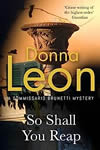 This is another wonderful treasure from Donna Leon. It centres around a cold case - a scenario increasingly popular in modern crime stories - although it is triggered by a murder very much in the present.It weaves together a number of strands of thought-provoking material examining hate crime and attitudes to prejudice, as well as how well or little we know about those we work with every day. Through attention to detail, the police team gradually unravels the secrets of both present and past. All too often in this series, it seems that even though the police "solve the crime" they cannot bring the criminals to justice in the conventional way, and at best some compromise has to be made. However, in this case, despite the powerful figures involved, you are left with no doubt that those responsible will face prosecution.
This is another wonderful treasure from Donna Leon. It centres around a cold case - a scenario increasingly popular in modern crime stories - although it is triggered by a murder very much in the present.It weaves together a number of strands of thought-provoking material examining hate crime and attitudes to prejudice, as well as how well or little we know about those we work with every day. Through attention to detail, the police team gradually unravels the secrets of both present and past. All too often in this series, it seems that even though the police "solve the crime" they cannot bring the criminals to justice in the conventional way, and at best some compromise has to be made. However, in this case, despite the powerful figures involved, you are left with no doubt that those responsible will face prosecution.
Leon displays an admirable economy of style in her writing, where every sentence vividly conveys the essence of her meaning without being overly wordy, and her characters come to life with real depth without needing to explain every last detail of personality - or physical appearance... [Here I should say for those familiar with this book series, Signorina Elettra is an exception as we are treated to full descriptions of her wonderful clothes, mostly I think as they are so much appreciated by Brunetti]. I was interested to note that this is the first "post-pandemic" (if we can say that) book I have read and Covid is referenced I think in a rather clever way, with Brunetti casually finding that he has a face mask left as a kind of relic in his pocket, and not feeling the need to wear it - still present, but not centre stage.
The Brunetti series has been with us for over 30 years now, and I'm tempted to describe them as "gentle" although that has come to mean "lightweight", which these books are definitely not. Leon consciously avoids political controversy, even though there are many examples of the more localised political machinations within the Italian police; in fact this particular story more or less opens with one such "accommodation" between departments. Overall, if her plots have any underlying themes, they are overwhelmingly towards issues with the environment - and you do not have to look very far to be faced with these concerns in Venice, where the books are set. However, do not think that Leon engages in clumsy eco-crusades in her writing - they are mystery stories full of interesting characters where these - often very serious - issues simply provide the backdrop.
Brunetti himself is an interesting protagonist to have gained such a mainstream following over the years, as he is somewhat intellectual, loving opera and often to be found reading ancient philosophers. He has a happy home life - not presented as unrealistically idyllic - with his wife and children providing robust exchanges during their meals together, and insights which would otherwise bypass Brunetti.
Despite the fact that their working day is interspersed with regular visits to local cafes for brief coffees, (and Brunetti generally returns home for lunch), you never feel that the detectives are anything less than dedicated and conscientious workers. Transport in Venice is by vaporetto - but there is also much walking, often seen as a pleasing alternative by Brunetti, during which he never fails to admire and appreciate the architecture and beauty of his home city. But I think it is his basic sense of sanity and decency in a rather less than sane environment, that instills such trust in the reader. It's not necessary to read the books in order; although Brunetti's family and the age of his children do develop through the stories, it is easy enough to place the stories within the chronology.
So... if you have never read any Leon books before - start now! -
Real Tigers by Mick Herron [Read by Seán Barrett]
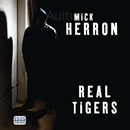
Another gripping tale, which is the third in the Slough House series.
In their efforts to rescue one of their own, our Slow Horses are thrown into real field work in which they are for the most part barely competent. This includes both Lamb and Ho, the latter proving himself wholly incompetent though surprisingly willing. This story has even more deeply political overtones, and the cynical asides - sometimes presented in the minds of the characters and sometimes not - are satirical genius.
I have now watched the Apple TV versions of the first two books and as dramatisations they are well up to the standards of the books. The cast is terrific and, even though I always visualise Charles Grey playing a slobby version of Mycroft Holmes, Gary Oldman works well as Lamb. I'm not sure they've quite nailed Roddie Ho - the actor is perfect but we cannot be privilege to the inner working of his mind in quite the same way on the screen, so while he seems crass enough, he's less overtly preposterous.
[Note that I had great difficulty in finding any on-line links or references to this ISIS audio recording by Seán Barrett - even seems to have gone from the library site from which I obtained it - hence the link to a US site]. 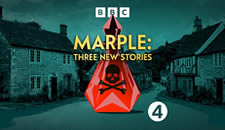 Marple: Three New Stories
Marple: Three New Stories
Three new stories featuring Agatha Christie's heroine, reimagined by contemporary mystery writers for a new generation: a murder, a theft and a mystery where nothing is quite what it seems.
Twelve new stories in total have been published to mark 45 years since the publication of Agatha Christie's last Miss Marple novel.
The ones broadcast here are:
- Murder at the Villa Rosa by Elly Griffiths [Read by John Heffernan].
- Miss Marple's Christmas by Ruth Ware [Read by Georgie Glen].
- The Unravelling by Natalie Haynes [Read by Monica Dolan].
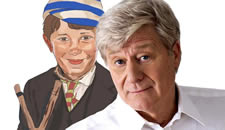 Just William
Just William
The Great Performer by Richmal Crompton
Some further Richmal Crompton stories brilliantly read as ever by Martin Jarvis - really make you laugh out loud.- William Joins the Carol Singers
- William - Only Just in Time
- William the Great Actor
- William's Midnight Adventure
- William Goes Shopping
Posted on January 31, 2023 at 12:50 PM
« Previous entry | Main | Next entry »Saturday December 31, 2022
Books in December
Having discovered that a number of well-known authors (some surprisingly) have tried their hands at extending the James Bond canon, I decided to read them. William Boyd was the first one I found, after reading The Romantic, and this led on to the others via a review column. I already knew knew Anthony Horowitz had written Trigger Mortis ("the" sequel to Goldfinger), using some of the text or chapters that Fleming had already written. At the time of publication, I took the opportunity to read it as well as Goldfinger; I did not know however that since then he had written a second Bond novel.
As a Guardian reviewer, Sarah Ditum, points out - modern day authors have an issue with recreating Bond - a "cold war relic". Fleming himself is acknowledged to be a sadist, a racist and a misogynist - maybe of his time - and
the parts of his style that are easy to pastiche are also intolerably obnoxious. Thus the author's task is simple and borderline impossible: do Bond exactly the same, and make it different.
Most of these authors tone him down and the contemporary reviewers of the individual books give better opinions than I can on how well each of them does this and how much is left of the "real" Bond.
I'm listing the books in the order in which I read them. With each one I thought I liked it the best, but looking back at them, I think they are pretty equal in my estimation. In each case the narrators chosen for the books are heavyweight actors with very distinctive voices, and known for their portrayals of suave English gentlemen.
- Solo William Boyd [read by Dominic West]
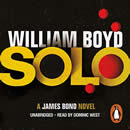 Boyd is an excellent story teller and the overall structure and pace are very much in keeping with the original Bond novels. As in many of his novels, (notably the first), Boyd draws on his knowledge and experience of Africa to provide the backdrop to this adventure. It's set in 1969, chronologically 6 years after the last Bond book, and we find 007 celebrating his 45th birthday - alone. The subsequent mission sees him sent to single-handedly stop a civil war in a small West African nation but seemingly without any tangible means to set about it. We are all set for a classic Bond outing - albeit with a rather convoluted plot.
Boyd is an excellent story teller and the overall structure and pace are very much in keeping with the original Bond novels. As in many of his novels, (notably the first), Boyd draws on his knowledge and experience of Africa to provide the backdrop to this adventure. It's set in 1969, chronologically 6 years after the last Bond book, and we find 007 celebrating his 45th birthday - alone. The subsequent mission sees him sent to single-handedly stop a civil war in a small West African nation but seemingly without any tangible means to set about it. We are all set for a classic Bond outing - albeit with a rather convoluted plot.
- Forever and a Day Anthony Horowitz [Read by Matthew Goode]
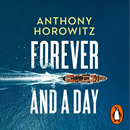 I was in two minds about this before I read it, as I wasn't too keen on Trigger Mortis; I wanted to like it but... didn't much - despite my gushing devotion to Horowitz. However, as acknowledged by Horowitz, quite a few sections of that book were written by Fleming himself, with Horowitz filling in the blanks. I feel that this book is far better in that the author is less contrained by anyone else's style - not only in terms of the writing but also in the general character of Bond. Some noted that Horowitz was still "labouring in Bond's shadow", but I think that because it's a prequel so we can observe Bond's character less than fully formed - in a Good way! - and I applaud the portrayal of his relatively emancipated female lead.
I was in two minds about this before I read it, as I wasn't too keen on Trigger Mortis; I wanted to like it but... didn't much - despite my gushing devotion to Horowitz. However, as acknowledged by Horowitz, quite a few sections of that book were written by Fleming himself, with Horowitz filling in the blanks. I feel that this book is far better in that the author is less contrained by anyone else's style - not only in terms of the writing but also in the general character of Bond. Some noted that Horowitz was still "labouring in Bond's shadow", but I think that because it's a prequel so we can observe Bond's character less than fully formed - in a Good way! - and I applaud the portrayal of his relatively emancipated female lead.
Initially not knowing this was a prequel, I was quite taken aback buy the opening of the book (certainly obeyed the rules of fiction and got my attention): "007 floats in the waters of Marseille, killed by an unknown hand.... M laid down his pipe and said tetchily: 'We have no choice. We're just going to bring forward this other chap you've been preparing. But you didn't tell me his name.'..."
<INSERT CLASSIC LINE HERE>.
It's time for James Bond to earn his licence to kill. - Devil May Care Sebastian Faulks [read by Jeremy Northam]
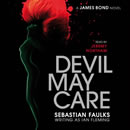 This book was published in 2008 to celebrate the Centenary of Ian Fleming's birth. It's apparently written in Fleming's style and set in 1967, keeping the same time frame, and seeing Bond return to action after a sabbatical following the death of his wife.
The arch enemy is Dr Julius Gorner, a megalomaniac chemist, (my favourite kind!), complete with the physical deformity apparently almost de rigeur in the Bond movies. However, the female side-kick is once again not just a pretty face, proving herself suspiciously useful in a fight, and ultimately a fully independent character in her own right. [It has to be said that the unreconstructed Bond character is manipulated from the outset into accepting her as a partner, believing her to be a conventional damsel in distress]. Faulks said: My female lead has a little more depth than Fleming's women, but not at the expense of glamour.
This book was published in 2008 to celebrate the Centenary of Ian Fleming's birth. It's apparently written in Fleming's style and set in 1967, keeping the same time frame, and seeing Bond return to action after a sabbatical following the death of his wife.
The arch enemy is Dr Julius Gorner, a megalomaniac chemist, (my favourite kind!), complete with the physical deformity apparently almost de rigeur in the Bond movies. However, the female side-kick is once again not just a pretty face, proving herself suspiciously useful in a fight, and ultimately a fully independent character in her own right. [It has to be said that the unreconstructed Bond character is manipulated from the outset into accepting her as a partner, believing her to be a conventional damsel in distress]. Faulks said: My female lead has a little more depth than Fleming's women, but not at the expense of glamour.
- Colonel Sun Kingsley Amis [read by Simon Vance]
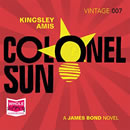 Kingsley Amis published this work in 1968 under the pseudonym "Robert Markham" - which is presumably why I was never previously aware of its existence. Colonel Sun is the first James Bond continuation novel published after Ian Fleming's death in 1964. The story begins with M's being kidnapped, and Bond's being sent to track him down and rescue him - and I trust it's not too much of a spoiler to say his mission is successful!
Kingsley Amis published this work in 1968 under the pseudonym "Robert Markham" - which is presumably why I was never previously aware of its existence. Colonel Sun is the first James Bond continuation novel published after Ian Fleming's death in 1964. The story begins with M's being kidnapped, and Bond's being sent to track him down and rescue him - and I trust it's not too much of a spoiler to say his mission is successful!
Colonel Sun is the villain of the piece, and is an interesting choice - being "ostensibly the most repellent racial caricature of all", and yet "arguably as much a critique of Fleming's two-dimensional villains as a continuation of the pattern" - as is the choice of baddie nation being China over the traditional USSR. Similarly the female lead "both conforms to the Fleming formula for Bond girls and deviates from it". I recommend reading this 2018 review by John Dugdale as it covers this in more detail plus a number of points I found most interesting.
Apparently elements from this story have been used for some of the films, including adapting the torture scene for Spectre (2015). Much of Blofeld's dialogue in the torture scene was written by Amis for Sun, resulting in an acknowledgement to Amis' estate in the end title credits.
Amis wrote two other Bond related works, of which I was also ignorant: the literary study, The James Bond Dossier and the humorous The Book of Bond.
There are in fact several other illustrious novelists who have turned their hands to Bond stories - but I think I have had my fill for now...!
Posted on December 31, 2022 at 12:15 PM
« Previous entry | Main | Next entry »Wednesday November 30, 2022
Books in November
- An Air That Kills Andrew Taylor [read by Philip Franks]
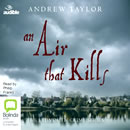 Suffering from deprivation of Marwood and Lovett, I decided to try a previous series - removed from the Ashes of London by a couple of hundred years. Anyway, I love it so much, I think I can now count Andrew Taylor as one of my new favourite authors.
Suffering from deprivation of Marwood and Lovett, I decided to try a previous series - removed from the Ashes of London by a couple of hundred years. Anyway, I love it so much, I think I can now count Andrew Taylor as one of my new favourite authors.
The Lydmouth books were written in the 1990s - much earlier in Taylor's writing career. They are set post-WW2 in a very clearly described period of change. Our protagonists are a policeman new to the area, and a young "career woman" - both of them have similar issues in finding their places not only in the local community but also in society in general. Those who used to be controlling forces in village life, ex-military officers, those with titles, landowners etc while not the force they once were (many in reduced financial circumstances), still believe they can exert influence and attempt to enforce their views on "the lower orders". Policemen (especially in-comers), and women, should know their place.
These two - similar to Marwood and Lovett - do not really have any kind of relationship in the book - just more of an interaction. Their lives are described essentially separately, which I particularly like. (They do not develop into Steed and Mrs Peel).
I was so enamoured of the book that I immediately wanted to move on to the next in the series. However, one thing I enjoyed was that the story is set in November, and the description of the weather and so on are totally in keeping with the time in which I am reading it. The next book seems to be set in June, so I am going to defer reading it until the season turns....!
Other readers like me, moving on from the 18th century stories, have mentioned finding it disappointing - but far from it for me. I think perhaps they liked the "Georgette Heyer" model of historical novels, unfavourably comparing the dismal backdrop of the 1950's and the not-always-likeable characters. However, I am fascinated by this period and feel he writes about it, and the people living in it with great realism and perception. [One reader says they prefer the "historical" novels which made me smile as I need to point out that although it's also only yesterday to me, the 1950's are three-quarters of a century ago...]. -
The Cat Who Caught a Killer by L T Shearer
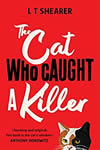 If you love cats and the so-called cosy crime genre (as I do) you will enjoy this book. It's not a demanding read and would provide perfect travel reading - especially if you were off for a weekend in London, as the protagonist (Lulu) lives on a canal boat and so the book includes picturesque descriptions of, and information about, the area around Little Venice.
If you love cats and the so-called cosy crime genre (as I do) you will enjoy this book. It's not a demanding read and would provide perfect travel reading - especially if you were off for a weekend in London, as the protagonist (Lulu) lives on a canal boat and so the book includes picturesque descriptions of, and information about, the area around Little Venice.
As many other readers have commented, the calico cat of the title does somewhat steal the show, and since it is revealed in the opening pages, I don't think it's a spoiler to say that the cat has the power of human speech. "Conrad" as Lulu names him, is not at all twee, but rather a sensible, down-to-earth and serious character - and despite there being no real hint of this in the text, I was also driven to wonder if his vocalisations were more an expression of Lulu's loneliness after the loss of her husband, since (again realistically) no-one else ever hears anything other than cat language. However, despite never hearing Conrad speak in actual words, all the other human characters are immediately captivated when they meet him - as I'm sure you will be too.
[Although this book is definitely not a comedy, I could not help but be reminded of Lynne Truss's hilarious books about the Evil Talking Cats (ETCs). (Note: Conrad is definitely not one of those).] 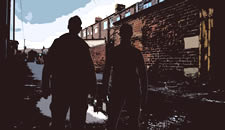 Trueman and Riley
Trueman and Riley
Two bickering detectives solve Yorkshire's trickiest cases. The duo began life in a BBC Radio 4 play in 2002, with DI Trueman called back to work after a nervous breakdown in order to solve a high profile murder case, backed up by Detective Superintendent Riley. This was followed by three further crime dramas in 2005.
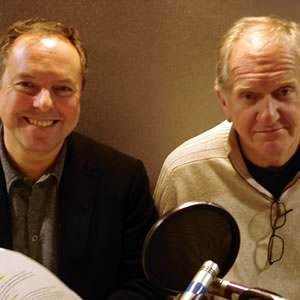
I thought this was an excellent radio drama series, with short episodes, involving amusing and interesting yet everyday police cases. I listened to all 3 series and a prequel. It's presented in the highly professional manner heard in the early radio dramas (before TV) with a minimal cast used to great effect. The actors work well together seemingly with real rapport - as do the characters they depict.
Robert Daws and Duncan Preston - both exceedingly well known actors from TV - star as Trueman and Riley, and the director is Toby Swift.
Posted on November 30, 2022 at 12:37 PM
« Previous entry | Main | Next entry »Monday October 31, 2022
Books in October
-
Demon Copperhead by Barbara Kingsolver
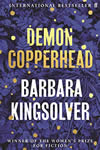 Wonderful, classic Kingsolver in that it gently weaves the big issues (here it's opioid over-prescription and the 'left behind sections dividing American society) into a gripping roller-coaster of a story. Loosely based on Dickens' David Copperfield, it is narrated by a poor child from a trailer park in rural Virginia. Initially looked after by neighbours, later disastrously fostered and abused, little wonder he makes a lot of bad
choices through his own inexperience.
Wonderful, classic Kingsolver in that it gently weaves the big issues (here it's opioid over-prescription and the 'left behind sections dividing American society) into a gripping roller-coaster of a story. Loosely based on Dickens' David Copperfield, it is narrated by a poor child from a trailer park in rural Virginia. Initially looked after by neighbours, later disastrously fostered and abused, little wonder he makes a lot of bad
choices through his own inexperience.
It's funny, poignant, page-turning dramatic, and eventually uplifting as the decent humans on the fringe of his life, who have tried in their humble way to offer him better choices and foster his talents, see him move into adulthood with more options than he ever imagined. A picture of rural America that pulls you in and stays with you.
Can't recommend it highly enough. -
Rabbit Hole by Mark Billingham [read by Maxine Peake]
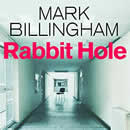 This is a stand-alone novel and as usual with this author it's a very imaginative treatment for a murder investigation, and it's skilfully written. Usually with his stand-alone novels I am at first resistant, (as there's no DI Thorne - which is odd in itself as I don't find Thorne a very sympathetic hero); but then, I'm quickly drawn into the story and completely won over. Often I find putting aside a known character refreshes both reader and author as he has a renewed sense of freedom in his subject.
This is a stand-alone novel and as usual with this author it's a very imaginative treatment for a murder investigation, and it's skilfully written. Usually with his stand-alone novels I am at first resistant, (as there's no DI Thorne - which is odd in itself as I don't find Thorne a very sympathetic hero); but then, I'm quickly drawn into the story and completely won over. Often I find putting aside a known character refreshes both reader and author as he has a renewed sense of freedom in his subject.
Sadly though, with this book I found that, fond as I am of both author (and narrator), I did not enjoy it as much as some of his others (eg Rush of Blood and Die of Shame). However, I'm very happy to acknowledge that in this case, my lack of enjoyment seems to be wholly to do with personal taste rather than any shortcomings in the narrative.
The story is told in the voice of an ex-DC, Alice - and we already have a certain element of "the unreliable narrator" at play because Alice has been committed to a psychiatric hospital after a breakdown following an "incident" involving the death of a colleague. After one of the other inmates is found dead, Alice is determined to find the killer, and is certain the police investigation cannot succeed without her help...
Posted on October 31, 2022 at 12:05 PM
« Previous entry | Main | Next entry »Friday September 30, 2022
Books in September
-
The Romantic by William Boyd
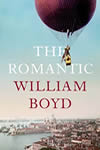 There's no doubt Boyd is a master story-teller - but he distinguishes himself from others by being an excellent writer to boot. Here we have a wonderful story, splendidly written, and illustrating why he has been described by some as the finest storyteller of his generation.
There's no doubt Boyd is a master story-teller - but he distinguishes himself from others by being an excellent writer to boot. Here we have a wonderful story, splendidly written, and illustrating why he has been described by some as the finest storyteller of his generation.
"The Romantic" is written in a style he has employed previously, being a whole-life biography, apparently gathered from historical source material, giving him the scope to use a variety of historical backdrops, while his protagonist, Cashel Greville Ross, is pulled in many different directions, both emotionally and geographically. The "source material" is fictional, but very convincing, in similar vein to Boyd's famous 1990s hoax biography of an "underrated" post-war artist [see note*]. In this story, however, we are transported through 19th century Europe, India, and the Americas, as Cashel's, adventures appear to be driven entirely by apparently random external events rather than by his own choosing. This calls to mind previous comparisons with some of Evelyn Waugh's heroes, but in this case perhaps more like Amis' "Lucky Jim", where despite equal shares of good and bad luck, he manages to deal with success as well as reversals of fortune, coming out, if not actually "on top", perhaps better than he might have expected.
Although Cashel is swayed by his passions for several women - and one in particular haunts him to the end - I would not entirely describe him a romantic in that way. He is a romantic in that he seizes on each unlikely opportunity that life offers with total commitment, where other men might take a "once bitten twice shy" approach. The resulting exploits are indeed romantic, covering the Battle of Waterloo, sojourns in Italy with the "romantic" poets (Shelley and Byron), a safari to find the source of the Nile, and, perhaps less romantically, an enforced period in a debtors prison in London.
* Note: The way this hoax was perpetrated, moving a total fiction into reality - with some people even claiming to have met the artist and seen a retrospective exhibition of his work - reminds me of Hilary Mantel, whose untimely death was announced this month. She had a number of well-made points in her 2017 Reith Lectures on the subject of "History" and so-called historical fact:
Once we can no longer speak for ourselves, we are interpreted. When we remember, we don't reproduce the past, we create it.
Evidence is always partial. Facts are not truth, though they are part of it -- information is not knowledge. And history is not the past -- it is the method we have evolved of organizing our ignorance of the past. It's the record of what's left on the record. - Fatal Isles, Wild Shores, and Cruel Tides by Maria Adolfsson [Read by Hattie Ladbury]
This is a relatively new book series, translated from Swedish, featuring DI Karen Eiken Hornby, who has returned to her native island home after a period working in England. She has her demons, which seems de rigeur for every fictional detective in order to provide additional background interest, but in this case it goes beyond the usual hackneyed tropes of the genre. Her history has left her traumatised, informing her life in the present, but not dished up to us in one emotional dollop. Rather the mystery story definitely takes centre stage - as it should.
And they are remarkably good mystery stories, which reinforce the appeal of the "cold case" without actually following that format. Here the answer to a couple of very modern murders lies in the past, and the solutions will definitely keep you guessing. They also have thrilling endings where you truly experience the fear as Karen realises she is finally facing a killer.
And - a word on Karen's "native island home" - which is "Doggerland". I have to confess I read two books without actually taking in that these islands are in fact fictional. I know - but as I am used to being deemed poor at geography, I would not think it unusual that I had not heard of some small Scandinavian islands, which I imagined to be like the Faroes. In fact they are rather bigger, being based on the submerged prehistoric land bridge, the remains of which form the "Dogger Bank" somewhere in the North Sea.I have read the first two of the series, and looking forward to the third which is available this month. I also note with keen anticipation there seem to be one or two more in the wings awaiting translation.
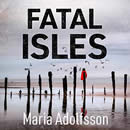
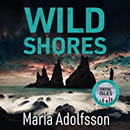
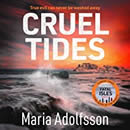
Posted on September 30, 2022 at 6:36 PM
« Previous entry | Main | Next entry »Wednesday August 31, 2022
Books in August
-
The Seven Deaths of Evelyn Hardcastle by Stuart Turton [read by Jot Davies]
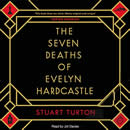 I was expecting a conventional murder mystery, but what an extraordinary book this turned out to be. Compelling from the opening chapter, it's not only fascinating but a very clever book, dealing as it does with different timelines throughout. The protagonist, Aiden (or is he?), seems to be in a kind of limbo - as in: an existence between life and death (or heaven and hell) - and, weirder still, inhabits the bodies of a number of different characters, reliving the day of the eponymous death over and over again. Despite the obvious possibility of confusion for the reader, (especially in an audio book format!), it was pretty clearly explained throughout - since the protagonist was definitely more confused by his circumstances than any reader.
I was expecting a conventional murder mystery, but what an extraordinary book this turned out to be. Compelling from the opening chapter, it's not only fascinating but a very clever book, dealing as it does with different timelines throughout. The protagonist, Aiden (or is he?), seems to be in a kind of limbo - as in: an existence between life and death (or heaven and hell) - and, weirder still, inhabits the bodies of a number of different characters, reliving the day of the eponymous death over and over again. Despite the obvious possibility of confusion for the reader, (especially in an audio book format!), it was pretty clearly explained throughout - since the protagonist was definitely more confused by his circumstances than any reader.
I would categorise this as fantasy, sci-fi, maybe gothic horror, so if you hate those, maybe this book won't appeal - but ... I can only repeat: what an extraordinary book. - Fair Warning Michael Connelly [read by Peter Giles and Zach Villa]
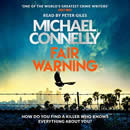 Of all of Connelly's creations I believe I like Jack McEvoy the very best.
Of all of Connelly's creations I believe I like Jack McEvoy the very best.
The Scarecrow scared me half to death - and I'm not even a crow! So I've been greatly looking forward to this book - and it was as excellent. Luckily it did not scare me quite so much (maybe because I don't meet the profile of the victims) but the mystery, detection, and research were as intriguing as ever.
We see Jack now working as a journalist for an online consumer website (Fair Warning) getting sucked into a murder investigation. He starts looking into the safety protocols (and there are virtually none) for consumers who voluntarily submit their samples to DNA labs for analysis, and uncovers a network of sexual predators illegally tapping into this source of information.
Fair Warning is/was a real on-line website, which is made clear at the end, where - being an audio book - Connelly interviews its erstwhile editor. I say "ertstwhile" because when I went to view the site, I find it has since been forced to close. Even though it was aimed at American consumers/workers I was very sad to see that the closure was seemingly caused by on-line trolling through social media. I'm not offering an opinion on the accusations but it seems to me that the overall aims and objectives of such a site can only be seen as a "Good Thing". And the result is not "changes for the better", but - as with some other websites for rather less noble causes [MagKnits] - total shut down. The people running these enterprises, being of an age, decide it's simpler to retire, rather than to fight to continue a non-profit site.
Posted on August 31, 2022 at 10:20 AM
« Previous entry | Main | Next entry »Sunday July 31, 2022
Books in July
- A Song from Dead Lips by William Shaw [read by Cameron Stewart]
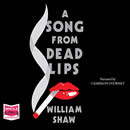
I thought The Birdwatcher was a great book, and I'm wondering why it took me so long to read another offering from Shaw.
This story is also excellent, and again was a good fit with my interests - which, apart from the dead bodies thing, was set in the not too distant past of London in the 1960s. This era covered my life from a very small child to a young adult, so I can remember it, but as it were "through a glass darkly" (which must also apply to the author as we are of an age). However, it seems to me to quite accurately reflect what I remember of wandering around London as a teenager - trying to find Carnaby Street and the Swinging Sixties, (unsuccessfully) - and looking for Rupert Street (successfully) to find a wonderful shoe shop, (as opposed to the Raymond Review Bar). So having been reminded of all this - I find I strongly agree with a the NY Times comment "an elegy for an entire neglected generation".
The war in Biafra is featured fairly centrally as part of the unravelling of the murder mystery. This war provided my first exposure, (with zero appreciation of the true situation), to mass appeals for aid for victims of a terrible famine, and of graphic TV footage showing starving children. The war itself ended by the 1970s and Biafra disappeared as both a news item and a separate state. An estimated 2 million civilians died of starvation, of which three quarters were children. -
The Twist of a Knife by Anthony Horowitz
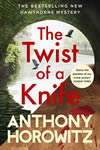 "I've written three books and our deal is over.", says an exasperated Horowitz, having been subjected to a series of near death experiences as a well as some ridicule (which is worse I wonder...?) through his relationship with the irritating ex DI Hawthorne. As you can imagine, this state of affairs lasts about 5 minutes before Anthony finds himself on the wrong side of the law, and has (reluctantly) to call upon Hawthorne for assistance.
"I've written three books and our deal is over.", says an exasperated Horowitz, having been subjected to a series of near death experiences as a well as some ridicule (which is worse I wonder...?) through his relationship with the irritating ex DI Hawthorne. As you can imagine, this state of affairs lasts about 5 minutes before Anthony finds himself on the wrong side of the law, and has (reluctantly) to call upon Hawthorne for assistance.
I have come upon this fourth in the series somewhat sooner than I expected as I was lucky enough to be allowed a review copy; thus I've read it on the page as opposed to listening to it.
This particular story - another of the "locked room" genre - revolves around a theatre production of a play written by Anthony himself; the play receives a scathing review, leading to... a murder. As with many other snippets revealed in these books, it drove me to look up "Mindgame", to find that it is indeed a play of his from 1999, (and it did receive lukewarm reviews at the time, but, happily, spawned no murders that I could find). Once again, I loved the book- my favourite Horowitz series - clever, thrilling, and wonderfully entertaining. And as I love Rory Kinnear's narration so much, I shall definitely be listening to it all over again once the audio version is available. -
Secret Water by Arthur Ransome [Read by Gareth Armstrong]
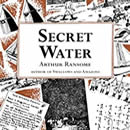 This is not quite so adventurous - nor set in such a picturesque a location - as some of the other books up to this point. The Swallows' Father was unable - at the last minute - to take them on a planned sailing trip all together, so he arranges something else for them to do, a little more statically: a mapping project while camped on islands within tidal mud flats; he also arranges for the Amazons come to Norfolk to join them. Since it directly follows the (alarming) events in We Didn't Mean to Go to Sea, one can only surmise that the adults felt they needed a safer environment for their unaccompanied children. What could possibly go wrong? Nevertheless, the 3 youngest of them manage to end up in yet another disastrous situation. Again we watch helplessly as, despite sound planning, they make a series of last-minute faulty decisions, inevitably leading to their being stranded in the middle of the causeway as the tide comes in...
This is not quite so adventurous - nor set in such a picturesque a location - as some of the other books up to this point. The Swallows' Father was unable - at the last minute - to take them on a planned sailing trip all together, so he arranges something else for them to do, a little more statically: a mapping project while camped on islands within tidal mud flats; he also arranges for the Amazons come to Norfolk to join them. Since it directly follows the (alarming) events in We Didn't Mean to Go to Sea, one can only surmise that the adults felt they needed a safer environment for their unaccompanied children. What could possibly go wrong? Nevertheless, the 3 youngest of them manage to end up in yet another disastrous situation. Again we watch helplessly as, despite sound planning, they make a series of last-minute faulty decisions, inevitably leading to their being stranded in the middle of the causeway as the tide comes in...
Posted on July 31, 2022 at 11:17 AM
« Previous entry | Main | Next entry »Thursday June 30, 2022
Books in June
- The Cliff House by Christopher Brookmyre
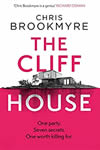 This is another excellent novel from Chris Brookmyre - an all time favourite since he first introduced us to Jack Parlabane and his version of the "Tartan Noire" novel. Since then he has not stuck to the one detective - despite his evident popularity - but has explored a lot of different writing techniques and styles, and all with great success in my opinion.
This is another excellent novel from Chris Brookmyre - an all time favourite since he first introduced us to Jack Parlabane and his version of the "Tartan Noire" novel. Since then he has not stuck to the one detective - despite his evident popularity - but has explored a lot of different writing techniques and styles, and all with great success in my opinion.
This is a "locked room" mystery, set in luxury a retreat isolated on a remote Scottish island a la "And Then There Were None". The characters are looking forward to a relaxing hen weekend with the usual copious quantities of alcohol and gourmet dining provided by their very own personal chef. However, the bloody demise of the chef on the first evening is a fairly strong indicator that things are not going to plan... and then they discover that they have no communications with the outside world...
The story is narrated through the eyes of each character in turn, gradually revealing that each of them has a (greater or lesser) dark secret in their past, increasing the tension as we wait to find out which of them might be bent on such a ghastly form of blackmail revenge.
If you share my own taste for well-written twisty plots and properly rounded endings, you can always be sure of a great read when you open any of CB's books - this one being no exception. - In This Grave Hour by Jacqueline Winspear
[read by Julie Teal]
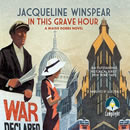 Here we find Maisie at the very start of WW2, with events from the previous war all too sharp in her memory. The story concerns Belgian refugees who remained in Britain after WW1, and a tragic event from their past which led to an inexplicable string of murders so many years later.
Here we find Maisie at the very start of WW2, with events from the previous war all too sharp in her memory. The story concerns Belgian refugees who remained in Britain after WW1, and a tragic event from their past which led to an inexplicable string of murders so many years later.
The book provides an excellent account of every day life, as civilians start to get to grips with the rituals of gas masks and sheltering from air raids - as well as some less well-remembered political points (see note).
Note: Before the Blitz started, the government ordered London Transport not to allow people to use the tube stations as shelters - which seems astonishing now, as we more or less identify that period with Londoners sheltering in the Underground. It seems that though Churchill was happy to use a disused underground station as a refuge himself, he talked about forcibly preventing the general populace from doing the same. However, Underground station staff found that it was impossible to stop people entering and setting up their own primitive camps below ground, and in October 1940, the government policy was changed. The short branch line to Aldwych station (often used now and in the past for filming historic dramas) was closed and given over to the public, and three disused stations were specially opened to the public.
-
Riviera Gold by Laurie R King[Read by Jenny Sterlin]
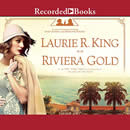 I would say: 'I love these books', but I have found the last two slightly harder going.
I would say: 'I love these books', but I have found the last two slightly harder going.
The books are really about Mary rather than Holmes, and I think she writes well about the latter, with understanding and affection, but I'm not keen on her treatment of some of the other characters. Speaking as a Brit, I suppose, I do not really like Mary's rift with Mycroft, and as I mentioned before, I actively dislike what she has done with Mrs Hudson (now "Clarissa", apparently). This story features "Clarissa" centre stage, so I found it hard to engage with it, plus I found the method of the telling - the plot interspersed with "conversations" between two women in a different timeline - rather confusing, (although that may have been simply that it was not ideal for an audio book). And while I do enjoy the author's peppering the stories with well-known characters from the period (in this case Picasso - probably not very realistically in my opinion but... what do I know?), I did prefer her use of fictional characters (ie Lord Peter Wimsey and Kim for example). -
Winter Holiday, and We Didn't Mean to Go to Sea by Arthur Ransome
[Read by Gareth Armstrong]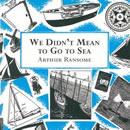
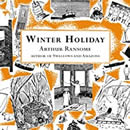
While Peter Duck is a true adventure story in the style of Treasure Island, these two books are a whole other kettle of fish. In Winter Holiday the Swallows and Amazons meet up with the Ds for the first time, with snow everywhere, and the lake frozen over. Nancy is in bed with the mumps, but still well in charge of the rest - who are in quarantine for the duration and unable to return to school - and their expedition to the "North Pole". This is perhaps the more realistic of the two books, in that the children end up in a very bad situation in a blizzard - all very low key unless you have actually been in that situation - and they are lucky to escape perishing from exposure while no-one has any idea where they can be. It's also a perfect illustration of mis-communications ["when you see a signal start for the North Pole"], which provides a good lesson to inform your later life!
In the same vein, We Didn't Mean to Go to Sea is even more heart-stoppingly awful, as we watch the Swallows step-by-step make the wrong decisions in an unfamiliar boat - culminating in the inevitable loss of the anchor, and the start of a ghastly trip across the North Sea in a storm. In some ways it could be said that this is a slightly less realistic scenario, but only in as much as - duffers or not - the more realistic outcome would have been that they all drowned. Luckily, with many more books in the series, this was not the case. Again, this is agonising reading as an adult, and again, I love the way the adults are depicted - especially in the closing chapter, as Mr Walker is viewed by the children at a distance, explaining to his wife what their children had really been up to.
Posted on June 30, 2022 at 12:44 PM
« Previous entry | Main | Next entry »Tuesday May 31, 2022
Books in May
- The Cook by Ajay Chowdhury
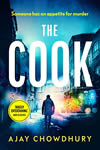 Overall, despite its having a decent plot and potentially interesting characters, this book was not really to my taste. I don't think that should put anyone else off reading it - my taste is by no means everyone's.
Kamil Rahman appeared first in The Waiter, and although I prefer to read books in order, when the publishers via Netgalley kindly offered me Kamil's second outing to review, I decided to read it first. I feel that may have been my mistake.
Reviews of The Waiter, explicitly mention the vivid interweaving of cultures by alternating between past events in Kolkata and the present in London being so enjoyable. However, unlike the first book, the action here is based solely in London, and I found it very hard to engage with the characters and the communities. Even though I the fault may be with me, (in that the age and background of the players is well outside my demographic), I think the author should have made me engage more, and thus given me more of an interest in things about which I know little. I have the slight impression that the author said all he wanted to about the characters in the first book, (perhaps an indication that they are a little shallow?). Even the themes of homelessness and domestic abuse - which are shocking and ever-present in our society - failed to raise the emotions in the way they should have.
Overall, despite its having a decent plot and potentially interesting characters, this book was not really to my taste. I don't think that should put anyone else off reading it - my taste is by no means everyone's.
Kamil Rahman appeared first in The Waiter, and although I prefer to read books in order, when the publishers via Netgalley kindly offered me Kamil's second outing to review, I decided to read it first. I feel that may have been my mistake.
Reviews of The Waiter, explicitly mention the vivid interweaving of cultures by alternating between past events in Kolkata and the present in London being so enjoyable. However, unlike the first book, the action here is based solely in London, and I found it very hard to engage with the characters and the communities. Even though I the fault may be with me, (in that the age and background of the players is well outside my demographic), I think the author should have made me engage more, and thus given me more of an interest in things about which I know little. I have the slight impression that the author said all he wanted to about the characters in the first book, (perhaps an indication that they are a little shallow?). Even the themes of homelessness and domestic abuse - which are shocking and ever-present in our society - failed to raise the emotions in the way they should have.
Despite the good story, I felt Kamil's investigation came across as implausible; the concept of a familiar crew getting together to solve a mystery on their own smacked almost of children's books. All books with "amateur detectives" have this kind of inherent problem - I heard one experienced author saying: "why would a person in reality accept being questioned by anyone other than the police?". However, again, I think it's the author's job to answer that question, and make me suspend my disbelief. Despite all this, I am still keen to read "The Waiter", and I hope we might get improved characterisations as the series - and the author - progress. -
A Line to Kill by Anthony Horowitz [Read by Rory Kinnear]
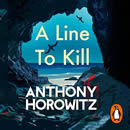 Of course, as with most of Anthony Horowitz's (may I call you Tony? no?) output - I loved this next book in this series. The plot is good, the characters wonderful, and ... well, what more can I say?
Of course, as with most of Anthony Horowitz's (may I call you Tony? no?) output - I loved this next book in this series. The plot is good, the characters wonderful, and ... well, what more can I say?
As this was an audio book - and I would say again what an appropriate reader they have found in Rory Kinnear - they followed an apparent trend, by including an interview with the author at the end. I found this really interesting, not only in Anthony's opinion and insights about writing this and other books, but in his sheer irrepressible enthusiasm for his craft. This is reminiscent of some anecdotes I heard from friends who worked with him in his youth in advertising, when "all he ever wanted to do was to write and write".
I was also very pleased to discover that far more books are in plan for this series, (beyond the "three book deal"). True to the professional he is, Anthony explained that he will need to vary the form in those future books, and how he might do so, to avoid his own fictional role as "Watson" becoming stale. - Hot to Trot by M C Beaton with R W Green [read by Penelope Keith]
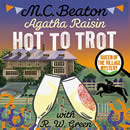 As Marion Chesney died in 2019, I thought this would be the last Agatha Raising book I would read; however, this book credits Rod Green as a co-author, and it seems clear he will continue to write the Agatha books*. He makes it clear that Marion worked with him and supplied him with some future storylines - as well as approving his first few chapters on her behalf - before she passed away. I think he really has done a good job, although I do detect a slight mellowing - and I suspect he will be unable to bring himself to make Agatha quite as outrageously foolish as she has been under Marion's watch. (I always likened Agatha to an adult version of Blyton's Noddy - he is based on naughty 3 year old mentality, while she is a naughty 50 year old.)
As Marion Chesney died in 2019, I thought this would be the last Agatha Raising book I would read; however, this book credits Rod Green as a co-author, and it seems clear he will continue to write the Agatha books*. He makes it clear that Marion worked with him and supplied him with some future storylines - as well as approving his first few chapters on her behalf - before she passed away. I think he really has done a good job, although I do detect a slight mellowing - and I suspect he will be unable to bring himself to make Agatha quite as outrageously foolish as she has been under Marion's watch. (I always likened Agatha to an adult version of Blyton's Noddy - he is based on naughty 3 year old mentality, while she is a naughty 50 year old.)
* R W Green also seems to be continuing the Hamish McBeth series - a delight yet to come for me - I loved the TV series with Robert Carlyle, and was rather put off to discover that it and he ("not a Highlander!") were intensely disapproved of by Marion. I hope sooner or later Green will achieve full credit for the books that he's responsible for. -
Swallowdale and Peter Duck by Arthur Ransome
[Read by Gareth Armstrong]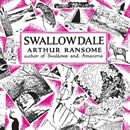
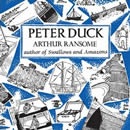
Swallowdale takes place the year after Swallows and Amazons. The Swallows - so excited with the prospect of another summer holiday in the Lake District - have to deal with an accident which holes their boat, putting it out of action for the duration of the story (a couple of weeks); this means they cannot camp on Wild Cat Island until it is mended. Instead they find a "secret" valley in which to camp, and a cave - both of which in fact remembered by their relatives from when they were children. Not to mention the "shipwreck" itself at the start of the book, again, there is a very scary element when a sudden mist descends while the the two youngest children (by then, aged only 8 and 10) are making their way back to camp on their own after an "expedition", and they become lost. Once again - despite knowing the outcome - this is especially frightening to read as an adult where you can not only clearly see that, for all their certainty, they are nowhere near where they should be, as they try to follow the (wrong) beck, but you can also fully understand the true peril of being lost and exposed on the fells.
Peter Duck is quite a different sort of book. Although it still features the S&As, and although it is described very realistically, it is definitely a bit of a tall tale of adventure. Peter Duck himself is a (fictional) old seafaring man living in retirement on the Norfolk Broads. He is referenced in Swallowdale more or less as Titty's imaginary friend, and she names the "secret" cave after him. It is suggested that this is a story made up while the S&As were staying on a Norfolk wherry with Captain Flint, during the winter between the first two books*. Because of he nature of the story, Ransome has a degree of freedom to write an exciting thriller with somewhat larger than life villains and heroes - and yet at the same time staying on the edge of reality - definite shades of Treasure Island.
* [I see wikipedia describes it as "metafiction"]
Posted on May 31, 2022 at 9:57 AM
« Previous entry | Main | Next entry »Saturday April 30, 2022
Books in April
- Low Actionby Andrew Cartmel [Read by Finlay Robertson]
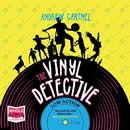 Another interesting excursion into the world of popular music - in this case: Punk.
Another interesting excursion into the world of popular music - in this case: Punk.
Our hero, the Vinyl Detective - a moniker he has come to rue - is again drawn into danger (and a murder plot) with the lure of finding a rare record. As before, I found the mystery and characters highly engaging - already looking forward to the next one.
I also have to say, I enjoy the setting of the characters lives, which is in and around Richmond and Surrey. In this book in particular there are many fairly detailed descriptions of journeys taken by bike and car to places very familiar to me and which I have great delight in unpicking. I especially hope the author does actually live in the residence described as the detective's home - which is lovely - since I know he lives or lived in that area. -
Pigeon Post by Arthur Ransome [Read by Gareth Armstrong]
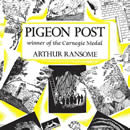 I decided to listen to the Swallows and Amazons books - it's a very long time since I read them. I do plan to approach them in order but for nostalgic reasons I had to start with this one.
It was the first one I read - aged about 8 - when I knew nothing about the book nor that it was part of any series. In truth, I was probably a bit young for it, but I went to the local library (located in a tin hut behind the Parish Hall) every week after Brownies, and I was always drawn to plain book covers (this one red with no dust cover) where the contents provided all the colour and excitement you could ever want.
I decided to listen to the Swallows and Amazons books - it's a very long time since I read them. I do plan to approach them in order but for nostalgic reasons I had to start with this one.
It was the first one I read - aged about 8 - when I knew nothing about the book nor that it was part of any series. In truth, I was probably a bit young for it, but I went to the local library (located in a tin hut behind the Parish Hall) every week after Brownies, and I was always drawn to plain book covers (this one red with no dust cover) where the contents provided all the colour and excitement you could ever want.
At the time I remember being completely mystified in trying to keep track of a rather large number of children - introduced all at once - and by the fact that they all called each other Captain, Able Seaman, and so on, when there were no boats in sight. I think in hindsight that I must have struggled with the reading - or was simply missing the experience to really understand what was happening - because it was quite a surprise to find how thrilling the plot is. The children face real jeopardy from a wild fire, which, as an adult, makes you sick with fear - even when you know the outcome...
Despite that, there are a lot of interesting nuggets of information in the book which clearly stayed with me into adulthood, without my ever consciously remembering where they came from, and it was fun to rediscover them. - A Rising Man, A Necessary Evil, Smoke and Ashes, A Death in the East,
and The Shadows of Men by Abir Mukherjee [Read by Simon Bubb]For me, these books are wonderful, and splendidly narrated by Simon Bubb.
Set in India, just after the first World War, it's the time of the British Raj, a time of nationalistic agitation against direct rule and India's push for independence. Again for me, I think they are perfectly pitched - and I feel comfortable in that view because of the author's ethnicity. Abir Mukherjee is a Scottish Bengali author, so to my mind he is able to tread a tricky line describing the inherent injustice of the era but also with some insight into "Britishness" and all that that conveys.
His two protagonists are Captain Sam Wyndham (ex policeman relocated from Scotland Yard), and Sergeant Surendranath Banerjee (educated in England and called Surrender-not, by his British superiors, claiming to be unable to pronounce his name). Banerjee has rejected his family's plan for his career and instead chose to join the police; in the first few books he is accepting of the status quo, however I think his attitudes harden as the author uses the novel to reflect social issues of the time. Wyndham's attitude to politics seems moderately neutral, especially compared with his peers in the force - but then he has his own internal demons from his experiences fighting in the war in Europe (WW1) to deal with. He does offer a certain wry cynicism in his thinking, but not generally expressed. I find his attitudes somewhat warmly familiar. My own Father was in India in the 1930's up until independence. He was first in the British Army and then later the Indian Army, and he definitely had no chauvinistic illusions about Britain's "right to rule", or the general superiority of the then rulers. At the same time, he wasn't standing up to be counted - just doing a job. At the current point in the stories, Sam reminds me of him - probably without the opioid addiction though...
We are now up to the 5th book, but I'm not quite up to date in my reading yet.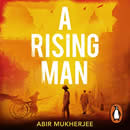
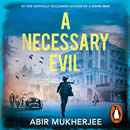
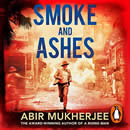

Posted on April 30, 2022 at 8:36 AM
« Previous entry | Main | Next entry »Thursday March 31, 2022
Books in March
- Troubled Bloodby Robert Galbraith[Read by Robert Glenister]
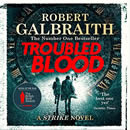 I guess this is another one of those I'd been saving up for a rainy day, and it did not disappoint. It is a long book - I believe JK Rowling has been criticised for this in general - but fans are as much interested in the story of the characters as in the mystery plot so I can't see there will be many complaints. As to the plot: it is pretty complex and, in hindsight, highly improbable; however it's told in such a way that disbelief is suspended and it becomes wholly convincing. Strike and Robin investigate a 20 year old unsolved missing person case - with little hope of resolution after so many years. On the plus side, as they are not the police, and as it is all so long ago, some witnesses are more forthcoming than they were at the time - whilst on the negative side, others are more determined than ever that some facts should never be revealed. Add to this a fascinating diversion into the occult as they try to decipher the long-dead DI's casebook, (written as he descended into a mental breakdown), and we are all set for a jolly time!
I guess this is another one of those I'd been saving up for a rainy day, and it did not disappoint. It is a long book - I believe JK Rowling has been criticised for this in general - but fans are as much interested in the story of the characters as in the mystery plot so I can't see there will be many complaints. As to the plot: it is pretty complex and, in hindsight, highly improbable; however it's told in such a way that disbelief is suspended and it becomes wholly convincing. Strike and Robin investigate a 20 year old unsolved missing person case - with little hope of resolution after so many years. On the plus side, as they are not the police, and as it is all so long ago, some witnesses are more forthcoming than they were at the time - whilst on the negative side, others are more determined than ever that some facts should never be revealed. Add to this a fascinating diversion into the occult as they try to decipher the long-dead DI's casebook, (written as he descended into a mental breakdown), and we are all set for a jolly time!
Robert Glenister is a simply brilliant reader, and to me he particularly excels himself with this book. He is truly narrating rather than acting out but manages to voice each character quite distinctively, and even includes the "stage directions" as written (yawns, coughs etc) without ever over-doing it or becoming a distraction from the text.
I think this illustrates a bit of a loss for Mark Billingham's books, which are now narrated by the author; Mark is brilliant, but a comedian first and actor second, (actually I should revise that immediately as I think that these days he has to be classed as an author first). -
The Edge by Dick Francis [Read by Tony Britton]
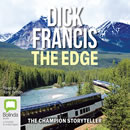 Dick Francis' books always have a "theme" and they are always at their best when that theme sticks to racing. However in this book the "theme" is not only racing but also a good deal about the Canadian railway system, as the entire action of the plot is on board a racing "special" which is transporting owners and horses between the race venues.
Dick Francis' books always have a "theme" and they are always at their best when that theme sticks to racing. However in this book the "theme" is not only racing but also a good deal about the Canadian railway system, as the entire action of the plot is on board a racing "special" which is transporting owners and horses between the race venues.
Some other readers noted - as did I - that the more gripping elements were a bit diluted since the hero, working under cover throughout, never really confronted the the villain of the piece in his true persona. But in truth, the book was not among his best because it was published after Mary had died, and I think there is no doubt when considering the Francis catalogue, that she put the true magic into the books. I think his technical information, structure, and plotting are all sound, but the gut-wrenching emotion, and thrilling sense of jeopardy, are missing without her influence. - The Department of Sensitive Crimes, The Strange Case of the Moderate Extremists , The Talented Mr. Varg, and The Man with the Silver Saab
by Älexander McCall Smith [Read by Saul Reichlin]This is an amusing set of tongue-in-cheek mysteries from "Älexander" McCall Smith. It satirises the "scandi-noir" books, dwelling excessively on philosophy and ethics (somewhat at the expense of plot). Enjoyable rather than ground breaking.
It's a particularly nice touch to have Saul Reichlin's gravelly narration, as heard in the famous Dragon Tattoo (Millenium) series - and others.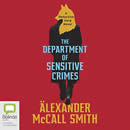
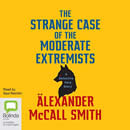
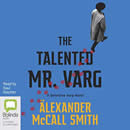
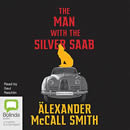
Posted on March 31, 2022 at 11:15 AM
« Previous entry | Main | Next entry »Monday February 28, 2022
Books in February
- Lessons in Chemistry by Bonnie Garmus
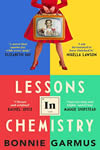 I chose to review an early copy of this book (courtesy of Random House and NetGalley) because, as I trained as a chemist, the title interested me. To be clear, I did not expect it to be about chemistry, and - if my friends are anything to go by - I need to reassure other readers that it is not really about chemistry. It is a brilliant piece of story-telling with a fair mix of triumphs, tragedies, and humour, but with a set of very serious messages - which you can either enjoy - or ignore.
I chose to review an early copy of this book (courtesy of Random House and NetGalley) because, as I trained as a chemist, the title interested me. To be clear, I did not expect it to be about chemistry, and - if my friends are anything to go by - I need to reassure other readers that it is not really about chemistry. It is a brilliant piece of story-telling with a fair mix of triumphs, tragedies, and humour, but with a set of very serious messages - which you can either enjoy - or ignore.
The major problem in life for the heroine is misogyny in science - and the secondary problem is her uncompromising attitude to it. The author is able to magnify these points as the book is set in the America of the early 1960s, where women do not have the brains to pursue serious careers, and when they do, must be suitably modest, and accepting of an inferior role. Although much less overt today, we know that underlying attitudes (unintentional bias at the very least) still severely limit women's success in science (and any other professional fields you care to mention). I read that the author "worked widely in the fields of technology, medicine, and education" and suspect the book is a reflection of her experiences, first or second hand.
I notice the book's publicity blurb focuses on the central character - but the book is crammed with delightful characters - all brimming with idiosyncrasies, and who are in many ways easily as interesting as her: the precocious daughter, the abused neighbour, the vicar who doesn't believe in God, the slighted secretaries... the dog... In fact they are the real "enablers" who, through their extraordinary natures and kindnesses, give her some degree of freedom to be so fiercely determined in her outlook.
I can't recommend this book enough - like Nigella Lawson, I was sorry when it came to an end.
[I read that it has already been taken up by Apple to become a TV series - an obvious development - but I dearly hope they do it justice.] - The Appeal by Janice Hallett [read by Aysha Kala, Daniel Philpott, Rachel Adedeji, and Sid Sagar]
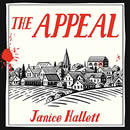 I think this is an astonishingly good first novel; the major thing wrong with saying that is that it makes it sound as though it "could be improved on with practice" and this is definitely not the case in my opinion. In fact, it's a really intriguing mystery, presented to the reader in an highly original manner. A series of emails and other documentation is shared with us, as it is in the process of being scrutinised by some junior members of a legal team in preparation for an appeal hearing. It is fascinating to eavesdrop on these messages, as they gradually reveal a conspiracy (and then a murder) as well as the characters of all the players - and they really are "players", all being stalwarts of village society and members of the local amateur dramatic society. The "appeal" is a clever title referring not only to the court appeal, but also a potential fraud relating to a charity appeal.
I think this is an astonishingly good first novel; the major thing wrong with saying that is that it makes it sound as though it "could be improved on with practice" and this is definitely not the case in my opinion. In fact, it's a really intriguing mystery, presented to the reader in an highly original manner. A series of emails and other documentation is shared with us, as it is in the process of being scrutinised by some junior members of a legal team in preparation for an appeal hearing. It is fascinating to eavesdrop on these messages, as they gradually reveal a conspiracy (and then a murder) as well as the characters of all the players - and they really are "players", all being stalwarts of village society and members of the local amateur dramatic society. The "appeal" is a clever title referring not only to the court appeal, but also a potential fraud relating to a charity appeal.
I'd also like to confirm that it has a very satisfactory ending - always a key point for me!
This book was a Christmas gift, but I actually listened to most of it as an audio book. Given the nature of the presentation (emails, post-it notes, facsimiles of flyers, whatsapp messages etc), representing it off the page was pretty challenging, and, once again, very well done. [On some occasions I was glad to have the book to refer to, but I think it would have worked well enough without it]. -
Cry Baby by Mark Billingham [read by Mark Billingham as narrator, joined by a host of others including Robert Glenister and David Morrissey ]
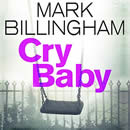 A prequel: we've gone back to 1996, and the point in Thorne's life where he's breaking up with his wife, and in the process of purchasing his famous north London bachelor flat. It's a case involving a child abduction which is doubly traumatic for Thorne as he is still haunted by dreams of a previous, and similar, case which ended all too tragically.
A prequel: we've gone back to 1996, and the point in Thorne's life where he's breaking up with his wife, and in the process of purchasing his famous north London bachelor flat. It's a case involving a child abduction which is doubly traumatic for Thorne as he is still haunted by dreams of a previous, and similar, case which ended all too tragically.
In the epilogue, we return to the present with Thorne briefly reflecting on the case. My only reason for mentioning this is that Mark now puts (lovely) Helen definitively in the past (yes, I'm still annoyed), with Thorne relishing thoughts of moving on. I can see from a writer's point of view, it's easier to have new characters to explore, and I would also say that this inability to settle is very "real" but we have now got to the stage where Thorne will for ever be playing at Jack the Lad in his (I interpret) slobby flat, continually moving on as each new woman finally observes his feet of clay.
The most interesting thing about this audio book was that it was presented almost as radio drama. The prose was narrated by Mark - so the complete book was actually read out - but all the dialogue was voiced by individual actors, and it really worked so well; all credit to the actors and editors for making it come across so naturally, (because I suspect it was not like a play where all the cast can be recording in one room as a piece). David Morrissey got to reprise his role as the voice of Thorne, and Robert Glenister, who was missing his role as narrator on previous books, had a chance to be included. I would not like all audio books to be adapted in this way but it really was very original and refreshing. -
Flowers for the Judge by Margery Allingham [Read by David Thorpe]
 As I mentioned when I read the Campion novel last month, I have read only one other Margery Allingham book previously, (Black Plumes), and I found it fairly light-hearted and none too riveting. Mr Campion's Farewell was very much in the same vein - but then, it was not actually written by Allingham, although I had thought it a fairly good pastiche. Hence this book was all a bit of a surprise - a pleasant surprise.
It had an interesting plot, and, as far as I can judge, was pretty well written. I was quite captivated by the dramatic descriptions of the coroner's court and the Old Bailey.
As I mentioned when I read the Campion novel last month, I have read only one other Margery Allingham book previously, (Black Plumes), and I found it fairly light-hearted and none too riveting. Mr Campion's Farewell was very much in the same vein - but then, it was not actually written by Allingham, although I had thought it a fairly good pastiche. Hence this book was all a bit of a surprise - a pleasant surprise.
It had an interesting plot, and, as far as I can judge, was pretty well written. I was quite captivated by the dramatic descriptions of the coroner's court and the Old Bailey.
[I note that a reviewer on "Good Reads" states "at times, this is one of the best books that Allingham has written" - and also mentions the courtroom scenes which confirms to me that this may be one of her better Campions.]
A point of interest to me: the inquest seemed to have a jury - which I thought a bit odd and was driven to look it up; it seems that they have been "rarely used" in England since 1927, and are only mandatory in very specific circumstances - since 1977, their rulings do not commit a person to trial, (a change which took place after Lord Lucan was charged in 1975 - presumably in his absence). As is often the way, having never noticed them before, I subsequently saw a coroner's jury performing in an old black and white movie. - Slow Horses, Dead Lions, and The List
by Mick Herron [Read by Seán Barrett]
My friend Tony recommended these books some good while ago, and I was pleased to find them in audio book form. They are really gripping and well-written and I can hardly wait to continue with the series.
The overall style owes a lot to Le Carré, who popularised a much more dangerous and less- glamorous view of spies - intentionally a polar opposite to the cinematic version of James Bond. Personally, I enjoyed these stories more than Le Carré in general, (probable exception being Tinker Tailor...), who is more cerebral, and much more poignantly sad. I can't comment intelligently on the comparative writing skill, but although these retain the introspection, sense of anxiety, and tragedy, they are more overt thriller than psychological thriller, and each story has a comforting sense of resolution at the end, (which always suits me better in this type of fiction!).
Apparently they are due to be released on April 1st as a 6 part series on Apple TV. Gary Oldman plays Jackson Lamb (a kind of subverted George Smiley) - hard to imagine since Lamb is overwhelming fat but from the pre-release photos they seem to have focussed on other characteristics - and Kristin Scott Thomas (a personal favourite of mine) is perfectly cast as Diana Taverner.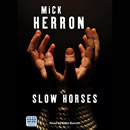
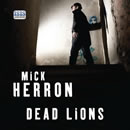
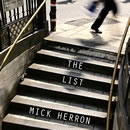
Posted on February 28, 2022 at 7:06 PM
« Previous entry | Main | Next entry »Monday January 31, 2022
Books in January
- The Twyford Code by Janice Hallett
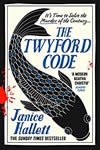 Janice Hallett's second book offers another (quite different) innovative way of presenting a mystery story. Much of the text is a digital transcription of a number of audio files, apparently found on the mobile phone of a - now missing - ex-convict. This automated digitisation process is not perfect, and results in a writing style which has the effect of emphasising the educational background and underprivileged upbringing of the narrator. Indeed a lot of the story stems from his attempts to unravel a mysterious, somewhat traumatic, and imperfectly recalled event from his schooldays. The "code" of the title is (possibly) embedded in some books for children written in the 1940s by a prolific authoress now out of favour due to her mainly sexist and racist attitudes - sound familiar? I loved it. We are treated to short excerpts of Enid Blyton pastiche - clearly great fun for Hallett to write - and the protagonist, Steven, as a relatively newly-literate adult, seems to find the stories as compelling as most juniors did in their era.
For myself, I was totally hooked as Steven unravelled the mystery, if not partly because the plot was (fully intentionally I believe) not without some similarities to those children's adventure yarns of old. The episodic nature of the "files", plus the constant fear for Steven's safety, made the book hard to put down.
Janice Hallett's second book offers another (quite different) innovative way of presenting a mystery story. Much of the text is a digital transcription of a number of audio files, apparently found on the mobile phone of a - now missing - ex-convict. This automated digitisation process is not perfect, and results in a writing style which has the effect of emphasising the educational background and underprivileged upbringing of the narrator. Indeed a lot of the story stems from his attempts to unravel a mysterious, somewhat traumatic, and imperfectly recalled event from his schooldays. The "code" of the title is (possibly) embedded in some books for children written in the 1940s by a prolific authoress now out of favour due to her mainly sexist and racist attitudes - sound familiar? I loved it. We are treated to short excerpts of Enid Blyton pastiche - clearly great fun for Hallett to write - and the protagonist, Steven, as a relatively newly-literate adult, seems to find the stories as compelling as most juniors did in their era.
For myself, I was totally hooked as Steven unravelled the mystery, if not partly because the plot was (fully intentionally I believe) not without some similarities to those children's adventure yarns of old. The episodic nature of the "files", plus the constant fear for Steven's safety, made the book hard to put down.
However, the above only describes some elements of what made the book appeal so much to me - for the rest, you will have to read it yourself. Overall, the story is a contemporary thriller completely grounded in a gritty reality, and has the most wonderful twist of a conclusion, which moves us far beyond childhood nostalgia and the Famous Five. -
The Crimson Petal and the White by Michel Faber [Read by Jill Tanner]
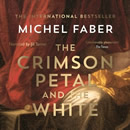 I watched the BBC production of this book (over 10 years ago as it turns out) starring Romola Garai. It was an excellent production and I recommended the book to Alison (she likes a chunky read to get her teeth into) but I never read it myself. I do remember wondering how they managed to get such a lengthy tome into 4 episodes. However, now I have read it in full I think they did a remarkably good job. Of course, I would not recommend the screen version as a substitute for the book itself; the latter is wonderfully rich, full of fascinating characters, absorbing descriptions, and evoking a fantastic picture of Victorian life at every level. Despite its length I was sorry to have to finish it. It's hardly surprising that many readers (and screen watchers) were eager for more stories and episodes. However, I think the author had said all he wanted about the characters. The ending was left a little open, and the audience reaction reminded me of The Magus with everyone wanting to be explicitly reassured that it "all turned out alright". This includes me, since I had thought that there might more closure in the book itself, but this was not so. Nonetheless, I think, perhaps more than Fowles, the author strongly indicates that Sugar and Sophie will be "OK", (and that William never will be).
I watched the BBC production of this book (over 10 years ago as it turns out) starring Romola Garai. It was an excellent production and I recommended the book to Alison (she likes a chunky read to get her teeth into) but I never read it myself. I do remember wondering how they managed to get such a lengthy tome into 4 episodes. However, now I have read it in full I think they did a remarkably good job. Of course, I would not recommend the screen version as a substitute for the book itself; the latter is wonderfully rich, full of fascinating characters, absorbing descriptions, and evoking a fantastic picture of Victorian life at every level. Despite its length I was sorry to have to finish it. It's hardly surprising that many readers (and screen watchers) were eager for more stories and episodes. However, I think the author had said all he wanted about the characters. The ending was left a little open, and the audience reaction reminded me of The Magus with everyone wanting to be explicitly reassured that it "all turned out alright". This includes me, since I had thought that there might more closure in the book itself, but this was not so. Nonetheless, I think, perhaps more than Fowles, the author strongly indicates that Sugar and Sophie will be "OK", (and that William never will be).
Faber did subsequently write a short story collection The Apple: Crimson Petal Stories (which I did read) where he "returns to Silver Street to find it still teeming with life, and conjures further tantalising glimpses of Sugar, Clara, Mr Bodley" etc. This is not any kind of sequel - which it does not claim to be - nevetheless, a large number of fans seemed to find it disappointing, having had high expectations of that "closure". I think this says more about the readers than the book. -
Mr Campion's Farewell by Mike Ripley [Read by David Thorpe]
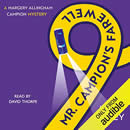 As I referenced when talking about Dune, Dick Francis, etc, I see that Albert Campion has become a franchise. He was a character created by Margery Allingham in the 1920s - apparently intended as a parody of Lord Peter Wimsey, which I can easily understand - but she died in 1966, and I thought so too did Campion. However, her last novel was completed posthumously by her husband, Philip Youngman Carter, who in turn wrote a couple more books, and then when he died in 1969, the baton passed, after some years, to Mike Ripley, who (with the approval and agreement of the Margery Allingham Society), completed Carter's last manuscript, which became Mr Campion's Farewell, published in 2014. (Phew!) Since then, Ripley seems to have published a Campion novel every year.
As I referenced when talking about Dune, Dick Francis, etc, I see that Albert Campion has become a franchise. He was a character created by Margery Allingham in the 1920s - apparently intended as a parody of Lord Peter Wimsey, which I can easily understand - but she died in 1966, and I thought so too did Campion. However, her last novel was completed posthumously by her husband, Philip Youngman Carter, who in turn wrote a couple more books, and then when he died in 1969, the baton passed, after some years, to Mike Ripley, who (with the approval and agreement of the Margery Allingham Society), completed Carter's last manuscript, which became Mr Campion's Farewell, published in 2014. (Phew!) Since then, Ripley seems to have published a Campion novel every year.
So, back to the point - this novel.
I enjoyed it for what it was... which was, I guess... everything I imagined it would be.
After all, Ripley is a talented crime writer so really no less than I would have expected from him, retaining a fairly light-hearted treatment for a mystery thriller. I was particularly delighted at the absence of the brittle dialogue, and impenetrable 1920s "bright young things" jargon, which made the last Allingham book I listened to - Black Plumes - almost impossible to understand. So I think if you like the originals, you will like this one - as I did.
At the same time I noted that at one point, while considering the "goings on" he is investigating at the quaint English village of Lindsay Carfax - which I can tell you has distinct shades of Christie's Bertram's Hotel - Campion concludes that the (not-so) secret society of "Carders", seems "all a bit childish really". And for me: completely worthy of Enid Blyton I would say...
Posted on January 31, 2022 at 11:12 PM
« Previous entry | Main | Next entry »Friday December 31, 2021
Books in December
-
High Island Blues by Ann Cleeves [Read by Seán Barrett]
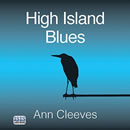 This is the last of the Palmer-Jones series, written in 1996. The plot is excellent, starting with an investigation into a possible fraud, which is then disrupted by an old friend needing help in the US as he has become the prime suspect in a homicide. George and Molly's relationship is realistically observed as they pursue their enquiries from opposite sides of the Atlantic - a certain tightness in communications, but with the mellow tolerance of an older couple. As often with Ann Cleeves, I found all the details about the birdwatchers most engaging. Their particular foibles are very familiar territory, as well as the more general aggravations you endure (and contribute to!) when being on holiday with a "Group". Not that any groups I have travelled with have been driven to start murdering each other - but for all I know it may have been close.
This is the last of the Palmer-Jones series, written in 1996. The plot is excellent, starting with an investigation into a possible fraud, which is then disrupted by an old friend needing help in the US as he has become the prime suspect in a homicide. George and Molly's relationship is realistically observed as they pursue their enquiries from opposite sides of the Atlantic - a certain tightness in communications, but with the mellow tolerance of an older couple. As often with Ann Cleeves, I found all the details about the birdwatchers most engaging. Their particular foibles are very familiar territory, as well as the more general aggravations you endure (and contribute to!) when being on holiday with a "Group". Not that any groups I have travelled with have been driven to start murdering each other - but for all I know it may have been close.
- The Dead of Winter by S.J. Parris [read by Daniel Philpott]
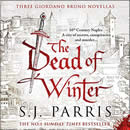 A perfect set of three short stories to complement the Giordano Bruno books. The author has taken us back to Bruno's early life as a novice monk in Naples. She has crafted the stories very cleverly, and completely convincingly brings out the character of Bruno in his youth. [I have noticed that other authors who have tried to do this - giving their ever ageing historical characters further adventures set at an earlier time - are not quite so adept at creating the younger man].
A perfect set of three short stories to complement the Giordano Bruno books. The author has taken us back to Bruno's early life as a novice monk in Naples. She has crafted the stories very cleverly, and completely convincingly brings out the character of Bruno in his youth. [I have noticed that other authors who have tried to do this - giving their ever ageing historical characters further adventures set at an earlier time - are not quite so adept at creating the younger man].
In his later life, Bruno is very worldly wise - with the exception of his understanding of women, who always seem to be his Achilles heel, and which is firmly reinforced here. It's made very clear that his "elders and betters" approach him rather like an errant schoolboy, giving him as much leeway as they can while trying to guide him wisely to cope with the complex political machinations of Italy at the time. Needless to say he is oblivious to their tolerance, and indeed, acting much like an errant schoolboy. He always seems to believe that he will be able to persuade some influential (and rich) figure to sponsor his ground-breaking academic research and writings, when it is pretty clear that anyone achieving power and influence at that time cannot afford to see him as anything but a heretic. Sadly that seems to be wholly true of the real character on which the author bases her stories, right through to the end of his life.
The three stories work well read together in sequence, and can be enjoyed whether or not you have read any of Bruno novels previously. If you like historical fiction, you will love these stories. - Moonflower Murdersby Anthony Horowitz [Read by Lesley Manville and Allan Corduner]
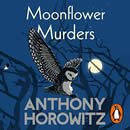 I can't believe I waited so long to listen to the follow-up to the Magpie Murders - maybe I've been "keeping it behind my ear for a rainy day" to nicely mix my metaphors. Following the pattern set in the first book, we have another "book within a book" - where the clue to the current mystery resides in an old (fictional) Detective Atticus Pund novel. Hence the two narrators who delineate the "real" story from the "fiction".
I can't believe I waited so long to listen to the follow-up to the Magpie Murders - maybe I've been "keeping it behind my ear for a rainy day" to nicely mix my metaphors. Following the pattern set in the first book, we have another "book within a book" - where the clue to the current mystery resides in an old (fictional) Detective Atticus Pund novel. Hence the two narrators who delineate the "real" story from the "fiction".
Needless to say I really enjoyed it - Lesley Manville is a terrific reader and actress, even though I'm not sure this suited her to a T quite as much as The Thursday Murder Club. However, now I discover that we are to be treated to a new TV production of Magpie Murders, starring none other than: Leslie Manville - which is bound to be terrific (she always is); sadly for me though, at the moment only on Britbox..
[I feel I might have slightly missed out on an underlying joke (in this as well as Magpie Murders) owing to my my limited perception of writing styles; Anthony Horowitz is a very clever and dedicated writer, and I feel sure he must have created a satirical style for his fictional author, Alan Conway. However, I can state with conviction that it's a great and fun book to read even if this part of the humour passes you by.] - A Capitol Death, The Grove of the Caesars, and A Comedy of Terrors by Lindsey Davis
Set against the background of Domitian celebrating his victories in Dacia, [fairly accurately depicted as blatant propaganda], Flavia looks into what appeared to be a suicide, until a witness came forward suggesting otherwise. Her husband should be investigating, but as an aedile he is bogged down with organising elements of the Triumph, about which everyone involved is deeply cynical. The couple's household is expanded by the addition of a new steward, and a "country girl" - with an abiding interest in elaborate hairstyles - who is determined to brook no opposition to a (non-existent) position as Flavia's maid. Although entertaining, I enjoyed the second book better.
Here, Manlius is again absent due to a bereavement. Flavia is left to mind the shop - that being her husband's building firm - and is witness to the discovery of a body while her team are clearing a site in Caesar's gardens. It soon becomes clear that this is not the first such event, but most of the disappearances over a period of years it seems, were ignored by the Vigiles as they were deemed to be prostitutes or vagrants of no importance. Flavia takes a different view and is soon in danger of being next on the list. This uncovering of a serial killer in the ancient world is told in the author's usual contemporary style, and, rather sadly, is highly reminiscent of a specific recent case, recently reviewed in the media, where investigations were less than thorough due to assumptions about the status of the victims. There was also a sub-plot about faking antique documents, which was passingly amusing but where the author seemed to be metaphorically winking at the reader with literary in jokes that somewhat passed me by.
Finally: Saturnalia - my favourite time of year. Lots of fun projected in a very contemporary manner, with domestic scenes we can all recognise. It's lots of fun, but this one could never complete with my absolute favourite "Saturnalia read by Christian Rodska.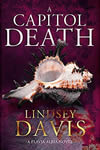
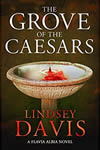
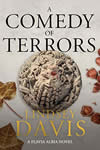
Posted on December 31, 2021 at 6:25 PM
« Previous entry | Main | Next entry »Tuesday November 30, 2021
Books in November
- The Paris Apartment by Lucy Foley
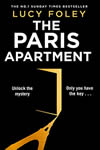
A second exciting thriller from Lucy Foley.
Again she favours the "locked room" idea, with the suspects based around the characters inhabiting an apartment block in Paris (clue's in the name). But... I say "suspects", and yet what exactly are they suspected of? True, there seems to be a lot to be suspicious of, and much disquieting behaviour ... but mostly it's just a sense of fear and anxiety, nicely conveyed through the eyes of Jess, who is (as in The Hunting Party) one of multiple narrators - and she is the one we most readily identify with. Right from the start, we are drawn into the mystery as the relatable Jess is stumbling around Paris, with little ability in the French language, trying to reach her brother's home - only to find, once there, that her brother seems to have taken off. Jess herself has done a moonlight flit from England (Brighton), so with no funds she has no choice but to stay in "The Paris Apartment".
As each character takes over the narrative, they each reveal their own individual nameless fears. I'm reading that other reviewers find the characters (including Jess) unlikeable - but I think that's pretty well the whole point. Gradually the overall picture of the relationships between the apparently unconnected residents begins to emerge, making it a mystery thriller that is hard to put down.
There is a wonderful twist at the end - and the end itself, (again at the risk of a spoiler), while not conventionally boy/girl/sunset, nonetheless provides a satisfying conclusion. -
The Man Who Died Twice by Richard Osman [Read by Lesley Manville]
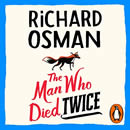 Another delightful outing for the old folk. Once again, I loved the book - perfectly read by Lesley Manville. If there is any "but", it's a similar concern that I had after the first one: namely that, if this is to be a lengthy series, it has to evolve to rely more on plot than lovable characters. For me, like many others I feel sure, the characters are all, and the plot much less so. I have no quibble with the design of the plots so far, but it's the characters that melt your heart, (assuming you have one - no offense to my my sister but she simply did not warm to the first book at all, and expressed the view that the plot was too complex to follow - but then I have no doubt she will not read any more in the series notwithstanding the plots).
Another delightful outing for the old folk. Once again, I loved the book - perfectly read by Lesley Manville. If there is any "but", it's a similar concern that I had after the first one: namely that, if this is to be a lengthy series, it has to evolve to rely more on plot than lovable characters. For me, like many others I feel sure, the characters are all, and the plot much less so. I have no quibble with the design of the plots so far, but it's the characters that melt your heart, (assuming you have one - no offense to my my sister but she simply did not warm to the first book at all, and expressed the view that the plot was too complex to follow - but then I have no doubt she will not read any more in the series notwithstanding the plots).
My favourite quote?
"She looks over at Bogdan, sitting there, silent in his sunglasses - like Mr Darcy." - The Killings at Kingfisher Hill by Sophie Hannah [read by Julian Rhind-Tutt]
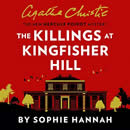
All the special audiobook treats saved for one month....
Again - I love Sophie Hannah's extensions to the Poirot catalogue. They are written with such love of the subject, as well as tongue-in-cheek respect. I feel she knows Poirot so well, and through Catchpool (slightly less in awe of his friend than Hastings was) she is able to poke gentle fun at the greatest detective mind of all time. This plot truly is convoluted to say the least, but very much in the Christie style, with a murderess already destined for the gallows waiting to be exonerated by Poirot, and with double bluffs and mistaken identities abounding.
It was not possible for me to read (listen to) this and not be interested to know more of "Peepers", the board game broadly described in the book. It's not a wholly key part of the plot, but Poirot and Catchpool use their (mock) enthusiasm for the game as a means of inveigling themselves into the victim's household. You can read about it on agathachristie.com, and even take up the challenge to write your own rules and describe how to play. What we know so far is:- The rules are complex
- The minimum game players are two
- The game has a board, and a number of round discs with eyes on them
- It is unlikely to be a large board game, as Poirot packed it into his luggage
- It is not like chess
- It is not like Monopoly
-
Their Little Secret by Mark Billingham [read by Mark Billingham]
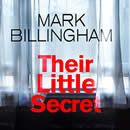 In this book Mark takes on the interesting subject of the psychosis known as "folie à deux", told in part from the insane criminals' points of view. Mark has proved to be excellent at writing in this way - notably in my opinion in Rush of Blood and Die of Shame - and this is no exception. Investigated by Thorne with the help of Tanner, and (of course) his old china plate Hendricks. The plot is thrilling with a twist at the end (which I sort of guessed at but not through any shortcoming in the writing).
In this book Mark takes on the interesting subject of the psychosis known as "folie à deux", told in part from the insane criminals' points of view. Mark has proved to be excellent at writing in this way - notably in my opinion in Rush of Blood and Die of Shame - and this is no exception. Investigated by Thorne with the help of Tanner, and (of course) his old china plate Hendricks. The plot is thrilling with a twist at the end (which I sort of guessed at but not through any shortcoming in the writing).
I have two quibbles - the first is quite minor. I am occasionally exasperated at Thorne's apparent ignorance about certain topics which I consider to be general knowledge. I know that the concept of "general knowledge" is a bit false - to quote Chris Tarrant in respect of Who Wants to be a Millionaire? "all questions are easy if you know the answer". So I accept that what I consider to be general knowledge about, for example, "art" might be a closed book to a highly focussed North London DI with an abiding interest in country music. However I cannot believe he is totally unfamiliar with the concept of folie à deux given that it has been applied to one of the most notorious cases in the UK in the last half century. Some of Thorne's other areas of ignorance cannot reflect Mark's own, and therefore occasionally it comes across as a bit false.
My second quibble is completely personal. As I suspected he eventually might, Mark has chosen to ditch Helen, Thorne's most recent love interest. This has lost my respect for the character - and the author to some degree. I think it is hard to write about an essentially flawed (only in so far as we all are) personality in such a tough job and also have him keep a stable home life - in fact it's probably not even realistic - but I wish Mark had risen to the challenge. Instead Thorne is apparently going to remain in his laddish drinking-after-work-followed-by-a-take-away-curry-then-back-to-his-flat, interspersed with unlikely love interests (how old IS he? is he THAT attractive as a proposition?); and sadly, I suspect, all simply because it's too hard to write a happy home life. It's no coincidence that our popular fictional detectives seem to live alone* [even "Lewis" had to lose the wife once he took over the franchise]. Weirdly though, for me (again very personal), the most realistic point of contention was the problem of adjusting to living arrangements south - as opposed to north - of the river. It may seem bizarre but having lived around London I have observed that my friends retain a deep allegiance to one or the other, and I can see it might be one of those apparently trivial things that make a relationship impossible to sustain.
But I really did like Helen.
[* A notable exception is Caroline Graham's DI Barnaby, who was probably more realistic in the books than in the TV adaptations, though long-suffering wife, Joyce, was portrayed in a fairly balanced way.].
Posted on November 30, 2021 at 2:39 PM
« Previous entry | Main | Next entry »Sunday October 31, 2021
Books in October
- The Night Fire by Michael Connelly
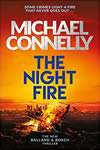
Renée Ballard and Harry Bosch join forces once again... In fact we have essentially three story lines loosely interwoven - each one featuring his three main protagonists: Bosch, Haller, and Ballard. Along the way he includes a few interesting police anecdotes, which I am sure he has picked up from real-life reminiscences. The latter makes it almost a short-story collection, along the lines of the Frost novels - a technique that served the TV serialisation very well.
Although some readers did not much appreciate the book, and see it as pointing the way for Bosch's exit, I enjoyed it very much. I can see Connelly might be thinking along these lines, but, although his days as a paid police investigator may be numbered, Bosch is only slightly older than the author himself, so I see no reason why he would not continue as long as Connelly continues to write. All he is showing is that Bosch can be a key player without having to be the "main (wo)man". As far as Bosch's health is concerned, I am sure Connelly is including realistic (if not his own) experiences of what it's like to age.... His days of great physical exertion are over - even to the (realistic again) degree of not being able to tail a suspect reliably for any prolonged length of time. - A Step So Grave and The Turning Tideby Catriona McPherson
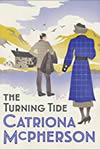
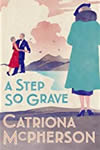
We are into 1935 and Dandy has to cope with the prospect of her eldest's forthcoming marriage. The families are united at the potential in-laws' island home, with Dandy having great misgivings, which are only confirmed as she perceives that Donald seems more entranced by his potential Mother-in-Law, Lavinia, (says it all), than with Mallory, his betrothed. That aside - in fact, we are observing the great social changes of the period, and Mallory proves herself to be a dependable "modern" woman with relatively socialist ideas who is destined (in the fullness of the next two books) happily enough to take on an estate without the erstwhile expectations of a full complement of household servants.
Needless to say all does not go well at Wester Ross, where they have to deal with a gruesome murder, which does nothing to enhance the mood for romance and wedding bells.
In the second book, Dandy and Alec are called away to help solve the problem of a ferryman (woman) who has apparently experience a psychotic episode. The solution might seem simple ie engage the help of the medical profession, were there not an added mystery surrounding the drowning of a young man known to Dandy, who apparently fell into the water while inebriated....
It seems that everyone has secrets and each tells a different story; nothing seems to add up.
As usual, these books are splendidly researched, and set in marvellously historic locations - obviously with some imaginative embroidery. I always want to visit these places after reading the books, such that I begin to think Catriona should be sponsored by the Scottish Tourist Board. -
The Woolly Hat Knitting Club by Poppy Dolan [Read by Lizzie Wofford]
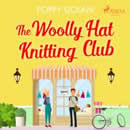
The story begins with Dee Blackthorn, a highly focussed PR executive working in a (I hope not quite realistic) cut-throat company, when she is unexpectedly (and undeservedly) fired. This is a disaster on many levels but it does mean she can more easily step in to help her brother, who badly needs assistance - and along the way she reconnects with some old friends from "back home". I originally chose this book on the strength of the title, (which seemed to nicely encompass my interests), and also the cover, (which - along with the title - implied it would be a light-hearted story about a club). I had a preconceived idea that it would be like, for example, the Jane Austen Book Club, ie mainly about the meaning of life etc, and which could have centred on any activity.
However, likening it to other works doesn't give it enough credit. I loved it as a romcom, and I cannot praise Poppy enough for a really delightfully fresh and entertaining book.
Poppy's conversational style means it is perfect as an audio book, and Lizzie Wofford gives excellent voice to Dee. The conversations are so natural, they read almost like a script; along with the highly visual descriptive detail, I felt it could translate easily into a live performance.
Surprisingly to me, I identified probably more with Dee than the "lovely craft people" (even though I hope I am one), and new Mothers, (definitely not one); oddly, I found the details about Dee's business and commercial life of more interest than the knitting. After the first few chapters I did begin to wonder who exactly the book was aimed at as it seemed a bit Mills & Boonish - and I hasten to say I don't necessarily mean that in a derogatory sense since M&B are very skilled in what they do. A bit more reading, however, and it became much clearer to me that, of course, this is a romantic (comedy) novel and as such, anyone who knows this author's work will know exactly what to expect and thoroughly enjoy it - as I did.
[In addition, I have to mention that, although there is a lot of knitting, we're not too bogged down with it, and congratulations are due that all the technical detail is completely correct - nothing worse than constantly being bugged by inaccuracies in a subject you know well!.] -
Murder Under the Sun by Agatha Christie [Read by Hugh Fraser]
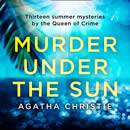 The stories are:
The stories are:
- The Rajah's Emerald - featuring James Bond (no - not THE James Bond)
- The Oracle at Delphi - featuring Mr Parker Pyne
- Wasp's Nest - featuring Hercule Poirot
- A Death on the Nile - featuring Mr Parker Pyne (no - not THE Death on the Nile)
- Problem at Pollensa Bay - featuring Mr Parker Pyne
- Have You Got Everything You Want? - featuring Mr Parker Pyne
- Triangle at Rhodes - featuring Hercule Poirot
- The House at Shiraz - featuring Mr Parker Pyne
- Double Sin - featuring Hercule Poirot
- The Gate of Baghdad - featuring Mr Parker Pyne
- The Regatta Mystery - featuring Mr Parker Pyne
- The Pearl of Price - featuring Mr Parker Pyne
- The Man from the Sea - featuring Mr Satterthwaite and Harley Quin
Posted on October 31, 2021 at 6:57 PM
« Previous entry | Main | Next entry »Thursday September 30, 2021
Books in September
-
A Song for the Dark Times by Ian Rankin [Read by James Macpherson]
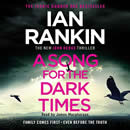 I've been saving this book to listen to as a special treat. In that respect it did not disappoint. It is clear that the author is now desperately trying to keep Rebus in the action - as we all love him - with some creative (though nicely plausible) strategies. In this book, he achieves it with essentially two story lines - one revolving around Rebus and a murder affecting his family, while the other is a "normal" police case handled by Siobhan Clarke and Malcolm Fox. The cases have a tangential link, allowing for necessary communication between our heroes, but equally could have stood alone.
I've been saving this book to listen to as a special treat. In that respect it did not disappoint. It is clear that the author is now desperately trying to keep Rebus in the action - as we all love him - with some creative (though nicely plausible) strategies. In this book, he achieves it with essentially two story lines - one revolving around Rebus and a murder affecting his family, while the other is a "normal" police case handled by Siobhan Clarke and Malcolm Fox. The cases have a tangential link, allowing for necessary communication between our heroes, but equally could have stood alone.
I am glad Rebus still has his place in the books, but I do think Clarke and Fox are strong characters in their own right, and could easily carry a plot without him. -
Guilty Not Guilty by Felix Francis [Read by Martin Jarvis]
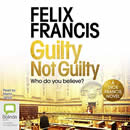 Overall a well-plotted thriller, despite not being my favourite kind, as we "know" the murderer all along. However there is a certain delight in the totally unexpected twist at the end - playing excellently on the book's title. The final resolution (though not the "guilt" aspect) is left open - but even if you don't like that kind of ending, I think everyone will feel one way or another that they "know" what will happen.
Overall a well-plotted thriller, despite not being my favourite kind, as we "know" the murderer all along. However there is a certain delight in the totally unexpected twist at the end - playing excellently on the book's title. The final resolution (though not the "guilt" aspect) is left open - but even if you don't like that kind of ending, I think everyone will feel one way or another that they "know" what will happen.
We all know Martin Jarvis is a genius so I expect to be largely ignored if I say "I would not have read it like that". As I'm not a professional - actor or narrator - I could never have voiced the characters in any plausible way to allow the listener to understand who was speaking and generally what was going on. However, I think the hero's agonised pontifications about his dear wife and her problems - which were, in all seriousness, extremely tragic - could have struck more of a cord with me if voiced a little differently. Even though we are hearing the character's inner thoughts, which may indeed be desperate, he has a long-term agony which I think just catches him unexpectedly when he thinks of her - rather than a continual wailing lament. As I've said before, I don't think Felix writes emotions very well, but I do think that that part of the story could have perhaps been improved by reining in what was written on the page by tone of voice.
Other than that, I did find the hero's attitude to being suspected of a murder a little different from how I feel I might have behaved. Luckily it's never happened to me, so who knows...? Maybe it's a man/woman thing. I think I might not have stood up to the police - which undoubtedly would have been a mistake in any case - and tried to persuade them to look elsewhere. -
The Complete Steel by Catherine Aird [Read by Robin Bailey]
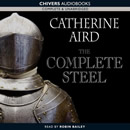 I've had a few Catherine Aird books on my radar for a long time without knowing anything about the author or her style of story. I now find she writes slightly-tongue-in-cheek police procedurals, with a suitable inspector (Sloan) and his sidekick (DC Crosby) - whom I internally equated to Lynn Truss' (did I place the apostrophe correctly?) Constable Twitten, despite the fact that Sloan is a very intelligent copper with a very dry wit, rather than an idiot, and the stories are not outright comedies.
I've had a few Catherine Aird books on my radar for a long time without knowing anything about the author or her style of story. I now find she writes slightly-tongue-in-cheek police procedurals, with a suitable inspector (Sloan) and his sidekick (DC Crosby) - whom I internally equated to Lynn Truss' (did I place the apostrophe correctly?) Constable Twitten, despite the fact that Sloan is a very intelligent copper with a very dry wit, rather than an idiot, and the stories are not outright comedies.
The tone of the novels is definitely nostalgic, and a bit cozy; the author has been likened to M C Beaton and Caroline Graham - I would say somewhere between the two, and if you like them you will probably like Aird. Lastly but no means least(ly), Robin Bailey provides the perfect voice for the narrative. -
The Lost World by Sir Arthur Conan Doyle [Read by Glen McCready]
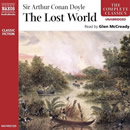 This is an excellent adventure story. I did wonder if it pre-dated the first Holmes book as in A Study in Scarlet the solution to the murder mystery is explained in the "story within a story", which takes up half the book. It led me to think that Doyle was perhaps happier writing tales of adventure. Indeed I think Doyle found it hard to sustain complete novels based on the Holmes type of mystery and deductive reasoning, finding it more suited to the short story format. However Lost World was serialised in 1912 - long after his interest in Holmes had essentially ceased.
This is an excellent adventure story. I did wonder if it pre-dated the first Holmes book as in A Study in Scarlet the solution to the murder mystery is explained in the "story within a story", which takes up half the book. It led me to think that Doyle was perhaps happier writing tales of adventure. Indeed I think Doyle found it hard to sustain complete novels based on the Holmes type of mystery and deductive reasoning, finding it more suited to the short story format. However Lost World was serialised in 1912 - long after his interest in Holmes had essentially ceased.
At any rate, Doyle's output was prolific, so by this time his writing was no doubt sharpened to a point - and his ability to tell a tale is second to none*. Despite knowing the basic story and having seen the film on TV from time to time, I found it wholly gripping, most entertaining, and worryingly plausible (!) throughout.
* (maybe second to Kipling...).
Posted on September 30, 2021 at 8:31 AM
« Previous entry | Main | Next entry »Tuesday August 31, 2021
Books in August
- The Heron's Cry by Ann Cleeves [read by Jack Holden]
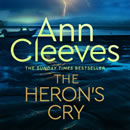
Ann Cleeves novels just seem to get better and better.
This is the second book in the "Two Rivers"series, in which we meet a new cast of characters who are extremely likeable and realistic. The scenic backdrop of North Devon gives all the appearance of a sleepy rural environment, and the pace of the story matches the steady thoughtful personality of Detective Matthew Venn. However, appearances are deceptive, and in this book, as the previous one, the pace quickens, towards the thrilling concluding chapters, where the dangerous potential of the Devon landscape and its dramatic weather are fully exploited.
Although in Venn, we do have a fairly idiosyncratic man heading up the investigations, I would say he has pretty equal billing with the rest of his team within the story line, which is an aspect I particularly like. We are not faced with the hackneyed lone - probably alcoholic - detective with his/her faithful sidekick. Instead we have a quiet intelligent man, supported by a strong team of colleagues. The social environment of North Devon is portrayed as somewhat bohemian, with a group of artists providing the focus of the investigation in the "closed community" style of mystery.
As usual, I listened to the audio version of the book, which was perfectly narrated by Jack Holden; he had a number of relatively diverse accents to deal with, which he did excellently - subtlety and without overt flourish - everything you look for in a narrator. I can't wait for more "Two Rivers" stories, and I'm looking forward to watching the much pre-publicised TV series. - Execution by S.J. Parris
[read by Daniel Philpott]
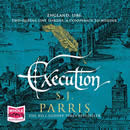 Knowing the ultimate outcome for the historical character on which these books are based, I constantly fear for Bruno's safety.Even worse this one is called Execution [but I think I am not offering a real spoiler by saying it's not referring to Bruno's demise]. Rather this is again all about a famous Catholic plot against Elizabeth I.
Knowing the ultimate outcome for the historical character on which these books are based, I constantly fear for Bruno's safety.Even worse this one is called Execution [but I think I am not offering a real spoiler by saying it's not referring to Bruno's demise]. Rather this is again all about a famous Catholic plot against Elizabeth I.
Bruno finds his way back to England once more, ending up spying for Walsingham, and all the while hoping to gain a sponsor/protector in order to be left to peacefully pursue his "heretical" writings. Again - no spoiler really - the end of the book finds him still hopeful, and - more importantly - still alive. - Nothing Ventured, Hidden in Plain Sight, Turn a Blind Eye, and Over My Dead Body
by Jeffrey Archer [read by George Blagden]I was curious to read a Jeffrey Archer novel and I thought a "crime" novel might be a place to start. As the author himself explains very precisely - this is not a detective story, it's a story about a detective. It is in fact a story or set of stories about William Warwick's career in the police force. While I realised that, after all this time as a best-selling author, his popularity must be based on something of merit, I had assigned him to a particular category in my mind, and was reading (or listening) with a view to mentally poking fun.
In fact, he certainly does know how to tell a story, and I continued seamlessly from one book to the next in the manner that one is hooked into a soap opera. True, I did find the "good egg" character - not to mention his love life - more than a little nauseating, and even though his father was a bit OTT, I thought the hero's family relationships were well drawn, (one suspects based on some true to life experiences as a child, or a parent), and the story line - like a Boy's Own adventure - was very engaging.
The net is: it was so engaging, and as the stories never entirely reach a conclusion, I am (perhaps not quite eagerly) waiting for the next book*! Not at all what I anticipated I have to say.
* Over My Dead Body is available in October.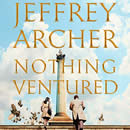
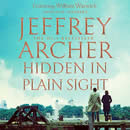
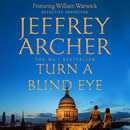
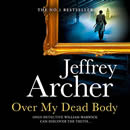
Posted on August 31, 2021 at 12:40 PM
« Previous entry | Main | Next entry »Saturday July 31, 2021
Books in July
- The Redbreast by Jo Nesbo [read by Seán Barrett]
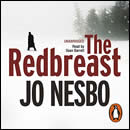
Harry Hole's third outing where, while he remains in Norway, much of the related plot is set elsewhere both in time as well as place. The telling reminds me somewhat of the way Doyle chooses to expand Sherlock Holmes beyond the short story format, so we have two tales in one. Very interesting historically for those, like me, who know absolutely nothing about Norway's political position in WW2, as well as being very tense and thrilling as usual. [And to make a change - spoiler alert - Harry's love interest does not end up as a murder victim, though a colleague does, and we are treated to a variation on the traditional trope of someone saying "I know who the murderer is" but then not actually revealing it in the same sentence.] -
Earthly Remains by Donna Leon [Read by David Rintoul]
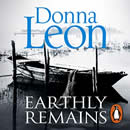 Brunetti is stressed to breaking by his work life, where he seems to be constantly battling to get at the truth (which is pretty blatantly obvious in many cases) and to prosecute the guilty (who are not brought to justice through undue influence and money). His wife suggests a holiday away from it all for a couple of weeks, and ships him off to a villa owned by her family.
Brunetti is stressed to breaking by his work life, where he seems to be constantly battling to get at the truth (which is pretty blatantly obvious in many cases) and to prosecute the guilty (who are not brought to justice through undue influence and money). His wife suggests a holiday away from it all for a couple of weeks, and ships him off to a villa owned by her family.
He spends his time as planned - rowing in the daytime with the caretaker, visiting the latter's beehives, and reading Pliny in the evenings. But a mystery develops, culminating in a death, and Brunetti is inevitably caught up in it.
This tale is really depressingly true to life - a tale of industrial pollution, corruption (at all levels of society), and probable murder - and ultimately, yet again, with the guilty evading any consequences. - The Sea Detective, The Woman Who Walked into the Sea, The Malice of Waves,
and The Driftwood Girls by Mark Douglas-HomeCal McGill is an Edinburgh-based oceanographer, and environmentalist. He's an interesting take on a private investigator, as he is contracted by various commercial institutions to track down items lost at sea; he uses his own computer based modelling on ocean currents in order to provide information. To me this is a much more plausible way that one might make a living as a niche investigator in the UK (America may be different) than as the conventional private detective of novels. Initially his (paid) work is looking for lost shipping containers and cargo, but as the books progress he is employed by families looking for the remains of lost loved-ones, and then inevitably we find ourselves embroiled in the more conventional murder mystery.
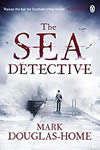
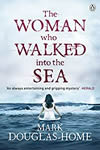
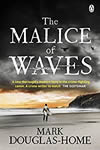
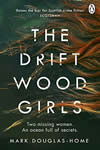
Posted on July 31, 2021 at 9:18 AM
« Previous entry | Main | Next entry »Wednesday June 30, 2021
Books in June
- Montmorency by Eleanor Updale [read by Stephen Fry]
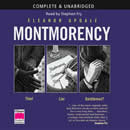
I should say up front that this is a book for "children" - the writing style is, in my opinion, pitched very well for the young. It's easily understandable, educational, and humourous; it talks a lot about sewage and poo - all time favourites among 9 year olds (and those in their 60s if I am anything to go by). However the content and basic themes of the book were criticised as being unsuitable for the young - it was variously recategorised as young adult.
Basically I think it is the somewhat dubious morality of the central character that gives some people a problem. The unvarnished truth is that Montmorency is a (highly skilled) thief and con artist. The author makes him into a Jekyll-and-Hyde type character, going so far as to give his villainous persona a different name to emphasise his low moral character.
I think the book is so cleverly written (and delightfully read by Stephen Fry) that I would definitely give it to my 9 year old - hoping it would encourage a great interest in reading if nothing else - as well as fervently hoping it would not encourage him to try thieving or going down sewers. It has to be said that the most dubious activities of our hero are not what I would call glamourised in any way. And there is quite a good overall moral message in the end, as Montmorency gets to put his talents to good use for Queen and Country, finally able to put his criminal past behind him. - Dead Land by Sara Paretsky [read by Liza Ross]
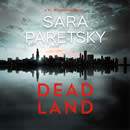
In this story VI becomes involved in the world of the displaced homeless, and the mentally ill. She's not a very willing participant in the action as it stems from her young and impetuous god-daughter's desire to "help" someone (Lydia) who would undoubtedly rather have been left alone. It is only the actions of others towards VI's pragmatic and fairly low key suggestions about social care options that sharpens her interest in the whole affair. Soon she is uncovering very dubious dealings around real estate planning, and ultimately the catastrophic incident which started Lydia's mental decline from a famed singer-songwriter, culminating in living on the streets.
The plot is complex, (involving identity theft which is always potentially confusing), and has a political element; however, the fundamental story revolves around family inheritance, and age-old crimes driven by personal greed - as ever. - The Darkest Evening by Ann Cleeves [read by Janine Birkett]
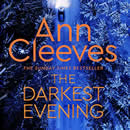
I've been listening to a few Ann Cleeves' books over the past 12 months - mostly early ones since an author can write only so many new books - but now I realise how much I've missed Vera. In this book we meet some - I think, hitherto unknown - relatives of Vera, as a body has been found in their grounds. This is an example of excellent writing in my opinion. In previous stories, we have not been subjected to Vera's complete detailed history, only those things relevant at the time, leaving her life completely open to more minor revelations as they occur. It may seem odd to some that Vera is quite familiar with a set of people she associated with as a young girl but has seen little since; however it seems familiar territory for me. Cousins can be those childhood playmates, who are at once familiar from when parental siblings maintained family ties, and yet total strangers since those loose bonds were lost along with the elderly parents.
The story opens in a swirling blizzard - which is a miscalculation on my part as I usually like to match the season in which I read a book with its fictional setting - but I was too impatient wait for the snow before reading this. The tale itself is an absorbing mystery, and the solution almost mundane in it's simplicity. Vera herself says "who else could it have been, pet?". But that is one of Ann's particular skills, I think: the solutions are realistically simple and at the same time not at all obvious, making for an excellent read. - The House on Half Moon Street, The Anarchists' Club, and The Butcher of Berner Street
by Alex Reeve [read by Ash Palmisciano]These books are about Leo. In the first book, Leo is in love with Maria - but then Maria is murdered. Leo is an obvious suspect, but it's very important to Leo that he is never arrested or held on suspicion by the police...
I am loathe to immediately reveal Leo's secret as - unlike other readers who read the book blurb - I came to this cold, simply viewing it as a Victorian murder mystery, so the basic premise was a bit of a surprise. Having got over that, I found the "whodunnit" story, the descriptions of Leo's life, his work opportunities, and Victorian London, all very absorbing and interesting. I thought his plight was sympathetically and realistically described... but then I am "cis" - and the author is a cis white male - which seems to be giving some of the readership a bit of a problem. All I can say is that whatever issues and anger this topic engenders in the current era, I can only suggest in the author's defence - if he even needs it - that he is writing about what it might have been like for someone almost 150 years ago. Despite the fact that the author says that during his research he was "surprised to find how little has changed", there is no doubt a lot has changed. Though many attitudes may still remain in the dark ages, Leo faced many legal threats that are not here today, and I thought these were well-described - and the effect that this constant fear of discovery had on his mental state, on his ability to make real friends, and on his self esteem also seemed realistic to me.
Surely these books can be at the very least thought provoking to a cis readership (like me); like most detective fiction, you cannot really expect them to be super-realistic text books on the subject (maybe unless you are Peter James...). At any event, they have certainly caused me to listen to the opinions of the trans reviewers, which I otherwise would not have thought to do. Some of the negative reviewers strongly advised trans people not to read the books. I, on the other hand, would say to any gender: read the books if you like Victorian murder mysteries; you will soon decide if you find the protagonist or subject matter too annoying, and you can put the book aside.
The books are narrated by Ash Palmisciano, who gives voice to Leo with a fairly androgynous or adolescent male tone which I thought suited the character.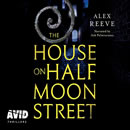
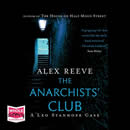
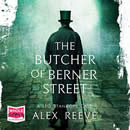
- Mr Standfast by John Buchan [read by Frederick Davidson]
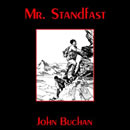
This is the third novel featuring Richard Hannay, which finds him on active service on Western Front. He is, however, recalled for some further espionage work - much against his will, and longing throughout to return to the good honest old-fashioned fighting. He is forced to pose as a pacifist to infiltrate a network of German spies (in England - and later elsewhere); in his own words: "To go into Germany as an anti-British Afrikaner was a stoutish adventure, but to lounge about at home talking rot was a very different-sized job."
As usual (it seems to me) his mission isn't really very clear. He establishes his credentials in a community of pacifists in Surrey, then rollicks around Scotland, (camping and living on his wits like a boy scout, and seemingly, even in his own estimation, achieving nothing), before making his way via London into Europe where he finally focusses on the destruction of an old enemy first encountered in The Thirty-Nine Steps.
Worth mentioning that (astonishingly) he falls in love with a (very) young and independently-minded woman. She is also involved in espionage, and determined to see it through, much against Hannay's way of thinking of the world and, more specifically, a delicate young thing's position in it. He comes round to it, and the book ends with both of them separately pursuing their contributions to the war effort - Hannay back to the fight on the Front. And all this from a man who "knew about as much of [women's] ways as [he] knew about the Chinese language".
I was a bit slow to recognise that the title of the book comes from a character in the Pilgrim's Progress - which I did read, but long ago. I should have realised sooner as Bunyan's book features large in this story. At first, I thought it was being handed between the characters, and discussed as a use for some kind of cipher, then again perhaps as a signal to recognise fellow spies. However, it seems that they all just took great comfort from the content, which gave them the heart to carry on in such a ghastly war.
I took a while to get used to the reader (not Christian Rodska - who read Greenmantle). Davidson's delivery was a real upper class drawl for the most part, which I never really took to for Hannay. Accents were adopted where appropriate (and these did include Glaswegian, Highland, Germanic, and earnest young folk), but we heard Hannay's South African accent only as part of his "disguise".
Posted on June 30, 2021 at 9:24 AM
« Previous entry | Main | Next entry »Monday May 31, 2021
Books in May
- The Summer Before the War by Helen Simonson [read by Lucy Scott]
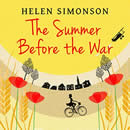
I was reminded of Major Pettigrew (and his Last Stand) and fell to wondering what the author had written since - this book is the answer to the question. I read a number of slightly critical reviews but I was very smitten with it. Set in Rye, it's impossible not to link it with the Mapp and Lucia books, and indeed the author intentionally references them, with more than a nod, in both in the manner in which she writes as well as more overtly in some names and general characteristics. Although although it shows all the charm and satirical humour of small town life, it is also quite dark. Things do "work out" for the main characters in the story but not without great cost. The injustices and deep hurts caused by the small mindedness of the (essentially rural) pre-war society are eventually overcome - mainly because a lot of the more minor class-ridden thinking is swept away in the aftermath of WW1, or pales into insignificance in comparison with the huge losses experienced by all classes of the society.
But we begin in 1914 - it is the end of England's brief Edwardian summer, and everyone agrees that the weather has never been so beautiful... - GreenMantle by John Buchan [read by Christian Rodska]
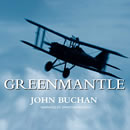
I needed a new book to listen to before falling asleep and thought Hannay would be a good Marple substitute - despite the full-on adventurous subject matter. I really like Christian Rodska so searched for books he has narrated - and found this one. After watching or hearing many adaptations of The Thirty Nine Steps, I did actually read it when I was in my 20s and discovered it to be interesting in that it was definitely an obviously of-the-era totally bloke's book - no love interest - in fact no female's at all really. This is the second Hannay adventure, and cut from the same cloth - except instead of being on the run in Scotland, he is on the run with a "gang", across Germany and into Turkey, spying against the Germans.
The adventures as they traveled were episodic, and it was jolly exciting and full of derring do. However, it may be because of the late night listening, but overall it did not seem to have a very coherent plot. And don't ask me about the Green Mantle... The "book blurb" clarifies the plot for me more than reading the individual parts: Richard Hannay sets off an a hair-raising journey through German-occupied Europe to meet his old friend, Sandy Arbuthnot in Constantinople. [Note that they both set off from London but for some reason go by different routes]. They struggle to subvert German espionage attempts in the Middle East and halt the further spread of pro-German sympathy in the Muslim world. Hannay spends much of the time pretending to be a pro-German version of his South African self - and Rodska delivers a entire panoply of suitable accents for the characters, as he is wont to do. Patriotic fervour at its best (or possibly worst depending on your viewpoint).
Like The Thirty Nine Steps there are no women to speak of ("Women had never come much my way, and I knew about as much of their ways as I knew about the Chinese language") barring The One... and I feel I have to reproduce this section of the book (philosophy thrown in for free) as I found it so extraordinary:
"It's true all the same. Women have got a perilous logic which we never have, and some of the best of them don't see the joke of life like the ordinary man. They can be far greater than men, for they can go straight to the heart of things. There never was a man so near the divine as Joan of Arc. But I think, too, they can be more entirely damnable than anything that ever was breeched, for they don't stop still now and then and laugh at themselves ... There is no Superman.
...
But there is a Superwoman, and her name's Hilda von Einem."
There is such a lot of weirdness in this book that I'd love to write even more but in fact this is a great review from a Simon Guerrier in 2009 which I could not possibly top. He rather nails the key aspect by saying: "Hannay himself is a problematic hero for modern readers". [He does seem to say throughout that the American character is called Blenkinsop when I believe he is the rather more unusually named Blenkiron]. - The Long Call by Ann Cleeves [read by Ben Aldridge]
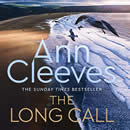
Ann introduces us to a new set of characters here; they are maybe trying a bit to hard to represent a modern slice of the middle classes with excessive "inclusivity" all round, but the individuals were really well portrayed and likeable. I am glad to have a younger set of police characters leading an investigation, (rather than, say, an elderly birdwatching couple of amateur sleuths). Also the setting is North Devon - around Barnstaple - which has happy (if sketchy) farm holiday memories for me through a family connection to farmers in the area.
Had this been a stand-alone novel I would have been more fearful of the outcome for the characters - Ann's stories have a tendency to be poignantly sad - but I saw this described as a "Two Rivers Mystery - Book 1" (nothing like planning ahead - The Heron's Cry is due to be published in September 2021) which comforted me a little as the story progressed. I am hopeful that the author has at least her "three book deal", and I see that filming of a TV series is already underway, with 4 episodes, which might give a good chance for a faithful dramatisation of the book. - Dead Tomorrow, Dead Like You, and Dead Man's Grip
by Peter James [read by David Bauckham and Jamie Glover]So now I have moved on through the next 3 books, I'm afraid I remain exasperated at the writing style.
Plots: tick; tension: tick; pace: tick.
Repetition and unnecessary detail: big tick...You do not have to take a character, describe his every item of clothing, and compare his looks to that of a well-known actor, in order to paint a good picture of the person in a reader's mind's eye. I am no writer, so I looked for what techniques my other favourite authors use, and find that just one or two key (acutely observed) points are sufficient to reveal the personality type on the page. Likewise, you do not have to describe every room you enter as if you were making an inventory for a house clearance auction. Whilst it is evocative and fun to use a picturesque city as a backdrop for a story - and it is interesting for me to read about roads and places I know well - it is not necessary to have a journey described with every single turn in the road as if the writer were reading and A to Z of the city. On this issue of repetition, he also has a problem when referring back to events (or people and places) in previous books; I think this can be hard for an author to achieve as ideally you don't want to reveal other plots and spoil things for people reading out of sequence. However, not only is this aspect not well executed, but descriptions (of people and places) are repeated from previous books, word for word, almost as if he's used cut-and-paste. Again, referring to other authors, I find they are very clever at finding new ways to sketch a character who might be well-known to some readers, but new to others.
While these books are by no means unreadable or without interest, I feel that this writing style is lazy with the author believing quite the reverse due to his (clearly) enormous efforts at his so-called "research". I am surprised at James, as he seems to be an experienced career writer, and I just expected something better.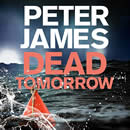
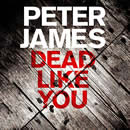
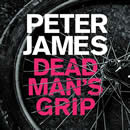
-
Island of the Mad by Laurie R King
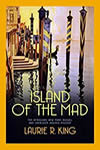
I like the way this author (fairly obviously) visits a wonderful exotic location, does her research, and bases the location of her book there. It reminds me of Mary Stewart who (fairly obviously) worked in much the same way. Given that this author's books are set in a previous era I guess it's slightly harder to ensure period accuracy - but then I would be happy to go along with it either way, not knowing any better. In this case it's Venice that provides the marvelously glamorous setting. As a bonus we also meet Cole Porter, who becomes a key player among the smart set with whom Russell and Holmes are involved; this is an example of another point I enjoy about King's stories. Although they have their roots in an extremely English icon of literature, she introduces wholly appropriate American links, whether through people or place, and does so seamlessly, which I think takes more skill than might be apparent.
As a complete contrast, the book also explores - as the title implies - institutions housing those deemed to be insane, both in Venice, and in England (Bedlam - which, by 1925, had evolved from its Victorian reputation - as something of a prison or freak show - into more of a sanctuary for those afflicted).
In this story, Russell is again asked to track down a missing person in the shape of the aunt of an old friend from Oxford, Lady Vivian Beaconsfield, who has spent most of her adult life in and out of one asylum or another, and who has disappeared following a supervised outing from Bethlem Royal Hospital. The trail leads to Venice and Holmes "tags along" with his own mission from Mycroft to review the rising tide of fascism in Italy. -
The Trouble with Goats and Sheep by Joanna Cannon
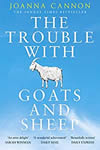
This is also set in a hot English summer, and the protagonists are two 10 year old girls, who decide to solve the mystery of why one of their neighbours has suddenly gone missing for no apparent good reason - o, and because God is "everywhere", to find him as well. It has slight shades of The Curious Incident of the Dog in the Night; we see the world through the girls' eyes and the adults' reactions to them, which provides perhaps slightly more humour and slightly less pathos. However, again, this is a story with a dark side. Everyone in the street has secrets, but the one thing they are all sure about is "that bloke at number 11 is a weird pervert and needs to be driven out"...
The 1976 time period was very evocative for me - it's rather like the "what were you doing when Kennedy was assassinated?" cliche. For me, that whole summer was: living in Wimbledon, the heat, my cat, my University finals, and and my first job in a stifling new office block (where we were not allowed to open windows despite the "teething trouble" with the air conditioning).
Posted on May 31, 2021 at 9:40 AM
« Previous entry | Main | Next entry »Friday April 30, 2021
Books in April
The effect of lockdown in combination with retirement has led to the seemingly excessive monthly consumption of books - through all forms of media....
-
The Windsor Knot by S J Bennet [Read by Samantha Bond]
 This is a fun book which has received much praise by reviewers but I had no idea of its subject matter before I started on it. . My mistake was in reading it hot on the heels of The Thursday Murder Club - which needless to say I much preferred. They have a number of basic themes in common: potentially twee subjects with tongue-in-cheek humour, but treating both subject and characters very seriously and with respect.
This is a fun book which has received much praise by reviewers but I had no idea of its subject matter before I started on it. . My mistake was in reading it hot on the heels of The Thursday Murder Club - which needless to say I much preferred. They have a number of basic themes in common: potentially twee subjects with tongue-in-cheek humour, but treating both subject and characters very seriously and with respect.
This book has the Queen in the role of "Miss Marple" (I know! our very own dear Queen... whatever next?... no knighthood in the offing for the author I feel...). She keeps it realistic (but, then, how would we know?) while at the same time, despite the characters being real people, they are in truth merely anthropomorphised royal icons.
As I said, it is fun - but it grates a little with me. Of anything I probably enjoyed the pun of the title most of all. -
The Waters of Eternal Youth by Donna Leon [Read by David Rintoul]
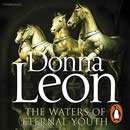 Another sad tale, told in Leon's distinctive sympathetic and keenly observed way. It revolves around a 15 year old case which was put down at the time as an accident. An elderly friend of Brunetti's wife's family begs him to look into it again, and he finds a way to do so.
Another sad tale, told in Leon's distinctive sympathetic and keenly observed way. It revolves around a 15 year old case which was put down at the time as an accident. An elderly friend of Brunetti's wife's family begs him to look into it again, and he finds a way to do so.
I have seen some complaints of the constant references to Brunetti's family life and cooking, as well as his "unrealistic" aversion to the digital age. However, I love these aspects - it provides a tapestry of his life and work in Venice - a greater whole. I would here contrast it with Patricia Cornwell's writing and her constant references to the same background subjects - hers are tedious and add nothing to the stories at any level - neither the mystery nor the general interest. Well in truth there is no comparison is there? Brunetti has a charming family and the exchanges with his wife and children add a lot to the body of the story well beyond merely providing a backdrop. However realistic or unrealistic is Brunetti's life, the author makes us believe in it, and feel we are right there with him.
The "accident" is revealed in quite a different way, and a corrupt individual is brought to justice - which sadly cannot help the victim, which we knew throughout. But we are left uplifted by the touching closing scene. - Looking Good Dead, Not Dead Enough, and Dead Man's Footsteps
by Peter James [read by David Thorpe and David Bauckham]I saw the first TV adaptation of these books recently and so, starting with No 2 in the series, I finally gave in to Amazon's long-term campaign to get me to read the Peter James books. [Previously actively put off by the themed titles always having to have the word "dead" in them]. I can now see why they worked well translated to a drama, as on the page there is a great deal of very detailed descriptions of physical locations and police procedures that can be simply conveyed in literally moments on the screen; hence you don't get that feeling that the story has been butchered to fit into just a couple of hours. Because of this, I think that listening worked well for me - I'm pretty sure I would having been skipping through passages of the written word. [Although I would most certainly not have been skipping through the detailed descriptions of the locations, because of my personal love of Brighton and my Sussex childhood].
The third and fourth books in the series, confirm my view that the author's self-professed fixation with researching correct police procedural details is firmly carried through to his work - in some instances to the detriment of the story in my opinion. However, I can agree with him that when you know about a specialist subject - in any field - reading what (to you) is blatantly inaccurate fiction is more than a little annoying. [Sometimes these inaccuracies can only be willful - especially in some TV dramas where any sense of realism is sacrificed to the requirements of the plot - and I'm not talking only tongue-in-cheek Midsomer-type dramas...].
As a complete contrast to this slavish attention to authenticity, his ability to pen tense thriller passages - seemingly restricted to the denouements - is really excellent. I'll be interested to see how his themes and plot formulas develop over the many books that follow.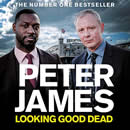
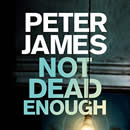
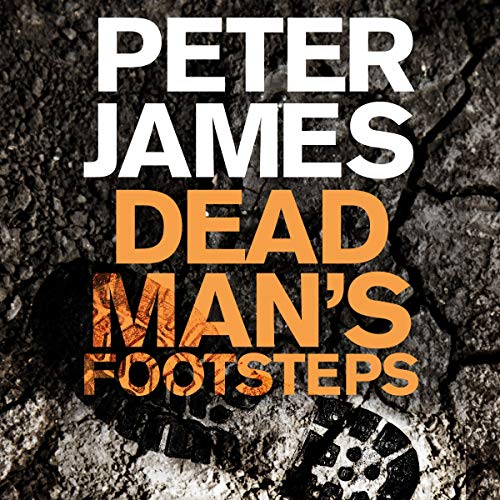
As a final thought - I do find his "romantic" interludes (definitely a euphemism) a bit tedious. Is this because I am too old to be interested any more? I think not. Is it because I am female? This could more be the case - but isn't the demographic reading mysteries* predominantly female? I always think (girly) emotions are more affected by describing and implying feelings rather than describing actions. I can only again point to Mary Francis's very positive influence on this aspect of her husband's books, which he, and later his son, were unable to sustain without her. Somehow Jame's sexual descriptions are on the one hand too heavy handed to be romantic, and on the other not graphic enough to be arousing. [I'm given to understand that writing "good" porn requires a very specific skill set... although, I'm probably glad overall that this author does not display it.].
[* If these books are classed as thrillers, rather than mysteries, then the audience would once have been entirely male. However it seems that even this statistic has changed over the last century.] -
Classic Detective Stories [Read by Edward Hardwicke]
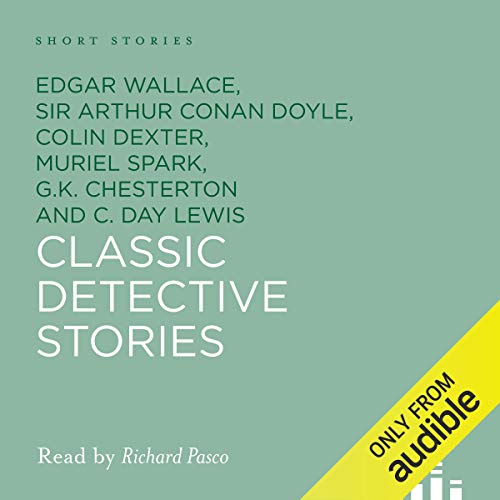 The stories are:
The stories are:
- The Green Mamba Edgar Wallace
- The Poetical Policeman Edgar Wallace
- The Dying Detective Sir Arthur Conan Doyle
- The Burglar Colin Dexter
- The Man in the Passage G.K. Chesterton
- The Assassins' Club C. Day Lewis
[writing as Nicholas Blake] - The Case of the Tragedies of the Greek Room
Sax Rohmer - Chimes Muriel Spark
-
Mystery in the Channel by Freeman Wills Croft
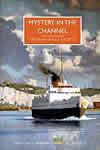 Another Inspector French story - but I liked this one more than 12:30 from Croydon. It followed the usual path of a whodunnit with a tense denouement as the police set a trap for the murderer, and laid in wait. Here we still enjoyed French's attention to detail, with every piece of evidence thrashed out and tested to the last degree, step by step building a solid case. There was even a realistically sizeable gap in time where it seemed likely the mystery would never be solved - and then the unexpected event which opened it all up again.
Another Inspector French story - but I liked this one more than 12:30 from Croydon. It followed the usual path of a whodunnit with a tense denouement as the police set a trap for the murderer, and laid in wait. Here we still enjoyed French's attention to detail, with every piece of evidence thrashed out and tested to the last degree, step by step building a solid case. There was even a realistically sizeable gap in time where it seemed likely the mystery would never be solved - and then the unexpected event which opened it all up again.
The story opens with the discovery of a yacht floating unattended in the Channel; two bodies are found on board - shot dead. They are directors of a city finance company, in the danger of imminent collapse, and the obvious suspects are other members of the management team... but which one? (or two?) -
The Poisoned Chocolates Case by Anthony Berkeley
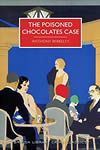 This is a story involving fictional author Roger Sheringham and his (fictional) Crimes Circle, who decide to investigate a "real" crime that Scotland Yard are unable to solve. Each of the six members provides his/her solution which they then present to their fellow members. It's similar in theme to The Floating Admiral but slightly more coherent since it is written by the one author - although 2 additional solutions were provided over time by Christianna Brand, and Martin Edwards.
This is a story involving fictional author Roger Sheringham and his (fictional) Crimes Circle, who decide to investigate a "real" crime that Scotland Yard are unable to solve. Each of the six members provides his/her solution which they then present to their fellow members. It's similar in theme to The Floating Admiral but slightly more coherent since it is written by the one author - although 2 additional solutions were provided over time by Christianna Brand, and Martin Edwards.
I can't help but point out the similarity between the fictional Crimes Circle and the real Detection Club (of which Berkeley was a member). Seeing the descriptions of the 6 fictional members, I also cannot help wondering if he is parodying and making fun of his real life compatriots in the Club.
There are the usual interesting word usages: the "correct" writing of 'bus, (short for omnibus), as well as a Greek word printed using the Greek alphabet - and not translated! (I like to think of myself as educated but I have no idea....). The word "daisy" apparently describing a caddish "lady's man" (as opposed to a ladyman) which I can't find a satisfactory reference to; in modern usage it seems to mean "an excellent thing". The dictionary of "hard boiled slang" (jolly useful site) suggests it might mean "none to masculine" which may be the context in which it's used here, ie not a "man's man". -
The Moving Finger by Agatha Christie [Read by Joan Hickson]
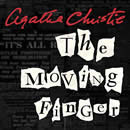 Yet another so-called Miss Marple book narrated by Joan Hickson - again wholly inappropriately. Firstly, yet again (surprise to me) this is written in the first person from the point of view of Jerry Burton - so why use a female to read the audiobook? In the newer TV Marple they even use Burton to provide a narration over the story. Secondly, (surprise to me) Miss Marple is a fairly peripheral character in this story, only appearing in the last quarter of the book - I had even begun to wonder as I listened if she had been shoe-horned into the TV story as they had done in some of the other books they have chosen to adapt.
Yet another so-called Miss Marple book narrated by Joan Hickson - again wholly inappropriately. Firstly, yet again (surprise to me) this is written in the first person from the point of view of Jerry Burton - so why use a female to read the audiobook? In the newer TV Marple they even use Burton to provide a narration over the story. Secondly, (surprise to me) Miss Marple is a fairly peripheral character in this story, only appearing in the last quarter of the book - I had even begun to wonder as I listened if she had been shoe-horned into the TV story as they had done in some of the other books they have chosen to adapt.
Other than that the style of the book is similar to Murder at the Vicarage, where Burton takes the place of the vicar with his wry and, in his case, somewhat critical view of village life. I think possibly Burton's romantic attitude towards the rather young Megan could be considered a bit dubious by modern standards - even despite his clear intentions towards marriage - but this is somewhat mitigated by the strong self-determining characters of both his sister and Megan herself.
As to the story and plot - I have always thought it is an excellent one - Miss Marple cuts to the chase: when you look at it that way, only one thing happened - Mrs Simmington died.
Posted on April 30, 2021 at 12:45 PM
« Previous entry | Main | Next entry »Wednesday March 31, 2021
Books in March
-
The Thursday Murder Club by Richard Osman [Read by Lesley Manville]
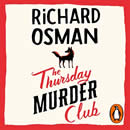 Along with the rest of the world (it seems), I cannot praise this book enough. It was an absolute delight from the very opening sentences. It has to be said that this was probably very much enhanced by having Lesley Manville as the reader, but even so the characterisation is truly glorious. To know that this is Osman's first novel makes it all the more amazing. At the end of this audio version may-I-call-you-Richard is interviewed by Marian Keyes, and although it's a bit sycophantic, and very much a mutual admiration society, her excessive praise and not to mention envy is clearly sincere.
Along with the rest of the world (it seems), I cannot praise this book enough. It was an absolute delight from the very opening sentences. It has to be said that this was probably very much enhanced by having Lesley Manville as the reader, but even so the characterisation is truly glorious. To know that this is Osman's first novel makes it all the more amazing. At the end of this audio version may-I-call-you-Richard is interviewed by Marian Keyes, and although it's a bit sycophantic, and very much a mutual admiration society, her excessive praise and not to mention envy is clearly sincere.
In all, this is a lovely book, and although Richard, (along with his publicist and agent I am sure) has made his reputation as a very popular presenter work overtime in publicising this book, it really it highly creditable. I am really looking forward to (hopefully listening to) the next one - at the same time now slightly nervous as to whether he can live up to his own standards. - I could not help but compare the title of this book (even not knowing the story or setting) to Agatha Christie's Tuesday Night Club, which she used as a device to present some short stories featuring Miss Marple and others. Each week the group tell tales of mystery, always solved by the female amateur detective from the comfort of her armchair.
-
Winter by Ali Smith [Read by Melody Grove ]
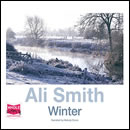 Another wonderful book from Ali Smith, which somehow manages to be wonderful as it evolves from page to page as well as overall. It teeters on the surreal but is founded very much in politics of today, (refugee crisis), as well as the past (Greenham Common*) which in turn informs today.
Another wonderful book from Ali Smith, which somehow manages to be wonderful as it evolves from page to page as well as overall. It teeters on the surreal but is founded very much in politics of today, (refugee crisis), as well as the past (Greenham Common*) which in turn informs today.
Of course, it was again poignantly sad but while I have read (much more) deeply sad books before, this one actually made me cry. I think the author has been really clever with this because it affected me in a very interesting way - you grow to love a character and it is implied the character is lost in a national disaster - which is then "poignantly sad". But suddenly it came to me that real people had died in that national disaster - which was surely to goodness much worse than the possible demise of a fictional character who is in any case a little ethereal. It wasn't that I had not known this before but it made me feel it in a different way - it went somehow beyond empathy.
Don't get the wrong idea, though; this is not a grim book, and I have not described the story - which can be viewed in terms of literary references (the Guardian has a perfect review comparing it to Dickens' Christmas Carol - which may be why I liked it so much - who knows?). In all it's a lot about love, and joy - a tale of redemption - "luminously beautiful".
[* I've never been very politically aware so the information about the women camped at Greenham Common - that I admired but also pretty well ignored at the time - was very interesting to me]. -
12:30 from Croydon by Freeman Wills Croft
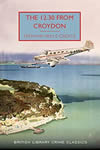
One of my bumper collection of Christmas retro mysteries. This author was a well-known member of the Detection Club and much respected by his fellow members. He is known for his great attention to technical details (background in engineering) shoring up water tight cases for his protagonist Inspector French.
However, I really did not find this book to be much fun for me - and this was entirely due to the fact that it was not at all a whodunnit. Mystery/crime novels where the baddie is revealed early on - or written from their point of view - are not my favourite at the best of times. Here the story is about a very detailed crime, all meticulously planned out, and which, of course, begins to unravel. Once the unraveling is underway, you find that from an objective point of view the murderer appeared quite suspicious to observers all along. - A point of interest for me personally, is that in 1953, for what were the last few years of his life, the author moved to Worthing. Many people retired to the south coast in those days - the bungalows in my home village were chock full of ex-civil servants, ex-bank managers, and spinster sisters of a certain age, tending their immaculate gardens and hedges, and enjoying the relatively clement weather in their declining years. [This retirement destination was gradually replaced by Spain during the 1970s, leaving these coastal towns looking sad and a bit down at heel, with the little bungalows' handkerchief front gardens, formerly so cherished, now concreted over to allow parking for cars. ].
-
The Honjin Murders by Yokomizo Seishi
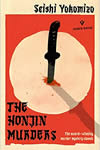
Another rather original choice among my Christmas presents. It was a very good mystery, and well explained for a non-Japanese reader. I'm not sure if this is due to the translator or the author. It may have been necessary to explain the historical context to Japanese readers, but the book was published in 1946, so I was slightly surprised at that. However the author does excuse himself for making several references to famous Western crime "golden age" authors, and also to other locked room mysteries. In fact one of the characters has a huge collection of such mysteries.
This translation was published in 2019 to much praise, but despite his obvious fame in Japan (with a literary prize named in his honour), I can find only one other book by this author published in English, with another due for publication this year. However they are all with different translators, so I can only hope they will prove to be as good as this one. -
Troubled Waters by Gillian Galbraith [Read by Lesley Mackie ]
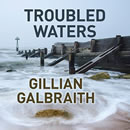
I was able to listen to the final Alice Rice mystery rather than reading it. I'm not sure the author meant this to be the "final" one, but Alice does buy a country cottage outside of Edinburgh, probably mirroring what the author herself chose to do, and expressing her own feelings about it. In an interview, the author admitted she was unlikely to return to Alice as she was now too out of touch with modern police procedures.
The author's personal website is a bit neglected and could do with an update. Although this book was published in 2014, her latest book The End of The Line in 2019 is a really excellent novel, and apparently, since lockdown, where ebook lending has increased 146%*, the first Alice book, Blood in the Water, was the top most-loaned adult ebook.
[* That was probably all me...] -
The Body in the Library by Agatha Christie [Read by Stephanie Cole]
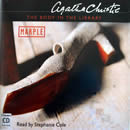
I thought that since I know these stories so well - watching repeats of the various TV productions of them frequently enough to be embarrassing to admit to - that it would be a good book to listen to while drifting off to sleep. However, I probably last read the books when I was about 11 or 12 years old and was really surprised and delighted at how good the actual written work is. (I know I should not be - millions of fans over the years attest to that surely...). I was also surprised at how faithfully the TV adaptations followed the book - large sections, if not all, of the dialogue being lifted straight from the page. Of course, Christie is well-known for her excellence with dialogue (as opposed to prose, I believe) so this should be no surprise - but it was nonetheless. Many of the stories are quite a bit altered in the TV versions - most particularly in Agatha Christe's Marple. [...and particularly one feature of this story, though strangely that alteration does not fundamentally alter it very much; in fact I rather liked it - it made one much more sad for the murderer... but I digress...].
Add to all this that Stephanie Cole is a lovely reader. She has a wonderfully gentle voice - totally suited not just to the Marple character but the tone of the whole book. -
The Murder at the Vicarage by Agatha Christie [Read by Joan Hickson]
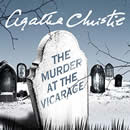 I was so delighted with The Body in the Library that I rushed ahead to listen to this one - the first Marple book - and was bitterly disappointed. Not read by Stephanie Cole but Joan Hickson - who could not, in my opinion, be bettered in playing the TV character in Miss Marple, but who is strangely not really a very good reader. I can see why she would have seemed an obvious choice but a narrator needs different skills from an actor. In fact they made two glaring errors in choosing Hickson for this. The first, which Stephanie Cole would not have solved, is that this book (a surprise to me) is written in the first person from the point of view of the vicar... who knew? (everyone except me I suspect) - so obviously it should be voiced by a male narrator - no?. Secondly, in choosing an actress whose very voice is that of Miss Marple, it meant that every time she said "I", you immediately linked it to being things Marple did, which seemed momentarily slightly incongruous, before you reminded yourself that this was in fact the vicar speaking.
I was so delighted with The Body in the Library that I rushed ahead to listen to this one - the first Marple book - and was bitterly disappointed. Not read by Stephanie Cole but Joan Hickson - who could not, in my opinion, be bettered in playing the TV character in Miss Marple, but who is strangely not really a very good reader. I can see why she would have seemed an obvious choice but a narrator needs different skills from an actor. In fact they made two glaring errors in choosing Hickson for this. The first, which Stephanie Cole would not have solved, is that this book (a surprise to me) is written in the first person from the point of view of the vicar... who knew? (everyone except me I suspect) - so obviously it should be voiced by a male narrator - no?. Secondly, in choosing an actress whose very voice is that of Miss Marple, it meant that every time she said "I", you immediately linked it to being things Marple did, which seemed momentarily slightly incongruous, before you reminded yourself that this was in fact the vicar speaking.
I have to say the library inaccurately labelled this book as being narrated by Richard E Grant - and I found there is in fact a version by him which is much preferable (I listened to a sample). In fact the - again unexpected for me - pleasure of this book is the dry wit expressed by the vicar with his acute (unspoken) observations of his parishioners and which is well suited to Grant. One thing I would also note here is, that it is, I understand, notoriously difficult to adapt first person narratives (especially diarists) to the screen; in the case of this story, the TV adaptations are excellent, very faithful to the spirit of the book, and feature the vicar in much the way the book did - however you do lose much of that wry humour that book-vicar expresses only in his own thoughts. -
 Blackwater
Blackwater
Radio series written for reading by several voices across ten 15 minute episodes, it tells the story of Zoe who reappears in her home town rather dramatically after 10 years on the same day as her supposed murderer is released from prison. Consternation all round. Even worse she is unable to explain where she has been all this time.
It's a very professionally produced polished thriller with a very credible plot - full of tension and drama. Written by Claire McGowan, produced by Celia De Wolff, and stars Clare Dunne (Zoe), Richard Clements (Steve), Aston Kelly (Paul), Sean Kearns (Phil), and Roisin Gallagher (Danny).
Posted on March 31, 2021 at 10:15 AM
« Previous entry | Main | Next entry »Sunday February 28, 2021
Books in February
- Cockroaches by Jo Nesbo [read by Seán Barrett]
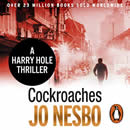
The second of Jo Nesbo's Harry Hole series - this time set in Bangkok. Alcoholism still a key feature of Harry's life but he seems to have a motive to stay dry and seems to do so for most of this book. I know these should not be my main thoughts on a book but addictions always worry me - it's just a "thing".
I listened to quite a lot of it while out walking every day (- lockdown -) and I think I should have given it more proper attention as it's a moderately complicated plot and there are lots of Norwegian and Thai names (I know - sorry... but for me, audio is harder that the written word with names). Anyway, it was excellent, though I need to read a few more to make sure Harry stays safely on the wagon... - The Magus by John Fowles [read by Nicholas Boulton]
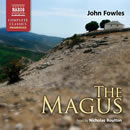
The Magus was published in 1965, but is set in the early 1950s, when Fowles started writing it. For someone of my age, it was almost a cult book. My college tutor was utterly captivated by it, and my sister was similarly fascinated by Fowles (though I think in her case it was mostly The French Lieutenant's Woman).
I find it hard to review this book because frankly I don't have sufficient writing skills to express my thoughts properly - and so much has been written about it I'm likely to be repeating others (using inferior prose). My tutor said the plot was "like an onion" where you were constantly peeling off more layers as you read. And given the nature of the book, I find it odd to reflect that I have read it at least 3 times in my life, as well as listening to a more recent radio play in 2016. Listening to it read out was a new experience again; it slowed me down, and drew attention to whole episodes I had pretty well forgotten. Partly this was because you (I) are so wrapped up in unravelling the mystery that you (I) mentally skim over anything that is not apparently revealing anything to you (me) towards that end. And here, I remembered a series of theological lectures I attended about 'Myth and Legend', where our Dean said that a truly great book was one you could re-read and it would have something new to reveal to you every time. Now I do not claim that this is a 'great' book in the way the Dean meant it, if for no other reason than Fowles was not very satisfied with it himself. However, it is interesting coming back to it with all those years in between, because it really did seem to have a very different point from the one I took away from it when in my twenties.
Originally I read about a young male graduate who doesn't really know what he's doing with his life and goes to teach English on a small Greek island, leaving a behind an Australian girl with whom he has been living. From there on he is manipulated emotionally and physically by a mysterious wealthy old man and his accomplices living on the island. They use psychological illusions which become increasingly dark and serious, so that in the end our hero finds it hard to distinguish between fantasy and reality.
Like many other readers at the time, I thought it was all about his changing, through his experiences, and coming to realise that his original love is "the one", so I was disappointed that there was no specific happy reunion at the end. In fact when asked, Fowles would impishly give different answers to the question "... but what happened in the end..." - and due to the books extreme commercial success, he continued to work on it, publishing a revision with an extended ending to assuage his readership; this new ending still left the question open but those who wanted to could be more optimistic about the love affair rekindling.
Now I'm no longer in my twenties, I do not see the romance as the main point of the novel. Moreover, the main character is not very likeable, though he is indeed taught some lessons by his experiences. However, one wonders if he is really capable of truly understanding let alone becoming a better human being, and thus I found it less important whether he achieved his final fixation of being reunited with his original love. I read that you cannot help having sympathy for a character when written in the first person, and that this is the difficulty in writing only from that point of view, since he is forced to have a certain degree of intelligence and understanding in order to convey the finer points of the story to the reader - and yet the character himself is written to have no such qualities.
Finally, as well as (superficially) young women, such as myself, being wrapped up only in the mystery and romance, young men, such as my tutor, were, I believe, wrapped up mostly in the idea of the exquisitely lovely fantasy woman our hero pursues, and were no doubt wholly engaged throughout by the fairly explicit text on love making. [Rather confirmed in a way as my tutor (not in any way shape or form inappropriately...) subsequently suggested I would like the Alexandria Quartet - even gave me his copies I think, which I still possess, unread - though after watching ITV's The Durrells recently it occurred to me that perhaps I should read them.] - Dirty Weekend by Helen Zahavi
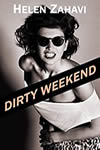
An interesting book from 1991 which is rather graphically violent. Bella ("Brighton Bella" she muses) is refusing to be a victim any more. Instead she morphs into a type of female vigilante.
The text has a lyrical quality of the same type I observed in Autumn by Ali Smith, (albeit a very different book), where words seem to be satisfying explored with the brain and the tongue. However, mostly - and rather counter to the text - I really enjoyed the setting in Brighton. Here are Bella's thoughts on the West Pier, which many locals might have echoed:
West Pier is her favourite pier. Her all-time favourite pier. It is first among piers, the pier of piers, a peerless pier. You want to head down to the coast in February. You want to pop down, if you have a moment. You want to see West Pier as it should be seen.
They've stopped cleaning off the mess the gulls drop, and it stands out white against the grey English sea. It's forlorn and desolate and ravaged, and they want to pull it down. They say it's unsafe. They say it's an eyesore. They say it detracts from the rest of the town.
Pygmies and philistines.
It's the town that detracts from the pier.[As of now, only a partial metal framework remains.]
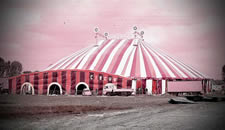 Red for Danger
Red for Danger
I experienced the same (patronising) admiration for this suspense thriller from 1954, as I did when listening to the Peter Coke/Marjory Westbury Paul Temple adaptations. As I said then, we - or I - tend to forget that fifties Radio plays were produced with great skill and realism - albeit that the realism is overlaid with slight over dramatisation in keeping with the time (and some actors are better than others). The script is good - but then is is written by Edward J Mason of Dick Barton and The Archers fame - and the conversations come across as very natural, especially considering the (fairly) preposterous plot involving a secret formula for a metal alloy, and foreign spies.
The hero is a jeweller by trade (although it sounds as though he's a gentleman sleuth who has had other adventures). While attending a birthday party, his hostess (Red) convinces him she is in danger... Cue the music...
Stars Ysanne Churchman. Anne Cullen, Arnold Peters, Bernard Rebel, Dudley Rolph, Gerik Schelderup, June Spencer and Peter Wilde; written by Edward J Mason, and produced by Philip Garston-Jones.
Edward J Mason is a name particularly memorable for me as he created a number of panel game shows with producer Tony Shryane, including My Word!, (and My Music), which I used to listen to secretly in bed at night after I was given my own transistor radio (with an earpiece) aged about 10.
Posted on February 28, 2021 at 6:13 PM
« Previous entry | Main | Next entry »Sunday January 31, 2021
Books in January
-
Alice Rice Mysteries: Blood in the Water, Where the Shadow Falls, Dying of the Light,
No Sorrow to Die, and, The Road to Hell
by Gillian GalbraithThese are pleasing detective procedurals of the type I very much enjoy. There are 6 Alice Rice novels and the only reason I have not read the last one is that it (unlike the others) is available in audio format so I am waiting to listen to it. I was led to them after I read (listened to) the stand-alone novel "End of the Line" (quite a different theme), which is her most recent and was, I think, the best.
According to the Times Gillian Galbraith's books have become one of the most sought after lending-library titles during the Covid-induced reading frenzy of the past year. I hope she writes more books, though I think there will be no more featuring Alice.
- The Ape who guards the Balance by Elizabeth Peters [read by Barbara Rosenblat]
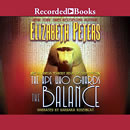 The usual amusing nonsense that faithful readers of these novels will enjoy - and expect. I am a faithless reader, and can't say I am enamoured - but I also hastily say that I do accept that this is "just me". I am not keen on the tongue-in-cheek way the main character with her false Victorian/Edwardian sensibilities is presented as the narrator. And yet I have come back to the series several times.... I can only say that they provide adequate background listening without my paying too much attention. [I might also add that this could be a mistake, as the plots are quite complex - and to that end I also feel the books would benefit from being read in chronological order].
The usual amusing nonsense that faithful readers of these novels will enjoy - and expect. I am a faithless reader, and can't say I am enamoured - but I also hastily say that I do accept that this is "just me". I am not keen on the tongue-in-cheek way the main character with her false Victorian/Edwardian sensibilities is presented as the narrator. And yet I have come back to the series several times.... I can only say that they provide adequate background listening without my paying too much attention. [I might also add that this could be a mistake, as the plots are quite complex - and to that end I also feel the books would benefit from being read in chronological order].
Posted on January 31, 2021 at 10:16 AM
« Previous entry | Main | Next entry »Thursday December 31, 2020
Books in December
- The Neon Rain by James Lee Burke [read by Will Patton]
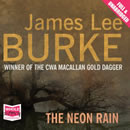 I was fairly blown away (no pun intended) by the first Robicheaux novel I read so decided as ever to read the series. I'm guessing his first one was written with no intention of a series as it's nicely rounded off with a (fairly) happy ending - but I'm glad the author brought Robicheaux back for more.
I was fairly blown away (no pun intended) by the first Robicheaux novel I read so decided as ever to read the series. I'm guessing his first one was written with no intention of a series as it's nicely rounded off with a (fairly) happy ending - but I'm glad the author brought Robicheaux back for more.
I am both astonished and touched by the author's descriptions of his homeland in these books. I have to say this type of descriptive prose constitutes the passages that a pleb like me will normally skip through when reading a thriller, but there is no temptation for me to do this here. If anything, I want to repeat the passages, rolling them around in my mind; they are so vivid and written with such love - it makes me want not only to visit "that" America but to be part of the landscape, being moved by the scenery as he is. - The Burial of Ghosts by Ann Cleeves [read by Colleen Prendergast]
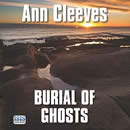 This book dates from around the same time as the first Vera Stanhope novel and seems to have very mixed reviews from her fans. It made me feel that some of the dissatisfied readers may be viewing it in the light of the hugely popular Vera and Shetland series - and maybe even in the light of TV series rather than the books.
This book dates from around the same time as the first Vera Stanhope novel and seems to have very mixed reviews from her fans. It made me feel that some of the dissatisfied readers may be viewing it in the light of the hugely popular Vera and Shetland series - and maybe even in the light of TV series rather than the books.
It has a fairly thrilling plot with an unusual premise (not wholly plausible but I'm happy to suspend disbelief) and seemed overall a good read (or listen). Ann (may I call you Ann?) tends towards psychological thrillers, and has an objective way of writing about her characters; this is harder to achieve when writing in the first person so inevitably it seems like a departure from her other work. It did remind me slightly of the structure and story telling style of Chris Brookmyre (whose writing I also love) - maybe simply because it's written from a female perspective in the first person and with an unusual premise. - The End of the Line by Gillian Galbraith [read by Gordon Griffin and Lesley Mackie ]
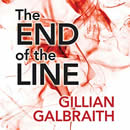 As usual (!) I found this author while looking at another "Galbraith" (aka J K Rowling). There were several of her (Gillian's) books on offer from the library, but I decided to start with the one that was not part of a series - in case I did not feel inclined to read any more of her work. However, no problem there; I found the book compelling both in the storyline the theme explored in the book (relating to the Infected Blood Inquiry).
As usual (!) I found this author while looking at another "Galbraith" (aka J K Rowling). There were several of her (Gillian's) books on offer from the library, but I decided to start with the one that was not part of a series - in case I did not feel inclined to read any more of her work. However, no problem there; I found the book compelling both in the storyline the theme explored in the book (relating to the Infected Blood Inquiry).
The story is told by an antiquarian book dealer who is tasked with clearing out the mansion of an elderly doctor. He comes across the old man's diary and is led to question, investigate, and understand, the real circumstances leading up to the old man's death. - Shifting Skin, and, Savage Moon
by Chris Simms
I've been catching up on the earlier DI Spicer novels in their written form. I may have said before that Spicer is not my favourite of Chris's characters but these made me warm to him a little more. [I would venture to suggest that the author is writing about a character more in an objective sense and one who is not like himself. I'm sure that is true of many writers since characters are made up and do not have to be autobiographical - and yet somehow I do not feel empathy or even sympathy with Spicer and I am not sure why.]
Posted on December 31, 2020 at 9:23 AM
« Previous entry | Main | Next entry »Friday November 13, 2020
Books in November
-
The Last Protector by Andrew Taylor [Read by Leighton Pugh]
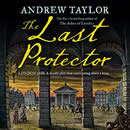 The is the latest in the Ashes of London series for which I've been impatiently waiting to be released in audio format. The Firecourt (second in the series) was the recommendation by a Guardian reviewer that drew this series to my attention and I have been a committed follower of Cat Lovett and James Marwood ever since. Our heroes have not seen each other for some good time. Cat is now married and relatively secure - but her husband is increasingly ill in mind as well as body, which makes things very hard for their business. James is seeing some success with his career but is constantly treading on eggshells to try to please (or at least not displease) two masters.
Both are unwillingly drawn into Cromwellian family schemes which could easily see them branded as traitors in their world full of hopeless political intrigue - especially given their own family backgrounds.
The is the latest in the Ashes of London series for which I've been impatiently waiting to be released in audio format. The Firecourt (second in the series) was the recommendation by a Guardian reviewer that drew this series to my attention and I have been a committed follower of Cat Lovett and James Marwood ever since. Our heroes have not seen each other for some good time. Cat is now married and relatively secure - but her husband is increasingly ill in mind as well as body, which makes things very hard for their business. James is seeing some success with his career but is constantly treading on eggshells to try to please (or at least not displease) two masters.
Both are unwillingly drawn into Cromwellian family schemes which could easily see them branded as traitors in their world full of hopeless political intrigue - especially given their own family backgrounds.
-
Mary Russell's War by Laurie R King
[Readers: Susan Bennett, John Keating, Robert Ian Mackenzie, and Jenny Sterlin]
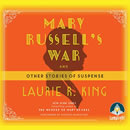 A collection of 9 short stories, filling in gaps in the narrative of the full novels, starting with England's declaration of war in 1914. Narratives are in various voices - some first and some third person.
A collection of 9 short stories, filling in gaps in the narrative of the full novels, starting with England's declaration of war in 1914. Narratives are in various voices - some first and some third person.
Like many other readers (I discovered) I had a probem with the story set in 1992 where Holmes is apparently still living. When I say I had a "problem" with it - I like the idea that the author blazes away with her story without any reguard for a "real" time line, and on the whole I think prefer it to the concept that Holmes at any point leaves the history for good (given that this is all fiction); the problem I had was thinking that I must be making a fundamental error in my continual internal mental calculations. The author's only answer to the question "how is he still alive and kicking in 1992?" is "this is one of the Great Mysteries of the Russell memoirs" - a delightful answer I think.- "Appreciation" by noted Sherlockian Leslie S Klinger
- Mary's Christmas - with Mary's Uncle Jake
- Mary Russell's War
- Beekeeping for Beginners
- Mrs Hudson's Case
- The Marriage of Mary Russell
- Birth of a Green Man
- A Venomous Death
- My Story
- A Case in Correspondence
- Stately Holmes
-
Killing with Confetti by Peter Lovesey [read by Peter Wickham]
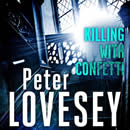
Entertaining enough Peter Diamond novel although I was not wild about the construction of the tale. There's a lengthy description of a wedding with all the detail of the endless waiting (to be fed) while the happy couple get the all important photos out of the way, plus the overexcited and bored bridesmaids - which is all so true to life that it's as tedious as the real thing. I think it's supposed to build tension but despite everything I never felt at any point that anyone was in danger. -
Fifty Fifty by Steve Cavanagh
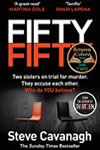
Cleverly constructed crime/courtroom drama about two sisters both claiming to be innocent (and thereby by implication accusing each other) of murdering their Father.
For me, this book is reminiscent of the 1946 film The Dark Mirror with Olivia de Havilland playing twin sisters, one of whom is known to have committed murder, and the other has an alibi. In that case neither sister is willing to turn on the other, so the police are unable to prosecute.
In this book the DA prosecutes both sisters together knowing he will secure a conviction against one or other of the sisters, if not both acting together. But which is guilty? -
Paul Temple and the Gilbert Case by Francis Durbridge
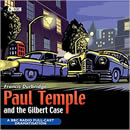 Just as Paul and Steve are about to go on holiday, Wilfred Stirling visits with a plea. His daughter Brenda was recently murdered, her body dumped on a bomb site. Her boyfriend Howard Gilbert, seen walking away from the site, has been convicted of the murder and sentenced to hang - but Brenda's father feels sure he didn't do it.. (despite having giving damnig evidence at the trial!).
Just as Paul and Steve are about to go on holiday, Wilfred Stirling visits with a plea. His daughter Brenda was recently murdered, her body dumped on a bomb site. Her boyfriend Howard Gilbert, seen walking away from the site, has been convicted of the murder and sentenced to hang - but Brenda's father feels sure he didn't do it.. (despite having giving damnig evidence at the trial!).
Stars (the best Paul and Steve), Peter Coke and Majorie Westbury, in an original 1950s recording.
I thought I had hoovered up all the available Paul Temple dramas but I seem to have missed this one, although all the business with the shoes seemed vaguely familiar.
>>Spoiler alert <<
Each missing shoe on a murder victim is supposed to be due to the fact that something was hidden there - but I would question how the murderer knew which shoe to take? It might have been prudent to snag both while you were at it - no? -
 A Reconstructed Corpse
A Reconstructed Corpse
Bill Nighy once again as the dipsomaniac, philandering actor. Happy enough to take on a job as the "lookalike" in a crime reconstruction programme investigating a missing person case. An all expenses paid trip to Brighton as part of the deal seems an ideal opportunity to celebrate his wedding anniversary and reconcile with Frances. But Charles soon uncovers a grizzly murder - and not perhaps the corpse we were expecting...
Based on Simon Brett's novel, once again brilliantly adapted by Jeremy Front.
Posted on November 13, 2020 at 3:43 PM
« Previous entry | Main | Next entry »Saturday October 31, 2020
Books in October
- Kolymsky Heights by Lionel Davidson [read by Peter Noble]
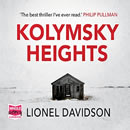
I thought this was a fantastic book recommended in a Guardian book list. It was a completely unexpected gem, as I had no idea even of the genre before reading it. It has a terrific forward by Philip Pullman where he explains how it works so well as a thriller, how the author skillfully makes the unbelievable believable, and expresses his overall appreciation of the writing and construction. As I am not an author I will leave it with Pullman's praise: "The best thriller I've ever read, and I've read plenty. A solidly researched and bone-chilling adventure in a savage setting, with a superb hero."
- Conspiracy by S.J. Parris
[read by Daniel Philpott]
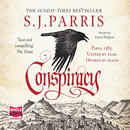 Having discovered that Giordano Bruno is a real historical figure - which was traumatic enough in itself - and since the author hangs her stories very much within the known historical facts of the character's whereabouts, I am approaching each new book with some trepidation. In this one, the action moves our hero away from the relative safety of a Protestant England, and back to France... and thus one step closer to his historical fate.
Having discovered that Giordano Bruno is a real historical figure - which was traumatic enough in itself - and since the author hangs her stories very much within the known historical facts of the character's whereabouts, I am approaching each new book with some trepidation. In this one, the action moves our hero away from the relative safety of a Protestant England, and back to France... and thus one step closer to his historical fate.
[Still hoping she will reprieve our hero by some fictional trickery (lie) before the end of the series.] - Bad Intentions by Karin Fossum
[read by David Rintoul]
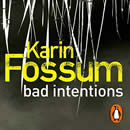 Another interesting plot line from Fossum centring on falling out among "thieves" (not literally). Almost a Shakespearian tragedy as the friends move towards their inevitable destiny, apparently victims of circumstance, but really victims of their own characters. In fact, one of them considers "how can you tell if you are a good man if your life has been nothing but plain sailing?". Sejer's attitude while he played his waiting game throughout the investigation reminded me of Chaucer's "Mordre wol out, that se we day by day."
Another interesting plot line from Fossum centring on falling out among "thieves" (not literally). Almost a Shakespearian tragedy as the friends move towards their inevitable destiny, apparently victims of circumstance, but really victims of their own characters. In fact, one of them considers "how can you tell if you are a good man if your life has been nothing but plain sailing?". Sejer's attitude while he played his waiting game throughout the investigation reminded me of Chaucer's "Mordre wol out, that se we day by day."
It's a while since I last read any of this series so I was wondering if I had imagined that Sejer had had a burgeoning romantic friendship in the first few books - however it seems she was simply written out with little explanation after "Black Seconds". I think this is a shame - it leaves a rather old-fashioned, mild-mannered, and polite man who finds comfort in order and authority, with only the comfort of his faithful old dog. Although it might be refreshing to have a stable policeman without the usual issues of alcoholism, failed relationships, or a dysfunctional family, equally we have none of the interest that that those things bring with them. I find the books becoming more entrenched in the psychological make up of criminals and victims; this is very well portrayed but I think needs to be offset with more than the calm approach of our hero, and the philosophical discussions between him and his sidekick. - The King's Justice, and The Monastery Murders
by E. M. Powell
Given my increasing interest in fictional historical murder mysteries, I acquired these as a special offer via Amazon. They were "good enough" in plot and general interest but not enough to tempt me to purchase the follow-on novels in the series. I'm not sure what is lacking but they compare unfavourably with the novels of CJ Samsom, SJ Parris, and Andrew Taylor, where I find myself "right there" in the action - my imagination totally caught up in time and place as well as the action and adventure. By contrast, these stories could almost be taking place in any time or place, and were more mystery than thriller.
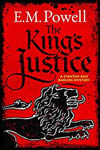
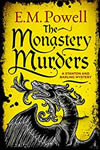
Posted on October 31, 2020 at 2:06 PM
« Previous entry | Main | Next entry »Wednesday September 30, 2020
Books in September
- The Word is Murder, and The Sentence is Death
by Anthony Horowitz [Read by Rory Kinnear]
I almost can't exaggerate how much I love this author. One could say that with his inventive construction for these books and the Magpie Murders, that he is indulging in writing "gimmicks" but I think he executes all his work with such skill and brilliance that all I can say is "bring on some more".
In this series we find the author (Anthony - not Tony) has written himself into the story, which then becomes something of a biography giving him free rein to include delightful anecdotes and episodes based around real events - as well as many episodes that I fervently hope and expect are far from real. It is woven together seamlessly, mixing fact and fiction so that you are easily able to suspend any disbelief. The book is excellently read by Rory Kinnear who sounds very similar to Horowitz which adds to the deception.
His main character (if not himself) is a definitely fictional and not very likeable but also ... strange... and therefore very interesting. Ex-detective Daniel Hawthorne is "ex" of the Met and now a "consulting detective" - draw your own comparisons. Anthony describes himself in the narrative with his emotions and reactions exposed in a very appealing and apparently open way revealing all his flaws and sense of self-importance - which of course is a form of false modesty but nonetheless appealing...
The final words of the second book are another sheer delight to one who is not an author and with no understanding of writing as a craft. He describes himself in his scene feeling low; Hawthorne then predicts how he'll describe the scene including the dismal weather; Hawthorne leaves, and Anthony proceeds to descibe the scene anew in way which we all now know to be "the pathetic fallacy".
During the course of the book, opening up an author's life, we come to know the "three book deal". I hope this will be true to life with regard to these books - in fact I hope he can continue with this theme beyond 3 without spoiling the effect of the novelty of the idea. But I think this author is very good at the discipline of quitting while he is ahead.
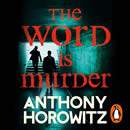
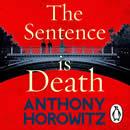
I have to add a note here that not all readers are as smitten as I and find Horowitz's descriptions of his life as a successful writer, and all the anecdotes, to be simply tedious smug self-aggrandisement. They would prefer just to stick to the murder story.
I can see that point of view - you do have to have a pre-existing affection for the author - but overall I think they are missing the point. - The Birdwatcher by William Shaw [read by Roger Davis]
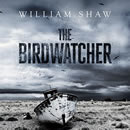
Another really excellent thriller recommended in the Guardian reviews. The book alternates between time lines, which is a structure that I find slightly irritating, because it acts as a kind punctuation mark in the pace of each separate plot line; however, this is intentional of course and is very effective. A couple of what must rate as my favourite books have employed this (not uncommon) technique.
The policeman "hero" is our birdwatcher, and I particularly like that this is presented in a truly realistic way. It's his hobby, and he goes out whenever he can as part of his normal life - it does not become the major point of the drama, and is not presented as an exceptional thing depite being very much present throughout.
Somewhat poignant though overall upbeat ending. - The Birds Fall Down by Rebecca West
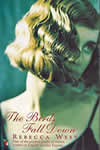 A novel centred on Count Nikolai Diakonov, a Russian exile in Paris during the beginning of the Twentieth Century, who, as a senior minister in the Russian government had been suddenly stripped of his position and exiled to France, along with his family. However the story is told by his 18 year old privileged grand-daughter and is almost a coming of age story as she tries to understand love and the various relationships she sees around her. She is manipulated by her own intense emotions engendered by threats to her and her grandfather's life, which culminates in a rather critical and ultimately lethal misunderstanding of the double-agent's feelings and intentions towards her.
A novel centred on Count Nikolai Diakonov, a Russian exile in Paris during the beginning of the Twentieth Century, who, as a senior minister in the Russian government had been suddenly stripped of his position and exiled to France, along with his family. However the story is told by his 18 year old privileged grand-daughter and is almost a coming of age story as she tries to understand love and the various relationships she sees around her. She is manipulated by her own intense emotions engendered by threats to her and her grandfather's life, which culminates in a rather critical and ultimately lethal misunderstanding of the double-agent's feelings and intentions towards her.
I found it a pretty challenging read.
West states it is founded on historical events but not very specifically it seems. She had a fascination with treason and traitors, as well as Russia, which is explored in a number of her books. I was interested to note that Anthony Horowitz reveals in his books above that he is reading A New Meaning of Treason as part of his research for the post-war episodes of Foyle's War. - Early Riser by Jasper Fforde
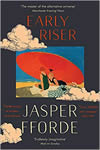
By contrast this was a sheer light hearted "romp" and very easy to read. I have not physically read many books on the page of late and had fogotten what a delight it is to do so. Fforde has created a whole new imaginary world, parallel to our own, and set plausibly into the England (or Wales) we know and (some of us - Wales that is) live in.
Every Winter, the human population hibernates.
During those bitterly cold four months, the nation is a snow-draped landscape of desolate loneliness, and devoid of human activity.
But so long as you remember to wrap up warmly, you'll be fine.
Posted on September 30, 2020 at 10:54 PM
« Previous entry | Main | Next entry »Monday August 31, 2020
Books in August
- The Bat by Jo Nesbo [read by Seán Barrett]
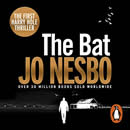
I finally started on Jo Nesbo's Harry Hole series, and - as everyone else already knows - it is gripping.
I recently bought a film version of The Snowman starring Michael Fassbender (now that I actually know who he is) and I gather that alcoholism is a key feature of Harry's life. However, in listening to this first outing, I had hoped it was a tale of love and redemption - but for a series, where would be the fun in that? (I suppose). - Fallen Angel by Christopher Brookmyre
[read by Cathleen McCarron]
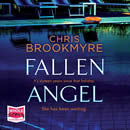
This is a warm tale with a good mystery at its heart and packed with unlikely coincidences - so much so that (in combination with the ending) these days Chris Brookmyre books approach 18th century plays like Wild Oats or, the more contemporary satire, What the Butler Saw.... But don't get me wrong - I'm all for it.
While this can't be regarded as one of the Jack Parlabane canon, he does make a cameo appearance. - The Baby Snatcher by Ann Cleeves
[read by Simon Mattacks]
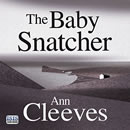 This is the final book in the Inspector Ramsay series from the 1990s, coming after The Healers. Had I realised it was a series I might have taken more trouble to listen to them in sequence. However Ramsay is not so dominant as a character as to overshadow the stories themselves, and there are many reflections and insights into the lives of the other participants in the tale. [This is also very much true of the Vera series, but I like her so much and she has such depth as a chracter that I do find myself holding my breath until she appears].
This is the final book in the Inspector Ramsay series from the 1990s, coming after The Healers. Had I realised it was a series I might have taken more trouble to listen to them in sequence. However Ramsay is not so dominant as a character as to overshadow the stories themselves, and there are many reflections and insights into the lives of the other participants in the tale. [This is also very much true of the Vera series, but I like her so much and she has such depth as a chracter that I do find myself holding my breath until she appears].
This seems to me quite an unusual story line with each player having his/her own wholly plausible motivations and obsessions - some with relevance to the murder mystery and some red herrings, though every red herring is a neat little story line in its own right.
Posted on August 31, 2020 at 7:22 AM
« Previous entry | Main | Next entry »Friday July 31, 2020
Books in July
- Autumn by Ali Smith
[read by Melody Grove ]
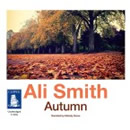 This is a wonderful book. I did not rush into reading it as I expected it to be a work of mind-expanding well-written prose and thus a worthy but difficult read - well it was the former but not the latter. The writer wanted to explore how we experience time - which is wholly subjective and a topic that has often interested me. I'm a hopeless descriptive writer so read the Guardian review. In terms of its intellectual content - it raised my curiosity to go and find out more about sixties pop-artist Pauline Boty - and look at her work (on line); I had never heard of her, and, while I am not the world's greatest culture vulture, I think that underlines just one of the many points that Smith was making. [Her character's attempts to have a typically misogynistic art school lecturer accept Boty as a subject for a dissertation seem to me to hint at personal experience].
This is a wonderful book. I did not rush into reading it as I expected it to be a work of mind-expanding well-written prose and thus a worthy but difficult read - well it was the former but not the latter. The writer wanted to explore how we experience time - which is wholly subjective and a topic that has often interested me. I'm a hopeless descriptive writer so read the Guardian review. In terms of its intellectual content - it raised my curiosity to go and find out more about sixties pop-artist Pauline Boty - and look at her work (on line); I had never heard of her, and, while I am not the world's greatest culture vulture, I think that underlines just one of the many points that Smith was making. [Her character's attempts to have a typically misogynistic art school lecturer accept Boty as a subject for a dissertation seem to me to hint at personal experience].
As is often the case, I listened to this book and the language is so beautiful, it really lent itself to being spoken aloud and Melody Grove did so perfectly (melodically). There were many political views expressed which resonated with me and some reflective passages with lyrical repetitive almost poetry that I found both sharp and moving:
All across the country, people felt it was the wrong thing. All across the country, people felt it was the right thing. All across the country, people felt they'd really lost. All across the country, people felt they'd really won. All across the country, people felt they'd done the right thing and other people had done the wrong thing.....
....All across the country, people felt legitimised. All across the country, people felt bereaved and shocked. All across the country, people felt righteous. All across the country, people felt sick. All across the country, people felt history at their shoulder. All across the country, people felt history meant nothing. All across the country, people felt like they counted for nothing. All across the country, people had pinned their hopes on it. - Meet Me/Murder/Missing/Midnight (all) In Malmo
by Torquil MacLeod [Read by Marguerite Gavin]
I have considered before that it may be wrong of me to judge a book solely on the basis of its delivery in the spoken word. I have been aware that a good narrator can really alter the perception of a story from ordinary to outstanding, by almost acting quality narrators such as Christian Rodska, or Mark Billingham - and also, of course, some books are better suited to being read aloud than others, such as The Moonstone (which is written, and delivered, in different voices); a number of books have the benefit of being read by their authors, which means they are spoken in the way they were intended by the author, such as Helen Macdonald, or Rory McGrath. Sadly, this was not the case with these books and negatively influenced my whole perception of them.
They are defnitely good mystery stories with a plausibly written heroine detective which realistically describes her home and working life and relationships, but any proper judgement of their worth was hindered in the extreme by the narration. Often, while listening through the peculiar pronunciations and incorrect stressing, I felt the language would have been much more natural and realistic if being read on the page. As it was, it sounded like it was being read by someone for whom English was not her first language, practicing for an elocution exam. On top of the issues with the straight reading of the English, the narrator was called upon to - or felt bound to - try and deliver both Scottish and Jordy acccents which is a tall order for any actor, and what she came up with would have been funny if not so annoying.
Although this is very damning, I see (frankly, to my amazement) that Marguerite Gavin has won various awards for her narrations and "disappears as the narrator, letting the story take the limelight" - which I suppose is true in that she added nothing - especially in terms of delivering dialogue with any realistic intonation. However it seems my opinions are not shared by all in that she has a "devoted fan following". All I can say in her favour is that her voice is pleasant, ("sonorous" apparently), and her diction is very clear, so it might suit listeners for whom English is not their first language.
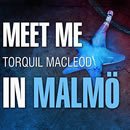
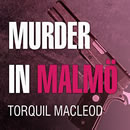
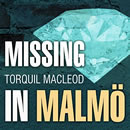
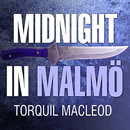
 A Doubtful Death
A Doubtful Death
Return of the loveably louche actor-cum-amateur detective: to his horror, Charles has landed a role, in a re-imagining of Hamlet in an immersive production by a high-concept theatre group in Oxford. When the actress playing Ophelia goes missing, in between rehearsals with puppeteers and mime artists, Charles decides to find out what has happened to her.
Based on Simon Brett's novel, once again brilliantly adapted by Jeremy Front, and starring Bill Nighy, Suzanne Burden, Jon Glover, Jessica Turner, Scarlett Courtney, Ian Conningham, Will Kirk, and Lucy Reynolds. Directed by Sally Avens.
Posted on July 31, 2020 at 11:04 AM
« Previous entry | Main | Next entry »Tuesday June 30, 2020
Books in June
- The Broken Shore by Peter Temple [read by Peter Hosking]
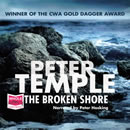 This was another great discovery from Michael Robotham's Desert Island book list at the Crime Vault website. A book that is really suited to the spoken word, though it needs to be - and was - excellently read in wonderful conversational style by Peter Hosking.
This was another great discovery from Michael Robotham's Desert Island book list at the Crime Vault website. A book that is really suited to the spoken word, though it needs to be - and was - excellently read in wonderful conversational style by Peter Hosking.
This novel is from 2005, and won the CWA Gold Dagger in 2007. Robotham says of Temple:"he was truly one of Australia's great writers, who never sacrificed the nuances of character, setting, or back story for the sake of plot or pace, giving equal care and attention to even minor players..... a terrific story full of simmering corruption and prejudice, glorious observations, and some of the best writing in the genre"
I felt I wanted to hear more about these characters, but sadly Peter Temple died in 2018 without revisiting them, but I shall certainly be looking out for more of his books, as well as more narrations from Peter Hosking. - Sleeping Dogs by Chris Simms [read by Dean Williamson]
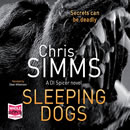
The usual (how blase I am becoming about excellent writers!) exciting police story from Chris Simms. I'm not so fond of Spicer as a character - pugilistic rugger bugger - can't empathise much - but that makes no difference to the fast paced excitement of the stories in which he features.
Fighting dogs are central to this story, along with illegal activities that go with it. I was very interested in the descriptions of the mystery killer dog, based on the thought-to-be-extinct Alano, and was driven to read about it further - comforting myself that it might be mostly a creation of Chris Simm's imagination... -
Agatha RaisinMysteries:
Pushing Up Daisies, the Witches' Tree, the Dead Ringer, and, Beating about the Bush
by M C Beaton [Read by Penelope Keith]I thought it was a long time since I had read any of these books and sure enough there were 4 waiting in the wings. As another one (Hot to Trot) came out in October, I was surprised and very sad to read that Marion Chesney had died in December 2019. I knew she was an older lady - in fact, as I had suspected, in her 50s when she started the Agatha Raisin series, since Agatha had retired from her high powered (1980s) job on her 50th birthday. But unlike Chesney, Agatha stayed forever in her 50s, pursuing the unattainable dream of true love to the last, with the author retaining a fresh style and keeping well up with modern life.
On the latter theme, although the idyll of retiring to the Cotswolds was always a little tongue in cheek, I noticed in these last few books a much greater implicit criticism of the outsiders moving there expecting to step into some fantasy world of the past. I have to admit I enjoyed this aspect of the fictional village with its Ladies' Society, all addressing each other with formal titles rather than Christian names, and its fêtes and afternoon teas, and was disappointed to find it suddenly labelled anachronistic with the Ladies' Society disbanded. However, having lived in the Cotswolds herself for many years, and clearly no longer a naive incomer, I think she found such people wearing and did not want her now mainstream books to encourage them any further in their folly.
So now it only remains for me to read Hot to Trot with suitable reverance and delight.
Posted on June 30, 2020 at 11:40 AM
« Previous entry | Main | Next entry »Sunday May 31, 2020
Books in May
- Shell Game by Sara Paretsky [read by Liza Ross]
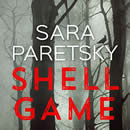
The shell game is one I know as "find the lady" - which, although the latter is the name for the playing card version, I had always heard it extended to the "cup and ball" version. Basically there are 3 inverted cups, under which a ball (or shell) is hidden - you see where the ball starts, the trickster moves the cups around, you bet on which cup contains the ball, you lose your money. You can always find confidence tricksters exhibiting their skills at this around central London, usually with "plants" in the audience who apparently get the better of the trickster when invited to place a bet. I might say, that since this game is so well known, to my mind you can hardly bestow the title "scammer" on these (skilled) individuals; you always "know" where the ball is, and (amazingly) it is never there.
Paretsky uses the name in the American sense of "a deceptive and evasive action or ploy". The books starts with a stolen artefact, but then moves on to a missing niece and a financial scam. The book seems to have had mixed reviews - some people saying that the underlying financial scam was a bit tedious - and I have to say that I find Kathy Reichs' underlying "exposes" in her books a little wearing - but somehow not Parestsky's as they seem much less heavy handed - more factual and less opinionated, even though she makes no bones about where her heroine stands on the political spectrum.
[That being the case, one commentator did amuse me by saying "always a fan of Paretsky, but not her politics" which seems to me to be an oxymoron since her books and heroine wholly reflect her politics.] - The Swimming Pool by Louise Candlish [read by Gabrielle Baker]
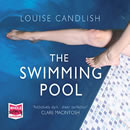
I liked Our House so much that I chose some other books by the same author. This one has a lovely aura around it (if that's possible). This book uses the technique of "then and now" with 3 time lines very effectively intertwined, illustrating youthful guilt, endless summers, and the glossy middle-classes closing ranks.
Again, mixed reviews - some finding the story wonderful and others, boring. I feel that the more critical readers had read her previous books and were more interested in a classic thriller/mystery with a surprise ending - rather than a book more of the psychological thriller genre. In fact, for me, it did have a rather surprise ending which I had not guessed, as well as some thrilling action. However, I guess you did have to "enjoy the journey" - which I most certainly did. I love swimming, open air pools, and glamorous bohemian lifestyles; so I was easily swept along with the narrator. Like her I was drawn in, but at the same time, all too aware of the underlying anxiety and threat of what might be to come. - Treachery by S.J. Parris
[read by Laurence Kennedy]
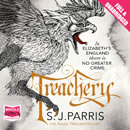
We have reached the summer of 1585 and the action has moved to Plymouth, making for more wonderful opportunities to describe the old Tudor town and harbour. Sir Francis Drake is preparing to sail on an expedition to attack Spanish-held ports in the Americas, and "liberate" King Philip's treasures. Bruno's friend, Sir Philip Sidney, is gagging to join the voyage (and take Bruno with him) - but against the wishes of Queen Elizabeth, Sir Francis, and very much Bruno himself. Needless to say, the pair are soon drawn into investigating a mysterious death and a plot to foil Drake's mission before it begins. - The Skeleton Road by Val McDermid
[read by Cathleen McCarron]
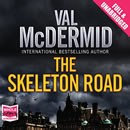
I'm not sure why but I never regarded Val McDermid as one of the "greats" of crime fiction although clearly she is - not only popular, and able to tell a great tale, but also, as far as I am able to judge, a good writer. So why did I never see her on a par with, say, Ian Rankin?
Anyway, my bad, noting that McDermid appears in at least 3 of the Crime Vault's Desert Island book choices - although some have gone for the more predictable "Wire in the Blood" series. This one had more breadth about it covering a cold case starting in Scotland and moving through Yugoslavia. It is part of her Karen Pirie series, but seems to have had mixed reviews from her fans. - The Vinyl Detective by Andrew Cartmel [Read by Ben Allen, and Finlay Robertson]
Helen put me on to these books - and what a wonderful "find" they are. Again, probably the kind of thing that presses all the right buttons for me; they have a slightly retro feel of the amateur detective, the author appears to have put a lot of himself into the main character (true or not one can never really say), and the perspective of the true (in this case vinyl) collector is really well explained without being either boring or patronising
Helen thought Rob would like these books and gave me the first one - which I duly passed on to him. In fact, although he liked it, I was more smitten than he, simply commenting that he "does not know much about jazz" - although to my mind that's not really important, so I guess the thriller mystery is of more importance than the music. [Although the Big Band novel did make me go to YouTube and listen to Annette Hanshaw (Blank Bottom) and her trademark "That's All" which was wonderful.]
The unnamed hero is a specialist collector of vinyl jazz records - as in: he will track down a rare record for you for a fee - not an actual detective. In keeping with his geeky nature, he is also obsessive about coffee, and, rather more oddly, very keen on his cats. Through twists of fate, he is led to track down records of different types and genres and has to compete with others bent on murderous intent. The genres in order are: jazz, psychedelic rock, big band, and heavy metal. Can't wait to read Low Action. [I empathise with the comment of another reader: "I felt I wanted to hang out with most of the characters".]
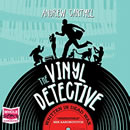
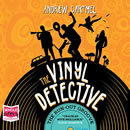
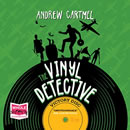
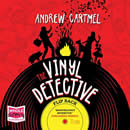
Posted on May 31, 2020 at 8:39 AM
« Previous entry | Main | Next entry »Thursday April 30, 2020
Books in April
- The Hunting Party by Lucy Foley
[read by Cathleen McCarron, Laura Kirman, Clare Corbett, Ellie Heydon, and Joshua Manning]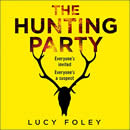
From the Guardian review of thrillers at the start of 2019, this is a locked room mystery; set in a snowed-in lodge in Scotland, the characters are gathered for a luxury few days away over New Year. Although this is a tradition for them, it seems that - very true to life - they have all changed from the band of University bright young things they once were, and another dimension has been introduced over the years with partners joining in. Obviously this would have been a gradual realisation for them all but there seems to be a final clarity after the death of one of their number. Dangerous lunatic outsider? or "one of us"?
Each character (including dangerous lunatic outsiders) is given his/her own voice, so of course one of them is inevitably the unreliable narrator.
I am always a sucker for a "happy" ending and without too much of a spoiler - this one is fairly satisfying. - As I listened to this book, I felt the scenario was somewhat familiar, and I was sure it had been adapted as a radio play but can find no evidence of that. I can only think that I was confusing it with Mrs Sidhu's Deadly Highland Game - hard to believe, I know, as they are as different in style as they could be, but it's my only possible conclusion.
- Scratch Deeper by Chris Simms [read by Becky Hindley]
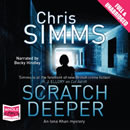
This book, was another one that featured in a Guardian round-up of crime fiction (from as long ago as 2012). This was the first reference that alerted me to Chris Simms' books, and was introducing a new police character in the shape of DC Iona Khan ("feisty" DC Khan, apparently - interesting that the word feisty, while meant as a compliment, is almost exclusively applied to women ...or squirrels... But I digress...). In this first book of the series, she was a newly promoted DC in Manchester's counter-terrorism unit; her inexperience and junior status added to the tension as we worked towards a thrilling conclusion. It is not the first of Chris's books I read (listened to) - in fact I read the second in this particular series back 2018, so out of sequence - but both books were excellent, and I hope there will be more stories featuring DC Khan soon. - Body and Soul by John Harvey [read by Gordon Griffin]
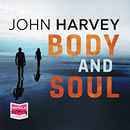
This author is best known for his character Charlie Resnick, and I have always meant to read some of those well-loved books - I read that he retired Resnick in 2014, so I have the opportunity to read the complete canon... However, I started on the Frank Elder series (somewhat fewer books), perversely beginning with this one which is the last in the series. I thought it did would not much matter, but found at the end (spoiler alert) that it was rather a more definite end for Elder than for Resnick. I was not overly concerned with this as I had not become attached to the character over a series of novels, and I did not feel much empathy with Elder; I am thinking that Harvey wrote this as an older man himself and perhaps would be more appreciated by older men than by me. [I remember Hess being exasperated by the cult following for Steppenwolf among the young in the 1960s, and stating it could not be understood properly by anyone under the age of 50... I might add that I am not certain it can be properly understood by anyone - but I did read it in my 20s].
Anyway this book is a good read, as you would expect, but throughout it seems to have a rather melancholy air of something ending.
Posted on April 30, 2020 at 3:16 PM
« Previous entry | Main | Next entry »Tuesday March 31, 2020
Books in March
- The Sussex Murder (County Guides 5) by Ian Sansom [read by Mike Grady]
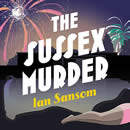
This was the book I saw reviewed in the Guardian which set me off reading the County Guides in the first place. I was really looking forward to hearing about "my own" county (in 1937) as part of this series. In fact it centres in Lewes, so mainly East Sussex - and I'm a West Sussex girl - but I made the best of it - and they did visit the Bramber museum which holds defining memories of my childhood, being full of cases of deformed stuffed animals - all at toddler viewing height... (there were other rather more lovely Victorian scenes - but all stuffed animals I'm afraid - kittens, rabbits, rats, and even one of red squirrels....).
Readers gave this book mixed reviews: "fun and very quirky, probably not for you if you're looking for traditional murder mysteries" (positive) and one, which made me laugh a lot and with which I totally agree, and yet I - unlike the commenter - still love the books: "...[I read on] in the hope that Sefton, after running around inner London during the early hours, in a naked state, would get washed, put on clean clothing, eat a meal and finally emerge from his seemingly permanent state of a hangover..." - and like the reviewer I have wondered what it would be like travelling in a car with Sefton in that state, as Morley and Miriam often seem happily to do.
I guess if Sansom intends to carry on with his 44 book series (and I really hope he does), I guess he will have to find some content beyond the quirks of his travellers, as we are complacent about them now, and the books are not really mystery novels at their core. - Tin Roof Blowdown by James Lee Burke [read by Will Patton]
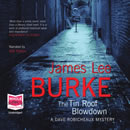
This is from the Desert Island Crime list of Michael Robotham who says he "could have chosen any one of a dozen books by James Lee Burke". It is a Dave Robicheaux novel (the 16th) and is set in 2005 New Orleans during Hurricane Katrina. The story follows various characters caught up in the tragedy - a junkie priest, street thugs, a mob boss, a sadistic psychopath - each with his own story.
Having read other of Burke's novels since this one, I see he writes lyrically and lovingly of his home territory, which makes these descriptions of the lawless wasteland confronting Robicheaux even more stark and tragic.
I think this is a very good novel on many levels and pretty educational for me. I never visited New Orleans - only ever saw it in films - so I really could not (and probably still can't) imagine how dreadful and catastrophic this was, despite the copious amount of news footage at the time. As well as a positive review of this book in the Guardian, there is also a strong critique which is well worth looking at for someone as generally ignorant of world events as I am. - Ripper by Isabel Allende [read by Edoardo Ballerini]
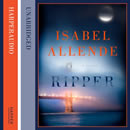
Helen recommended an Isabel Allende book which she was reading with her book group (In the Midst of Winter I think). So when I found that Ripper was Allende's venture into thriller territory, I had to read it - or listen to it.
There are many adult characters, beautifully described, and each with long back stories, which may really give this book its real heart. However, the protagonist is a teenager, Amanda, who with her friends play a game on line called "Ripper", and who comes to decide that they can solve some rather bizarre and gruesome real-life murders. The initial murder is grim to say the least - and for Amanda it becomes an obsession. Exasperating though the teenagers are - especially for Amanda's Father who is the deputy chief of police - they do have a lot of help from the adults one way or another, as they inevitably move closer to the truth.
This is a strange book, and was rather strangely read, but thrilling and tense to the last. - Sacrilege by S.J. Parris
[read by Laurence Kennedy]
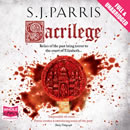
It's 1584, and the action moves to Canterbury. Against his better judgement (and the advice of anyone else) Bruno is drawn into helping an amour (who appeared in the first book) who is on the run. It demonstrates the dangers of the time (or even now) where moving to an autonomous strange city with no allies or sponsors means corrupt bullies can reign apparently unchecked by the law of the land.
And then, funnily enough, after risking his life and having been subject to considerable ill treatment - all for love (of a woman and not to mention his beloved ancient book) - he is betrayed yet again.
Let's hope he learns his lesson in the folly of both loves. - The Healers by Ann Cleeves
[read by Simon Mattacks ]
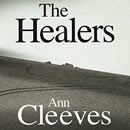
Part of the Inspector Ramsay series written in the 1990s (just before Vera Stanhope made her first appearance). Had I realised this was a "series" I might have read them in order; however in this case, not having previously met the characters made absolutely no difference to the understanding and enjoyment of the story.
It's an (apparently) straightforward murder case with some (apparently) ideal new-age traveller suspects readily to hand. Soon, however, there is a second murder which, on the surface, seems unlikely to be connected. Then, inevitably, as the plot evolves things seem to focus on the Alternative Therapy Centre - the Healers of the title - and Ramsey gradually puts the pieces together.
Posted on March 31, 2020 at 5:43 PM
« Previous entry | Main | Next entry »Saturday February 29, 2020
Books in February
- This Golden Fleece by Esther Rutter
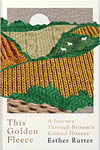
I heard Esther Rutter on Saturday Live publicising this book as I drove back from Scotland last December. She talked about her family life and growing up on a sheep farm in Suffolk, and how, after a degree in English, she managed to gain sponsorship to write this book, and the trials of her rather basic existence while she did it. Over 12 months (12 chapters and 12 pieces of knitting) she describes the histories of communities whose lives were shaped by wool. This is a meditation on the craft and history of knitting, rather than a book of patterns. I thought I might "knit along" with her painstaking pieces - but (luckily) that's not really the aim of the book.
Note 1: If you go to the Saturday Live piece, do listen to Jason Manford as well as Esther - his amusing reminiscences of his childhood holiday at Butlins really struck a chord with me (and he is very funny).
Note 2: Esther also appeared on Woman's Hour earlier in the year: 7 minutes on the "secret feminist history of knitting". - The Last by Hanna Jameson [read by Anthony Starke]
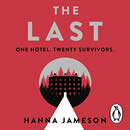
This is a story about the end of the world - or the world as we know it - or the Western world. The ensuing chaos is horribly realistic from the point of view of 20 people staying in a remote hotel in Switzerland. They pool their resources (good for some period in a hotel) but others covet their food, and it's pretty obvious to all that bullies will rule - and guns talk.
Against this pretty devastating backdrop, there is some kind of murder mystery which the protagonist tried to solve. But of course he has no idea how the killer could be brought to justice even if he does.
In my view the scenario is written so vividly that it is more interesting and has more tension than the mystery. - The Sleeping and the Dead by Ann Cleeves
[read by John Telfer ]
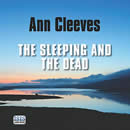
Just before the Shetland novels came into being, Ann wrote this - now, a stand-alone novel since she did not revisit the main characters (Detective Peter Porteous and Hannah Morton).
The story revolves around a cold case (increasingly popular in fiction and "real crime"): a body is found in a lake, and finally deduced to be a teenager who went missing in 1972. Of course identifying the lad has repercussions for everyone who knew him all those years ago....
Posted on February 29, 2020 at 5:33 PM
« Previous entry | Main | Next entry »Tuesday February 25, 2020
Conical People ... and Bread
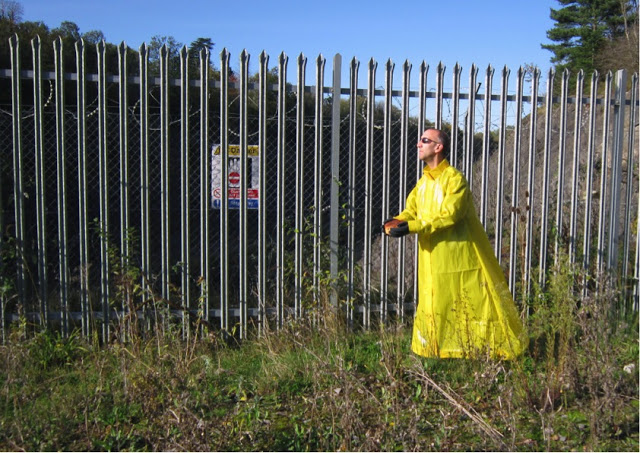
Adrian demonstrates the personal protective equipment necessary for the correct handling of lardy bread.
Conical People and Bread - the Book - has arrived! You can read all about Felicity and the life Dada here.
And below explains (or validates) my interest in the book...
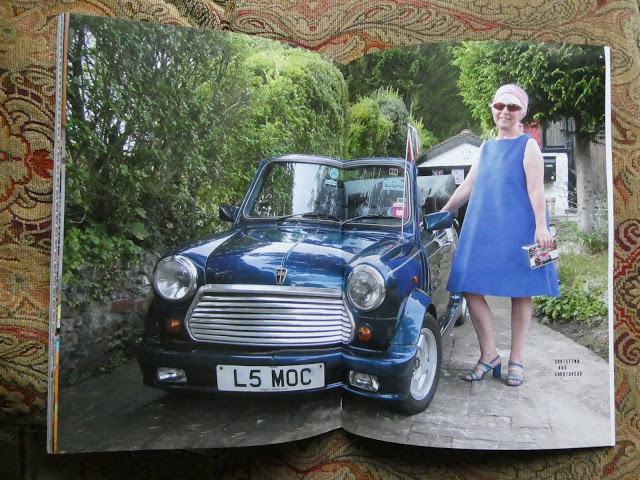
Posted on February 25, 2020 at 5:57 PM
« Previous entry | Main | Next entry »Friday January 31, 2020
Books in January
- Murder on Christmas Eve edited by Cecily Gayford
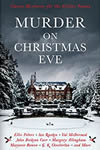 A collection of 10 Christmas themed short stories by classic mystery writers
A collection of 10 Christmas themed short stories by classic mystery writers
- The Trinity Cat Ellis Peters
- The Santa Claus Cat Julian Symons
- The Four Seasons Michael Innes
- No Sanity Claus Ian Rankin
- The Footprint in the Sky John Dickson Carr
- A Wife in a Million Val McDermid
- The Dagger with Wings G K Chesterton
- Cambric Tea Marjorie Bowen
- As Dark as Christmas Gets Lawrence Block
- On Christmas Day in the Morning Marjorie Allingham
- Prophecy by S.J. Parris
[read by Laurence Kennedy]
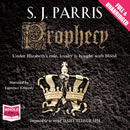
It's Autumn, 1583. Rumours and predictions abound. Mary Stuart's supporters, always scheming to usurp Elizabeth, take heart and advantage of the astrological year of the Great Conjunction (once in a thousand years), when the two most powerful planets, Jupiter and Saturn, align. Murders at the palace are dressed up with occult symbolism, but Bruno can see they may have a more political motivation.
John Dee appears as a character in this book, in which we see his diminishing influence at court and his leanings towards the supernatural. This and his use of a crystal-gazer (charlatan), finally leads to his leaving England. [Bruno of course is delighted to know him and have use of his library during this period]. - The Waters Edge by Karin Fossum
[read by David Rintoul]
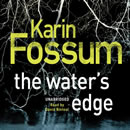 I realise this description may contain >>spoilers<< (but probably best not to read this author expecting a traditional whodunnit).
I realise this description may contain >>spoilers<< (but probably best not to read this author expecting a traditional whodunnit).
A very sad tale (when are they not?) investigating the murder of a young boy. We see things from the perspective of the criminal (clearly bonkers), and the altogether weird behaviour of the male half of the couple that found the body. The death seems to be "natural causes" but clearly brought on by some kind of assault.
Weeks go by with suspicions of a "man seen in the woods" but no arrest - then a second boy goes missing. The police finally move in on the man guilty of the assault - but it is Inspector Sejer who deduces the even sadder fate of the second child.
Posted on January 31, 2020 at 7:17 PM
« Previous entry | Main | Next entry »Tuesday December 31, 2019
Books in December
- The Lunar Cats by Lynne Truss
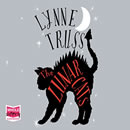
A sequel to the very funny book Cat Out of Hell - which I read as long ago as 2015. This all begins when Alec, as a retired librarian, takes up a strange research request by email - and then (foolishly) is beguiled into taking in an innocent little stray kitten...
Maybe not quite as laugh out loud this time but still lots of fun - despite (or perhaps because of) the rather outlandish horrors that the heroes have to endure. I especially enjoyed the ship's cat diaries from the Endeavour, where the cat tries to introduce himself to Cook, expecting his due respect on board as an eminent (cat) scientist, but instead is met with the expostulation: "whose fucking cat is that?!" - Heresy by S.J. Parris
[read by Laurence Kennedy]
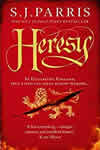
Helen thought I would like this book - lending me this first in the series - and she was not wrong. It's set in the time of Queen Elizabeth I, and is recommended to "those who like CJ Sansom - and Hilary Mantel" (although the latter is rather in a different category I think). At first I was a little resistant but it took only a few pages to win me over. Stephanie Merritt is a writer/journalist (and critic) rather than a historian but her books are well researched, making for delightful and wholly convincing reading about character, time, and place. She sticks to what is known about Bruno - and in the way of all good writers, splendidly fills in the rest ("the novelist begins with the parts of the story where the historical record raises questions or leaves gaps").
In this first installment, we meet Giordano Bruno - a real-life Italian philosopher - in the later stages of his life when he was traveling around Europe. In 1583 he was resident in England as a guest of the French ambassador, Michel de Castelnau, and this plot takes him to Oxford on a commission from Walsingham. -
The County Guides 1-4: The Norfolk Mystery, Death in Devon, Westmorland Alone,
and, Essex Poison by Ian Sansom [read by Mike Grady]I never cease to be amazed when I find a set of books that are apparently new, original and interesting. Very arrogant of me maybe but you would think that most things had been tried by now wouldn't you?
I admit these books have themes that are right up my street, being set in the 1930s, and with an amusing hero in the shape of Morley, a writer, educator, and self-styled expert on "everything" and who plans to travel the country and write about all 44 counties in the space of 2 years. [I've subsequently discovered he's based on Arthur Mee about whom I know nothing but sounds pretty amusing in his own right, and also travelled about England writing about the counties - 43 of them. I should also mention there are fewer counties than that but they defend their choices].
For me, what sets these apart from being superficial works of satire is that they are very dark. The narrator is Sefton who is forever trying to escape the nightmare of his time fighting in the Spanish Civil War - in fact a large part of the first book is taken up with his dismal and horrifying experiences in Spain - and at the time of taking the job as Morley's assistant, he has reached the point of becoming a homeless down and out. Sefton always sees his job as temporary - or that he has not really taken the job at all. Add to this Morley's wayward daughter, the very acute Miriam, and you have the perfect band of anti-heroes. [On top of all this of course you have the murder mysteries - but again, for me, they are far from the real interest of the books].I can't leave this topic without talking about the narrator, Mike Grady. I listen to most of the books I "read", and I feel that one cannot give enough credit to the narrator; he can improve an average book beyond measure, or make a book that might be good on the page seem quite dull, and all without the listener really being aware of that (I exclude narrators who are positively annoying....). Mike Grady is superb in this narration - especially in his personification of Morley. At this stage of his career, Mike is probably best known for his long-running role in Last of the Summer Wine - a TV program in which I had little interest - I appreciated its gentle understated humour, but after a few series I felt it became a caricature of itself. He has had dozens of TV roles over the years, but I love him most for the ever loyal Ken in Citizen Smith in the 1970s. In various interviews he comes across as a dedicated actor who really knows and works at his craft - and I just love to hear (or read in this case) him talking about being an actor.

Posted on December 31, 2019 at 12:12 PM
« Previous entry | Main | Next entry »Thursday October 31, 2019
Books in October
- Closed Casket by Sophie Hannah [read by Julian Rhind-Tutt]
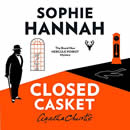
This is the second of Sophie's Poirot novels, which I could not wait to get into - especially with Rhind-Tutt as the reader again. She is very clever in humorously bringing out all of those leetel Poirot foibles and short comings by viewing them through the thoughts of the narrator ("why the blazes didn't he tell us about that before?") - as well as those more common themes in Agatha Christie's writing. I especially enjoyed the following extract:
"...you and I are not the only guests, mon ami, altogether including Lady Playford, there are 11 of us; if one counts the servants as well there are three more... the question is ought we to count the servants?"
[I believe it's a well-known Christie trope that the servants are never the murderer - unless they are nice middle/upper class folk disguised as a servant. So the butler never dunnit]. -
The King's Evil by Andrew Taylor [Read by Leighton Pugh]
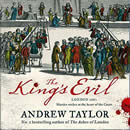 The next in the Ashes of London series for which I've been impatiently waiting to be released in audio format. The Firecourt (second in the series) was a recommendation by a Guardian reviewer, and since 3 books were available by the time I read the review, I downloaded them and listened to them in order. I find the historical descriptions very absorbing and I am very taken with the protagonists Cat Lovett and James Marwood - who are no "Dempsey and Makepeace" despite the abrasive nature of their interactions. It's all a bit Mills and Boon (no real insult in saying that as they are truly the doyennes of the romantic novel) but I do especially like the realism depicted in their relationship. Neither lovers nor even close friends in a way, the bond between them sustains, despite their being apart from one another for many fairly lengthy periods over which the stories unfold. There is, of course, clearly "something going on" between them but.... [Get a room?].
The next in the Ashes of London series for which I've been impatiently waiting to be released in audio format. The Firecourt (second in the series) was a recommendation by a Guardian reviewer, and since 3 books were available by the time I read the review, I downloaded them and listened to them in order. I find the historical descriptions very absorbing and I am very taken with the protagonists Cat Lovett and James Marwood - who are no "Dempsey and Makepeace" despite the abrasive nature of their interactions. It's all a bit Mills and Boon (no real insult in saying that as they are truly the doyennes of the romantic novel) but I do especially like the realism depicted in their relationship. Neither lovers nor even close friends in a way, the bond between them sustains, despite their being apart from one another for many fairly lengthy periods over which the stories unfold. There is, of course, clearly "something going on" between them but.... [Get a room?].
-
Grey Souls by Philippe Claudel
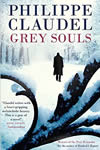
Due to the Crime Vault listing various author's Desert Island books I have ventured into some novels outside that which would normally come to my attention or attract me. This one is a recommendation by Rebecca Griffiths.
Written in 2003 (but not read by me in the original French), about a murder in 1917, the narrator is a nameless police officer in a small town in France 20 years later, telling the story in flashback and finally "solving" the mystery.
However this is much more than just a murder mystery, giving the reader a lot to ponder on, about love, war, and justice. - Journey to Munich by Jacqueline Winspear
[read by Julie Teal]
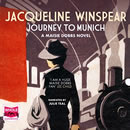 It's early 1938, and Maisie Dobbs finally returns to England from war-torn Spain. Although she does not feel up to resuming anything like her former life, she is swiftly set upon by the
British secret service, who apparently need her "undercover" to impersonate a woman to whom she bears a strong resemblance, thus undertaking the eponymous "journey to Munich". The German government will release an important British subject from prison, but only if his daughter is there to meet him. Unfortunately the daughter is gravely ill and cannot travel herself. While in Munich, Maisie takes on a potential rescue mission of a more personal nature - all set against a very sinister and threatening political background not to mention imminent state of war.
It's early 1938, and Maisie Dobbs finally returns to England from war-torn Spain. Although she does not feel up to resuming anything like her former life, she is swiftly set upon by the
British secret service, who apparently need her "undercover" to impersonate a woman to whom she bears a strong resemblance, thus undertaking the eponymous "journey to Munich". The German government will release an important British subject from prison, but only if his daughter is there to meet him. Unfortunately the daughter is gravely ill and cannot travel herself. While in Munich, Maisie takes on a potential rescue mission of a more personal nature - all set against a very sinister and threatening political background not to mention imminent state of war.
I think this is an excellent depiction of time and place. Everyone is living a relatively normal life - but it's essentially a police state with everyone under observation - how much you are affected by the restrictions very much depends on who you are.
Posted on October 31, 2019 at 4:47 PM
« Previous entry | Main | Next entry »Saturday August 31, 2019
Books in August
- Lethal White by Robert Galbraith [read by Robert Glenister]
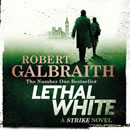
Like much of the female population I was very taken with Robin and Cormoran and their interesting (and developing) friendship. It seemed to me that the author had written a trilogy, which was nicely rounded off in the way that perhaps a real life situation would be. However, we knew the series was going to continue, and Rowling pitches it perfectly, showing those fractions in time which have no significance, and yet at the same time could not be more significant - and Matthew's tiny betrayals which are both something and nothing - until they become really something...
The plot was certainly very good - if a bit convoluted - and I found the workings of the politician's back-office life and his support staff (including the apparent nepotism) pretty engaging.
[The very excellent actor Robert Glenister is set to appear in the cast of the TV adaptation Lethal White]. - The Ashes of London by Andrew Taylor [read by Leighton Pugh ]
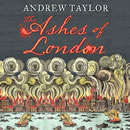
I read a Guardian review recommending The Firecourt by Andrew Taylor, and then found it was in fact the second in the series, so decided to start at the beginning. I'm always suspicious when the marketing blurbs say things like "if you like Shardlake you'ill love this" ** and so on - but I'm afraid in this instance I absolutely did fall into the right demographic. Also, I did spend a year at school studying the Stuarts, which made the historical context seem very familiar.
Here, we are introduced to James Marwood and Cat Lovett - and they to each other - against the backdrop of London in 1666, in the process of being consumed by fire. The action revolves around the destruction (and subsequent rebuilding) of St Paul's cathedral. A charred body is discovered among the ruins, but pretty obviously not a victim of the fire. Later, another body is discovered - and, among many other subplots, our protagonists struggle both to unravel the mystery, as well as to survive in this time of complex political intrigue.
[** this type of recommendation always depends on what it is that you actually liked about the said book - often they look merely at the subject matter with no regard to skill of the author] - Corduroy Mansions, The Dog Who Came In from the Cold,
and A Conspiracy of Friends by Alexander McCall SmithAs the name suggests, this is a trilogy of stories set around the inhabitants of a block of flats, which, in this case, are in Pimlico rather than Edinburgh. As usual it's full of truly likeable characters expressing view on all kinds of philosophical subjects - not to mention featuring a very likeable - as well as philosophical - dog. If you are not a keen follower of Alexander McCall Smith, then, of course, it's just another set of gently (and genteel) humorous stories - but, if nothing else, his undiminished popularity demonstrates they are above the ordinary.
Most enjoyable.
Posted on August 31, 2019 at 4:21 PM
« Previous entry | Main | Next entry »Wednesday July 31, 2019
Books in July
- The Mystery of the Yellow Room by Gaston Leroux
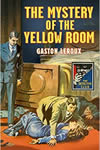
First written (in French) in 1907, this has been reissued, and is lauded as "genre defining" as one of the first locked room mysteries. It was highly influential on the members of the Detection Club, and John Dickson Carr and Agatha Christie both refer to the book in their own novels, through the mouthpiece of their characters:
'And here is The Mystery of the Yellow Room. That - ah, that is really a classic! I approve of it from start to finish.' ..... 'All through there is truth, concealed with a careful and cunning use of words.' ..... 'Definitely a masterpiece, and, I gather, almost forgotten nowadays.' [Hercule Poirot, The Clocks, 1963].
All I can can say is that I cannot agree with the blurb "as readable now as when it first appeared" as I found it a great struggle to read - although I suppose that quote may be true in either a positive or a negative sense...
Gaston Leroux, is probably better remembered today as the author of The Phantom of the Opera, probably due to the film adaptations and the Andrew Lloyd Webber musical. -
Our House by Louise Candlish [Read by Deni Francis and Paul Panting]
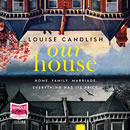 This is a really terrific book, well worthy of the Crime and Thriller award for 2019. I think it's not unfair to say that the premise of the story - well, it's opening, and the title - seems preposterous - except the author completely draws you in and it all becomes totally believable - and speaking as one who is very attached to her home - truly dreadful.
This is a really terrific book, well worthy of the Crime and Thriller award for 2019. I think it's not unfair to say that the premise of the story - well, it's opening, and the title - seems preposterous - except the author completely draws you in and it all becomes totally believable - and speaking as one who is very attached to her home - truly dreadful.
There are many crimes involved here - some criminal, some highly criminal, and some (many) personal betrayals. And then there is the final twist at the end where the characters believe they are at last "doing the right thing", which leaves the reader to imagine the inevitable yet more devastating consequences. -
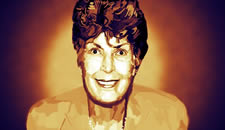 Weeds
Weeds
This is a Ruth Rendell short story, read by David Holt, and produced by Rosemary Watts.
It's only 15minutes long but the real skill of short story writing is all displayed here.
Rodney Hithe's having a "charity weed hunt" in his immaculate garden - but the discovery of an adventitious poppy sparks horrifying consequences. We are outdoors on a beautiful sunny day bu there is some kind of foreshadowing of sinister events to come. And when they do, we are left to resolve and understand the clues (which we do completely).
Posted on July 31, 2019 at 11:29 AM
« Previous entry | Main | Next entry »Sunday June 30, 2019
Books in June
- Killing the Beasts by Chris Simms
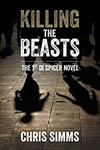
As Chris is best known for his DI Spicer series, I decided to start at number one, (published in 2005), and read it as written on the page.
Maybe Chris (like many other authors) was not trying for a series right off the bat here - Spicer really has equal billing with the other characters he introduces. However, I can see why these were an immediate success.This month I joined Chris's Readers Club and downloaded (and read) my free prequel to the Spicer series: Roller Coaster; I also read Baba's Bites which is a mystery short story but very much bordering on the horror category - well written and well told, but left me feeling distinctly down.
-
Fatal Voyage by Kathy Reichs [Read by Kate Harper]
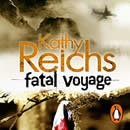 This fourth book sees Tempe Brennan called in as part North Carolina's disaster response team responding to a plane crash in the mountains. The team must collect evidence over a wide area, and painstakingly identify the victims - who seem to be largely from a college sports team, and this leaves Tempe worried sick about her own daughter. However, pushing her worries aside and focusing on her work, Tempe finds a body part (foot) which she suspects was not actually from the crash, and without support from her colleagues and superiors, she feels compelled to find out the truth on her own.
This fourth book sees Tempe Brennan called in as part North Carolina's disaster response team responding to a plane crash in the mountains. The team must collect evidence over a wide area, and painstakingly identify the victims - who seem to be largely from a college sports team, and this leaves Tempe worried sick about her own daughter. However, pushing her worries aside and focusing on her work, Tempe finds a body part (foot) which she suspects was not actually from the crash, and without support from her colleagues and superiors, she feels compelled to find out the truth on her own.
-
 Castles in Spain
Castles in Spain
A bookseller is surprised to be asked to try and solve a military mystery...
'When I walked into this house I was simple Grahame Mayer, the bookseller. Now it seems I'm Philip Marlowe, private eye.'
Edward Boyd's five-part thriller serial first broadcast in 1987, based on his 1986 play, and produced by Patrick Rayner.
Grahame Mayer, the bookseller, is played by Ray Brooks - famous for many things possibly most memorably from his (and my) youth in the 60s film The Knack. Other players include John Westbrook, Alexandra Mathie, Garard Green, William Hope, John Hannah, and Jonathan Tafler.
Posted on June 30, 2019 at 7:23 PM
« Previous entry | Main | Next entry »Friday May 31, 2019
Books in May
-
After the Party by Cressida Connolly
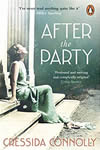
I was fascinated by this book. It provided a particularly interesting read for me, covering many aspects of social history which have long appealed.
Firstly, it was an excellent story about a "real" (not real) person, Phyllis. Told from her point of view I completely empathised with her and, although I think it's meant to be more ambiguous, I was totally convinced that she was simply naive. Somehow the writing drove the story beyond the usual themes of her "not realising" what was happening in 1930s England; as part of a lower middle class social stratum - which she was thrust into having returned from a life abroad - she really did not realise what was happening. Only vaguely interested in politics, (if at all), she just went with the social norms within her "set", where she and her husband were keen to fit in.
Secondly it is set in and around Sussex, with a lot of historical detail about fascism and fascist groups there, including the British Union seaside camps (no mention of "National" or "Fascists" any more), and the defacing of the Jewish-owned theatre at Worthing with anti semitic graffiti ("just high spirits"). I felt I should know about all this - yet I did not.
Thirdly, the imprisonment of fascists at the outbreak of war, and subsequent internment on the Isle of Mann - along with other categories segregated internees - was really an unknown (or at least unexplored) piece of history for me. The effect on the local inhabitants for the duration was really pretty terrible.
Finally, I liked the way the story was told, supposedly written by a third party based on interviews with Phyllis, as an old woman in the 1970s. It interleaves two timelines: 1938, told as a story in the third person; and the 1979, interviews written in the first person. In 1938, you can be sympathetic to Phyllis, and see the gradual slide into an extremist organisation without questioning its values; in fact, although the "Party" of the title is meant to indicate a watershed moment which "changed her life forever", I did not really find that to be the case - it was just one more step on the slippery slope. However, it is clear from the 1970s, Phyllis that she is, or turned out to be, an altogether more unpleasant person.
I would recommend two other reviews: Café Society, and A Manor of Reading. -
Tangerine by Christine Mangan
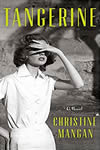
It's 1956, Alice lives in Tangier with her husband John. Lucy, a once inseparable friend, but now estranged, arrives without warning, expecting to carry on the friendship where it left off over a year ago. This all seems to work out fairly well, but after an initial new sense of freedom, Alice begins to experience the familiar feeling of being controlled and stifled by Lucy - and then John goes missing....
This is a rather creepy psychological thriller to quote Joyce Carol Oates: "As if Donna Tartt, Gillian Flynn, and Patricia Highsmith had collaborated in a screenplay to be filmed by Hitchcock". I can see a strong connection with Patricia Highsmith, of whom I have to confess I am not overly fond, although that did not appear to affect my enjoyment of this book. The setting in the 1950s enhances that Highsmith feeling, and the progress of the story is not unlike that of Mr Ripley if that's not too much of a spoiler. However, I am astonished that it's a debut novel as it's highly polished and convincingly evocative of time and place. - Eleanor Oliphant is Completely Fine by Gail Honeyman
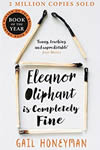
My sister lent me this book which I had heard of as an award winning debut novel. It's the type of novel that appeals to me (like a Christmas Carol et al) as in a way it is a tale of redemption - where the protagonist is redeemed rather than redeeming herself... I'm aware that this is a bit arrogant in that Eleanor definitely does not think she needs saving from anything, (she is fine), so I am seeing her from my point of view and from what I feel is normality. However, I think we believe she herself feels a kind of happiness at the end of the book that she was not experiencing previously.
Eleanor is shifted out of her settled existence by a small act of kindness that she shows to another, and from there on we find small acts of kindness abound, and Eleanor finds she has friends that she never knew she needed. The book exudes a "gentle warmth", as the Guardian reviewer puts it, as well as being really humorous and a joy to read. [And yes it did remind me of Judith Hearne but for those for whom that might be worrying, it has a somewhat more uplifting ending]. - A Price to Pay by Chris Simms [read by Becky Hindley]
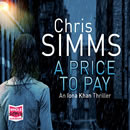
The first book about DC Iona Khan - which I have not yet read (listened to) was part of the Guardian round-up of crime fiction in 2012. This is the second book, but works well as a stand alone story.
It starts with the strange death of a teenage runaway, who apparently killed herself leaping from a motorway bridge into the speeding traffic below. The girl's identity is unknown, but Iona links her profile to three others of recently missing girls. In addition, the CCTV footage - such as it is - provides some interesting clues about a possible second person with her on the bridge as she jumped. Even more creepy is that Iona herself has a close resemblance to the dead girl, and soon becomes a target for the sinister gang involved in the disappearances. Hold tight for a thoroughly thrilling read... -
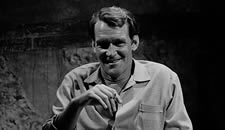 Stand By For West: Battle for Inspector West
Stand By For West: Battle for Inspector West
I was fascinated to see this available on iPlayer, with it's star Patrick Allen who was a very prolific actor in my youth - the last thing I noticed him playing was Colonel Sebastian Moran in the Jeremy Brett Sherlock Holmes series from 1986, though it seems he was pretty active long after that, (often as an "announcer" as he has a stereotypical "true Brit" (or more precisely English..) voice. Anyway it seems there were quite a few of these multi-episode radio series of which this was the first.
John Creasey created Chief Inspector Roger West, and he featured in more than forty novels between 1942 and 1973 - the basis for this series Battle for Inspector West was published in 1948. Apparently six of the novels were adapted for radio by Maurice Travers.
First aired in 1967, stars Patrick Allen, Sarah Lawson, Humphrey Morton, Philip Bond, Denise Buckley, Hamilton Dyce, John Cazabon, Eva Stuart, Francis de Wolff, Trevor Bannister, and Preston Lockwood; produced by John Fawcett Wilson. -
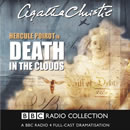 Death in the Clouds
Death in the Clouds
First published in 1935 - I remember a very old copy in a red cloth binding that I read as a teenager, (well-read and dust jacket missing). However, this is one of the BBC radio plays from 2003 with John Moffat as Poirot - never liked his interpretation (or more precisely accent) but he seems to have done them all - and Philip Jackson - who by contrast seems to be the perfect Japp.
On a flight from Le Bourget to Croydon, (I'm loving it already), a woman is found dead. It's intended to look like a wasp-sting was responsible, but Poirot (co-incidentally on board) is not taken in.
Dramatised in 2003 by Michael Bakewell, and directed by Enyd Williams, also starring, Geoffrey Whitehead, Murray Melvin, Teresa Gallagher, Carolyn Jones, Ben Crowe, Andrew Harrison, Bruce Purchase, Liza Sadovy, Priyanga Elan, and Steven Critchlow.
Posted on May 31, 2019 at 4:36 PM
« Previous entry | Main | Next entry »Tuesday April 30, 2019
Books in April
- Loose Tongues by Chris Simms [read by Joe Jameson]
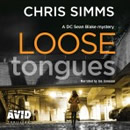
Having picked up on Chris' writing, I went to the library to look for all his books available as downloads. This the first of two books about newly qualified DC Sean Blake. His Mother is retired from the police and is very anxious about him - and he feels about her as we all probably do about our Mothers - we love 'em but they don't 'arf go on....
Anyway it's a really good mystery with another thrilling ending - and a bit sad. I really like Sean and I'm looking forward to reading Marked Men. - Sing Me to Sleep by Chris Simms [read by Becky Hindley]
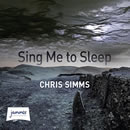
Owing to my ferreting about in the virtual library, this month is a bit of a Simms-fest. This is a "stand-alone" mystery which could not be more different from his police procedurals - it's more of a ghost if not horror story which keeps you guessing. Having read a couple of Chris' short stories, he seems rather good at writing this type of tale, and this one was excellent; he easily sustained the plot to the length of a full novel (often they don't, hence the number of "collections" of short stories on these topics). However, looking at my tastes in books and dramas overall, I'm not sure I'm so keen on stories of the supernatural - I suppose it's that they very often have a sting in the tail, and I have a preference for justice done, people laid to rest, and happy endings. It's all made up after all. [...or is it?]. - The Graveyard of the Hesperides, The Third Nero (or Never Say Nero Again),
and Pandora's Boy by Lindsey DavisJust catching up on the Flavia Alba novels.
Skeletons are found in the grounds (and probably the cupboards) of the the run-down eponymous bar that Manlius is renovating - that's the mystery for Flavia Alba to solve. Any spare time is taken up with planning for her imminent wedding celebration - and provides a neat opportunity for Lindsey to roundly satirise the entire process, as she always does, in very modern terms. Thus the plot involves sex workers, bones, wedding planners and lentils. The culmination is spectacular to say the least.
The second book is set in AD 89 and the Nero in the title refers to the period between the autumn of 69 AD and the reign of the emperor Domitian, when various Nero impostors appeared on the scene, (one has to ask "why?" although it seems Nero still had a number of supporters willing to believe or invent anything ... fake news anyone?). Scholars suggest the number of Nero impostors was two or three, although St. Augustine (we like him...) wrote of the popularity of the belief that Nero would return in his day, known as the Nero Redivivus legend. Flavia Alba works to solve the mystery at the heart of the story while her new husband is still recovering from the effects of their wedding celebrations (or "event") in the previous book.
For the third book we are still in Rome AD 89. Pandora supplies herbal remedies, and there is a suggestion that one of them may have been responsible for the death of a young girl from a wealthy family - alternatively she died from a broken heart. Either way, love potions and the occult were involved. Bizarrely, Flavia Alba is asked to look into it by Manlius' ex-wife. This book seems to have been more favourably received by readers than the previous two.
Posted on April 30, 2019 at 12:49 PM
« Previous entry | Main | Next entry »Sunday March 31, 2019
Books in March
-
Hall of Mirrors by Christopher Fowler [Read by Tim Goodman]
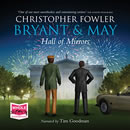 I'm guessing to counteract the effect of the inevitable implausible aging of his protagonists, the author has moved the action to an earlier time in B&M's careers - 1969 - and the setting is a country house - a locked room mystery. As a consequence, CF was not able to rely so much on the eccentric characters of our heroes (formed over years to make not only a peculiar crimes unit but two very interesting peculiar old chaps) - and I missed the very real strange underworld of the London that they (and probably the author) inhabit. There seemed also to be a very strong element of almost slapstick humour, which, outside of this book, I can admire but rarely makes me laugh - although when done well I have to admit to rolling in the aisles with everyone else (for example, the "Goes Wrong" shows, but rather less Norman Wisdom).
I'm guessing to counteract the effect of the inevitable implausible aging of his protagonists, the author has moved the action to an earlier time in B&M's careers - 1969 - and the setting is a country house - a locked room mystery. As a consequence, CF was not able to rely so much on the eccentric characters of our heroes (formed over years to make not only a peculiar crimes unit but two very interesting peculiar old chaps) - and I missed the very real strange underworld of the London that they (and probably the author) inhabit. There seemed also to be a very strong element of almost slapstick humour, which, outside of this book, I can admire but rarely makes me laugh - although when done well I have to admit to rolling in the aisles with everyone else (for example, the "Goes Wrong" shows, but rather less Norman Wisdom).
So... our friends - who I should mention would still not actually be very young men in 1969 - are sent to a posh but country house ("Hall") owned by a dope-smoking Lord (a familiar cameo of the era); they are acting as body guards to one of the house guests. There is plenty of opportunity (taken) for observing the end of Swinging 60s and the social changes in play at that time. The country house is in disrepair, and the British class system is being questioned, which is illustrated in the differences between Bryant and May themselves.
I enjoyed it all as much as ever but trying to visualise B&M in their primes is challenging for author and reader.
[Interestingly, Maggie Armitage (the witch) makes a lot more sense as her younger self - a young bohemian new-age character I can strongly identify with... the dawning of the Age of Aquarius..] -
The Good Girl by Mary Kubica
[Read by Lindy Nettleton, Johnny Heller, Tom Taylorson, and Andi Arndt]
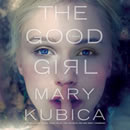 Alison - who reads a great deal, very widely, and very quickly - recommended this book to me. I was not familiar with this author, but I thought the book was excellent. It's a kind of psychological thriller, and I think I had worked out the unexpected twist in the book fairly early on, although when this happens I find it's often what the author intended.
Alison - who reads a great deal, very widely, and very quickly - recommended this book to me. I was not familiar with this author, but I thought the book was excellent. It's a kind of psychological thriller, and I think I had worked out the unexpected twist in the book fairly early on, although when this happens I find it's often what the author intended.
It is written in two timelines - "then" and "now", as well as in several voices. As usual, I was listening to the book and with different actors voicing the parts, it worked very well. It's a sad tale, but right from the start, they were tragic characters so no ending could have been a conventionally happy one. -
I'll Keep You Safe by Peter May
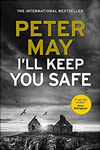 "Niamh and Ruairidh Macfarlane co-own the Hebridean company Ranish Tweed".
I'm hooked already.... A book about tweed....
"Niamh and Ruairidh Macfarlane co-own the Hebridean company Ranish Tweed".
I'm hooked already.... A book about tweed....
Ruairidh promises his wife he will always look after her, but as in the age old tradition tragedy strikes. On a business trip to Paris to promote their luxury brand, Ruairidh is killed by a car bomb. To make matters worse, it seems he was in the car with a lover, and the French police have Niamh down as their prime suspect. Finally, she returns home to Lewis, bereft, and struggling to cope with managing their business (while the French police officer doggedly continues her enquiries in Scotland).
And that's where the old tradition ends. It's all very sinister and tense throughout, with many interesting twists before the thrilling denouement.
[I was a bit surprised as I thought this novel was written earlier in May's career and recently reissued, but it seems to have been first published in 2018.]
Posted on March 31, 2019 at 4:56 PM
« Previous entry | Main | Next entry »Thursday February 28, 2019
Books in February
-
Tombland by C J Sansom
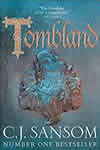
The novel is set in the summer of 1549 during the reign of Edward VI. Shardlake now works for Princess Elizabeth although he does not enjoy her unconditional favour. More in a role with a mission of plausible deniability, he is sent off to investigate a potential scandal involving a distant relative of the the Princess. However, the book is really all about Kett's rebellion. In fact the novel is almost a day by day account of the hot summer when the rebels were camped outside Norwich laying siege to the city. It could be said that the narrative is overlong, but it inspired me to take a long weekend there to explore all the places mentioned in the book. Now, I (and G) have been to Norwich on business many times, but this visit really amazed me. Previously, I must have been going around with my eyes shut; neither G nor I had ever visited the historic parts of the city. I did not even know that Tombland was an area in the city (even though a colleague took me round the cathedral years ago when I attended his retirement lunch - which may even have been in the Maid's Head).
Anyway - it's all there to view - with many references to Kett and events pertaining to the rebellion, even though in my ignorance I had never heard of Kett before seeing this book. The overall experience of the book and the stay in Norwich was really wonderful. -
Depraved Heart by Patricia Cornwell [Read by Susan Ericksen]
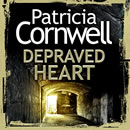
The 23rd Scarpetta novel (apparently) sees her isolated and alone, unable to confide in anyone, and fighting to save her niece from prosecution by the FBI. Events have left her confused, worried, and not knowing where to turn....
Need I go on?
I can't begin to sketch the plot and I am drawn to use the words of a review given for Kathy Reichs on GoodReads by Skip: "Gone are the days when Scarpetta actually conducted autopsies, and helped solve crimes. Now she spends most of her time paranoid, obsessed, and convinced that everything in her life is being manipulated to harm her or her loved ones."
It seems to me that the Scarpetta should actually talk through her angst with her niece, and not burden the reader with it... -
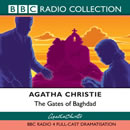 The Gates of Baghdad
The Gates of Baghdad
A disparate group of adventurers set out from Damascus to visit the legendary Gate of Baghdad, also known as the Gate of Death, (which not surprisingly seems to haunt the characters, who range from the innocent to the darkly experienced). Mr Parker Pyne is among their number, touring the Middle East, and finds himself involved in unravelling the inevitable murder mystery that follows.
Dramatised in 2002 by Mike Stott, and directed by Dirk Maggs, starring, among others, Patricia Routledge and Richard Griffiths. -
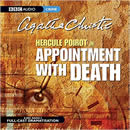 Appointment with Death
Appointment with Death
A wonderful Christie classic plot where a murder is committed in plain sight but no real obvious murderer is forthcoming, despite many witnesses to... many things... rather, there are many plausible suspects since Mrs Boynton was a detestable woman, seemingly invincible, and delighting in exerting her power over all around her.
I think the murder was perhaps slightly more plausible in its complexity - ie one that could be envisaged actually being carried through - in comparison with say Death on the Nile, where the sheer logistics boggle belief. [Either way, not an issue so much on the radio.]
Dramatised in 2001 by Michael Bakewell, and directed by Enyd Williams, starring, among others, John Moffatt and Miriam Karlin.
Posted on February 28, 2019 at 3:09 PM
« Previous entry | Main | Next entry »Thursday January 31, 2019
Books in January
-
Watchman by Ian Rankin [Read by Tom Cotcher]
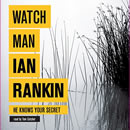 Miles is a spy who wants nothing more than a quiet life looking into other people's lives. He does not work in the field and doesn't want to. However, to redeem himself after a couple of spectacular failures, he is sent on a "simple mission" to Ireland; however, he finds himself set up as a bit of a patsy, which causes him to go on the run.
Miles is a spy who wants nothing more than a quiet life looking into other people's lives. He does not work in the field and doesn't want to. However, to redeem himself after a couple of spectacular failures, he is sent on a "simple mission" to Ireland; however, he finds himself set up as a bit of a patsy, which causes him to go on the run.
This is one of Rankin's earliest works from 1988 which was re-released in 2004 with an introduction by Rankin discussing his early writing style. I think this stands up well and indeed it seems the only objection of more critical readers is the lack of Rebus. -
The Killing Habit by Mark Billingham
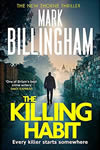 In line with Connelly and Rankin, Billingham (may I call you Mark?) has introduced us to a new character in the shape of Nicola Tanner. In the case of all authors, whose original detectives are true rule-breaking "characters", the brief for these newbies are that they be as different as possible from their previous creations* - and probably younger since these fictional detectives age with their authors (except notably VI and Kinsey Millhone). Naturally this results in some resistance from their diehard fans. So - in line with .... etc - in this book the laddish Thorne and the anal Tanner work together, which has the effect of complementing each other so that they appear to live in a more complete personality landscape.
In line with Connelly and Rankin, Billingham (may I call you Mark?) has introduced us to a new character in the shape of Nicola Tanner. In the case of all authors, whose original detectives are true rule-breaking "characters", the brief for these newbies are that they be as different as possible from their previous creations* - and probably younger since these fictional detectives age with their authors (except notably VI and Kinsey Millhone). Naturally this results in some resistance from their diehard fans. So - in line with .... etc - in this book the laddish Thorne and the anal Tanner work together, which has the effect of complementing each other so that they appear to live in a more complete personality landscape.
O - I almost forgot - the plot's good too. Starting with a (topical) spate of cat killings in London, which Thorne is disgusted at being roped in to investigate.
[* Connelly is probably an exception here - he has created many memorable characters over the years and they have usually crossed paths with one another in various books - although when Bosch works with Haller, we get to see how fundamentally different they are.]. -
Deadly Decisions by Kathy Reichs [Read by Lorelei King]
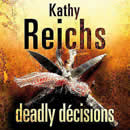 This is the third Temperance Brennan book which was first published in 2000. The "theme" is outlaw bikers and gangs - and after bystanders are caught in crossfire Tempe joins a Special Operations Unit. As usual, there's a lot of forensic detail as well as the "skeleton found in the woods" which inevitably turns out to be related, and an annoying relative who gets sucked in.
This is the third Temperance Brennan book which was first published in 2000. The "theme" is outlaw bikers and gangs - and after bystanders are caught in crossfire Tempe joins a Special Operations Unit. As usual, there's a lot of forensic detail as well as the "skeleton found in the woods" which inevitably turns out to be related, and an annoying relative who gets sucked in.
There is a fair degree of critical comment from readers, though on the whole I don't think they would have caused Reichs much angst - but it did make me laugh that some of it was complaining about how different this was from the TV series Bones, (which first aired in 2005 and I note is described as a comedy-drama), as if these were books based on the series. -
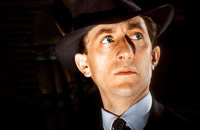 When In Rome
When In Rome
Set in the 1970s, Ngaio Marsh's gentleman detective, Roderick Alleyn travels incognito among a group of tourists visiting Rome. He is on the trail of a drugs syndicate, but soon he is involved in blackmail and murder.
Dramatised in 2003 by Michael Bakewell, and directed by Enyd Williams.
I've been a fan of Jeremy Clyde since I first saw him in the 1980s in a stage production of Design for Living (with Maureen Lipman and Simon Jones), and I always look out for him in his too-many-to-mention character TV appearances. -
 The Game's Afoot
The Game's Afoot
First broadcast in 2008, this was an absolute delight for me. Sherlock Holmes enthusiast, Nick Utechin chooses portrayals of Holmes on radio (if not a contradiction in terms) across the decades. This is 3 hours long, including some rarer recordings of Holmes and Watson in action:- The Adventure of the Speckled Band (17/05/1945)
Stars Cedric Hardwicke and Finlay Curry - The Red-Headed League (19/10/1954)
Stars Ralph Richardson and John Gielgud - The Boscombe Valley Mystery (12/12/1966)
Carleton Hobbs and Norman Shelley - The Return of Sherlock Holmes: The Solitary Cyclist (17/03/1993)
Stars Clive Merrison and Michael Williams - The Further Adventures of Sherlock Holmes: The Abergavenny Murder (18/05/2004)
Stars Clive Merrison and Andrew Sachs as Watson (both perfect)
[These were new series adventures written by Bert Coules as a (very good) pastiche of Doyle's work; 16 episodes aired between 2002 and 2010. Each of the stories is based on a throwaway reference from an actual Doyle short story or novel. This programme includes an interview with Bert Coules]
- The Adventure of the Speckled Band (17/05/1945)
Posted on January 31, 2019 at 12:22 AM
« Previous entry | Main | Next entry »Monday December 31, 2018
Books in December
-
The Cuckoo's Calling: The Silkworm, and Career of Evil
by Robert Galbraith
[read by Robert Glenister]I think Alison must have pointed me at these books - J K Rowling writing detective stories under a pseudonym. The critics at the time (who did not know) rated The Cuckoo's Calling as a good debut novel - but the cat was soon out of the bag. I like Rowling's novels for adults, (even if The Casual Vacancy was so very sad). And I rate these as good detective novels, although perhaps the mystery plots are pretty complex - not to mention improbable - but I have covered that before... who needs strict realism in this kind of story? The strong attraction in these books is: Strike himself (if you are a woman) and the relationship between him and Robin (actually, again, probably if you are a woman). Anyway, I am keen to read more.
- Dark Sacred Night by Michael Connelly
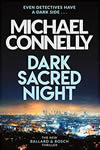
Renée Ballard and Harry Bosch join forces to solve the murder of a 15 year old girl. The partnership is reluctant at first (of course) but both parties are stalwart incorruptible upholders of the law so...
I've been keen to read Dark Sacred Night ever since we went to see Michael Connelly interviewed by Mark Billingham at Waterstones in October. I like to listen to the audio versions but am usually too impatient to want to wait so I'm reading the "real" book, and I don't need to tell you how great I think Connelly is - again.
We all like Harry, so it's a comfort when he appears (however peripherally) in the books even when he's not the hero. However, Connelly has created other really strong characters - as in the most obvious "Lincoln Lawyer", but also in the maybe less obvious Jack McEvoy. The Scarecrow is one of the most thrilling books I have read, so I'm glad to hear there is another novel featuring Jack in the pipeline. -
In a House of Lies by Ian Rankin [Read by James Macpherson]
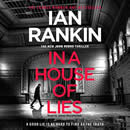
The gang's all together again, even though Rebus is well into his 60s and has emphysema. It's nice for those of us in our sixties to feel there's a useful role for us in the workplace - even when we have retired...
A decade old handcuffed skeleton of a man is discovered locked in the boot of a car, and it's not long before Ger Cafferty is in on the act too. There's a strong implication of police corruption - all apparently inspired by a real case in the Met in the 1980s.
Since it's about an internal investigation of police corruption. Malcom Fox is both formally working on the case, as well as informally, joining the team to discuss the case in their favourite watering hole. [It seems Malcolm has not been able to achieve the same iconic status as Rebus, despite the books in which he features being excellent. So, similar to Connelly, I think, Rankin's having to weave his characters together. Maybe presenting Malcolm alongside the more renegade Rebus gives greater scope for the writing. I know an author can only survive on books that actually sell well, but I hope Rankin continues to persevere with Malcolm Fox.] -
Pride and Prejudice by Jane Austen [Read by Josephine Bailey]
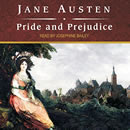
I felt I needed some comfort listening, so I went back to an old favourite. Having watched many dramatic adaptations of this novel over the years (including a school play in my youth), I wondered how much the novel might differ - and yet I found, rather like Brideshead Revisited, that most really had stuck remarkably close to the dialogue and plot in the text (as much as the length of the production would allow).
-
Falco: The Complete BBC Radio Collection by Lindsey Davis
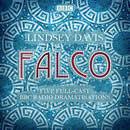
I revisited these novels in the form of the BBC radio plays. These were dramatisations of the first five Falco novels by Lindsey Davis, starring Anton Lesser - and a host of others.- The Silver Pigs
- Shadows in Bronze
- Venus in Copper
- The Iron Hand of Mars
- Poseidon's Gold
-
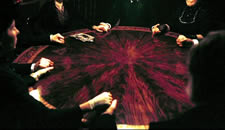 The Sittaford Mystery
The Sittaford Mystery
Set in 1931, in a snowed-in remote house in Devon. Six people decide to pass the time by having a seance for a bit of fun. But it's anything but fun when the Ouija board prediction of a death becomes reality.... Stars Geoffrey Whitehead as Inspector Narracott.
The basic plot twist in this novel is reused, or expended upon, or developed in slightly different ways, in several of Agatha Christie's works, including the famous Mousetrap. I'm not giving anything away here, as the whodunnit element remains a surprise - but isolation (locked room) and snow (it was a dark and stormy night) are persistent features. -
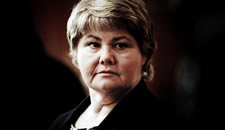 DI Gwen Danbury
DI Gwen Danbury
The discovery of a skeleton buried in a wood in Suffolk back in 1965 sparks a murder investigation.
These series are police procedurals written by Sue Rodwell - maybe not a thrill a minute but anything with Annette Badland is going to be good. As well as the crimes, we get a lot of Gwen's home life including her fairly annoying if not impossible Mother (played by Gudrun Ure). -
 Fatherland
Fatherland
I've always known that Fatherland was a best seller, and that there is a much-praised TV film starring Rutger Hauer - and I knew the basis of the plot: "suppose the Germans had won WW2 in Europe". So I saw it as a political thriller and it didn't much appeal to me. However, listening to this play makes me realise what a gripping thriller it is - and it all starts with a murder, so all Good.... Stars Anton Lesser and Angeline Ball.
Posted on December 31, 2018 at 3:40 PM
« Previous entry | Main | Next entry »Friday November 30, 2018
Books in November
-
Shetland: A Dark Redemption, Eleven Days, and, The Intrusions
by Stav Sherez
I first saw Stav at an event at Woking Library "in conversation" with Mark Billingham. He was promoting his first Carrigan and Miller book. Now that he is up to his third, The Intrusions, which has won the 2018 Theakston Old Peculiar Award for crime fiction, not to mention being a Guardian and Sunday Times "Book of the Year" for 2017, so I thought it was about time I actually read all three books. They did not disappoint.
-
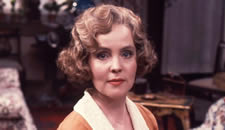 Secret Lives
Secret Lives
An E F Benson novel from 1932 dramatised in 3 parts starring Pauline Collins.
I love the Mapp and Lucia novels, which were published around the same time as this. It has the same gentle humour and satire - but centred around "Durham Square" - a desirable residential area. Two strong women (a stuffy inhabitant of long-standing and an uncouth newcomer) are at odds with each other... -
 Having a Wonderful Time
Having a Wonderful Time
An extended Las Palmas holiday, at someone else's expense, seems ideal. But is there a hidden agenda?
Written in the form of postcards, the story chronicles a young couple who vacation on the Canary Islands, but their flight home is repeatedly cancelled until it becomes apparent that they - along with thousands of other families on holiday - will never return home, and have been forever exiled.
A short story by J G Ballard, read by Patricia Brake. -
 Trespass
Trespass
Set in the Cevennes, an untamed area of southern France where traditions and secrets run deep, it is the story of two very different sets of siblings. Veronica and Anthony are privileged, cultured and English. Aramon and Audrun are French, rooted in the old stone mas and the land around it that their family have cultivated for generations, and in their shared and violent past. When these two very different worlds collide, a chain of events is set in unstoppable motion. Radio 4's Book at Bedtime by Rose Tremain, abridged by Sally Marmion, and read by Sara Kestelman. -
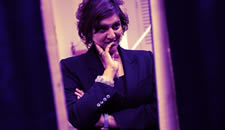 A Small Town Murder
A Small Town Murder
Jackie Hartwell (played by Meera Syal) is a Family Liaison Officer in Stratford-upon-Avon who solves cases by winning the trust of those caught up in the nightmare of serious crime and murder. Working in liaison enables Hartwell to get closer to the people involved in the crime - allowing her to investigate in a way they can't, as she combines empathy and intuition with the keen observation of a clever detective. In this 12th series she is assigned as family liaison officer to a woman viciously assaulted in her own home. It soon becomes clear the suspect is likely to strike again. -
 Whip Hand
Whip Hand
This is the second Dick Francis novel about Sid Halley first published in 1979, and dramatised here in 5 episodes starring Mick Ford.
I am very keen on Dick Francis novels - ever since my first exposure to one read on Radio 4 in 1978 (I believe it was Forfeit or Flying Finish - abridged I assume), and I never looked back. Sid Halley was a very popular hero, and ultimately there were four novels which feature him - fairly spaced out in date - and a fifth follow-up book by Felix Francis, (Refusal).
Posted on November 30, 2018 at 11:44 AM
« Previous entry | Main | Next entry »Wednesday October 31, 2018
Books in October
-
Shetland: Thin Air, Cold Earth, and, Wild Fire
by Ann Cleeves
Having consumed the first 5 books all in one month, I felt it was time to complete the set with the final 3. I really enjoyed them and was highly satisfied with the way Ann chose to end the series. I think the plot of Wild Fire was slightly disappointing, but the thing we were most anxious about was what would happen with Perez and his personal life rather than the detection (I mean I was).
It seems they have decided to carry on with another TV series of Shetland (commissioning 2 more series), a decision which had the Cleeves clan (and me) cheering. *
* For obvious reasons the filming has been long delayed and is due to start March 2021.
- Dandy Gilver and a Spot of Toil and Trouble by Catriona McPherson
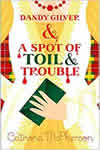
It's midsummer 1934 and Dandy is invited to some friends' family seat (castle) where they are planning a performance of Macbeth, suited to the somewhat gothic Scottish environment. They plan to fill the place with rich American tourists in order to revive their failing fortunes. Of course there is a mystery (a pretty good one) involving long lost jewels and a family curse.
I love these books.
The book blurbs say: for fans of PG Wodehouse, Dorothy L Sayers and Agatha Christie. So I guess that pretty well covers me.
Posted on October 31, 2018 at 12:43 AM
« Previous entry | Main | Next entry »Sunday September 30, 2018
Books in September
-
Northanger Abbey by Val McDermid [Read by Jane Collingwood]
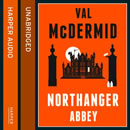 The first thing to say about this book is that it is a modern re-imagining of the Jane Austen classic novel. I feel I have to mention this as Amazon have royally messed up their page links on this book which has led to people downloading it expecting the original - their comments remind me of an extract from Waugh's novel Scoop (see below*).
The first thing to say about this book is that it is a modern re-imagining of the Jane Austen classic novel. I feel I have to mention this as Amazon have royally messed up their page links on this book which has led to people downloading it expecting the original - their comments remind me of an extract from Waugh's novel Scoop (see below*).
Anyway if you had the right expectation you will enjoy this book well enough. It is the second book in The Austen Project where six contemporary authors would reinterpret her books in a modern context; (it seems to have got no further than 4 - there were no takers to write Persuasion and Mansfield Park - and the existing 4 have been fairly roundly criticized). For me, strangely, they adapt moderately well to this treatment, with email and texts keeping up the stream of communication evident in Austen's novels. The social whirl that is Bath is replaced by the environment of the Edinburgh Book Festival and the rich hosts for seventeen-year-old Cat Morland are obsessed by shopping, and the Fringe. The 17th century balls are replaced by a highland dance and the duplicity of Cat's BFF and her brother are all as they ever have been in history (as far back as the Stone Age I suspect). It all works very well - but then keeping in line with the misunderstandings and social expectations in manners and romance make it a bit more difficult to provide a modern parallel. Anyway the result is good and I would recommend it whether you like Austen or not.
If you are interested in this Project idea then you might look at A Cure for All Diseases, where Reginald Hill adapted Austen's unfinished novel Sanditon in this way.
* Gratuitous extract from Scoop:
[As as author of Lush Places for the Beast newspaper], William had composed a lyrical but wholly accurate account of the habits of the badger; one of his more finished essays. Priscilla in a playful mood had found the manuscript, and altered it, substituting for 'badger' throughout 'the great crested grebe'. ...
...His mail had been prodigious; some correspondents were sceptical, others derisive; one lady wrote to ask whether she read him aright in thinking he condoned the practice of baiting these rare and beautiful birds with terriers and deliberately destroying their earthly homes; how could this be tolerated in the so-called twentieth century? A Major in Wales challenged him categorically to produce a single authenticated case of a great crested grebe attacking young rabbits... -
Girl on Fire by Tony Parsons [Read by Colin Mace]
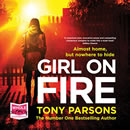 The criminal part of the plot here begins with a graphically described terrorist attack on shopping centre. This is harrowing enough, but DC Max Wolfe is also suffering as his wife has decided to take their daughter back into a "more suitable family environment". In true form, Max puts the poor kid's welfare first, hiding his personal turmoil, and luckily she seems to survive what the adults put her through.
The criminal part of the plot here begins with a graphically described terrorist attack on shopping centre. This is harrowing enough, but DC Max Wolfe is also suffering as his wife has decided to take their daughter back into a "more suitable family environment". In true form, Max puts the poor kid's welfare first, hiding his personal turmoil, and luckily she seems to survive what the adults put her through.
Finally - get out your hankies, that's all I can say. As I observed after the last book: DC Wolfe was always destined to to be a tragic hero. -
The Floating Admiral by the Detection Club [Read by David Timson]
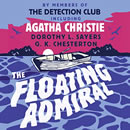 This is an intriguing novel. And if it did not have such an interesting history would be a bit less interesting, seeming a bit muddled, going on and off the boil, and - of course - being very dated.
This is an intriguing novel. And if it did not have such an interesting history would be a bit less interesting, seeming a bit muddled, going on and off the boil, and - of course - being very dated.
It's a collaborative detective novel written by fourteen members of the 'Detection Club' in 1931. Each author would write one chapter, leaving G.K. Chesterton to write the prologue and Anthony Berkeley to tie up all the loose ends. In addition, each of the authors provided their own solution in a sealed envelope, all of which appeared at the end of the book. [Agatha Christie's ingenious conclusion acknowledged at the time to be 'enough to make the book worth buying on its own']. I have to say, that I do like the idea of these collaborations - like the Medieval Murderers - but I also have to say that I think a collection of short stories works better, for obvious reasons.
- Prologue: The Three Pipe Dreams - GK Chesterton
- Chapter 1 Corpse Ahoy! - Victor Whitchurch
- Chapter 2: Breaking the News - GDH and M Cole
- Chapter 3: Bright Thoughts on Tides - Henry Wade
- Chapter 4: Mainly Conversation - Agatha Christie
- Chapter 5: Inspector Rudge Begins to Form a Theory - John Rhode
- Chapter 6: Inspector Rudge Thinks Better Of It - Milward Kennedy
- Chapter 7: Shocks for the Inspector - Dorothy L. Sayers
- Chapter 8: Thirty Nine Articles of Doubt - Ronald Knox
- Chapter 9: A Visitor in the Night - Freeman Wills Croft
- Chapter 10: The Bathroom Basin - Edgar Jepson
- Chapter 11: At the Vicarage - Clemence Dane
- Chapter 12: Clearing Up The Mess - Anthony Berkeley
- Appendix - Solutions
Here's a very good podcast about the book, with a transcript if you prefer. -
House of Beauty by Melba Escobar
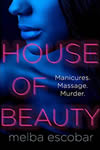
... or La Casa de la Belleza as we folk with pretensions of reading stuff in the original language might say.
The action revolves around a beauty salon catering to the well-heeled in a rich area of Bogotá. There's corruption, poverty, murder, and injustice. This is a suitable synopsis: ..it's the same the whole world over, it's the poor wot gets the blame; it's the rich wot gets the pleasure, isn't it a blooming shame?
I enjoyed reading this book as it's not one I would of normally gone for - even though it is a psychological novel about crime. I see some readers were not so happy but as far as I can see they mostly complained that the plot was lengthy and too complicated with too many characters to follow, and the translation from Spanish was poor. I didn't have a problem with that, and felt I was being given real insight into a place I know nothing about - and wondered if it bore as much relation to crime in Bogotá as Morse does to Oxford (see below). However I was glad to read a comment from someone who seems to know: ...if you have ever spent time in Bogotá, this book will make you nostalgic: the sense of place is beautifully drawn, even if you have little fondness for the actual city... -
The Chalk Man by C J Tudor
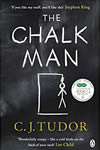
This is a rather creepy psychological thriller based around a childhood secret or memory - so some 1980s flashbacks thrown in, (which are not quite so nostalgic for me as that was not my childhood).
It's criticised for improbable plot twists - but then that's what stories are all about after all. In fact, how realistic are any detective novels? [For example: the much loved Morse who had more murders in one episode than the Oxford constabulary ever saw in a year]. -
The Hound Of Death by Agatha Christie
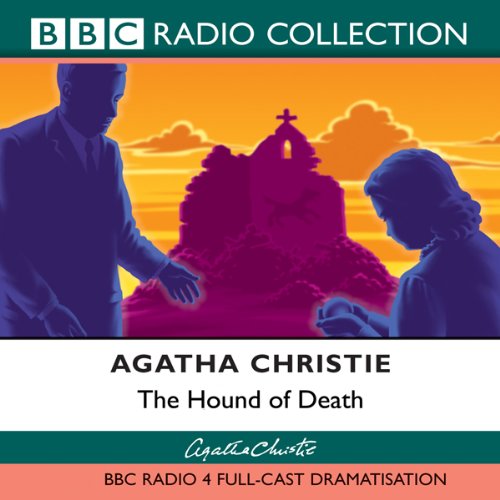 An ambitious doctor meets a nun apparently traumatised by what she witnessed in the Great War. An attempt to restore the woman's sanity results in the uncovering of something very sinister indeed.
An ambitious doctor meets a nun apparently traumatised by what she witnessed in the Great War. An attempt to restore the woman's sanity results in the uncovering of something very sinister indeed.
This is a BBC 2002 radio play dramatised by Bill Morrison and directed by Dirk Maggs. It's an adaptation a short story by Agatha Christie set in 1920. Cast includes Julia McKenzie as Alice Anstruther and Michael Kitchen as Dr Rose plus Simon Treves, Marianne Borgo and Alexis Zegerman.
Posted on September 30, 2018 at 7:35 PM
« Previous entry | Main | Next entry »Friday August 31, 2018
Books in August
- A Dangerous Place by Jacqueline Winspear
[read by Julie Teal]
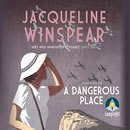 Well, the author has resolved her, along with Maisie's personal, issues from the previous book, and Maisie has been traveling - through America and India. Thus in 1937, after the happiest period of her life, she finds herself in Gibraltar, basically, experiencing a nervous breakdown. The Rock is indeed "a dangerous place" at this time. It's a key British stronghold and a centre of clandestine activity, full of intelligence operatives, double agents, and refugees fleeing the Spanish Civil War. Maisie is drawn into the intrigues, looking into a murder, and also crossing the border with other nurses to help in a hospital in Spain. Through all this, ("good works"), she gradually begins a sort of recovery.
Well, the author has resolved her, along with Maisie's personal, issues from the previous book, and Maisie has been traveling - through America and India. Thus in 1937, after the happiest period of her life, she finds herself in Gibraltar, basically, experiencing a nervous breakdown. The Rock is indeed "a dangerous place" at this time. It's a key British stronghold and a centre of clandestine activity, full of intelligence operatives, double agents, and refugees fleeing the Spanish Civil War. Maisie is drawn into the intrigues, looking into a murder, and also crossing the border with other nurses to help in a hospital in Spain. Through all this, ("good works"), she gradually begins a sort of recovery.
Again, fans have mixed reviews, but a lot of them seem to think Maisie should be a rags-to-riches story where love conquers, with nothing but happy endings - more like Barbara Taylor Bradford (no disrespect to this best-selling author). Any review of the actual mystery stories should make it plain that these are sad and poignant tales, told alongside, and balanced against, Maisie's rise through the ranks. Having said that - others complain that life works out "too perfect" for her. Either way an author needs some substance about which to write any story* - and here I found it very refreshing with a move of the action to Europe describing a wholly different backdrop, and just the seedlings of WW2.
[* I have always had this issue with soap operas - not one set of problems solved and another begins - if it were left to me everyone would settle down nicely in couples and live happy satisfying lives.
No-one has yet approached me for a script...]
- The Headhunters by Peter Lovesey
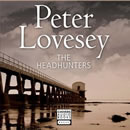 [read by Maggie Ollerenshaw ]
[read by Maggie Ollerenshaw ]
I really liked this novel - just a fantasy conversation between a few friends, but a blueprint for an action plan for the psychopath among them. Discovering which one leads to a tense and thrilling ending.
This book is the second to feature Hen Mallin as the detective - the first being The Circle, although she played minor parts in the The House Sitter and The Secret Hangman, all of which I have read.
Not so easy to find an audio version for this book in the UK - I found it in the eBook offerings from the local library.
Posted on August 31, 2018 at 7:53 PM
« Previous entry | Main | Next entry »Tuesday July 31, 2018
Books in July
- Leaving Those Most Loved by Jacqueline Winspear
[read by Julie Teal]
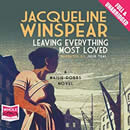 It's 1933. Usha Pramal has been murdered and her brother, newly arrived in England from India, asks Maisie to find out the truth about her death. It's an intriguing mystery. Usha seems to have been an altogether good woman about whom no-one says anything other than good. And yet her British employers - who brought her with them to England - appear to have dismissed her for no reason.
It's 1933. Usha Pramal has been murdered and her brother, newly arrived in England from India, asks Maisie to find out the truth about her death. It's an intriguing mystery. Usha seems to have been an altogether good woman about whom no-one says anything other than good. And yet her British employers - who brought her with them to England - appear to have dismissed her for no reason.
There are good period descriptions of the times - exploring an ayah's hostel for women in Usha'a position (ie brought to England and then dismissed with no income) which exploits its residents under a mask of Christian good works. And there is a lot about Maisie's personal dilemmas, which many faithful fans are beginning to find annoying; I think I find it less so in listening to the books as it's a bit like listening to an old friend unburdening herself. In fact I think the author has a problem here - she has an independent protagonist with a perfect "boyfriend", however, the relationship cannot stand still. If Maisie marries into the aristocracy, she will be totally prevented from continuing with any independent career especially one as bizarre as a detective bureau. So as things are, the two of them are living in a kind of limbo which is rather like an allegory of the larger picture, life between-the-wars.
- Night of the Lightbringer by Peter Tremayne
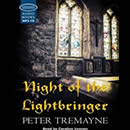
[read by Caroline Lennon]
I never approached Sister Fidelma mysteries with enough respect I think, even though I enjoyed the first one I read (a very long time ago). This is the 28th novel and in order to give her more clout as an independent woman of her time (rather like Maisie in the previous book I guess) has long since ceased to be Sister and is now more reliant on her high rank and education. She is now married (to Edulf, a Saxon) and has a son. We are now in Ireland, AD 671, and the plot begins like many after it (from Midsummer Murders to the County Guides Sussex murder) with a body inside the unlit bonfire at a pagan festival....
I was always conscious of Fidelma being from Cashel but - shame on me and my lack of Geographical knowledge - I never knew or even questioned where Cashel was - especially as, in the couple of books I read, Fidelma travels very far from home. And even worse, it was only when I knitted some socks in a colourway named "Cashel" that I took the trouble to find out! - Clouds of Witness
by Dorothy L Sayers [Dramatisation]
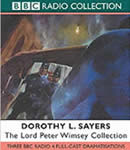
Another bedtime story for me.
Written in 1926, this is the second Wimsey story - and very dated even by the rather twee standards of the series. Lord Peter Wimsey's brother, the Duke of Denver, stands accused of murder and - rather arrogantly I think - seems to believe it won't come to anything despite being found with the body, plus having the usual means, motive, and opportunity. Wimsey leaves it all to the 11th hour including a transatlantic crossing by air to present the evidence to save his brother.
Of passing interest to me was the fact that a copy of Clouds of Witness was one of the books modified* by Joe Orton and Kenneth Halliwell in their adulterations of library books from the Islington and Hampstead libraries in the early 1960s. [* for which - in this case altering the blurb on the dust jacket describing the plot - they were sentenced to a draconian 6 months in prison, and yet today regarded as guerilla-art-pranks and proudly displayed in a gallery of the library...!]
Posted on July 31, 2018 at 2:57 PM
« Previous entry | Main | Next entry »Saturday June 30, 2018
Books in June
- H is for Hawk by Helen MacDonald [read by the author]
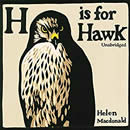
I heard about this acclaimed book and thought I should read it, but was very nervous as it was said to be about "loss", which did not appeal so much. However, it is a wonderful book - so everyone was right.
And, if I had to say what it was about, I would probably say "loss" - and also "a goshawk" - which is fairly evident. I did not realise until after listening to it, that it is narrated by the author - which makes it even more special as she is (presumably) reading it exactly as she meant to write it - perfect.
- The Mapping of Love and Death by Jacqueline Winspear
[read by Julie Teal]
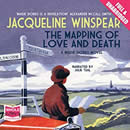 I moved back to a Maisie Dobbs novel somewhat earlier in the series.
Although the books do revolve around Maisie's personal life as well
as the mystery plotline, I did not feel victim of any major spoilers.
It does seem to be a thing, though, that the murder victims are always
presented as highly sympathetic characters and you are regretful all
the way through that they are so definitively.... gone. I remember a
friend having trouble coping with Requiem for a Wren for the
same reason; (Nevil Shute - now there's an author I have not thought
about for a long time... and the friend... I haven't thought about him
for a long time either...) .
I moved back to a Maisie Dobbs novel somewhat earlier in the series.
Although the books do revolve around Maisie's personal life as well
as the mystery plotline, I did not feel victim of any major spoilers.
It does seem to be a thing, though, that the murder victims are always
presented as highly sympathetic characters and you are regretful all
the way through that they are so definitively.... gone. I remember a
friend having trouble coping with Requiem for a Wren for the
same reason; (Nevil Shute - now there's an author I have not thought
about for a long time... and the friend... I haven't thought about him
for a long time either...) .
- Want You Gone by Christopher Brookmyre
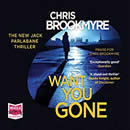
[read by Avita Jay, and Angus King]
This is the latest (8th) book "starring" Jack Parlabane - and make no mistake - he is a star. Far from being stale, this book is very lively - very thrilling and very humorous.
It involved a lot of computer hacking and scamming techniques which I really enjoyed - proving the point (in spades) that it's people that are the weak link in any security system. - Unnatural Death, Strong Poison, and Have His Carcase
by Dorothy L Sayers [Dramatisation]
I downloaded this little collection of Lord Peter Wimsey plays to listen to at bedtime.
I found Unnatural Death a bit complicated to follow just before sleeping, but the other two I am well familiar with. As I had just seen a reprise of the TV adaptations, I know them almost backwards - and in fact to my surprise the scenes, plotting, and scripts seemed almost identical. With my eyes shut I could even will myself to imagine that it was Edward Petherbridge providing the dialogue rather than Ian Carmichael, so similar was the performance, even though previously I always thought Carmichael was a bit more over the top (don't ye know).
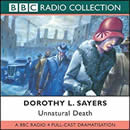
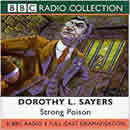
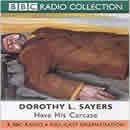
Posted on June 30, 2018 at 12:58 PM
« Previous entry | Main | Next entry »Thursday May 31, 2018
Books in May
- Two Kinds of Truth by Michael Connelly
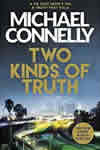
I'd been looking forward to reading the next "installment", but as I started the book I began to think my increasingly poor memory had let me down about which books I have actually read. However all was well - memory still poor but I'd just read the first few chapters as a taster in the previous book (it seems so long ago...).
Anyway - still on top form Michael, and all the characters, old and new, as fresh as ever. The usual excellent plot with a new and an old case where the "two unrelated cases wind around each other like strands of barbed wire". - Love Like Blood by Mark Billingham
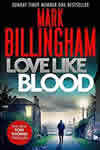
Pleased to have a Tom Thorne storyline with Nicola Tanner in a central role. It is interesting that Connelly and Billingham are moving on to key female detective protagonists. Both have had books centred on female characters previously so not really new I guess but they seem to be .. grooming them... if that's not too creepy.
I read a review saying that Tanner was "unappealing" - and I would not disagree entirely; however, MB has clearly tried to make her a very different character from ones we have seen before - maybe one he does not completely understand himself yet. Helen, for example, was a very appealing character with whom no doubt we could all empathise - but there is only so far you can go with such a character, and now she is (firmly I hope) embedded in Thorne's personal life. So I am looking forward to Tanner being fleshed out even more in further books; maybe, meanwhile, it's right for her to be mingled with characters we already know and love. She held her own well enough in Die of Shame but it was her interactions with other people that I felt made her more 3 dimensional (ie other characters found her less than appealing too!). - Dandy Gilver and A Most Misleading Habit by Catriona McPherson
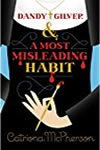
So here the third book this month from one of my favourite authors, although to be fair it's Dandy that's my favourite in truth, rather than the author. I say "to be fair" because what I mean is I have not read any other of CM's novels - and feel I should, as I find her writing wonderful - the way she evokes the era and language in these books is quite brilliant.
In this one we see Dandy condemned to spend some time in a convent with its obviously limited facilities in the way of luxury; Alec appears somewhat luckier in all but home cooking, in which skill the convent excels.
The fundamental causes of the unravelled mystery turn out to be, as usual, wonderfully of their time. - Calling Out for You and Black Seconds by Karin Fossum
[read by David Rintoul]
I finally felt brave enough to go back to Karin Fossum, and was very pleased to find audio versions read by David Rintoul who is just perfect for these books. Interestingly, although these are police procedurals in essence, with Inspector Sejer in the driving seat, they are very much more than that. To me they have a slight Ruth Rendell feel to them as more psychological thrillers. These two alone serve as good examples as to how she manages to create plots and writing structures totally different from one another. The only thing they all have in common is how poignantly sad they are - reminding myself yet again that all murder stories are in fact going to be tragic.
I would also say that I am bound to agree with other reviewers that Calling Out For You is really very chilling as you are left at the end thinking that the horrible crime may be unsolved.
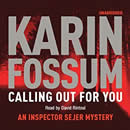
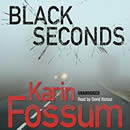
- Fallout by Sara Paretsky [read by Liza Ross] and Hard
Time [read by Jean Smart]
Fallout is the latest VI novel (18th), and is excellent. I loved the plot and the descriptions of the detection methods. I also loved that it was wrapped up with chemistry/physics/biology (which we may call "science" - but it was specifically those - o and government conspiracies to boot). I do agree with one reviewers comments that VI's niece is a total pain and I find it hard to believe that the VI character would put up with her for one second without being driven to commit murder herself. However, I can see that the author needs all that as a plot device - VI herself is pretty sensible and effective as a PI so everything would run far too smoothly without such irritations.
Hard Time is a fairly old novel (9th) and I was less keen on it. One reason was that the audio book I had downloaded was somehow scrambled and not only played some chapters out of sequence but also had some chapters entirely missing. [I was driven to read several chapters of the actual book to catch up with what was going on]. Very frustrating - but still not my favourite story - whereas Fallout does rank among my favourites.
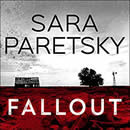
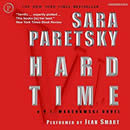
- The Dead Sea Cipher by Elizabeth Peters [read by
Grace Conlin]
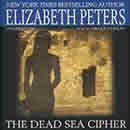 And
so last - and probably actually least.
And
so last - and probably actually least.
I always spell it cypher but although it seems this is a "chiefly British" spelling, it seems in "modern usage" it should be cipher - and having got that out of the way - on to the book:
This has shades of Dan Brown, and James Bond, but mostly Mills and Boon (not intended as an insult). The heroine has an improbable occupation (opera singer) and is embroiled in a mystery while on a tour of the Middle East; she is pursued by two men - one is an irritation and the other handsome and charming. Guess which one is the baddie. The End.
Amusing enough to listen to as an accompaniment to crafting.
Posted on May 31, 2018 at 8:48 AM
« Previous entry | Main | Next entry »Monday April 30, 2018
Books in April
- Shetland Series by Ann Cleeves
I decided it was time to read the Shetland books - especially as the last one is due out this year. I really loved the TV adaptation (having not read the books) and the only minor quibble I have now is that Doug Henshall* does not really fit the description of the Spanish heritage of Perez - but that is all. (O - and I thought Sandy was a chubby sort of guy - but I made that up I think).
As I thought that Fran had died prematurely of natural causes, Blue Lightning came as a bit of a shock. Other than that - brilliant.
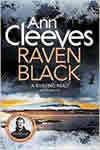
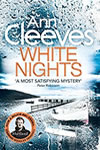
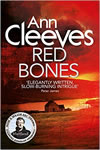
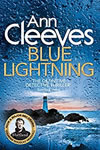
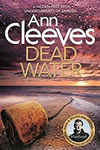
* Also brilliant in his role in Network - although maybe a bit young (looking at least) for the role of Max Schumacher? - The Last Secret Of The Temple by Paul Sussman
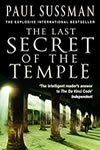
I could not get hold of an audio book for this first book by Sussman so it took me a little longer to get round to reading it myself. Here we see how the two policemen on each side of the fence get together to solve their first crime. As I said - his thriller writing improved over the 3 books - not being a writer I can't really say how or why. However, you can see that the opportunity for these two to be long term partners in combating crime were going to be limited - and the author ensured that was indeed the case in the third book, before his own untimely demise. Well worth the read.
Posted on April 30, 2018 at 5:53 PM
« Previous entry | Main | Next entry »Saturday March 31, 2018
Books in March
- Rather Be the Devil by Ian Rankin [Read by James ]
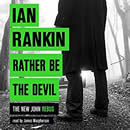
Another great read from Ian Rankin. Personally I am less keen on plots involving Big Ger - and probably gangsters in general. Maybe I don't like the idea of the one great adversary or nemesis (Moriarty) - more of the "murder in a country house" girl me. But I do like the new character Malcolm Fox - in fact, I think I understand or empathise with him a bit more than with Rebus himself. This book has Rebus (retired...) working with both Siobhan and Fox; I guess Rankin can't do that too often ("the gang's all here") but it works well. - The Seagull by Ann Cleeves [read by Janine Birkett]
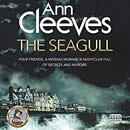
Apparently only the 8th book about Vera - she seems so alive I imagined there were more. Here we have some of her back story catching up with her. Excellent plotting and writing leaves me quite inclined to read it again.
The Seagull itself is a night club on the shore - and quite inappropriately, it reminds me of a ... cafe I suppose... on the sea shore where I was brought up called the Mermaid - although comparatively innocent ie not full of drug dealers and murderers, it seemed a very daring place and one which I longed to go to ("going down the Mer"). Once I was old enough to do so, of course, it's flame had dimmed somewhat.
Note: these faded memories led me on a search on the web looking at old photos of my village in the 1950s and 60s. The Mermaid "Bathing Cafe" was finally demolished about 10 years ago or so - someone provided a picture:

- Wild Chamber by Christopher Fowler [read by Tim Goodman]
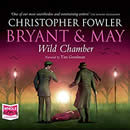 Another wonderful story featuring my favourite detectives. It's a sad
tale from beginning to end - and perhaps that's only right when dealing
with a murder story; I tend to forget this when steeped in the Golden
Age Locked Room mystery genre. The title
of the book refers to the 17th century name for city parks and gardens,
which Arthur explains - to my delight and his colleagues usual degree
of exasperation. I actually love CF's use of Arthur as a device to inform
on all sorts of fascinating titbits about London - relevant or irrelevant
- which clearly interest the author himself (and me), and which he has
a need to tell us all about.
Another wonderful story featuring my favourite detectives. It's a sad
tale from beginning to end - and perhaps that's only right when dealing
with a murder story; I tend to forget this when steeped in the Golden
Age Locked Room mystery genre. The title
of the book refers to the 17th century name for city parks and gardens,
which Arthur explains - to my delight and his colleagues usual degree
of exasperation. I actually love CF's use of Arthur as a device to inform
on all sorts of fascinating titbits about London - relevant or irrelevant
- which clearly interest the author himself (and me), and which he has
a need to tell us all about. - Dream of Darkness by Reginald Hill writing as Patrick Ruell
[read by Seán Barrett]
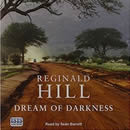 Although written in 1989, I found it had a rather brittle tone - more
1950s or even earlier. This may have been intentional as the story is
about Idi Amin's Uganda - mostly in flashbacks of a kind - so the characters
are rather in the vein of old colonials - and "posh" it has
to be said. I thought the story was firmly centred on the politics but
it turned out to be quite a (albeit melodramatic) thriller. In fact
I found the political angle quite interesting as Uganda and Idi were
very high focus in my teenage years in the 1970s.
Although written in 1989, I found it had a rather brittle tone - more
1950s or even earlier. This may have been intentional as the story is
about Idi Amin's Uganda - mostly in flashbacks of a kind - so the characters
are rather in the vein of old colonials - and "posh" it has
to be said. I thought the story was firmly centred on the politics but
it turned out to be quite a (albeit melodramatic) thriller. In fact
I found the political angle quite interesting as Uganda and Idi were
very high focus in my teenage years in the 1970s.
Posted on March 31, 2018 at 9:07 AM
« Previous entry | Main | Next entry »Wednesday February 28, 2018
Books in February
- Bearded Tit: a love story with feathers by Rory McGrath
[read by Rory McGrath
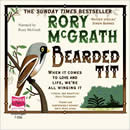
Rob gave me this book for Christmas and I thought "I wonder what Rory has been up to lately" and made the mistake of looking, and finding that there was all kinds of scurrilous detail on the subject available on the internet. This put me off reading it - not by any means because I was disgusted with him but because it made me so deeply sad - especially since (at least part of) the book is about finding his "true love" and of course loves young (old) dream does not always last.
However, Rob is quite definite that "it's about birds" which is also true - and it's clever and funny and great hearing it read by the author. He needs to write more. - Sleeping In The Ground by Peter Robinson [read by Mark
Meadows]
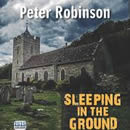
This is the 24th (and most current) book in the Inspector Banks series. It was available from the library so I took advantage of the opportunity, although I am trying to read them in order (I'm up to number 10). I've read that you should read them in order, as there are plot spoilers about previous books but I've not noticed this, but as usual, it was a good story well written and I enjoyed it.
What I did not enjoy was the library software (Ulverscroft) provided on iPad which I used to listen to it. The tracks are simply not played automatically in order, so I had to keep guessing from the wild change in plot line that we had leapt to the wrong place after each chapter. I can find no information or complaints about this online so still wondering if it is "user error". I have to say though that another book I borrowed had a whole chunk missing - so I had to go back to the hard copy book to catch up with the missing plot! - A Lesson in Secrets and Elegy for Eddie by Jacqueline
Winspear
[read by Julie Teal]
So I have found another mystery series and a new heroine - a whole catalogue of books to mine. I'm not reading these in order but the time line is not hard to follow. I can see that Maisie Dobbs is a bit elitist - or perhaps more exactly improbably privileged - but it serves the basic premise of the books and enables her freedom to be a female detective between the wars. I like (well written) books about this period - which I suppose must be called "historical novels" now, even though I feel they were almost my life and times. As I observed before - the wars seemed within touching distance during my childhood.
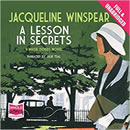
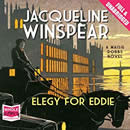
Posted on February 28, 2018 at 7:22 PM
« Previous entry | Main | Next entry »Wednesday January 31, 2018
Books in January
- Learning to Talk by Hilary Mantel [Read by Patrick Moy,
Anna Bentinck, and Jane Collingwood]
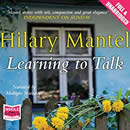
A collection of autobiographically inspired short stories. Poignant and evocative tales of life in the 1950s and 60s.- King Billy is aGentleman
- Curved is the Line of Beauty
- Learning to Talk
- Third Floor Rising
- The Clean Slate
- Behind the Scenes at the Museum by Kate Atkinson [read
by Diana Quick]
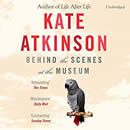
Another wonderful chronicle of an extended family. It covers not only the main character's childhood era (1950s) but also the previous generations across two world wars.
I was originally given her book of short stories, and due to the cover (!) thought she was a chick lit writer. Then I was introduced to her Jackson Brodie novels (and TV series) - and thought she was a crime writer.
Now - I have thankfully stopped trying to pigeon-hole her and just see her as the excellent writer she undoubtedly is. - The Labyrinth of Osiris and The Lost Army of Cambyses
by Paul Sussman
[read by Gordon Griffin]
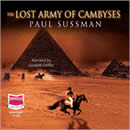
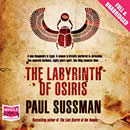 Quite by chance I listened to The Labyrinth of Osiris and was
completely hooked. I thought I had found a great new author - only
to discover the poor chap was the victim of an untimely death - so 3
books is it (actually there are a couple more but not in this "series").
Quite by chance I listened to The Labyrinth of Osiris and was
completely hooked. I thought I had found a great new author - only
to discover the poor chap was the victim of an untimely death - so 3
books is it (actually there are a couple more but not in this "series").
I have read them in exactly reverse order - and I think his style (as in: a writer of thrillers - Sussman was a journalist of some standing) improved over the 3 books.
The books are variously described with comparisons to Dan Brown - which is frankly an insult but I guess gives you a flavour of the content. They are police procedurals set in present day Egypt and Israel but with (in truth unrealistic but made real) new archaeological finds based on references in ancient writings. Sussman has combined his love for archaeology with his day job and produced some great stories.
Curses that there are no more.
Posted on January 31, 2018 at 4:11 PM
« Previous entry | Main | Next entry »Sunday December 31, 2017
Books in December
These is the Mordecai trilogy and the only novels in this series published in the author's lifetime. [A fourth The Great Mortdecai Moustache Mystery - unfinished - was completed by Craig Brown and published posthumously].
I had never heard of this author despite the fact that there was a film based on the books released in 2015 - and it should have been a hit (starring Johnny Depp, Gwyneth Paltrow, and Ewan McGregor) but somehow passed me by.
The (anti) hero is Charlie Mortdecai who is like an amoral Bertie Wooster with his sharp and loyal manservant to boot. The books are realy hilarious but I must say I did somehow tire of the (high quality, beautifully constructed, but relentless) humour after the second book. I think in agreement with another reviewer, the best advice is to not read all 3 (or 4) on the trot.
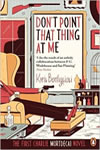
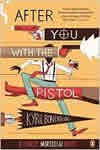
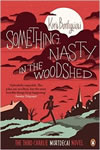
Posted on December 31, 2017 at 7:39 PM
« Previous entry | Main | Next entry »Thursday November 30, 2017
Books in November
- Y is for Yesterday by Sue Grafton
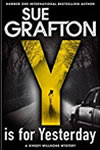
The story flips between 1979, and "now" (1989). A copy of a missing (lewd) tape made by a bunch of teenagers turns up with a ransom demand. The parents of one of the kids - now all grown up and just out of prison (don't ask) - call Kinsey Millhone for help - and she is drawn into their family drama.
The usual exciting mix of mystery, drama and danger.
 The 39 Steps
The 39 Steps
A man is murdered in Richard Hannay's London flat, and he goes on the run (dressed as a milkman...) pursued by the police - and a gang of German spies. Hannay must solve the mystery of the steps if he's to save the British naval fleet from certain destruction...
I have seen a number of dramatised versions of this story and they all seem to follow the line of the 1959 film - presumably because it has a nicely rounded plot with a good dose of romantic interest. I was amused that this version was exactly that plot - almost to the degree that, as far as my memory goes, they could have been using an abbreviated version of the same script.
The John Buchan original book from 1915 is a different matter - no female interest and full of jingoism and anti German sentiment - very much of its time of course. The book is also very clearly episodic, having been written as a serial for a magazine - and this is retained even in the much later productions with the hero having a number of unrelated "adventures" while eluding his pursuers. Apparently it was voted one of Britain's "best loved books" but I do wonder how many people have actually read the original text (and I admit it is at least 40 years since I did so).
This dramatisation from 2001 stars David Robb as Hannay, Tom Baker as Bullivant, Struan Rodger as Hawk, Tracy Wiles as Charlotte, Phillip Joseph as Johnners, Thomas Arnold as Jopley, Gordon Reid as Chairman, and Stuart McQuarrie as Sir Harry.
Posted on November 30, 2017 at 11:41 PM
« Previous entry | Main | Next entry »Tuesday October 31, 2017
Books in October
- Sidney Chambers and the Perils of the Night by James Runcie
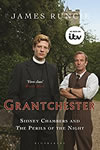 The second book of short stories in the Grantchester mysteries written
in 2013, set in 1955/61. By now it is clear how much the "Granchester"
TV series has diverged from the books. Here Sidney makes up his mind
about his love life - after only 10 years it appears, if my arithmetic
is correct. Clearly he has some lasting connection with Amanda but it
does not seem able to be translated into the sort of life together that
a clergyman could feasibly have.
The second book of short stories in the Grantchester mysteries written
in 2013, set in 1955/61. By now it is clear how much the "Granchester"
TV series has diverged from the books. Here Sidney makes up his mind
about his love life - after only 10 years it appears, if my arithmetic
is correct. Clearly he has some lasting connection with Amanda but it
does not seem able to be translated into the sort of life together that
a clergyman could feasibly have.
- The Perils of the Night (January 1955)
- Love and Arson (August)
- Unholy Week (Good Friday)
- The Hat Trick (a Saturday in mid May)
- The Uncertainty Principle (April 1961)
- Appointment in Berlin (July)
- Cast Iron by Peter May
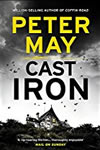 At last I have read it - the final book in the Enzo series.
At last I have read it - the final book in the Enzo series.
Excellent as I expected.
All the more so as the answer to the whole enigma was "pretty obvious". I must say I do like all the clues to be hiding in plain site - it means the plot is totally feasible - not riddled with red herrings or information that you were never told ["ah - I 'ave been so blind - an imbecile" etc].
Much anticipating his next book, wherever that takes us. - The Girl in the Spiders Web and .. Who Takes an eye for an Eye
by David Lagercrantz
[read by Saul Reichlin]
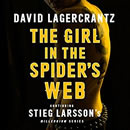
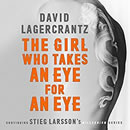 So these are the 4th and 5th novels in the Millennium series, focusing
on the characters Lisbeth Salander and Mikael Blomkvist. It's not written
by the series' creator and author of the first three Millennium books,
Stieg Larsson, as he died of a heart attack in 2004 - before they were
released I think.
So these are the 4th and 5th novels in the Millennium series, focusing
on the characters Lisbeth Salander and Mikael Blomkvist. It's not written
by the series' creator and author of the first three Millennium books,
Stieg Larsson, as he died of a heart attack in 2004 - before they were
released I think.
I was interested enough to read (listen to) them but despite the author saying he did not seek to imitate Larsson's style, they retain many aspects of the detailed and rather dull style of the originals. One thing I did note is that apparently Lagercrantz did not like or understand Blomkvist's apparent magnetic attraction for all women and he "tried to tone it down" - which I can only applaud; I have to say I thought much of the original plots were some kind of ageing journo's fantasies with respect to success with women as well as getting the "perfect" scoop.
A second interesting point is that apparently Larsson's partner, possesses an unfinished fourth manuscript of the Millennium series - which would be interesting. I guess it needs editing - although in my opinion, the first 3 could have done with a bit more editing before publication. - Paul Temple and the Madison Mystery by Francis Durbridge
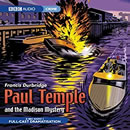
Returning from America by ocean liner, the Temples enjoy the company of their fellow passengers, only to find one of them dead the next morning - and when Paul and Steve get home to London, Sir Graham is waiting to plunge them into one of their most thrilling and dangerous adventures, the pursuit of a ruthless international gang of counterfeiters. As knives fly and bombs explode, the key to the puzzle seems to lie in a coin on the end of a watch-chain...
This was a new production for BBC Radio 4 starring Crawford Logan and Gerda Stevenson, using the original scripts, vintage sound effects and much of the original incidental music from an original lost archive 1949 production. As far as possible, it is a technical and stylistic replica of how that production might have sounded had its recording survived. - A Case for Paul Temple by Francis Durbridge
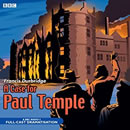
After listening to the above - I had something of a Paul Temple fest - with the same series of re-recorded productions, starring Crawford Logan and Gerda Stevenson, using the original scripts etc. from this missing 1946 production.
Post-war London is buzzing with speculation about the deaths of ten young drug addicts within the space of just one week. The police are desperate to cut off supplies of heroin and cocaine to the capital, but they are struggling. So Sir Graham Forbes turns to Paul Temple. By fast car and police launch, on deserted houseboats and midnight beaches, in dodgy East End pubs and smart West End restaurants, braving booby traps, bullets and blazing houses, Paul and Steve pursue the ruthless and feared drug dealer known only as 'Valentine'. - Paul Temple and Steve by Francis Durbridge
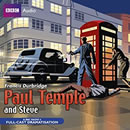
Enlisted by Sir Graham Forbes of Scotland Yard to help track down the mysterious Dr Belasco, Paul and Steve find clues in cigarette lighters and bodies in shrubberies, dance the night away in louche Latin American night clubs, meet sinister manservants and suspicious foreigners, and have their lives threatened at every turn. Just as well Steve remembered to bring along her revolver as well as her ration book...
This yet another new production for BBC Radio 4 starring Crawford Logan and Gerda Stevenson and using the original scripts, vintage sound effects and much of the incidental music from the missing 1947 production.
- Paul Temple Intervenes by Francis Durbridge
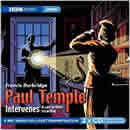
Now this recording is the original - broadcast on the 30th October 1942, and apparently it is the oldest full length drama to remain in the BBC archives. It stars Carl Bernard as Paul Temple and and Bernadette Hodgson as Steve.
The murder of well-known American Myron Harwood, found dead in a small country lane, heralds the start of a series of celebrity murders. Each time, the body is found with a small, square piece of white cardboard bearing the inscription 'The Marquis'. When the eighth victim, a girl, is picked out of the river with the same card attached to her dress, a note from Paul Temple is delivered to Sir Graham Forbes. The message reads: 'Is it true what they say about Rita?' Rita Cartwright was a private detective investigating the Marquis murders - and now she too has ended up dead. With the police baffled and the Home Secretary specially requesting his involvement, Paul Temple has no choice but to intervene...
Even more interesting to me is that this clearly is a very early recording - a different kind of production altogether then the later series (with Peter Coke), and it is the basis for the later 1947 production Paul Temple and Steve discussed above. The Marquis became Dr Belasco and apart from a gender change of some characters, the general sequence and plotting is the same.
Posted on October 31, 2017 at 11:21 PM
« Previous entry | Main | Next entry »Saturday September 30, 2017
Books in September
- The Late Show by Michael Connelly
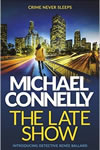 Excellent new book with a new heroine in new territory. There is always
great customer resistance to new things - and often a great temptation
to respond to the new by comparing it unfavourably with the old. However
I find that that Connelly - and other authors with long-standing links
to a specific fictional creation - seem newly inspired in their writing
when introducing new characters. A fresh approach leads to new plot
possibilities and overall better writing. In fact, even with the familiar
"old" characters, he has continually altered their personal
and working circumstances in order to avoid any staleness in the writing.
Excellent new book with a new heroine in new territory. There is always
great customer resistance to new things - and often a great temptation
to respond to the new by comparing it unfavourably with the old. However
I find that that Connelly - and other authors with long-standing links
to a specific fictional creation - seem newly inspired in their writing
when introducing new characters. A fresh approach leads to new plot
possibilities and overall better writing. In fact, even with the familiar
"old" characters, he has continually altered their personal
and working circumstances in order to avoid any staleness in the writing.
A great success here I believe and I'm looking forward to reading more about Detective Renée Ballard. - Black Widow by Christopher Brookmyre [read by Angus
King and Scarlett Mack]
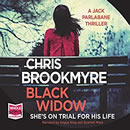 This is another excellent Jack Parlabane story which is described as
being: "unconventional in structure" (not so much), "deftly
plotted" (definitely), and having a "surprise ending"
(quite so - although I did realise quite early on that things might
not be pointing exactly in the direction that one was meant to assume).
This is another excellent Jack Parlabane story which is described as
being: "unconventional in structure" (not so much), "deftly
plotted" (definitely), and having a "surprise ending"
(quite so - although I did realise quite early on that things might
not be pointing exactly in the direction that one was meant to assume).
When I chose it, I did not realise it was awarded crime novel of the year at the Theakston Old Peculier crime writing festival, but it is certainly a worthy winner. - Virtually Dead by Peter May [read by Paul Michael Garcia]
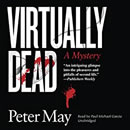 A very interesting concept for a novel - set in a virtual reality world
as well as real life. I do remember all the brouhaha some years ago
around a virtual reality world with people were getting sucked in, spending
all their time, and making lots of virtual, (and also real), money.
This kind of thing was of little interest to me - passing fad I thought
- or maybe I feared I would be one of those people disengaging with
real life! Anyway, I imagined that Peter May had invented a fictional
version of this in order to create his story - but now I find that it
is exactly based in "Second Life" without pseudonyms
or invention (although I hope and trust he invented all the scheming
and criminal activity revealed in the plot).
A very interesting concept for a novel - set in a virtual reality world
as well as real life. I do remember all the brouhaha some years ago
around a virtual reality world with people were getting sucked in, spending
all their time, and making lots of virtual, (and also real), money.
This kind of thing was of little interest to me - passing fad I thought
- or maybe I feared I would be one of those people disengaging with
real life! Anyway, I imagined that Peter May had invented a fictional
version of this in order to create his story - but now I find that it
is exactly based in "Second Life" without pseudonyms
or invention (although I hope and trust he invented all the scheming
and criminal activity revealed in the plot).
Now, having read about this virtual world on line, and having read the book, I am thinking May must have had lots of fun within Second Life doing his research.
Great fun to read ( not to mention exciting). - The Girl Before by Rena Olsen [read by Brittany Pressley]
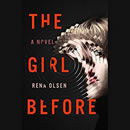 From the start I was gripped by this book, mainly because of the opening,
which I initially (a few paragraphs in) thought must surely be set in
a 3rd world country. However, nothing could have been further from the
truth. I have seen varying reviews, many good but also criticism of
the unbelievable naivety of the heroine or the general quality of writing.
I think that shows a lack of imagination because the whole point of
the book and writing style is to put you into the mindset of the narrator
so that you get a glimmer of her restricted life and warped moral code.
For me this was all pretty successful as there was a gradual shift in
understanding of what this woman is and what she has been complicit
in. In fact, if anything, I felt that the end game was rather less plausible
than the story of the woman's life up to the point at which we join
her story.
From the start I was gripped by this book, mainly because of the opening,
which I initially (a few paragraphs in) thought must surely be set in
a 3rd world country. However, nothing could have been further from the
truth. I have seen varying reviews, many good but also criticism of
the unbelievable naivety of the heroine or the general quality of writing.
I think that shows a lack of imagination because the whole point of
the book and writing style is to put you into the mindset of the narrator
so that you get a glimmer of her restricted life and warped moral code.
For me this was all pretty successful as there was a gradual shift in
understanding of what this woman is and what she has been complicit
in. In fact, if anything, I felt that the end game was rather less plausible
than the story of the woman's life up to the point at which we join
her story.
There are a lot of "Girl" books around, including one with this same title, but unlike some of the others this one is actually more about a girl or girls rather than a woman. - Paul Temple and the Margo Mystery by Francis Durbridge
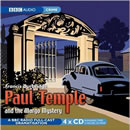
Another intriguing case for BBC radio's smoothest investigator and his glamorous wife. This recording stars my favourites for the series: Peter Coke as Paul Temple and Marjorie Westbury as Steve.
A dangerous web of lies and murder awaits the sleuth when his wife disappears. [Leaving behind just her coat with a mysterious label inside...].
Posted on September 30, 2017 at 8:59 AM
« Previous entry | Main | Next entry »Wednesday August 23, 2017
Books in August
- French Leave by P G Wodehouse
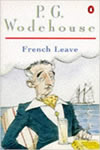 George passed this book on to me - a very old edition hardback with
no date. I spent the first few chapters wondering when Wooster was going
to appear.
George passed this book on to me - a very old edition hardback with
no date. I spent the first few chapters wondering when Wooster was going
to appear.
Anyway despite the lack of Bertie, it was hilarious - if you like Wodehouse (presumably not if you don't).
George was taken by an umberella exchange business model suggested in the book - which apparently was recently tried out by a Chinese start-up Sharing E Umbrella - with Wodehouse-like consequences! - Sidney Chambers and the Shadow of Death by James Runcie
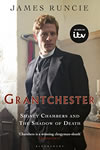 The first book of short stories in the Grantchester mysteries written
in 2012 , set in 1953/4 - and swiftly adapted for the small screen in
the shape of "Grantchester".
The first book of short stories in the Grantchester mysteries written
in 2012 , set in 1953/4 - and swiftly adapted for the small screen in
the shape of "Grantchester".
I feel Runcie's clergyman is not quite as portrayed by James Norton - he is a little more theological and a a lot less worldly - as you might expect since James is the son of Robert Runcie on whom the character is based. A rather gentle read - despite the crimes. I did not find Sidney wholly sympathetic - he seems a bit wet and undecided about everything in general - not least his love life.
- Strange Tide by Christopher Fowler [read by Tim Goodman]
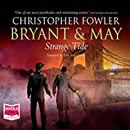 It took me a long time to realise this but ... reports of Arthur's demise
were exaggerated and there are after all some new books. As a "loyal
obsessive" I am delighted but - please don't do this again Christopher.
It took me a long time to realise this but ... reports of Arthur's demise
were exaggerated and there are after all some new books. As a "loyal
obsessive" I am delighted but - please don't do this again Christopher.
One of the things that delights me about this plot reversal is the sheer aplomb with which it is carried off. The explanation - and the cure - of Arthur's condition are totally in keeping with the style of the books and their combination of the scientific and the supernatural - and it even refers back to some previous events we already know about from other books. Also as with most good comedy, it is supported by the "straight man" (or men) (or women) whose reaction to Bryant's cure from apparent dementia is much as you might think in real life - except that he would not have been allowed back to work - but then how many 80-year-olds are there working in the police? (o - ok Dixon of Dock Green ... got me there).
So well done Mr Fowler - or - hang on... did you plan it all along?!
Posted on August 23, 2017 at 7:37 AM
« Previous entry | Main | Next entry »Monday July 31, 2017
Books in July
- Waxwings by Jonathan Raban
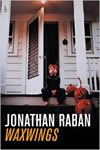 My sister lent me this book and I also found it interesting, although
the underlying themes she understood from it were somewhat different
to my view; however there was a lot there to ponder on. I did find it
slightly depressing - but for all the wrong reasons! It wasn't the desperate
nature of the lives of the individuals that upset me, but rather, once
again, merely the description of architectural vandalism.
My sister lent me this book and I also found it interesting, although
the underlying themes she understood from it were somewhat different
to my view; however there was a lot there to ponder on. I did find it
slightly depressing - but for all the wrong reasons! It wasn't the desperate
nature of the lives of the individuals that upset me, but rather, once
again, merely the description of architectural vandalism.
Waxwings themselves (birds) are never mentioned until the last page of the book. The author says: "...it seemed perfect as an analogy for what people were doing with Seattle during the dot-com movement: these birds, as it were, migrating from gold rush to gold rush, getting high, falling out of the tree, waving their feet around, getting up, moving on." - Empire of Sand by Robert Ryan [read by Clive Mantle]
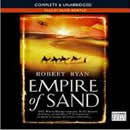 Yet another really interesting Robert Ryan adventure story. It's all
about T E Lawrence "before". I always felt that, however wonderful
the 1962 film with Peter O'Toole, (and it was wonderful), it made it
seem as though Lawrence ended up leading a fighting force of Arabs on
to an amazing victory by sheer chance. This book - to whatever degree
it might be fiction - provides excellent insight into why and how he
went on to such legendary exploits. It also provided me with a lot more
understanding of the politics of the time in the more easily digestible
form of a Boys Own adventure story.
Yet another really interesting Robert Ryan adventure story. It's all
about T E Lawrence "before". I always felt that, however wonderful
the 1962 film with Peter O'Toole, (and it was wonderful), it made it
seem as though Lawrence ended up leading a fighting force of Arabs on
to an amazing victory by sheer chance. This book - to whatever degree
it might be fiction - provides excellent insight into why and how he
went on to such legendary exploits. It also provided me with a lot more
understanding of the politics of the time in the more easily digestible
form of a Boys Own adventure story.
Posted on July 31, 2017 at 10:07 PM
« Previous entry | Main | Next entry »Friday June 30, 2017
Books in June
- First Frost and Fatal Frost by James Henry [read
by David Jason]
James Henry has written four of these prequels, and I have listened to these two - read by David Jason (who else?).
They seem to follow the pattern of the originals with a number of story threads happening concurrently - which the TV adaptation separated into different episodes, (and in my opinion the quality of the series was considerably the better for it). However although I thought the TV series gave a very faithful representation of the characters, it seems the original author felt it did not depict the gritty realism that he strove for in his writing. I do think that these books are more like the TV series, with a lot of Frost-style humour and less of the gritty... etc - but overall are quite a good pastiche, if that's what the author was aiming for.
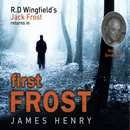
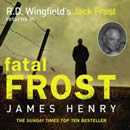
- Speaking in Bones by Kathy Reichs [read by Katherine
Browitz]
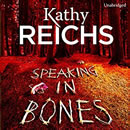 Enjoyable read - less of a focus on some moral or ecological "issue"
of the day and more focus on mystery and suspense. It involves a cold
case and all the usual suspects are in play to solve it.
Enjoyable read - less of a focus on some moral or ecological "issue"
of the day and more focus on mystery and suspense. It involves a cold
case and all the usual suspects are in play to solve it.
I was a little perplexed - or even disbelieving - about the premise which is obviously setting up the next book (no spoilers here) but I guess the author needs more scope for the characters. - Die Last by Tony Parsons [read by Colin Mace]
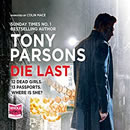 I've enthusiastically been waiting for this latest Max Wolfe story,
and it was as good as I had hoped. Again for my personal taste I was
less taken with the plot and story - which was as horrid as ever - but
now thoroughly enjoying the back story. I hope it continues in a positive
way, but I feel Max is a character destined for tragedy and loss, so
I can't think how he will cope if he turns out to be happy.
I've enthusiastically been waiting for this latest Max Wolfe story,
and it was as good as I had hoped. Again for my personal taste I was
less taken with the plot and story - which was as horrid as ever - but
now thoroughly enjoying the back story. I hope it continues in a positive
way, but I feel Max is a character destined for tragedy and loss, so
I can't think how he will cope if he turns out to be happy.
Posted on June 30, 2017 at 9:24 AM
« Previous entry | Main | Next entry »Wednesday May 31, 2017
Books in May
- Magpie Murders by Anthony Horowitz
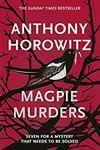 As I will tell anyone who will listen, Anthony Horowitz can do no wrong
in my eyes, but I think even on a more objective basis this is an excellent
book.
As I will tell anyone who will listen, Anthony Horowitz can do no wrong
in my eyes, but I think even on a more objective basis this is an excellent
book.
It is a "clever" book, which may not appeal to some. And given its slight surreal quality, I was concerned that it might veer off to become totally surreal and have an unresolved ending. However, (if this is not a spoiler), take it from me that this is a genuine mystery thriller with all that implies - in case you are in any way like me, and that helps reassure you at all! - In a Dry Season by Peter Robinson
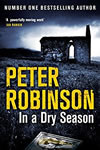 I loved this book.
I loved this book.
It has a lot of those ingredients that would especially appeal to me. It is a "cold case" mystery as the body that appears when a reservoir dries out is many years old. So it has the fascination of the idea of the drowned village reappearing as well the reconstruction of a crime set during and after the war.
It is also the book in which Annie Cabbot makes her first appearance. - The Murder of Mary Russell [and The Marriage of Mary Russell
]
by Laurie R King
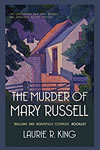 I have a lot of - maybe conflicting - opinions about this book.
I have a lot of - maybe conflicting - opinions about this book.
It is mainly about Mrs Hudson rather than Mary Russell (or Holmes) and the way the author chose to develop this character is not at all pleasing to me. I can see why the author took this route - it is an excellent well-written story which is interesting and thought provoking. I just can't see (or don't want to see) Mrs Hudson like that. More importantly - where will/can she take the characters from there?
The Marriage of Mary Russell is a short story released as a "Kindle Single" - also with an audio version. It's quite fun.
Posted on May 31, 2017 at 10:46 PM
« Previous entry | Main | Next entry »Sunday April 30, 2017
Books in April
- Garment of Shadows, Dreaming Spies by Laurie R King
It's a real pleasure to discover you are several books "behind" in a series, especially when it is one I enjoy as much as these.
In Garment of Shadows we pick up after the plot of Pirate King and still in Morocco. I mentioned that the latter was not my favourite, but this I liked a little better as it covered interesting historical events about which I knew nothing previously.
Dreaming Spies is quite different in that the events take place out of chronological sequence, and are set in Oxford and Japan. I think it is very wise for the author not to tie herself to a series of books in a chronological sequence; I noted with Steven Saylor that he rapidly ran out of a plausible lifetime for his main character - and has now reverted to writing about his characters earlier history - and Lindsey Davis has done (what I thought Saylor might do) and continued the chronology with the children of her original hero. Both of these ploys are only moderately successful (in my opinion - obviously).
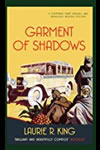
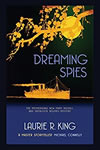
- Paul Temple and the Conrad Case by Francis Durbridge
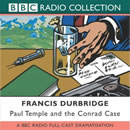
Another case that takes Paul and Steve to a new exotic location, (Bavaria), to help find Betty Conrad. The main clue seems centre around a cocktail stick with which the plot is continually being... well... skewered. Despite that - excellent fun.
This is back to the original 1950s recordings starring Peter Coke and Majorie Westbury, who are not only highly skilled actors but assuredly the best Paul and Steve.
Posted on April 30, 2017 at 9:29 AM
« Previous entry | Main | Next entry »Friday March 31, 2017
Books in March
- Dry Bones That Dream; Innocent Graves; Dead Right
by Peter Robinson
[read by James Langton or Neil Pearson]
The next 3 in the series (7, 8, and 9), which I obtained as audio books. The narrator varies depending on the edition - and "Dead Right" is also published under the title "Blood at the Root".
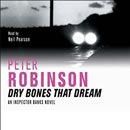
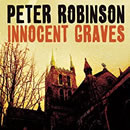
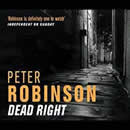
- Death at the Bar by Ngaio Marsh [read by Wanda McCaddon]
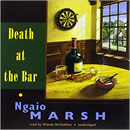 Now completely in the mood for Inspector Alleyn, I listened to this
novel (book 9). It is one of the stories used for the television series
The Inspector Alleyn Mysteries in the 1990s which starred
Patrick Malahide in the title role, ably assisted by William Simons
as Brer Fox.
Now completely in the mood for Inspector Alleyn, I listened to this
novel (book 9). It is one of the stories used for the television series
The Inspector Alleyn Mysteries in the 1990s which starred
Patrick Malahide in the title role, ably assisted by William Simons
as Brer Fox.
Malahide is wonderful and has appeared in many roles too countless to mention - Simons however seems to have made his latter career as a series of stolid and dependable policemen - nonetheless wonderful for all that.
Posted on March 31, 2017 at 9:28 AM
« Previous entry | Main | Next entry »Tuesday February 28, 2017
Books in February
- Past reason Hated and Wednesday's Child by Peter
Robinson
[read by James Langton]
Mini-break over - the next two books in the series which I found as audio books to borrow from the library. A story of sexual jealousy (leading to murder), and a child's abduction (leading to murder).
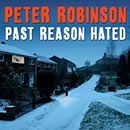
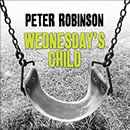
-
Annika Stranded - Series 3
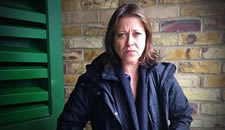 I have to say I love these stories, excellently - I would say narrated
but in truth they are very much a part-acted one man show - by Nicola
Walker. I think any woman can empathise with a very realistic portrayal
of her working life balance and her resulting social life.
I have to say I love these stories, excellently - I would say narrated
but in truth they are very much a part-acted one man show - by Nicola
Walker. I think any woman can empathise with a very realistic portrayal
of her working life balance and her resulting social life.
- False Signals: A plane crash from 1972 seems to have a bearing on a murder inquiry.
- Forty Words: In Bergen, Annika investigates a strange case involving a submarine.
- Traffic: Annika wakes up after some serious partying to find herself in the boot of a car.
- Vertigo: Annika witnesses someone being pushed from the top of a rock face.
- The
Inspector Alleyn Mysteries:
 Jeremy Clyde (isn't he lovely?) stars as Chief Inspector Alleyn in these
BBC Radio dramatisations of two of Ngaio Marsh's much-loved mysteries.
Jeremy Clyde (isn't he lovely?) stars as Chief Inspector Alleyn in these
BBC Radio dramatisations of two of Ngaio Marsh's much-loved mysteries.
A Man Lay Dead
A Man Lay Dead A game of 'murders' at Sir Hubert Handesley's country house party becomes far too realistic for anyone's liking. First a guest arrives with a dangerously lethal dagger and then, when the gong sounds to announce the start of the game, the victim plays dead in a very convincing manner.
I recently watched the TV adaptation of this story starring Patrick Malahide - and (like many of Agatha Christie's plots), it's all credit to them that they managed the logistics to enact the sequence of events as described!
A Surfeit of Lampreys
Like all good aristocrats, the Lampreys are charming but penniless - so a visit from the wealthy head of their family is greatly anticipated. However, their Uncle Gabriel isn't persuaded to part with his money and a row ensues. When a body is found in the lift leading to the Lampreys' flat, Chief Detective Inspector Alleyn finds a family immersed in hidden secrets and intrigue.
A comment from another listener "Dated, implausible and formulaic".
A comment from me: "... and utterly charming."
Posted on February 28, 2017 at 9:28 AM
« Previous entry | Main | Next entry »Tuesday January 31, 2017
Books in January
- The China Thrillers by Peter May [read by Simon Vance]
There was a change of narrator for the next (and final) three books.
There are many comments on line from readers constantly asking Peter May to write more books about Margaret and Li Yan, and I can see why. Since he was not expecting to end the series after 6 books, the characters remain with a story still to be told.
He writes about how the books came about here, and in the comments he points out that these books were written over 10 years ago and summarises the situation:
All these years later I have no appetite for going back to China and updating myself on the changes that have taken place since the series concluded. I was witness to an intense period of change in which the old and new Chinas were still doing battle with each other. I think the new China has won that particular scrap, and much that made the old China fascinating has gone. Like the country itself, I have moved on.
For all that, a short story The Ghost Marriage written for a French magazine has recently been published in English, and follows the characters later on in their history.
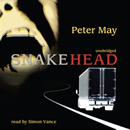
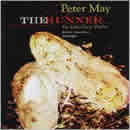
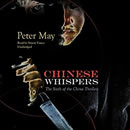
- Dr Finlay's Casebook by A J Cronin
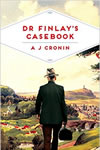
A collection of the famous stories set in and around the fictional Scottish town of Levenford and village of Tannochbrae during the inter-war years. The stories are heart-warming, funny and touching, albeit obviously rather dated and non-PC.
Dr Finlay's Casebook is an omnibus including Adventures of a Black Bag and Dr Finlay of Tannochbrae.
One thing that I did notice was that some of the stories did not seem to be self-consistent, especially with respect to Finlay's love life. That may just be as it is (like Sherlock Holmes stories) or it may be that being collections of short stories they are not presented in the right chronological order. - Paul Temple and the Sullivan Mystery by Francis Durbridge
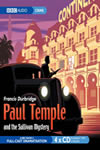
A thrilling case that takes Paul and Steve to exotic Egypt,
This is a "new" (2006) eight-part BBC recording of a lost archive Paul Temple mystery, starring Crawford Logan and Gerda Stevenson.
They inhabit a sophisticated, well-dressed world of chilled cocktails and fast cars, where the women are chic and the men still wear cravats. And where Sir Graham Forbes of Scotland Yard always needs Paul’s help with a tricky case. [By Timothy!].
Posted on January 31, 2017 at 9:27 AM
« Previous entry | Main | Next entry »Saturday December 31, 2016
Books in December
- Coffin Road by Peter May
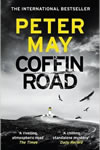
While waiting for the final book in the Enzo series (Cast Iron - out January) I was inspired to read his latest book. It was excellent of course. Enough said.
It seems to have taken me a while to realise but looking back I see that a lot of his novels have "eco" themes - they run all through the China novels, and appear strongly in this one. I do find that I can fail to recognise an author's main interest or genre, which I guess is because often the first book I read is outside their "norm". - Stone Mattress by Margaret Atwood
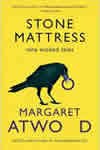 A collection of nine short stories (which Atwood explains need to be
called tales) - the first 3 being loosely linked.
A collection of nine short stories (which Atwood explains need to be
called tales) - the first 3 being loosely linked.
Tales that reveal the grotesque, delightfully wicked facets of humanity - and largely focussed on "old folk":- Alphinland
- Revenant
- Dark Lady
- Lusus naturae
- The freeze-dried groom
- I Dream of Zenia with the Bright Red Teeth
- The Dead Hand Loves You
- Stone Mattress
- Torching the Dusties
- The Wrong Side of Goodbye by Michael Connelly
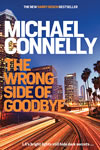
Well we all love Harry so well done for Connelly persevering with the character just for our sakes when realistically he should be long retired. We already saw him leave the PD (sadly on a low) at the end of the last book, but he is still involved in upholding truth, justice, and his own personal American way.
I am not sure Connelly can take his old characters now, but I understand the next book introduces new ones - we just have to learn to love them as much.... - Mystery in White by J. Jefferson Farjeon
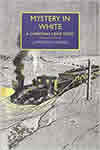
Snowfall brings a train to a halt near the village of Hemmersby. Several passengers take shelter in a deserted country house, where the fire has been lit and the table laid for tea - but no one is at home.
A British Library Crime Classic from 1937 reissued in 2014.
'The horror on the train, great though it may turn out to be, will not compare with the horror that exists here, in this house.' - A Cool Head by Ian Rankin [read by Peter Forbes]
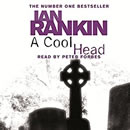
Gravy worked in the graveyard - hence the name. He was having a normal day until his friend Benjy turned up in a car Gravy didn't recognise. Benjy had a bullet hole in his chest, but lived just long enough to ask Gravy to hide him and look after his gun. Gravy had looked after things for Benjy before, but never a gun. - Christmas: Five on Brexit Island, and the Pride and Puddings
These were some terrific Christmas gifts.
I am guessing after the issue of Ladybird books "for grown ups" - designed to appeal to exactly my age group - the excursion into Famous Five in a similar format was a natural progression. A fun idea and pretty well executed - and on a matter dear to my heart.
The history of puddings by Regula Ysewijn is .... well what can I say?! Perfick!.
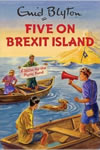
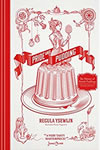
 Frenchman's Creek
Frenchman's Creek
An abridged reading by Adjoa Andoh for Book at Bedtime. This took me back to my teenage years when I first read this Daphne Du Maurier historical novel (loaned to me by my friend Elaine). I do remember thinking it was a great read but hearing it again I can only think it was because teenage girls in general like romantic fiction. I also did not properly remember how it ended - and apart from anything else I believe it is known for its unusual ending. At the time it was suggested to me that it was a "sequel" to Jamaica Inn, (which I did not read until many years later), but I found no evidence of that either by reviewers or in the text - I think it is simply one of "the four Cornish novels". The Cinderella Killer
The Cinderella Killer
A job in Panto seems the perfect way to spend the Christmas season for Charles, but the cast of Cinderella are a motley crew from reality TV and Charles finds himself having to explain the traditions of Panto to their baffled American star whose career is on a downward trajectory. It's not long before the slapstick makes way for a murder.
Bill Nighy as the weak willed, and clearly attractive hero, Charles Paris. Based on Simon Brett's novel, once again brilliantly adapted by Jeremy Front, and directed by Sally Avens.
Posted on December 31, 2016 at 9:27 AM
« Previous entry | Main | Next entry »Wednesday November 30, 2016
Books in November
- The China Thrillers by Peter May [read by Peter Forbes]
Peter May wrote these 6 books in the 1990s based on his experiences living in China during a period of great change for that country. Extraordinarily he was given access to their police department for research and subsequently received awards for the books within China.*
I have had The Firemaker as a talking book for some time and never got into reading (listening to) it, but once started it was totally compelling (like all his books) and I was able to borrow the next two (The Fourth Sacrifice and The Killing Room), from the library.
The books were recently rereleased in paperback so May has been giving interviews and generally chatting about them to increase publicity.
* For a long time this was the only thing I knew about Peter May - it makes for an excellent Quiz question "who is the only writer to have...." etc
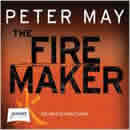
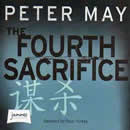
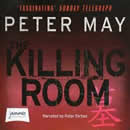
- The Case of the Imaginary Detective by Karen Joy Fowler
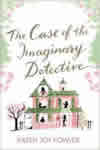 I found this in a charity shop and went for it as I was so impressed
with We Are All Completely Beside Ourselves - and how could such a title not appeal to me?. It continues with certain
familiar themes of loss and adjustment. I found the overall plot a tad
confusing but I took great delight in the main character's not infrequent
philosophical mental "asides" - which could have been part
of any book (as in Cat Out of Hell - recognisable
scenes from everyday life which can be side splitting funny when well
written). So despite not really empathising with the main character
- lucky for me given her situation - I still found it to be an excellent
read.
I found this in a charity shop and went for it as I was so impressed
with We Are All Completely Beside Ourselves - and how could such a title not appeal to me?. It continues with certain
familiar themes of loss and adjustment. I found the overall plot a tad
confusing but I took great delight in the main character's not infrequent
philosophical mental "asides" - which could have been part
of any book (as in Cat Out of Hell - recognisable
scenes from everyday life which can be side splitting funny when well
written). So despite not really empathising with the main character
- lucky for me given her situation - I still found it to be an excellent
read.
[Noting that I did also pass it on to Rob but he did not get on so well with it]. - The Hanging Club by Tony Parsons [read by Colin Mace]
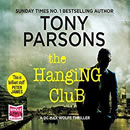 Tony Parsons has produced a great series here and I can only hope he
is not going to get tired of his Max Wolfe any time soon. This story
offered a very interesting thread around "old London" in the
history of the Law Courts combined with locations discussed in the plot.
I was driven to look up information on abandoned Underground stations
as what he wrote did not quite gel with what I thought I knew - but
this was explained later in the story. I did not previously realise
that there was a station British Museum (though I always thought that
public transport for the Museum was strangely out of the way); it was
permanently closed in 1933 as Holborn station was so close by.
Tony Parsons has produced a great series here and I can only hope he
is not going to get tired of his Max Wolfe any time soon. This story
offered a very interesting thread around "old London" in the
history of the Law Courts combined with locations discussed in the plot.
I was driven to look up information on abandoned Underground stations
as what he wrote did not quite gel with what I thought I knew - but
this was explained later in the story. I did not previously realise
that there was a station British Museum (though I always thought that
public transport for the Museum was strangely out of the way); it was
permanently closed in 1933 as Holborn station was so close by.
I would say again though - I find these books are rather sickeningly graphic - but clearly, although it goes against the grain, this must have some appeal as I am also so keen on Mark Billingham who uses much the same approach. 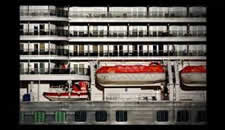 Gideon Fell - The Blind Barber
Gideon Fell - The Blind Barber
There is only one clue to a brutal killing on an ocean liner - the engraving on the murder weapon.
Stars Donald Sinden as Doctor Gideon Fell, John Hartley as Supt. Hadley, and Patrick Allen as Lord Sturton.
Dr Gideon Fell is an archetypal English eccentric and amateur sleuth created by John Dickson Carr. Dramatised by Peter Ling, directed by Enyd Williams, and first broadcast on BBC Radio 4 in 1997.
Posted on November 30, 2016 at 4:23 PM
« Previous entry | Main | Next entry »Monday October 31, 2016
Books in October
- London's Glory by Christopher Fowler [read by Tim Goodman]
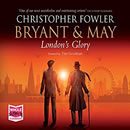 So having "ended" the Bryant and May series quite definitively,
the author has done the only sensible thing and returned to adventures
from a previous era with a book of "11 missing cases".
So having "ended" the Bryant and May series quite definitively,
the author has done the only sensible thing and returned to adventures
from a previous era with a book of "11 missing cases".
He has moved right into real "short story" writing for the detectives and the result is excellent. Small mysteries rather in the vein of Sherlock Holmes.In addition he provides an excellent "introduction" which is an essay about murder mysteries through the ages.
[I am relieved though that he has not followed Steven Saylor's path of introducing a youthful and lusty sexual dimension - luckily our heroes are still pretty ancient even in the 1940s. Not - I hasten to add - that I have any repressed objections to sex for the over 60s - just not sure I want it expressed in any graphic detail - the vision of Bryant and pillow talk would have been too boggling to contemplate.]
So - enjoy - Bryant and May..:- ...and the Secret Santa
- ...in the Field
- ...on the Beat
- ...in the Soup
- ...and the Nameless Woman
- ...and the Seven Points
- ...on the Cards
- ...Ahoy!
- ...and the Blind Spot
- ...and the Bells of Westminster
- ...Mystery Tour
- Sign of Fear by Robert Ryan
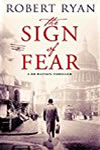 It seems the ending if the last book was the "real" ending
and I just have to live with it. Far from a Holmes-like regeneration,
we see an unlikely alliance between Watson and his nemesis - which the
author has some skill to both pull off as plausible and also take his
reader (me) with him. Watson might be able to pragmatically deal with the
situation but the rest of us have some difficulty. Actually we want
to see evil genii redeemed - a la Star Wars .... but that doesn't happen
either!
It seems the ending if the last book was the "real" ending
and I just have to live with it. Far from a Holmes-like regeneration,
we see an unlikely alliance between Watson and his nemesis - which the
author has some skill to both pull off as plausible and also take his
reader (me) with him. Watson might be able to pragmatically deal with the
situation but the rest of us have some difficulty. Actually we want
to see evil genii redeemed - a la Star Wars .... but that doesn't happen
either!
An excellent adventure - and long may Watson be able to continue in this "modern era". - Brush Back by Sara Paretsky
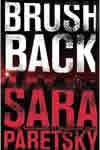 This is the latest published VI novel - and apparently the 17th in the
series. Although the plot is about a past injustice (or maybe not) it
heavily centres on VI's cousin Boom Boom. This famous ball-playing cousin
- and his death - is the subject of a much earlier novel, and it is
always clear that VI has a bit of hero worship going on. Hence his name
associated with wrong-doing leaves VI insecure and doubting herself.
This provides all that is needed to keep her on track looking into a
situation that gives her more grief than it's worth, and that she would
probably prefer not to be dragged into - especially as it's all pro
bono with a stack of personal abuse thrown in!
This is the latest published VI novel - and apparently the 17th in the
series. Although the plot is about a past injustice (or maybe not) it
heavily centres on VI's cousin Boom Boom. This famous ball-playing cousin
- and his death - is the subject of a much earlier novel, and it is
always clear that VI has a bit of hero worship going on. Hence his name
associated with wrong-doing leaves VI insecure and doubting herself.
This provides all that is needed to keep her on track looking into a
situation that gives her more grief than it's worth, and that she would
probably prefer not to be dragged into - especially as it's all pro
bono with a stack of personal abuse thrown in!
Posted on October 31, 2016 at 5:47 PM
« Previous entry | Main | Next entry »Friday September 30, 2016
Books in September
Clearly I did nothing in September other than reading.
[In fact was quite busy trying to squash in two visits to France which even made me miss Rob's birthday - although I am not sure he was too fussed about that...]
Herewith ... the books:
-
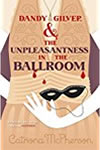 Dandy Gilver and the Unpleasantness in the Ballroom
Dandy Gilver and the Unpleasantness in the Ballroom
by Catriona McPherson
Another winning story about Dandy - and we have now reached 1932. The story is set in a dance-mad Glasgow in one among many dance halls. Dandy and Alec find Glasgow and Sauchiehall Street rather daunting, if not scary - which is not so unbelievable to me who visited as a stranger in the 1980s prior to its reinvention as a European City of Culture... [A title which so infuriated the character Taggart at the time].
Rather like the Taggart TV series - funnily enough - it all starts with a murrderr.... -
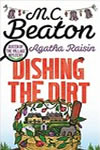 Dishing the Dirt by MC Beaton
Dishing the Dirt by MC Beaton
Almost a direct sequel to the previous novel the Blood of an Englishman.
Some characters Agatha has not yet done with.
She need closure...
.....and what better than pinning a new murder on "the one that got away"... - Goldfinger, Trigger Mortis by Ian Fleming and Anthony Horowitz
George got these books last Christmas - Goldfinger "the Trigger Mortis Edition" and Trigger Mortis itself. As you might gather Anthony Horowitz can do little wrong in my eyes and he has written Trigger Mortis from ideas sketched out by Fleming before his death. Some passages are (apparently) Fleming's writing.
I read Goldfinger as it is the prequel, and found that it is very well covered in the film - much because there is, for example, one entire chapter describing an entire game of golf hole by hole, which is of course dealt with rather rapidly in an action movie.
Horowitz continues this type of detail in describing the racing circuit in his book, and is generally faithful to the way Bond seems to be originally written.
(I had listened to Rupert Penry-Jones reading a version abridged for radio - but still found the full book held my interest).
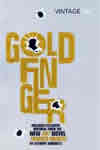
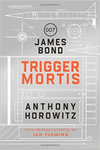
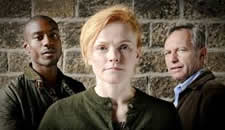 Craven
Craven
Another series of Craven with Maxine Peake.
As impending cuts threaten the staff of the Greater Manchester Police MIT, a case involving dangerous dogs and legal drugs piques DCI Craven's interest.
Produced by Justine Potter -a Red Production Company production for BBC Radio 4.
Posted on September 30, 2016 at 5:47 PM
« Previous entry | Main | Next entry »Wednesday August 31, 2016
Books in August
- Dandy Gilver and A Bothersome Number of Corpses, A Deadly Measure
of Brimstone, The Reek of Red Herrings, by Catriona McPherson
I have to come to terms with the fact that they are not going to produce any more audio versions of these books - so I caught up with the next 3 as holiday reading.
As wonderful (to me anyway) as ever, I particularly enjoyed Brimstone; the author writing in what I believe to be her best mode, brilliantly evoking not only time but also quite wonderfully exploring a (now) lost place.
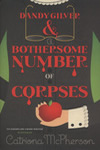

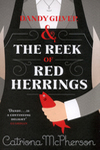
- A Gladiator Dies Only Once by Steven Saylor
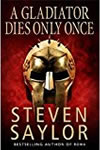 The second anthology of Gordianus short stories (2005).
The second anthology of Gordianus short stories (2005).
- The Consul's Wife - 77 BC
- If a Cyclops Could Vanish in the Blink of an Eye -77 BC
- The White Fawn - 76 BC
- Something Fishy in Pompeii - 75 BC
- Archimedes' Tomb - 75 BC
- Death by Eros - 75 BC
- A Gladiator Dies Only Once - 73 BC
- Poppy and the Poisoned Cake - 70 BC
- The Cherries of Lucullus - 64 BC
- Watching the Dark by Peter Robinson [read by Simon
Slater]
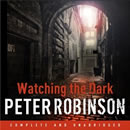 As I mentioned last month - I took this as one of two books to occupy
me while driving to Cambridge for my weaving course, but in fact the
journey was not long enough for both and I listened to this on my return.
As I mentioned last month - I took this as one of two books to occupy
me while driving to Cambridge for my weaving course, but in fact the
journey was not long enough for both and I listened to this on my return.
It was excellent - quite a long way further into the series from my last reading and as I suspected Banks has moved on in his personal life so not miles away from TV-Banks now - although as conincidentally discussed with our weaving tutor - Stephen Tompkinson is a great actor but definitely not book-Banks. [In my normal way of recasting impossibly - I would choose a very young Martin Shaw for this role.]  Gideon Fell - To Wake the Dead
Gideon Fell - To Wake the Dead
A 1997 two-part dramatisation of John Dickson Carr's 1938 thriller by Peter Ling: The Riddle of the Stone, and The Secret of the Stone. Charmingly dated, of course.
Stars Donald Sinden as Doctor Gideon Fell, John Hartley as Supt. Hadley, Richard Johnson as Sir Giles Gray, Wendy Craig as Melita Reaper, John Rowe as Dan Reaper and Tracy-Ann Oberman as Francine Forbes. Directed by Enyd Williams.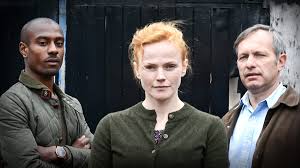 Craven
Craven
By contrast - not at all charming and dated.
An excellent piece of radio drama - which I should not but do rather take for granted with Maxine Peake.
Produced by Justine Potter -a Red Production Company production for BBC Radio 4.
Posted on August 31, 2016 at 6:43 AM
« Previous entry | Main | Next entry »Sunday July 31, 2016
Books in July
- The Original Inspector George Gently Collection by Alan
Hunter
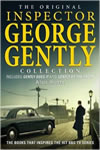 My colleague Tony recommended I try these and I did find them enjoyable.
Quite different from the TV series - it's hard to imagine book-Gently
as any other than an old man - however I don't think that's actually
true it's just that the era is the 1960s and I was a child then so all
adult detectives were going to be avuncular old men [No Hiding Place
with Raymond Francis etc]. In truth I suppose TV-Gently in the shape
of Martin Shaw* is in fact an old
man - he just doesn't seem to be for one of my age now! This is the
first two stories in one edition Gently Does It and Gently
by the Shore - there is also an omnibus available with the first
4 books. Hunter makes a statement at the start of the book that the
stories are not meant to be "whodunnits" so don't complain....
In fact I found them quite intriguing enough for all that.
My colleague Tony recommended I try these and I did find them enjoyable.
Quite different from the TV series - it's hard to imagine book-Gently
as any other than an old man - however I don't think that's actually
true it's just that the era is the 1960s and I was a child then so all
adult detectives were going to be avuncular old men [No Hiding Place
with Raymond Francis etc]. In truth I suppose TV-Gently in the shape
of Martin Shaw* is in fact an old
man - he just doesn't seem to be for one of my age now! This is the
first two stories in one edition Gently Does It and Gently
by the Shore - there is also an omnibus available with the first
4 books. Hunter makes a statement at the start of the book that the
stories are not meant to be "whodunnits" so don't complain....
In fact I found them quite intriguing enough for all that.
* I recently saw Martin Shaw as Dalgliesh in the first of the two PD James stories he recorded around 2003. I thought it was excellent even though I was keen on Roy Marsden in the role. The two stories are connected so it made sense to make them of a piece in this way. [Frustratingly missed the second one - hopefully not too long before another repeat even though they were screened at 2 am.....]. - Six Four by Hideo Yokoyama [translated by Jonathan Lloyd-Davies]
 A totally fascinating book - not only a good thriller with an interesting
and very (I feel) Japanese explanation of the mystery at the end, but
also seemingly a real insight into Japanese life. Throughout, the hero
has a very sad personal situation to deal with and I was sorry that
(like in real life) was not resolved. However, a lot of the story is
very political, and maybe simply a "police procedural" but
it's made so much more interesting to me because it is written by a
Japanese person, not from an outsider's view. I suppose it may not relate
to real policing any more than any other stories I read ("you've
got 24 hours to solve it or you're off the case") but I loved all
the incidental social interactions showing the paramount importance
of manners, respect, and not losing face. I did think that I would have
trouble getting to grips with the different characters - I am a lazy
reader and my eye skates over names; there was a pretty big cast list
with a predominance of names starting with M closely followed by Y -
but in fact I managed quite well.
A totally fascinating book - not only a good thriller with an interesting
and very (I feel) Japanese explanation of the mystery at the end, but
also seemingly a real insight into Japanese life. Throughout, the hero
has a very sad personal situation to deal with and I was sorry that
(like in real life) was not resolved. However, a lot of the story is
very political, and maybe simply a "police procedural" but
it's made so much more interesting to me because it is written by a
Japanese person, not from an outsider's view. I suppose it may not relate
to real policing any more than any other stories I read ("you've
got 24 hours to solve it or you're off the case") but I loved all
the incidental social interactions showing the paramount importance
of manners, respect, and not losing face. I did think that I would have
trouble getting to grips with the different characters - I am a lazy
reader and my eye skates over names; there was a pretty big cast list
with a predominance of names starting with M closely followed by Y -
but in fact I managed quite well.
I was alerted to this book by the iKnit Book Group (first Tuesday of every month) - too late to meet with them by the time I'd read it sadly - and I never seem to have the time to get up there..... maybe one day....
[PS Helen thought the title might be a football score - it isn't] - The Blue Afternoon by William Boyd
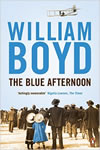 This was an impulse purchase ex-Surrey library (3 for 2 - how could
I resist?).
This was an impulse purchase ex-Surrey library (3 for 2 - how could
I resist?).
I always like this author and I'm not sure why I don't read more. I guess they are always a little too poignantly sad overall. However, with this one, (as ever), I was totally gripped by the writing and the plot. Even in the opening chapters I was totally heartbroken (or maybe sick with frustration) alongside our heroine - an architect - as a wonderful building is destroyed out of sheer malice and spite. And that's only the set up to the real tale.... - Aftermath by Peter Turnbull [read by ]
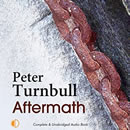 OK I may have said before - not my favourite author - so... why? Well,
terrible enough that I read the first one of his books by mistake (Peter
Lovesey/Peter Tremayne) - but I did the same thing AGAIN this time.
More excusable though - I selected two Peter Robinson talking
books to keep me amused on my trip to Cambridge - and in one choice
I was correct but I quickly discerned that this Aftermath was
the right title but not the right author!
OK I may have said before - not my favourite author - so... why? Well,
terrible enough that I read the first one of his books by mistake (Peter
Lovesey/Peter Tremayne) - but I did the same thing AGAIN this time.
More excusable though - I selected two Peter Robinson talking
books to keep me amused on my trip to Cambridge - and in one choice
I was correct but I quickly discerned that this Aftermath was
the right title but not the right author!
Unfortunately I found it as dire as ever and never got as far as listening to the actual DCI Banks story until I got home. [And after all that, the murderers were not brought to justice! How bad is that? really!]. - When the Devil Drives by Christopher Brookmyre [read
by Sarah
Barron]
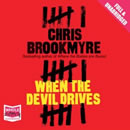 Finally got round to listening to the 2nd book in this trilogy - the
middle one - I read them out of order. Again another author I really
like, although I think maybe these books about Jasmine Sharp may not
be his dramatically strongest or most side-splittingly funny.
Finally got round to listening to the 2nd book in this trilogy - the
middle one - I read them out of order. Again another author I really
like, although I think maybe these books about Jasmine Sharp may not
be his dramatically strongest or most side-splittingly funny.
Several days after having listenend to the epilogue - where things were wrapped up - I realised what the last sentence ("she was not her sister") actually meant. I had imagined it meant not the same character as her sister instead of which it was (clearly even if not to me) literal.
Now you will have to read it... 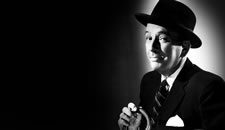 A Bullet at Balmain's - A Noel Coward Mystery
A Bullet at Balmain's - A Noel Coward Mystery
Marcy Kahan's Noel Coward playing the sleuth in post-Liberation Paris, this time. It's 1948 and Coward is in Paris to play the lead in his own play 'Present Laughter' - in French - which is amusing enugh of itself. Add in haute couture, existentialism, jazz . . .
Stars Malcolm Sinclair as Noel Coward, with Eleanor Bron and Tam Williams as his devoted staff.
Posted on July 31, 2016 at 11:57 PM
« Previous entry | Main | Next entry »Thursday June 30, 2016
Books in June
- Raiders of the Nile by Steven Saylor
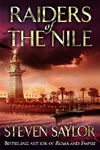 I struggled a bit getting through this - but it is excellent that Saylor
has moved back in time and given Gordianus not only a new lease of life
chronologically but can also explore the younger version of the character.
He has done well I think - most noticeable to me was a greater emphasis
on the young man's sex life, which although of little interest to me
personally (!) has to be a major driving force of an adventurous young
man in his 20s. He also has the struggle between his obvious love (as
well as then lust) for Bethesda and his sense of propriety required
between a man and his slave.
I struggled a bit getting through this - but it is excellent that Saylor
has moved back in time and given Gordianus not only a new lease of life
chronologically but can also explore the younger version of the character.
He has done well I think - most noticeable to me was a greater emphasis
on the young man's sex life, which although of little interest to me
personally (!) has to be a major driving force of an adventurous young
man in his 20s. He also has the struggle between his obvious love (as
well as then lust) for Bethesda and his sense of propriety required
between a man and his slave.
It's easy to accept the concept of slavery and "benign" masters in the context of Ancient Rome but maybe we should not be so accepting, given the not uncommon reports of modern day slavery in our country even today. - Gallows View, A Dedicated Man, A Necessary End, The Hanging Valley
by Peter Robinson
I always knew there were books associated with the Inspector Banks TV series but it never occurred to me to read them before now. It is interesting to see how different the TV character appears to be from the man in the books. It is possible they have tried to keep the fundamental "man" in the drama but his personal circumstances differ quite a lot - at least in these first 4 books. I seem to remember Aftermath being one of the TV shows and that is quite a long way into the series of books so maybe the circumstances change.
Again these earlier books were from the 1980s and it is once again interesting to remember the forensics of the time (or lack of) and other things commonplace now but unavailable then - the most obvious is the internet when you are thinking of investigation, but also mobile phones which changed a lot of the dynamics in thrillers - in fact you often find in modern thrillers that the mobile phone "cannot get a signal" at crucial moments, which although maybe true to life is only a device for the purposes of the plot
However.... the most noticeable thing for me in these books was the constant references to smoking and drinking! I was actually alive and holding down a job in this era and I do not remember it being at all like that. Quite astonishing the police seem to drink HUGE amounts - several pints over lunchtime and scotch or gin (or whatever was on offer) at every social interaction, with each other and with people they are interviewing. References such as "he had 5 pints but that's not very much for him to be drunk" - blimey I would be under the table.... And I suppose it's not so much that this might be unrealistic - either at the time or even now - but that it is referred to so much in the text. They are either in the cafe eating teacakes and coffee or in the pub with pies and a pint (or vice versa...).
As to the smoking - very much of its time of course. I started work when smoking was allowed in offices, though it's hard to remember what that was like, and about 5 years later it was stopped. Banks himself tries to give up in book 1, moves to a pipe in book 2, gives up and goes back to cigarettes in book 3 - has a minor dalliance with cigars - and all the while is endlessly debating while visiting witnesses and suspects whether or not it's acceptable to smoke in their houses..... and invariably does so, bewailing the unbiquity of non-smokers these days.
After all that you can see I have not mentioned the story lines very much - however they were certainly very good, but overall simply police procedurals. I wonder if they improved over the years to deserve the subsequent awards and accolades from the likes of Ian Rankin. Hence very much looking forward to reading more (though maybe a bit of a break after 4 on the trot).
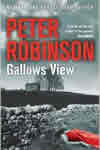
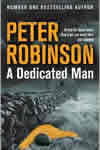
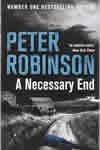
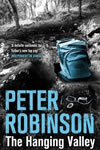
- Die of Shame by Mark Billingham
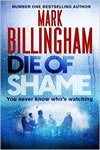 This
is a stand-alone story where Mark (may I call you Mark?!) has the usual
reader resistance (me) to new characters. However it did not take long
to become wholly absorbed in the story. Actually the new detective is
not very sympathetic - but she is interesting - I think Mark has tried
for a very different type of person here and needs to get a bit more
underneath the character he has created if he intends to introduce her
in more books. At the moment she has traits and a domestic life. The
other characters however are much more fleshed out; in fact none of
the characters (the suspect list essentially) is very sympathetic but
they are all utterly fascinating.
This
is a stand-alone story where Mark (may I call you Mark?!) has the usual
reader resistance (me) to new characters. However it did not take long
to become wholly absorbed in the story. Actually the new detective is
not very sympathetic - but she is interesting - I think Mark has tried
for a very different type of person here and needs to get a bit more
underneath the character he has created if he intends to introduce her
in more books. At the moment she has traits and a domestic life. The
other characters however are much more fleshed out; in fact none of
the characters (the suspect list essentially) is very sympathetic but
they are all utterly fascinating.
Mark has also moved to a structure for the book of moving between two separate time frames, chapter by chapter. I have to admit I cannot remember if he has used it before but here it is very evident. In general I find this a gripping technique but also annoying - I am following one thread and then it stops - I get into the next one again and then I'm moved back. It is used much by Peter May, and Joanne Harris - and it cannot be denied, does work.
There are references in passing to the characters we already know - but the appearance of Tom Thorne for 5 minutes at the end is simply wonderful, leaving you in absolutely no doubt that justice will be served. [I rather wish that the same could have been said about Rush of Blood. I had hoped he would come back to that in some way in a later book to tie up the loose end. I like my fictional murderers to be bang to rights....].
Mark receives much praise from others about his observational detail on the characters - which is well-deserved - and he reminds me of Camillieri in this respect. The descriptions are so splendidly visual that they could almost be used a stage directions to move them straight to a dramatisation. - Agatha Raisin and the Blood of an Englishman by M C Beaton
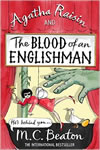 I have run out of things to say about Agatha. The book was hugely enjoyable
as usual, though I should have read it at Christmas time.
I have run out of things to say about Agatha. The book was hugely enjoyable
as usual, though I should have read it at Christmas time.
What I will write though is: I was finally able to catch the TV depiction of her but I was a bit disappointed. I can completely see why they did what they did but it lost its charm for me. Although the books were written not so very long ago and in keeping with the time, they reflected a village society from a slightly lost era, which I felt was rather the whole point: Agatha thrust into this gentler (maybe... apart from the murders!) society with all her "modern" towny ways. However they have been revamped and - plausibly - brought up to date for the TV - and completely sanitised. Everything is a bit toned down - Agatha is less childish, selfish, promiscuous... just less; what happened to her Brummie background, accent and general insecurities? And although the actress playing Mrs Bloxby (oh - and it's all Christian names in the TV show) is excellent I regret the loss of her genteel character and importance as Agatha's "only" friend - and the Reverent Bloxby is just someone else entirely. Roy is a far more reasonable chap on the TV, less self serving and more competent at his job - and rather than simply camp, is explicitly gay which he was not in the novels (as I remember it) and not because of any general inappropriate reticence on the part of the author.
Lots of complaints about the show by other readers like me - but possibly not fair because simply as a TV show it is passingly amusing. The critics seem to like the idea of Penelope Keith playing Agatha as she did in the radio productions - but even though age essentially precludes her, I am not sure she is my perfect Agatha either. However finding my own suggestion for an Agatha is more difficult than it seems - all my ideas are for women about 20 years too old.... so far in the right age range, I find Samantha Bond, Tamsin Grieg....  Death at the Desert Inn - A Noel Coward Mystery
Death at the Desert Inn - A Noel Coward Mystery
More of Noel Coward as a sleuth.
The Desert Inn was the scene of one of Coward's greatest cabaret triumphs, and makes a great backdrop for "a highly probable Noel Coward Murder Mystery" .
Stars Malcolm Sinclair as Noel Coward, with Eleanor Bron and Tam Williams as his devoted staff. also features Judy Garland... (Belinda Lang).
Lots of fun. P Division
P Division
Condition Purple: another of the police procedural series set in Glasgow, from novels written by Peter Turnbull. Good bread and butter crime stories - this one originally published in 1989. I listened to Two Way Cut earlier in the year.
Ralph Riach as DS Ray Sussock, Martin McCardie as PC Hamilton, Gerard Slevin as Reynolds, Martin Cochrane as DCI Donoghue, Gaylie Runciman as Karen, John Buick as DC King, Frank Gallagher as DC Montgomery and Alex McAvoy as Tuesday Noon (I think he's an informer!).
Posted on June 30, 2016 at 4:33 PM
« Previous entry | Main | Next entry »Tuesday May 31, 2016
Books in May
- The Best Man to Die by Ruth Rendell
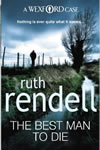
I am pretty sure this was not one of the books I read in the 1980s but I am pretty sure I remember the TV adaptation - strangely mostly remembering Barbara Leigh-Hunt in a relatively minor role.
Still very much worth the reading, and very amusing to see - even on the written page - how different forensics were (and also how much lighter the traffic on the roads was) in 1969 when it was written. - Fell of Dark by Reginald Hill
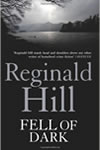 This book interested me a great deal in a number of diffferent ways:
This book interested me a great deal in a number of diffferent ways:
It was set in the Lake District around Keswick and Cockermouth, which is so much more meaningful to me after my visits to Woolfest.
It was written in 1971 - era of my youth - though one could well imagine that in general the environment may have changed less there than elsewhere in the past 40 years.
It was similar in theme and construction to The Thirty Nine Steps: we have a hero (well maybe not so heroic in the mould of Hannay - a 1970s anti-hero perhaps) on the run for a murder he did not commit; it is somewhat episodic as he moves from one temporary haven to another; and the setting makes it similar to Scotland in the early part of the 20th C; the final scenes have him captured and in danger to the last.
Reginald Hill makes all this a cut above the average - almost a psychological thriller - and makes me yet again very much regret his passing. - The Long Kill by Reginald Hill
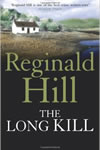
Another book set in the Lake District - what can I say? - I'm addicted.
Another psychological thriller, this one published in 1986 and using the pen name Patrick Ruell. I have read some reviews critical of the book, comparing it unfavourably with other offerings or suggesting it should be shorter. As it is the book is not very long, and I loved the descriptive narrative about the environment; I see it all as part of telling a good story - and especially this story - not just all hinged on a thriller plot for its entertainment value.
I also read this was made into a film - translated to the US - but was not very successful; I think that's a shame as I'm sure the plot and landscape could have made a cracking thriller - and I like the lead actor Bryan Brown more than a little. - The Gabriel Hounds by Mary Stewart
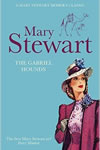
With authors like this, I always find that I so enjoyed the previous thriller that it's hard to take up a new heroine with changed circumstances. However, a few chapters in and you are totally engrossed all over again, and having finished the book, keen to get on with the next one. In this context the habit of including a chapter of the following book at the end of the volume works very well. From reading this taster I am fairly sure I read Touch Not the Cat years ago - but cannot remember the plot in any detail so I will be pleased to read it again even if that's the case. 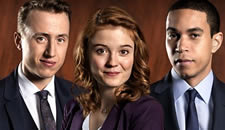 Silk: The Clerks' Room
Silk: The Clerks' Room
Very well thought through radio plays spawned from the TV series. The clerks were pretty key to the Silk stories and stand up pretty well without requiring Maxime Peake as part of the cast. In fact not having her character appear is probably necessary to the dramatisation, as it keeps the hub of the action where it belongs rather than making it seem like "just a spin-off from a TV show". The stories were interesting and very suited to a 45 minute format.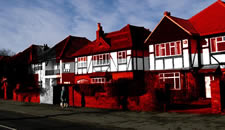 Denmark Hill
Denmark Hill
Typical Alan Bennett play but goes rather beyond dark humour to truly black humour. At one point I did wonder if there would be any survivors - and I was a bit disappointed with the ones that did make it, though I am guessing you were supposed to dislike them all. It was a bit all-round Hamletish (by intention and referenced heavily in the plot) which fits nicely with all the Shakespearian festivities around this year.
I have to admit I never thought of Hamlet as a comedy before, but now I see the possibilities.
Posted on May 31, 2016 at 12:58 PM
« Previous entry | Main | Next entry »Saturday April 30, 2016
Books in April
- Blood Sympathy, Born Guilty, Killing the Lawyers by Reginald
Hill
Reginald Hill wrote only 5 of these Joe Sixsmith novels in the 1990s - which is a shame as they are delightful - but I guess they are products of their time, so I am not sure he would have ever come back to the character.
Amusingly, and clearly written pre-1997, Gary Glitter is very much in evidence as a symbol of popular culture in the background of this story, which cannot but stand out as bizarre to current ears, and in a very different way than the original humorous intention. Much of the action takes place in the pub (The Glit) which is a shrine to the Glitter Band, (and all the harmless fun it once represented). At one point Joe ponders that his own version of God "likes Gary Glitter as much as Haydn" which may be true if we are speaking musically, (and for all I know may be true altogether since I know nothing about Haydn's personal life - but I read that he was a 'devout man of good character').
I read the final two books of this series in 2011, and these are the first three.
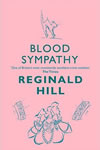
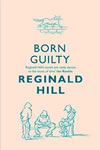
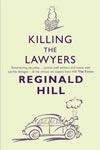
- Rat Race by Dick Francis
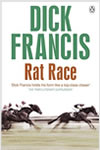 I'm amazed to find yet another vintage Francis (Dick) that I have not
previously read. The plot and writing were in the old tradition and
so it was interesting and thrilling as usual.
I'm amazed to find yet another vintage Francis (Dick) that I have not
previously read. The plot and writing were in the old tradition and
so it was interesting and thrilling as usual.
However, the part that really interested and impressed me was actually in the foreword, where the author explains that his wife Mary "in doing the research for the book" became so interested in flying that she took lessons, gained her license, and was commissioned to write a learners text book on the subject (!) "still in use today". And if that were not enough - the pair of them started an air taxi business (as described in the book) which they built up and then finally sold on. All I can say is some people are born hard working entrepreneurs.  A Decent Interval
A Decent Interval
Again I'm going to go on and on about what high quality adaptations by Jeremy Front these are - even down to the really clever and natural way that each episode gives us the "previously ......" information about the plot.
You have to catch them - next time round - or on iPlayer.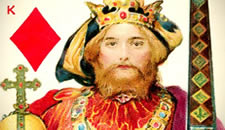 Galbraith and the King of Diamonds
Galbraith and the King of Diamonds
So in contrast, here was a series (many episodes) that was not only seriously dated (maybe almost in a Good Way) but also almost seriously bad (in a Bad Way). I've never been fond of Bernard Hepton (he should have tried his hand at comedy) and here he played Galbriath and thus was compelled to affect a (constantly slipping) Scottish accent. This play for radio is by Robert Barr - most well-known for z Cars and Softly Softly on TV - but actually a prolific writer for radio. There is a second play featuring Galbraith "The Midas Touch" - which after this I look forward to with.... interest...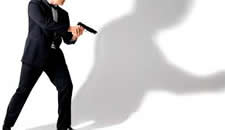 The Spying Game
The Spying Game
Four very worthwhile plays on the subject of espionage:
The Living Daylights by Ian Fleming. James Bond battles to rescue a trapped British agent, (and in which I learn that the film of the same name dismisses the entire plot of short story in the first few minutes.)
Max Is Calling by Gayle Lynds.
An idealistic CIA recruit is pitched against a cynical veteran.
The Red Carnation by Baroness Orczy.
A former Russian spy's loyalties are tested over an assassination plot.
A Demon in My Head by Jean-Hugues Oppel.
The struggles of a troubled spy suffering from crippling migraines. Rumpole on Trial
Rumpole on Trial
So these manifestations of Rumpole took me quite by surprise, and I did quite enjoy them. However - Rumpole for the modern world? - except that Rumpole is not of the modern world. I cannot imagine him as anything but a product of his time.
Overall they reminded me of the remake of Reggie Perrin - nothing wrong with it - very funny - excellent actors - just somehow not right.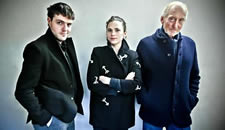 The Magus
The Magus
New radio dramatisation of the novel by John Fowles. This was such a cult book and such a long time since I read it - and a pretty odd book. My college tutor in the 1970s (when the revised edition was published, which was the version I read) thought it was marvelous and likened the plot to 'peeling an onion'. Like everyone else, I found the book very interesting - though I never thought or really clicked that the story is set in 1954; I think the locations make it somewhat outside of time.
It seems it was the first book Fowles wrote, and not his best in his own estimation though we all seemed to love it.... though of course it is the weird plot that fascinates us rather than the execution of the writing.
This version on radio makes an excellent play with a worthy and starry cast in the shape of Tom Burke, Charles Dance, and Hayley Atwell. Somewhat surprisingly, the much earlier film with Michael Caine was generally considered a failure. However this made me consider that maybe it's better suited to a radio adaptation as the story is very much from the "I"'s point of view - and on radio one is more clearly inside "I"'s head with his sense of unreality.
The reviews all say that the ending of the book is indeterminate, and Fowles resisted writing any subsequent conclusion - but my understanding was that the revised edition made it very slightly more determinate (if you were desperate for a "happy" ending), and the translation of the final lines also indicates an optimistic ending. This play on the other hand seems to lean towards a pessimistic outcome for the lovers in my opinion, with Nick mourning his loss to no apparent response; it's not at odds with the written ending but being acted out indicates a certain finality. There are also references to the author telling different readers whatever they wanted to hear, and this is very much in keeping with his experimental manner of writing - ie offering different scenarios all in one book (the French Lieutenant's Woman where Fowles offers different plot turns, and at one point writes himself into the story. I noted a similar idea in Ian Mcewan's Atonement, although the 'real' outcome in that story was made crystal clear, even if it bypassed my sister....).
Read this review - it's so much better then my own!
Posted on April 30, 2016 at 3:17 PM
« Previous entry | Main | Next entry »Thursday March 31, 2016
Books in March
-
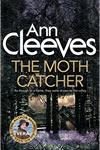 The Moth Catcher by Anne Cleeves
The Moth Catcher by Anne Cleeves
So - I'm watching Vera on the TV and see that the episode states "from the book by ..."; I smugly think "she has not written this book". However I'm wrong - it came out last October.
There were some fundamental plot changes, and the book has much more depth of course - I did read that the best thrillers on TV are ones written specifically for that medium and I think they are probably right.
Vera is a good dramatisation in its own right and Brenda Blethyn undeniably a good actress but I take slight issue with the depiction of Vera. Blethyn is older than Vera in the books and comes over as gruff - but also kindly and maternal, which does not really describe book-Vera. -
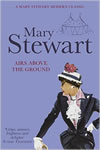 Airs Above the Ground by Mary Stewart
Airs Above the Ground by Mary Stewart
I spotted this in the library and was immediately transported back to my teenage years. I wrote about that in 2008 at which time I must have looked up the author - but did it all over again just now and found that she passed away in 2014 - but there are still quite a few books I have not read - in fact I think this one is the next one she wrote after the last one I read in about 1970.
I positively raced through it in true suspense novel mode; it was written in 1965 but was delightfully "modern". Loved it. -
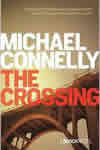 The Crossing by Michael Connelly
The Crossing by Michael Connelly
Always nice when the author brings his characters together - even as unwilling allies. I found it very true to life that after the estranged brothers had found each other, Bosch observed that although he had thought their families might become closer (with daughters of the same age), that it had not worked out like that. However, I do not really "feel" the emotional conflict of their jobs putting them on "different sides". I mean, as a naive reader, I am made to feel that they are both working for truth-justice-and-the-American-Way. However, the antagonism between prosecution and defence is clearly very true to life - and Connelly does bring it out well in the text, where we see Haller looking for ways to "work" the evidence rather than simply seeking for the truth, (and Bosch imagining that the truth on its own is sufficient to free an innocent man). -
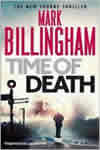 Time of Death by Mark Billingham
Time of Death by Mark Billingham
Well - I like Helen. Not sure I liked her suddenly having a past that I'd never heard about before, but the novel, plot and general tension and excitement were excellent.
I understand that we'll be seeing the author's work on TV again, with some reworking to enable us to see Helen in 2 stories and unencumbered by Thorne (regrettably in many ways but works better avoiding multiple actors playing Thorne over time). It seems the BBC have announced the cast with MyAnna Buring as Helen. -
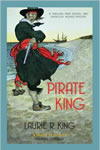 Pirate King by Laurie R King
Pirate King by Laurie R King
I can't say this ranks in my favourites within this book series. In fact it is quite interesting that I absolutely love some of the books and am less interested in others - usually I just like a series or not. In some ways that compliments the author in that she is obviously able to vary what she writes quite considerably - and I should say here that the books I like less are not in an way "duds" - just not to my taste. This one is a bit tongue in cheek - I have started the next one, which continues to be set in Morocco, so it will be interesting to see how much I warm to it - I am suspicious that it is the locations that affect my interest. -
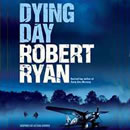 Dying Day by Robert Ryan [read by Stephen Pacey]
Dying Day by Robert Ryan [read by Stephen Pacey]
I continue to be impressed with Robert Ryan's exciting adventure stories. This one about spies, and again framed in two different (past) eras: WWII and some years later in post-war Berlin, covering the start of the cold war.
I suppose the basic theme - underlined by the title, even though its use is intentionally ambiguous - is "love" - though not simply romantic love.  The Net and the Canal
The Net and the Canal
Another story with Imelda Staunton as Julie Enfield. Not quite as dark as the previous one I listened to - but.... terribly dated.
The Net refers the world wide web and you forget just how much it was in its infancy in the 1990s. The hackers depicted are utterly implausible in their abilities and methods, (which for all I know might have been totally realistic but seem to me to be a clunky plot device and rely on the listeners at that time not understanding enough about computers or the web to know any different). Add to that - the play used interesting audio techniques to represent the hackers as being "on the net" which made them rather akin to a Greek chorus - and thus rather ridiculous.
But that's not all there was to it - so overall - quite fun.... Inspector Purbright
Inspector Purbright
Radio dramatisation of Charity Ends at Home based on a 1968 novel, [5th in the series of Flaxborough novels] by Colin Watson.
I'd never heard of this series before and was a bit taken aback by the general silliness, but they are really an acquired taste relying on recurring known characters - I am thinking, rather like Mapp and Lucia (of which I am a huge fan), so I can't afford to act too superior. I will end by quoting from Wikipedia on the key elements: gentle behind-the-times feel of a small English market town, the merciless targeting of the pretensions of the town's bourgeoisie, and a determination that whatever exotic trappings are used to decorate the plot, the central crime is always motivated by money
Posted on March 31, 2016 at 3:58 PM
« Previous entry | Main | Next entry »Monday February 29, 2016
Books in February
- A Study in Murder by Robert Ryan
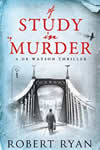 Another interesting dive into history, created with such imaginative
realism you would feel the author had experienced it.
Another interesting dive into history, created with such imaginative
realism you would feel the author had experienced it.
This time it's built around the POW camps - a subject much explored in respect of WW2 but realised I knew little about the camps in WW1. In fact the descriptions of the deprivations (unrelenting cold and pathetically small rations - which may seem relatively mild in the context) as experienced by the elderly Watson were very affecting and made me much sadder than the more overt horrors of that war.
The ending left me hoping that what unfolded was not really the case and that matters would be somehow reversed - akin to the resurrection by Doyle of Sherlock Holmes himself. - X by Sue Grafton
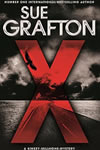 Nearly at the end of the sequence now, but Kinsey and her landlord are
as fresh as ever. There were a couple of plots running side by side
- and some of the side-story was a bit less obvious to a naive English
person with UK council-funded rubbish collections (putting your rubbish
in someone else's dustbin would be a little impolite but... a criminal
offence?).
Nearly at the end of the sequence now, but Kinsey and her landlord are
as fresh as ever. There were a couple of plots running side by side
- and some of the side-story was a bit less obvious to a naive English
person with UK council-funded rubbish collections (putting your rubbish
in someone else's dustbin would be a little impolite but... a criminal
offence?).
However the main plot was pretty scary and the repercussions maybe... resurfacing in another story?
X. - By Its Cover and Falling in Love by Donna Leon
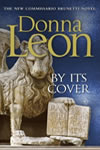
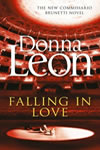
Surprised to find that it was well over six months ago I rediscovered the splendid writing of Donna Leon. These are the next 2 Brunetti novels, and just as wonderful as ever. -
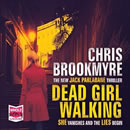 Dead Girl Walking by Christopher Brookmyre
Dead Girl Walking by Christopher Brookmyre
[read by Angus King and Kate Bracken]
More library dowloads. It's a Jack Parlabane novel - an old favourite so good to see what he's up to.
This was a bit of a departure - the book is written in two voices hence two readers, and it's all about a rock group, (and a murder!). I am assuming that music is a love of the author's (often the case with writers) and he conveys a great sense of the magic of the performing arts. 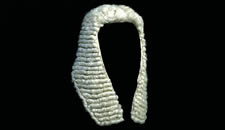 Rumpole
Rumpole
These stories make perfect short radio plays. Rumpole (made flesh for me by Leo McKern on the TV) is Maurice Denham. I drifted into looking at Mrs Rumpole - there were 2 TV actresses, but Margot Boyd played opposite Maurice Denham - though she was probably more reknowned on radio for playing Mrs Antrobus on the Archers (in an era when I listened to it...).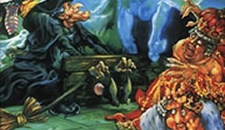 Wyrd Sisters
Wyrd Sisters
Most enjoyable (mainly owing to Pratchet's humorous dialogue scrambling up Macbeth and Hamlet) radio dramatisation from 1995 - stars Lynda Baron, Deborah Berlin, Sheila Hancock, Andrew Branch, John Hartley, Ian Masters, Kristin Milward.
Posted on February 29, 2016 at 7:18 PM
« Previous entry | Main | Next entry »Sunday January 31, 2016
Books in January
- The Critic, Blacklight Blue, Freeze Frame, and, Blowback by
Peter May
So I chomped my way through the Enzo series - having had them in the queue for a while now. I was amused that he had lined up all his entourage with him in the second book - and then he third - so I thought I saw how it was all going. But in fact he threw off the formulaic shackles for the next two, which I think from a writing point of view was clearly a good move, (though personally I missed "the gang").
Now awaiting the 6th and apparently final book - which apparently covers both of the two final stories that are the premise for the series..
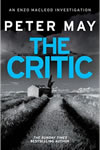
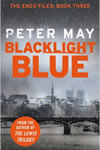
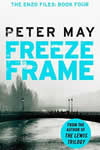
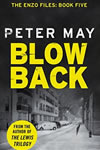
- Flesh Wounds by Christopher Brookmyre [read by Sarah
Barron]
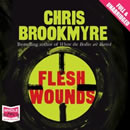
I dowloaded this from the library and then realised it was a sequel to Where the Bodies are Buried. This was "Good", barring the fact it's the third in a trilogy and I have not read the second one. That did not spoil the enjoyment though, and despite the fact that I read a few reviews which complain about the lack of realism in some of Brookmyre's work, I like the combination of humour and thriller, which in truth would be hard to achieve without some suspension of disbelief. [I also strongly agree with a review complimenting the author on his having several parallel plot threads that are properly woven together at the conclusion without any unduly forced contrivance].  The Provincial Lady Goes Further
The Provincial Lady Goes Further
I have heard of E M Delafield's Provincial Lady - but that's about as far as it goes. Excellent reading by Claire Skinner of the sequel to the original novel (I missed the first one which appeared over Christmas). Given the slow gentle humour, I think maybe an abridged version is not perfect for these books, but delightful nonetheless.
I had a quick look at the works and life of the author and found that I have also read Thank Heaven Fasting, as reissued by Virago - very impressive in that I remember it very well - but not at all light hearted.... Sparkling Cyanide
Sparkling Cyanide
This is a charmingly dated story but has been produced in different settings over the years including by Agatha Christie's own hand in "Yellow Iris" - which is a Poirot short story pre-dating this novel. A notable 2003 update for TV gave us Pauline Collins and Oliver Ford Davies mysteriously playing some sort of elderly secret agents, and making George Barton (Kenneth Cranham) a football manager - complete rubbish but I admire the effort.
I digress. This seemed to stick to the original story featuring Colonel Race (Sean Baker) - which makes slightly more sense of the story line when kept in period.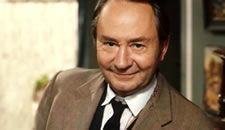 Hercule Poirot's Christmas
Hercule Poirot's Christmas
Two Poirots for the price of one. Astonished to see the famous detective played by none other than Peter Sallis! [Accent did tend towards Wallis from time to time].
Also Edward De Souza as Superintendent Sugden, Manning Wilson as Colonel Johnson, Cyril Luckham as Simeon Lee, Rachel Gurney as Lydia Lee, (good old) Nicky Henson as Harry Lee, Deborah Makepeace as Pilar Estravados, and (dear old) Deryck Guyler as Tressilian, the butler.
From the book first published in 1938 and dramatised by Michael Bakewell in 1986.
Murder in Mews(1955)
A production from the Light programme in 1955 - thought to be lost but redisovered last year. Stars Richard Williams as Hercule Poirot, Ian Whittaker as Freddie Hogg, Jack Melford as Chief Inspector Japp, Ronald Sidney as Detective-Sergeant Jameson, Duncan McLntyre as Doctor Brett, Monica Grey as Jane Plenderleith and Ella Milne as Mrs Hogg.
[ Dramatised by Anthony Aspinall from a short-story first published in Woman's Journal in 1936, which later appeared in a book collection in 1937]
Posted on January 31, 2016 at 10:09 AM
« Previous entry | Main | Next entry »Thursday December 31, 2015
Books in December
- Hide and Seek by Ian Rankin
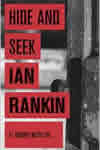 Another early Rebus novel - the second in the series. Excellent of course,
and I will just leave you with the blurb:
Another early Rebus novel - the second in the series. Excellent of course,
and I will just leave you with the blurb:
"In a crumbling housing development, a junkie lies dead of an overdose, surrounded by signs of Satanic worship. John Rebus could call the death an accident--but won't."
The dead man's last words seem to have been "Hide! Hide!" - thus as a nice touch the book is spattered with Jekyll and Hyde references. - We Are All completely Beside Ourselves by Karen Joy Fowler
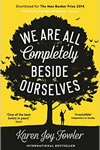 I am very keen to write about and strongly recommend this book without
giving away any of the plot. It's easy enough to find out what it's
about if you want to, but the author has written it in a specific way
so that you see things distinctly from one point of view before taking
in the situation in a more objective way.
I am very keen to write about and strongly recommend this book without
giving away any of the plot. It's easy enough to find out what it's
about if you want to, but the author has written it in a specific way
so that you see things distinctly from one point of view before taking
in the situation in a more objective way.
I felt it was about family relationships and although in some respects this family shows all the normal parent/child tensions and conflicts, they are doubtless deeply screwed up. No-one seems to be easily to blame for this even though there's a lot of blame flying around.
The Guardian review calls it a "moral comedy" and cites the Larkin poem about Mums and Dads. It is charming and heart breaking, and written in the first person, the narrator is both endearing and humorous - else it would be too bitter to read.
All I can say is that it explores a subject that I have always been very interested in - and written about here in the past - but it has made me see it in a completely new light, and maybe I should not have been quite so blithely enthusiastic about scientific research with only human curiosity as its driver.  Death in the Fifth Position
Death in the Fifth Position
A murder mystery by Gore Vidal - how could I resist? Even when written under a pseudonym of Edgar Box.
This was "Book at Bedtime" and read by Jamie Parker, and abridged and produced by Jill Waters.
You can find the original book here.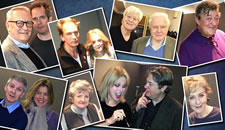 Matchbox Theatre
Matchbox Theatre
Highly recommended by Robert (and now me) - a Martin Jarvis production of Michael Frayn's short comically philosophical dialogues and monologues, exploring how we attempt to communicate with one another.
It's in four parts with an all-star cast: Joanna Lumley, Roger Allam, Charles Edwards, Sophie Winkleman, Lisa Dillon, Alex Jennings, Martin Jarvis himself, - and David Attenborough spoofing a wildlife commentary in person for a change.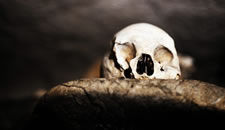 The Truth Is a Cave in the Black Mountains
The Truth Is a Cave in the Black Mountains
Alison told me she was currently reading a Neil Gaiman book, so I was interested to listen to an abridged reading of this novelette.
Inspired by a Hebridean myth, it's a tale of revenge for a terrible crime, although at first it seems to be a morality fable about greed for a pot of gold in a cave on the Misty Isle.
Bill Patterson is the absolute perfect reader for this, with his soft Scottish accent making the story all the more chilling.
[ Abridged and produced by Karen Rose.]
Posted on December 31, 2015 at 11:10 AM
« Previous entry | Main | Next entry »Monday November 30, 2015
Books in November
- Deadly Election by Lindsey Davis
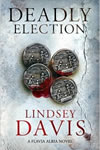
By the time I read Enemies at Home, Helen had already got her hands on this, the latest book, (a signed copy!) while at the annual Bloody Scotland International Crime Writing Festival.
I think I liked this book a little better than the previous ones, but there is a certain style - also evident in the Falco books that I do not like. It's a sort of street-wise cynicism and way of thinking which I do not find convincing or appealing. - Bones Never Lie by Kathy Reichs
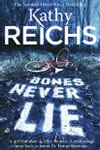
I'd forgotten how we left Tempe and Ryan in the previous book, but glad to see them back on track; in fact their soap opera life rather than the actual plot line is of great interest to me. That's a bit unkind as some of the plots I find fascinating (like Cross Bones which I would have been riveted by even without the thrills and spills involving Tempe). This is story takes them all over the place geographically and was ... fine ... but I did not feel thrilled by the action and was not caught up in the sense of the danger with the renaissance of an old nemesis. - Hiss and Hers by MC Beaton
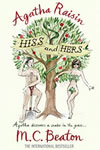
Again I turned to other reviewers to check against my own thoughts; it seems we all think this is a tired franchise. I don't mind formulaic plot lines but there is nothing truly new here. Some readers commented as I had always thought that these books are really novellas ie short, so I was not tempted to abandon the read. However I think one key point for me was: new readers (had not read previous books in the series) commented that none of the characters seem very likeable - and I do not think that was true initially - maybe Beaton finds them less endearing herself now and that comes through. The other key point - now that Agatha's huge personality is no longer so novel in itself - it becomes much more apparent that all the characters lack depth, and you feel they are interesting enough to be treated a little better in the writing. - The Burning Man by Christopher Fowler [read by Tim Goodman]
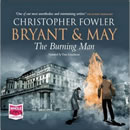
As I read this, I was not keen on the way that Arthur seemed to be increasingly "unwell". It then began to dawn that he was not likely to be magically recovering - and then found out that this is written as the last in the series...! A bitter blow as I feel there are lots of aspects to explore with these characters and in sharp contrast to the series above, the characters not only have great depth (all of them not just B&M) but also the author intentionally does a lot with the back story to make each book appear fresh. Fowler's blog entry as he has just finishing the writing the book is very clear - he leaves the door open for more (just a sliver) but basically as a commercial writer this series does not offer him much - a lot of effort for a few though loyal obsessives like me...
He says in the blog from 2014 that he is very pleased with the writing and I would agree with him - it is an excellent swan song for the detectives - though very sad for all the rest of us.... 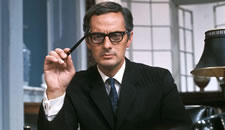 Cast In Order of Disappearance
Cast In Order of Disappearance
As I am so fond of Francis Matthews (still grieving) I was interested to hear him as Charles Paris in this play of Simon Brett's work. It's from 1984 and played totally straight. Matthews comes over (in all things) as a "thoroughly decent chap" so does not fully bring to life the rather dubious qualities of the hero.... however, a good play nonetheless. An Amateur Corpse
An Amateur Corpse
Having listened to the above I am now wholly convinced of how brilliant Bill Nighy is as Charles Paris. He has is utterly convincing as the weak willed, and clearly attractive hero.
Of course, he is helped along more than a little by the dramatisation courtesy of Jeremy Front. He brings a whole new and modern dimension to the character with great wit and (presumably added) contemporary jokes. How to Survive the Roman Empire by Pliny and Me
How to Survive the Roman Empire by Pliny and Me
Radio dramatisation by Hattie Naylor, inspired by the famous letters of Pliny the Younger; Kieran Hodgson as Pliny, and Nigel Barrett provides the narrative in the persona of Venta the slave.
It is a humorous offering but conveys how deeply threatening it was to live in Rome under the emperor Domitian - especially when he sends you a gift.....
This is written in a very contemporary manner but worth noting that the actual letters of Pliny themselves are also very readable. The Psychedelic Spy
The Psychedelic Spy
This is a weird and wonderful offering written by Andrew Rissik in 1990 but set very convincingly in 1968. Interesting to hear Joanna Lumley and Charles Gray - with James Aubrey as the hero, Lisa Rowe-Beddoe as his girlfriend, and Gerald Harper as Sir Richard Snark (his evil boss - clue's in the name). Clearly influenced by early James Bond and the era of psychedelic drugs. Lucky Jim
Lucky Jim
Lovely to hear this all over again read by Martin Jarvis.
Part of R4 Extra marking the 20th anniversary of the death of Kingsley Amis. Lucky Jim was his first novel written in 1954 while he was himself a junior lecturer at Swansea, and provides a classic satire of university life.
Posted on November 30, 2015 at 10:47 AM
« Previous entry | Main | Next entry »Saturday October 31, 2015
Books in October
- Refusal by Felix Francis
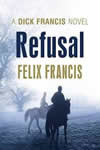 It's good reading more about Sid - and he has moved on - from being
single and from being a PI. And even better there are hints about where
he may go in the future.
It's good reading more about Sid - and he has moved on - from being
single and from being a PI. And even better there are hints about where
he may go in the future.
I think Felix is doing a good enough job with the franchise and I enjoyed the book. But. Always a but.
He writes the thriller parts well - they are pacey and exciting - and he does well to stick with themes around the race track. However his writing about all things emotional (sex/love type "emotional") is simply awful - suddenly becomes like Mills and Boon. He'd really do better to not talk about it at all in any direct way...and ... just a little tip.... don't ever talk about your hero's "manhood" - unless you actually mean his manhood of course, and even then it's suspect.
In fact - having his heroes in nice steady relationships is probably the start of the problem. Dick (or Mary's) books managed to convey real aspects of love, longing and sex, but were always laced with a bitter-sweet poignancy. And that poignancy came from the actual (and often weird) domestic life set up for the hero, not from the excellent way with words - the prose could have written itself. I suppose this does come from Mills and Boon (or great books like Brideshead!) - there is nothing that tugs more on he heart strings than people in love who cannot be together, especially if self inflicted for the "moral" good. - Tooth and Nail by Ian Rankin
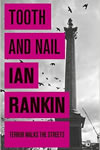 There are quite a few of the early Rebus books I have not read - and
with this one I did not even register the title as being familiar. It
is "Rankin does serial killers" - and like everything else
- he does them well.
There are quite a few of the early Rebus books I have not read - and
with this one I did not even register the title as being familiar. It
is "Rankin does serial killers" - and like everything else
- he does them well.
I did find it hard to relate to a guy from Glasgow not being understood in London - I mean literally understood, as in, his speech. But Rankin says he based this on his own experiences in London in the 1970s - and despite my finding it hard to believe - the 70s were a very long time ago. - The Burning Room by Michael Connelly
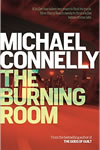 Despite the title, this wasn't really about "the burning room"
- there are several strands to the story of which that was one.
Despite the title, this wasn't really about "the burning room"
- there are several strands to the story of which that was one.
We are introduced to new characters <tick>, and left wondering if Bosch is bowing out <cross>, which I imagine won't be too popular with his reading public, even though he really is of an age when he must retire from the police force.
Connelley's next book (The Crossing - and already available) is predictably part of the Mickey Haller series, but it seems it brings all his recent characters together - wise move I think. - Miracle Cure by Harlan Coben [read by Eric Meyers]
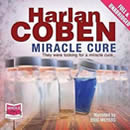 For some reason it took me a very long time to finish this book. One
thing is that I was pretty clear from the start "who dunnit"
- and not only who but also why, and thus most of the layout of the
plot, which then became dull as it unfolded.
For some reason it took me a very long time to finish this book. One
thing is that I was pretty clear from the start "who dunnit"
- and not only who but also why, and thus most of the layout of the
plot, which then became dull as it unfolded.
I had little empathy with the characters, and, through no fault of the author, I was especially turned off by a baseball connection. The key Good Guys had a positively sickening romantic attachment.... etc etc.
Maybe I'm just and old grump. 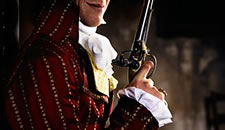 The Scarlet Pimpernel
The Scarlet Pimpernel
An excellent reading by Damien Lewis of an abridged version of the novel by Baroness Orczy.
In listening to this I was surprised how faithfully it was followed by the 1934 film with Percy played by Leslie Howard (known to me mostly from Gone with the Wind, although at the time he was the well-established "star" and Clark Gable was the unknown <but we don't give a damn>).
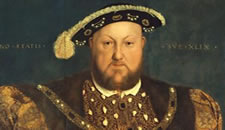 Sovereign
Sovereign
Radio dramatisation of the C J Sansom novel with Justin Salinger as Matthew Shardlake, joined by Bryan Dick, Melody Grove and Geoffrey Whitehead.
This adaptation by Colin MacDonald is excellent - and apparently he adapted two other Shardlake novels as well, though I seem to have missed out on them.
 Bitter Medicine
Bitter Medicine
A great radio dramatisation of the Sara Paretsky novel with Sharon Gless as VI.
Although I am very fond of Kathleen Turner - I always felt she was a bit underrated - this 1990s version with Gless was far superior to the 2003 version with Turner.
I never saw Turner's screen version of VI (and it was not popular I believe) but the radio version was completely awful. Terrible accent (which was probably a very authentic Chicago - I would not know) and fast talking "witty" dialogue which was not very amusing and too wise-ass to be credible (to me).
But I should not talk all about the shortcomings of some other version but rather focus on high praise for this one. Miss Marple's Final Cases
Miss Marple's Final Cases
Three new Miss Marple's with June Whitfield. Based on the short stories:- Tape Measure Murder
- The Case of the Perfect Maid
- Sanctuary
And then I listened to a Murder at the Vicarage from 1993 - a plot I know only too well but very good nonetheless. Design for Murder - A Noel Coward Mystery
Design for Murder - A Noel Coward Mystery
So... Noel Coward as a sleuth.
Certainly a very entertaining concept from Marcy Kahan, and an opportunity for everyone to do their best impressions of not only Coward but also in general the 1930s affectations of theatrical luvvies.
Stars Malcolm Sinclair as Noel Coward, with Eleanor Bron and Tam Williams as his devoted staff.
Lots of fun. She
She
Interesting to hear a serious portrayal of the book starring Tim McInnery.
One of my early memories is going to the cinema, on my own as I remember it, to see Ursula Andress as She (actually in Lancing when astonishingly we had our own cinema in the village*). Described elsewhere as "a travesty of Rider Haggard's epic adventure novel", it was a lavish Hammer Horror - but nonetheless rated certificate "U" in 1965.
* In fact at one time we had 2 cinemas in our little village, the other building being still very clearly an unused cinema when I was young. It was an ever-present subject of poignant nostalgia for my Mother who lost her first husband in a car accident the very day after seeing The Best Years of Our Lives there.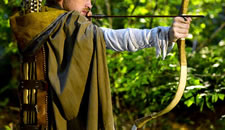 The Legend of Robin Hood
The Legend of Robin Hood
Great English hero Robin Hood's adventures take him from May Day revels in Sherwood to crusading battles in the Holy Land - and back again to a life and death struggle with the Sheriff of Nottingham.
A very interesting play by John Fletcher (no not that one) which draws on the original Robin Hood ballads and stories and knits them together to make a pleasing drama. From 1992 this stars John Nettles as Robin, Norman Rodway as the Sheriff of Nottingham, Michael Tudor Barnes as Friar Tuck, Gerry Hinks as Little John and Tamsin Grieg as Alice.
Posted on October 31, 2015 at 8:28 PM
« Previous entry | Main | Next entry »Wednesday September 30, 2015
Books in September
- Enemies at Home by Lindsey Davis
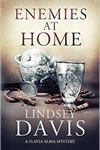 Discussed at length with friend Helen and - no - these books are definitely
not as appealing as the ones about her Dad. But... don't let that put
you off - still good mysteries by anyone's standards.
Discussed at length with friend Helen and - no - these books are definitely
not as appealing as the ones about her Dad. But... don't let that put
you off - still good mysteries by anyone's standards.
Helen suggests "Falco was just an exceptionally nice bloke". However, after this book, where Tiberius progresses as the love interest in Flavia's life... I am inclined to think that Davis' heart is more in writing men than women. Helen has not read this book yet - but is in possession of the third one (Deadly Election), since she picked up a signed copy while at "Bloody Scotland" where she listened to the author talking about her new protagonist. [And I now have a copy from the library]. - Break Down by Sara Paretsky
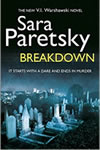 Working back through the novels I missed out.
Working back through the novels I missed out.
One of the threads in this novel illustrates the the problems of dealing with a friend who has mental health problems. I think it brings out a lot of key issues - we know and already like VI, we have sympathy with her and so we can feel and believe how really distressing it is for her to have to watch a highly intelligent peer and role model totally destroy their lives through manic depression. We also see how you can be a "good person" and yet still need to turn away from helping - possibly because you cannot really see how to help, or because there is an underlying fear of being swallowed up in the downward spiral of another's life.
And aside from all that - an excellent thriller. - The Slaughter Man by Tony Parsons
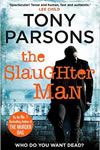 I read this second crime story by Tony Parsons as a book-book rather
than waiting for an audio version. It is in a similar vein to the first
(as expected), which might be described as gritty realism - or gratuitous
violence; I am never sure when reading stories about serial killers.
I guess it does put one in the gory-horror-voyeur category of reader,
and it's pretty useless to try and fool yourself otherwise.
I read this second crime story by Tony Parsons as a book-book rather
than waiting for an audio version. It is in a similar vein to the first
(as expected), which might be described as gritty realism - or gratuitous
violence; I am never sure when reading stories about serial killers.
I guess it does put one in the gory-horror-voyeur category of reader,
and it's pretty useless to try and fool yourself otherwise.
However it is a good thriller, emphasising the very real dangers that face our police force every day, however low key a situation may appear initially, (though the reader did find herself mentally shouting "wait for backup, wait for backup" several times during the story). The plot was a tense and classic whodunnit while the domestic life of our hero continues to stir the emotions in the way intended. - Flesh and Blood by Patricia Cornwell [read by Lorelei
King]
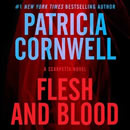 Hot off the press (as it were).
Hot off the press (as it were).
Was this better than the recent books? I think marginally "yes". There is slightly more emphasis on the crime and less on the endless drivel about Scarpetta's luxurious properties and home life - with her fantastic abilities in home cooking and obsession with fresh ingredients. Still a lot of paranoia though - and this is even self-referenced by the character, along with an allusion to her mellowing. - The Bleeding Heart by Christopher Fowler [read by Tim
Goodman]
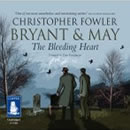 I continue to love these books no matter how convoluted the plots become.
I continue to love these books no matter how convoluted the plots become.
Arthur Bryant is still the most colourful character - many of his statements seem so poignantly true to me, (I'm still trying to get to grips with the idea of being "old" - some of his observations made me laugh out loud). However we do not rely on only Arthur to carry the novel; other characters provide a lot of interest and complexity as well as the fun plot. 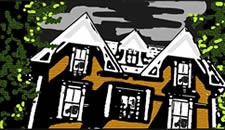 Crooked House
Crooked House
I read this Agatha Christie book as a teenager and have heard little about it ever since - but always remembered the plot very well. This is a radio adaptation in 4 episodes from 2008 with a cast to die for: Rory Kinnear, Anna Maxwell Martin, Anna Chancellor, Phil Davis, Judy Parfitt.
Wikipedia tells me it is one of only five* Christie novels to have not received a screen adaptation but one was "planned" in 2012.
* One of the other five is Death Comes as the End - which was the first Agatha Christie I ever read (on a beach in Spain aged 11) and I was totally hooked, even though it is absolutely like nothing else she wrote. I would love to see that story dramatised with a major spend on the setting (Ancient Egypt). Five
Red Herrings
Five
Red Herrings
Another 1978 radio play with Ian Carmichael again as Lord Peter Wimsey.
I have to say - old age etc - I found this very difficult to follow with its 6 suspects, 6 names, and nothing to distinguish any of them (!). Luckily, as this was broadcast in 8 (eight!) episodes which I listened to back-to-back, our hero was endlessly revisiting the plot and the suspects - and then finally telling us which one was "it". [No I can't remember...]. Whip Hand
Whip Hand
Like Many others I am sure, Sid Halley was among the first Dick Francis characters I came to know.
So I was very happy to find (on iPlayer) the radio dramatisation of this second novel about Sid with Mick Ford starring as the ex-jockey turned detective.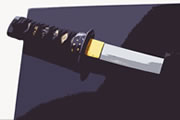 A Severed Head
A Severed Head
I read a lot of Iris Murdoch when I first went to college and I have to say I don't think I would have really understood much of it at the time, being neither of the social strata she wrote about nor with the experience to be in any way socially aware. This radio play was described as "based on the satirical, sometimes farcical" novel - ideas which had totally bypassed me when I read it - so I welcomed the opportunity to follow it through again.
Martin Lynch-Gibbon just wants to unquestioningly carry on in the same groove of his privileged life - including youthful mistress as well as wife - only to find himself pitched into some kind of surrealist universe when his wife announces she intends to marry her psychiatrist. Martin is constantly being exhorted with everyone else to behave in a "civilised manner" - when in fact it all the ridiculous psycho babble and partner swapping could not be more uncivilised. Stars Julian Rhind-Tutt as the long-suffering Martin, and Victoria Hamilton as his wife, Antonia.
Posted on September 30, 2015 at 2:20 PM
« Previous entry | Main | Next entry »Monday August 31, 2015
Books in August
- Critical Mass by Sara Paretsky
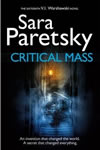
Once again - a very long time since I read this author - I was under the illusion that she had not written anything for a long time (like the gap in Amy Tan's work) but it's just my not keeping up. Based on the dates, it seems I have 4 to read since "Fire Sale" which I must have read in 2005.
So - back to this novel - I really liked the story. My memory of her previous novels is that they revolved around types of business fraud or insurance - possibly realistically what PIs get involved in - and then there's the twist which make a book into an adventure thriller. However this story had two themes of much more interest to me: one was historical (WWII) and the other was was Physics- its a novel about Science* ("...and then there's the twist which make it into an adventure thriller..." etc). I loved it.
I'm now all set for to read backwards through the ones I missed.
* I read that although the author is qualified in her own discipline of political science, her husband of 40 odd years is an academic professor of Physics. - Heartstone and Lamentation by C J Sansom
I found I had two books to read in the Shardlake series - and they were both great.
Heartstone was very interesting - and all about the Mary Rose, which of course I went to visit for my birthday this year - and Sansom seems to have been as much blown away by the experience as I was. As a historian it must be amazing to have such a spyglass into the life of folk from that period across all social strata. Plus - only a fraction of the artefacts have been fully examined currently, let alone put on display.
Lamentation, however, was my favourite of the two. I did guess the fundamental plot device in Heartstone, although not actually the "why". In Lamentation, I felt the plot was stronger. So now Henry's reign has ended but Shardlake carries on - given the fortunes of the main characters in this book, maybe Sansom is shaping up for a future generation of detective in a new era - who knows?
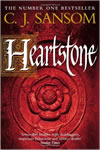
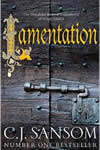
Posted on August 31, 2015 at 8:59 AM
« Previous entry | Main | Next entry »Friday July 31, 2015
Books in July
- Extraordinary People by Peter May
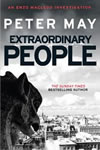
I started reading "The Critic" then decided it was better to read these Enzo Files in order - as there is a planned sequence of books right from the start (he's still working on the last one).. It has a whole different flavour compared with the Lewis trilogy - and lacks the poignancy. As a murder mystery it's a high quality offering but it seems to me that the writing for the Lewis trilogy moved on with much more of an underlying emotional thread, and this went even further with Entry Island. When I am done with Enzo, I look forward to the China thrillers. - The Orion Book of Murder edited by Peter Haining
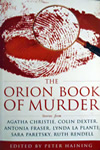
This is an omnibus of short stories - written prior to 1996 which is when this collection was put together.
The stories are collected in three genres: Crime, Detection, Punishment. Many well-known authors of the time are featured (Ruth Rendell, Graham Greene, Ngaio Marsh, Colin Dexter, Reginald Hill, Ellery Queen, Edgar Allan Poe, Arthur Conan Doyle, Ellis Peters and PD James) as well as some equally famous but from a much earlier era. Before each story the editor talks about the author, their era, and the detectives they created.
Peter Haining has also done other similar books, one of which I mentioned in BOM May 2012. - The Woods by Harlan Coben [read by Carol Monda and David
Chandler]
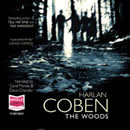
Relieved to find this did not follow the same theme I previously observed.... though we were revisiting history, and this was interesting to me as it was history from my youth as well as the characters portrayed.
I like the narration by two voices, and in fact I felt a lot of empathy for the female character as it seemed to me the great sin she had committed - despite the dire consequences - was not in itself such a terrible thing. However I can understand the subsequent burden of guilt - and here Coben expressly states another of his underlying beliefs that you should face up to your "indiscretions of youth", and take the consequences however bad or unfair that may turn out for you - and it is what you do after that which shows what kind of a person you really are. - The Murder Bag by Tony Parsons [read by Colin Mace]
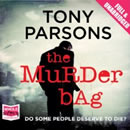
This was another random download from the library on the basis it sounded interesting (as it proved to be).
However I had to do a double take, because, yes this is the Tony Parsons - he of About a Boy et al - apparently venturing into a detective novel. I thought it was all a bit touchy/feeley for a police procedural - but excellent nonetheless. Already looking forward to the next one... [The Slaughter Man out in May this year].
Posted on July 31, 2015 at 8:46 AM
« Previous entry | Main | Next entry »Tuesday June 30, 2015
Books in June
- The Hidden Child by Camilla Läckberg
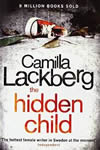
Sheila gave me this book and I thought it was not my sort of thing - and to some degree I was right - so I only just got round to reading it. As the blurb claims all sorts of things about the author's popularity, I felt the need to look up more details about her, and find she does seem to be very popular.
So all I have left to say is: it was a "jolly good read" and the plot was really very good I felt. I am still suspicious though, that I have a problem with translated text. I am noticing this more lately - I look back on books I have read - I find less of an issue with Camillieri for example - and indeed his translator has been especially praised for his excellent abilities in translating idioms - but in general I do find translated text problematic. - The Laughter of Dead Kings by Elizabeth Peters [read
by Barbara Rosenblat]
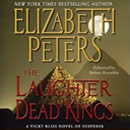
I picked up some Elizabeth Peters novels originally due to a similarity to the name "Ellis Peters" - not mistaking it exactly but some psychological effect of making one predisposed to like it. However after reading some of the "Amelia Peabody" series, I was not too keen, and in 2008 I also tried a contemporary (when written in the 1970s) "Vicky Bliss" novel <cite>Borrower of the Night</cite> - ditto I'm afraid.
Despite that, I chose this book, out of the somewhat limited offerings to download from the library, as a backdrop to my blanket project. It has worked out fine (on both counts) but I was very amused to find that this novel is the sequel to <cite>Borrower of the Night</cite>. Even more - unusual I think though the author would have it not so - unlike Sue Grafton's scrupulous attention to detail in keeping Kinsey Millhone series firmly set in the 1980s - this author has consciously decided to ignore the fact that Vicky first appeared in 1973, and writes her still as the same young woman in this novel set in 2008.
This seems to be the 6th and latest novel in this particular series and I do have to say I did enjoy the author herself being written into the action at one point - although I took a while to twig. - Six Years by Harlan Coben [read by Kerry Shale]
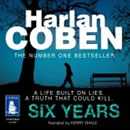
Having listened to and read 3 of these stand-alone novels by Coben I am beginning to see a pattern emerge.
It's not a bad pattern, and it follows themes that interest me .... always going back to a mystery in the past, people not being what they seem (even though you have known them for 10 years), and things working out ok in the end (phew).
However, and I hope this is just coincidence and it does not ruin every one of his books for you - they all seem to involve some kind of witness protection theme.... - W is for Wasted by Sue Grafton [read by Liza Ross]
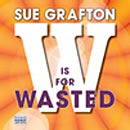
Back on track with Kinsey in the latest mystery.
Having been the poor girl brought up tough on the wrong side of the tracks by an aged-and-now-deceased aunt (or whatever - similar to VI Warshawski** I always thought - unencumbered by family ties) she seems to be picking up long lost relatives left right and centre. Anyway - none the worse for it, even though these relatives are rather trying...!
** I have not read any of this series for ages - I thought Paretsky had stopped writing them but I see from the time line that though there was a sizeable gap, there are now 4 just waiting for another 80s novel fest, similar to those below. My challenge for July - these novels take a little more concentration! - An Unsuitable Day for a Murder by Catriona McPherson
[read by Sally Armstrong]
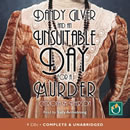 I'm sad to say this seems like the last of the Dandy Gilver novels I
will be listening to as I cannot find recordings of the later ones -
though they have been around long enough to have been created by now.
It's a shame as they are well-suited to being read aloud; however they
are really so good I will of course continue to read them - just be
unable to hear them.
I'm sad to say this seems like the last of the Dandy Gilver novels I
will be listening to as I cannot find recordings of the later ones -
though they have been around long enough to have been created by now.
It's a shame as they are well-suited to being read aloud; however they
are really so good I will of course continue to read them - just be
unable to hear them.
I found this novel very complex - and so may have been better reading it myself. It involves two families in the Montague and Capulet mould, and I had great trouble remembering which was which. Partly this is due to age - I know that sounds grim but I think it's not so much that you get easily muddled but more that you cannot be bothered to commit less important stuff to memory any more. Partly however it was actually the nub of the plot so I will go no further in explaining my problem - but as soon as I thought I had all the information firmly in my mind, there was another twist.... - Inspector Ghote Trusts the Heart by H R Keating [read
by Sam Dastor]
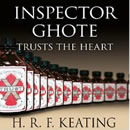
I enjoyed this story while driving to Woolfest. I like Inspector Ghote better than the other Keating protagonists - I suppose there is just as much tedious detail as in any other of his writings but it somehow seems to suit Ghote better. Here he is showing himself at his best both as a detective and as a human being - but gets little or no recognition or reward for it. We leave him with an uncertain future - so I need to find the next book! - The Jewels of Paradise and The Golden Egg by Donna
Leon
I don't want to be too snobbishly damning of other popular authors but reading Donna Leon's books again made me realise how wonderful her writing is.
The most amusing thing is that I got the "next two" of her books in order of writing only to discover that the Jewels of Paradise is not a Brunetti novel at all (Surprise!!) and even more surprising, it is the first one she has written in all this time that is a stand-alone novel. I notice that some readers said they were "disappointed" with the book but I was so captivated by people and plot that it did not dawn on me until about a third of the way through that Brunetti was not going to appear. Far from disappointed I thought it was wonderful and I hope she writes more - either with her new heroine or more stand alone novels.
It then occurred to me that returning to the police procedurals might be rather dull after that - but of course not a bit of it. They are also written beautifully as well as highly thought provoking - just as always.
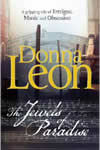
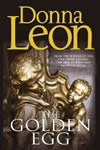
- Spider Bones (published as Mortal Remains), Flash and Bones, Bones
are Forever, and, Bones of the Lost by Kathy Reichs
I last listened to the "latest" book in this series in 2011, and since then none seems to have been published as audio books that I can get from the library. [In fact it seems that many titles I look for, for example, the Dandy Gilver novels, do not seem to be being published as audio books at all now - not sure what this indicates - lack of popularity of my favourite authors?].
Anyway I took the next 4 books out of the library and had me a Tempe-fest.
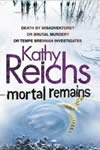
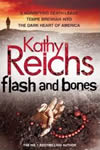
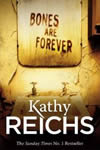
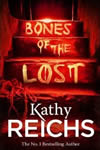
Posted on June 30, 2015 at 6:52 PM
« Previous entry | Main | Next entry »Saturday May 30, 2015
Books in May
- The Woman Who Died a Lot by Jasper Fforde
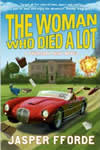
It's a very long time since I read my last Thursday Next novel*, by which time I was becoming tired of them. However this one seems substantially better - or I have left a long enough gap to become re-interested.
The plot is complex and entertaining (as usual) all the way through - and well worth reading. If I have any comment - apart from "haha that was hilarious" - I do feel that the ends of the books can lack the high qualities of the rest of the story. There's nothing actually wrong with the endings - they are usually happy and well-rounded - just that with this type of book I think his style is cramped by having to provide such an end, even though I am glad he does - I hate unresolved endings.
*I am guessing this may have been Something Rotten and I skipped a few books before this one. - The Bones Beneath by Mark Billingham
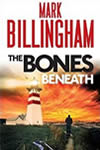
Great book as usual.
For me personally there was a "but". I did not really enjoy the Shakespearian-like tragedy of the story. You just knew.... everyone's fate was inevitable from the opening paragraph.
I suppose every Holmes needs his Moriarty, and for some reason every detective needs to be flawed. However I have never been able to empathise much with Thorne and his flaws - he seems a bit like Noddy - destined to carry on making mistakes and not learning.
Mark puts a lot of emphasis on the location used for this book (and maybe I do not like Thorne out of London) - he suggests in the author's notes and throughout the book how excellent it would be for a holiday; but having read this book I would not be so keen on a visit - despite the obvious beauty and peace of the place (and the events described are of course fictional).
[I took this in bookBook format to read on holiday - and I must say I missed the sound of Mark reading his own work...]
- Bring Up the Bodies by Hilary Mantel [read by Simon
Vance]
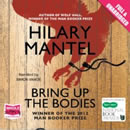
I saw the TV adaptation of Mantels first two novels - and it was excellent. So excellent that listening to this second book almost seemed superfluous - all the characters came to me as depicted. Of course there is a lot more detail, and I did note that (unlike the TV drama) we are prepared somewhat for the third novel and what we know to be Cromwell's ultimate fate. - The Lost Prophecies by the Medieval Murderers [read
by Paul Matthews]
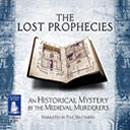
Another collection of short stories by the Medieval Murderers who are authors (and performers); you can read more about them here.
A mysterious book of prophecies written by a sixth century Irish monk has puzzled scholars through the ages. The Black Book of Bran* is said to have predicted the Black Death and the Gunpowder Plot. It is even said to foresee the Day of Judgement.
- Prologue: Kerry, October 574, by Bernard Knight
In which the book is created. - Act 1: Exeter, February 1196, by Bernard Knight
In which Crowner John confounds a band of treasure-hunters. - Act 2: Crimea, 1272, by Ian Morson
In which Nick Zuliani dices with death in a Russian blizzard. - Act 3: Westminster, 7th July 1325 by Michael Jecks
In which Keeper Sir Baldwin and Bailiff Simon Puttock investigate murder most foul in the abbey crypt. - Act 4: Cambridge, November 1357,by Susanna Gregory
In which Matthew Bartholomew and Brother Michael become embroiled in a bloodthirsty college feud. - Act 5: Shoreditch and Warwick, 1608, by Philip Gooden
In which player Nick Revill receives a letter from a mysterious uncle. - Epilogue: Yorkshire, March 2135, by C. J. Sansom
In which we confront the Day of Judgement.
- Prologue: Kerry, October 574, by Bernard Knight
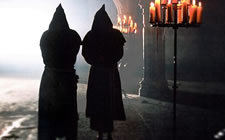 A Light on the Road to Woodstock
A Light on the Road to Woodstock
I have not read this short story before; it explains how Cadfael came back from the Holy Land as a soldier and ended up joining the abbey at Shrewsbury
Adapted from the books by Ellis Peters and read on Radio 4 extra by Nigel Anthony.
"Returning from the Crusades to a country he hardly recognises, Brother Cadfael finds intrigue and deception almost as soon as he lands in the court of his master Roger Mauduit."
Posted on May 30, 2015 at 7:03 PM
« Previous entry | Main | Next entry »Thursday April 30, 2015
Books in April
- The Innocent by Harlan Coben
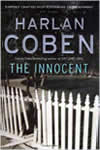
I've had this book for a long time - probably on "permanent" loan from Helen - and as I read it I felt some parts were very familiar, but I am certain I never read it to its conclusion in the past.
Anyway - another exciting thriller and makes me want to read more - but I cannot get enthusiastic about his Myron Bolitar series books simply because the hero is a former basket ball player (!). I really should just bite the bullet and read one to overcome my prejudices.
Or alternatively he has many other stand-alone novels I could pick from.....
- Bertie Plays the Blues by Alexander McCall Smith
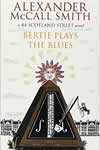
This is not the first in this "44 Scotland Street" series, but made perfect sense without the other 6.
Bertie is a charming (gifted) little boy of 7 who decides to put himself up for adoption on eBay. [An intellectual version of running away I think, but it remnded me of my Mother (in a less enlightened era perhaps) continually upbraiding my sister by telling her she was lucky to have parents and not be brought up in a "HOME" - and my sister privately thinking that a "HOME" without parents sounded rather nice (not knowing any better one way or the other I hasten to add)]
- A Deep Hole by Ian Rankin [read by Paul Thornley]
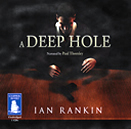
A short story beautifully told.
A road digger (Repair Effecter for the council’s Highways Department) is compelled to offer a favour to a local loan shark, who in turn is offering favours to others in the waste disposal business - a business where holes can come in very handy.
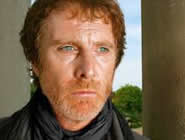 Baldi
Baldi
In this radio series David Threlfall plays Paolo Baldi, a Franciscan priest on sabbatical, lecturing on semiotics at a university in contemporary Dublin. After helping the police as a translator for an Italian witness, he turns sleuth. I listened to a couple of Radio episodes - The Million Dollar Question and A Very Neglected Fish.
And actually David Threlfall is uppermost in my mind as I so impressed by the recent TV drama: Code of a Killer* - I am lost for superlatives at how excellent it was. I remember the real life case being solved, and it seemed to me that the production was very true to the facts - as confirmed by Dr Jeffreys and Detective David Baker (now retired). Yet how tense and interesting it was - no foolish "sexing up" of the plot required - and none added.
[Not to mention the excellent dramatic portrayal of Noah shown over the Easter schedules.]
* <small digression> Maybe it's just because I am a Chemist at heart - I was very disappointed that Magdalen College did not manage to win the Universtiy Challenge final having got there with their two Chemistry students.... Paxman did suggest they did not have "broad enough" subjects and that the questions did not favour them - but Gonville and Caius are more than worthy winners - an astonishing contest this year. <end small digression>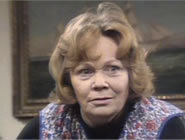 The
Mystery of a Butcher's Shop
The
Mystery of a Butcher's Shop
Listening to this radio play makes me think that Diana Rigg perhaps gave TV Mrs Bradley an air of gentility and sartorial elegance (not to mention a chauffeur) not present in the original books.
In these radio plays, vibrant character actor Mary Wimbush (known to me as Aunt Dahlia from The Laurie/Fry Bertie Wooster series) voices said lady - giving her a "hearty and disquieting laugh that unsettles suspects and listeners alike". [No really - it was rather weird]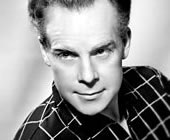 Paul
Temple and the Alex Affair
Paul
Temple and the Alex Affair
Yet again the criminal mastermind who seems to sign a set of mysterious murders with his name...
This one is crammed full of suspicious characters and red herrings, though unusually I did guess the identity of the nasty blackmailer before we were formally introduced.
Broadcast in 1968 this was to be the last in the series starring Peter Coke and Marjorie Westbury, displaying their exceptional skills behind the radio mike. [But by Timothy! there seem to be lots more of these "Affairs" and "Mysteries" for me yet to enjoy...]
Posted on April 30, 2015 at 9:43 PM
« Previous entry | Main | Next entry »Tuesday March 31, 2015
Books in March
- Bird in the House by Bronwen Griffiths
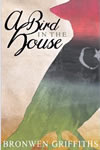
This is basically a sad little story about coming to terms with loss - but in fact I would say - about loss.
For me - not the sort of book I usually read at all (favouring retro escapist amateur detective novels). However, I did not feel tempted to abandon it - and the backdrop subject matter - Libya's (continuing) struggles for freedom - was all new to me and thus very interesting, despite the fact that to my discredit I take no more than a superficial interest in foreign politics.
The book keeps its feet firmly in the realms of reality with no happy endings - at least no happy endings wrapped up with a bow for the reader. The characters "move on" and one is left with the strong indication that there might be more positive outcomes for both the characters and for Libya. - After Midnight by Robert Ryan [read by Steven Pacey]
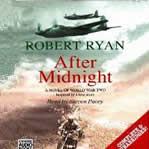
This exactly my sort of book, chosen because I so liked the "Dr Watson" books by the same author, although more an adventure thriller than a detective novel.
Set in the sixties and drawing on wartime experiences of the aviator hero, it provided a perfect accompaniment to painting the bathroom in France. (Probably how I came to spill the paint tray...).
- House of Silk by Anthony Horowitz [read by Derek Jacobi]
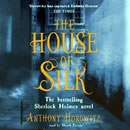
I had already read the book, and Rob gave me the audio book for Christmas (along with the newest book-book Moriarty).
So this month I had the pleasure of listening to Sir Derek reading it to me - mainly in the car. A very suitable reader as this is supposed to be written as Watson's final narrative. [His Scottish accent leaves something to be desired, though luckily it was only called upon for one character!]
Posted on March 31, 2015 at 7:38 AM
« Previous entry | Main | Next entry »Saturday February 28, 2015
Books in February
- Cat out of Hell by Lynne Truss
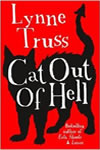
A very funny book indeed - really- laughed out loud.
Particularly relevant to anyone who at any time in their lives was a fan of Denis Wheatley's novels about black magic.* Also anyone who ever owned a cat, enjoys our foibles in every day speech ("have you had any thoughts?"), or anyone who likes dogs and Sherlock Holmes (am now determined to get dog and call it Watson).
* I read Wheatley's novels slavishly when I was about 12 - and then Robert and I read them aloud to each other (laughing a lot). I remember a journey to Scotland where Robert was reading to me as I drove, and found the text so tedious that he felt obliged to adapt it to include real-time incidents occurring on the road. - Moriarty by Anthony Horowitz
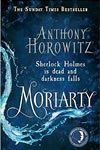
Another great book - I think, adding to the Holmes stories. Needless to say this is an imaginative novel, not just following with another hitherto unpublished story from Watson, but a new narrator in the form of a Pinkerton's agent.
I particularly love the opening chapter pulling apart the inconsistencies in the story describing Holmes demise at the Reichenbach Falls. [And - no - he is not simply showing off. The implication is that there is more to it all than we are ever told in the story - though I hasten to add this is not a plot spoiler and we do not explore what it might be that we are never told - not in this novel anyway].
- The Russia House by John Le Carré [read by Michael
Jayston]
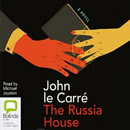
It took me a long time listening to this off and on while engaged on various projects. Carré's novels are very involved and are probably worth more attention than I give them. In fact I wonder if they are not so well-suited to being read aloud - the act of reading probably would involve me more with the text.
There is a good deal of exploring the psychology of the various players, and I did not find many of them very sympathetic - either a lack of imagination on my part or just a lack of experience in the environment described.
Posted on February 28, 2015 at 2:35 PM
« Previous entry | Main | Next entry »Saturday January 31, 2015
Books in January
- Chalk Circle Man by Fred Vargas
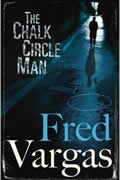
George read a review of this author's book The Ghost Riders of Ordebec and, since he had not come across her before, bought me the first in the series for Christmas.
I found it a very good plot with a really quirky theme (the chalk circles) without relying on bizarre serial killing type methods of death to provide the interest. Commissaire Adamsberg, I found less sympathetic and hard to understand - I think there is something about translated text - you can translate the words and the meaning but the culture described remains foreign.
- Entry Island by Pete May
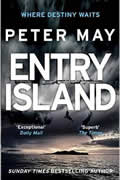
Another nominee for the Crime Awards, which I was keen to read after discovering the excellent Lewis Trilogy. I particularly like the historical storyline and contemporary detective plot that his novels seem to combine.
The synopses and blurb about this book seem to imply it has some superatural overtones - and although I would have accepted this, I was pleased that the book offered rational explanations for the events and memories.
Posted on January 31, 2015 at 6:49 PM
« Previous entry | Main | Next entry »Wednesday December 31, 2014
Books in December
- Died in the Wool by Ngaio Marsh [read by James Saxon]
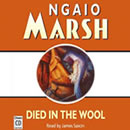
I don't know how long I've been listening to this on and off - add to which I have a suspicion I listened to it before, some long time ago. The reason it took me so long to complete it was that I was listening to it on a timer before going to sleep - and all that happened was I lasted about 2 minutes, so had to keep rerunning the same chapter over and over...!
That's not a judgement on the book though - it's quite a good plot; the characters are dated and brittle but I find that attractive.
- Dust by Patricia Cornwell [read by Lorelei King]
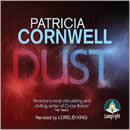
This by contrast was quite difficult to read. In fact I cannot really remember who actually dunnit. There seems to be a lot of conspiracy and paranoia coming out - and I look at reader comments (they can write better than I!) here and find the are all expressing exactly what I feel.
I really don't like to be unpleasant to an author but like all these folk I have read the whole series and - like them - I "want to like them" but:
...really gotten obsessive...full of internal monologues...needs an editor and a plot...like wading through mud...could have been a lot shorter if she took out all the psychology of how everyone else felt... lost it's freshness and I find I don't care for the characters any more...just plain not very good...
Which all leads me to this comment:
"excellent book if she had left out all the self indulgent waffle about food and restaurants and dogs and places she has been to in the past. I have also grown to really dislike her characters"
...and makes me think that maybe Cornwell needs to find some new characters to inspire her - there really is nothing left to explore with these ones.
[Like I find writing my blog - I do the same stuff every year (!) - but I am not a world reknowned author - that's my excuse.]
- A Christmas Crumble by M C Beaton
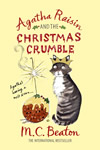
Well I could say the same kind of stuff as above about this short story - however they are written to a formula but still excellent fun. I guess Agatha Raisin seems very real - I can relate to her childish emotions in late middle-age - so unlike the grown-up Kay Scarpetta.
I think I can align Agatha to Enid Blyton's Noddy (I expect MC Beaton would be appalled) - Noddy is aimed at 3 year olds - it explores the world in a safe environment with Noddy doing "the wrong thing" and getting into trouble. Agatha is just the same - but aimed at the over 50s.
Posted on December 31, 2014 at 1:10 AM
« Previous entry | Main | Next entry »Sunday November 30, 2014
Books in November
- The Ides of April by Lindsey Davis
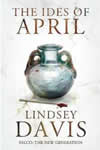
Here we find that Falco's adopted daughter has taken on the mantle of Public Inquirer and also taken up residence at the old homestead in Fountain Court on the Aventine. It is all plausibly well written and I enjoy the idea - and the fact that Linsey Davis is adding more scope to the Falco series.... but o there was something special about Falco and his daughter is simply not quite so special. I think for the same reason they have never quite been able to successfully capture his character on screen either - just not found the right man. - Saints of the Shadow Bible by Ian Rankin [read by James
Macpherson]
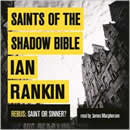
Delighted to be able to go straight into the next Rebus novel and see him alongside Malcolm Fox - I would say "working with" but they weren' 100% on the same side. Malcolm is definitely shaping up for a career move back ot CID.
[I listened while painting the ceiling of my newly resuscitated studio/office.]
Posted on November 30, 2014 at 12:19 PM
« Previous entry | Main | Next entry »Friday October 31, 2014
Books in October
Posted on October 31, 2014 at 12:18 PM
« Previous entry | Main | Next entry »Tuesday September 30, 2014
Books in September
- The Gods of Guilt by Michael Connelly
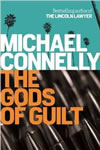
I didn't enjoy this Mickey Haller novel as much as the previous one - not sure why. I think maybe the story didn't interest me so much; not a straight forward evil person kills someone, but more of a government agency conspiracy theory idea.
Also - maybe mostly - there was a lot about his private life - and it's not going that well. The last book ended on a high with a prospective high profile career move in the offing - this book opens with all that shattered and his family blaming him. The same device was used between Lincoln Lawyer and Brass Verdict. But maybe more importantly, all the pontificating about his family is basically not very profound or interesting. The Bosch books seemed to go through this roller coaster cycle of ending one book on a positive note with respect to a new relationship and then that all having fallen through in the next book which would be in the loner detective vein - and ending on a glum gritty note - only to start the cycle again in the next story with a new female interest. [Actually I quite liked the "romantic" storyline as a background to The Drop where a new lady that seems promising reveals her feet of clay - all in the realm of normal hangups - during the progress of the book. It seemed to me to be more representative of relationships in later life - and also it was definitely the backdrop to the story not the main event - and the woman herself had a peripheral role in the action.] - The Dead Can Wait by Robert Ryan
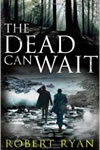
So impressed with Dead Man's Land I bounded straight on to the second novel which proved as excellent as the first. The plot was good and the action made historically feasible.
It also went some way to improving the depiction of Holmes (over the previous book), who appeared more in this story - though definitely as Watson's friend rather than the other way around.
I find it interesting that Doyle struggled with the character as he was such a dominant force in his writing. Yet the two modern novelists I know of using Holmes in this way, as an addition to the cast rather than it's main force, seem to have tamed him rather well, managing to keep the focus with their chosen heroes without being diverted. Nor is Holmes used as a "rabbit out of the hat" mechanism in resolving the mysteries - just reassuringly present. - Rules, Regs and Rotten Eggs by H R F Keating [read
by Sheila Mitchell]
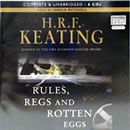
Another fairly dull or perhaps dated sort of story with a heroine I cannot empathise with. She seems to be a moderately high ranking detective and yet is portrayed as finding the Guardian Crossword too difficult. I don't want to be elitist but I would have thought cryptic crosswords would not be so hard for someone whose profession is.. well.. detection - even if she chooses not to bother with them. Still - Morse she is not - though come to think of it, she likes the odd glass of wine.
I am so apparently critical of these novels by Keating that you have to ask why I continue with them. The answer is they are not too challenging to concentrate on while doing other activities - driving or other physical activities. I don't say this to be insulting - they are good old fashioned detective novels, with all that implies, and maybe a bit slow so it matters less if you miss the odd sentence here and there.....
Posted on September 30, 2014 at 2:58 PM
« Previous entry | Main | Next entry »Sunday August 31, 2014
Books in August
- Ten-Second Staircase by Christopher Fowler [read by
Tim Goodman]
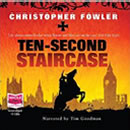
Working my way steadily backwards through the series, I finally get to the "famous highwayman case". I think I twigged the "answer" fairly quickly with this one, though no less enjoyable for that. The author has stuck to the apparently mysterious and impossible as fodder for the plots.... but some work better than others - though I am always suspecting that my view of the books I read can be affected by my own mood as much as the book itself. - Dead Man's Land by Robert Ryan
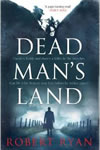
Following on from that thought - the first few months of the year found me a bit depressed and reading the first few pages of this book made me feel I could not deal with such a realistic portrayal of WW1. So although George gave me this book for Christmas, it has taken me until now to pick it up. However, it is a very good book indeed - perhaps my initial reaction to it says how really good it is.
George made an excellent choice, as this book brings together a lot of what are (apparently) my interests - the hero is an elderly Dr John Watson continuing his career as a medic on the front line. Like other books which work well using these Conan Doyle characters, it is not a Holmesian pastiche - the author stays true to the people he portrays while offering a different perspective - but somehow it is always clear when an author's affection for the original materials comes through and I do not find any false notes here to spoil my pleasure in the book. - Bloodline by Felix Francis
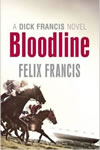
I had a quick look at other reviewers opinions on this book (ordinary folk like me). They were mixed but whether they were enthusiastic or disappointed, there were some general points coming through with which I agree - I was just having trouble pinpointing them on my own... First and most important - this is better than the previous books and I would recommend it - and despite any negative points below it is well up to the Francis tradition.
Second, the formulaic "interesting job" of the hero is a TV racing commentator, and this aspect is really interesting and well integrated into the story.
But then - third - the characters: one person said he "lacks the empathy apparent in the writing of his father" (though I would question whether it was his father or his mother that really influenced this), but whether because of this or not, the characters did not come across as very likeable; I don't know how you fix this as a writer but it needs fixing.
And finally, which I think might be an extension of point 3, the relationships and probably specifically sex is not well described - you don't really feel the emotion, and if you are going to have these themes then they certainly need to be convincing. Dick Francis books did not always have a conventional boy/girl romantic relationship as the core of the emotional interest - in one case it was the protective relationship of the hero with his brother that tugged the heartstrings, and in others, the hero is in an impossible domestic situation that he has decided for moral reason to just accept. Writing about these somewhat off-beat relationships is not at all easy to do while making the reader both believe in them as well as really feel them - but anyway I hope Felix gets to grips with it as he continues to write.
Posted on August 31, 2014 at 3:56 PM
« Previous entry | Main | Next entry »Thursday July 31, 2014
Books in July
- The Black Box by Michael Connelly [read by Michael McConnohie]

Harry Bosch presses on with his cold cases and finds one that involves a murder he picked up much earlier in his career, during the riots of 1992. The body of a female journalist was found in an alley and at that time Harry was forced to hand over the case to the Riot Crimes Task Force, knowing that it would never be solved.
- The Lewis Man and The Chessmen by Peter May
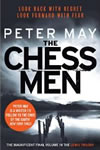
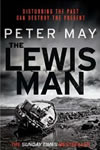 I can't believe I waited so long to read the rest of this trilogy when
I was so impressed with the first one. Yet it was April 2013 when I
read The Black House - and immediately downloaded the second in the
series - but did not read it. Anyway having got the taste for them again,
I read both in quick succession.
I can't believe I waited so long to read the rest of this trilogy when
I was so impressed with the first one. Yet it was April 2013 when I
read The Black House - and immediately downloaded the second in the
series - but did not read it. Anyway having got the taste for them again,
I read both in quick succession.
It was hard to see how he could make sequels (and continue to set them on the islands) after the first story but the crafting of the stories is great - and like the first book they contain interesting historical detail combined with the elements of a detective thriller. Really excellent books - shame that's it for these characters. 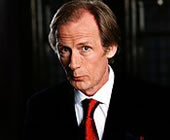 Corporate
Bodies
Corporate
Bodies
Bill Nighy as Charles Paris gets a lucrative opportunity to work on a corporate media piece - and finds a body... as well as getting his own share of the action in the shape of a general "roughing up" through to attempts on his life.
The characters and dialogue are very well written, and the experienced cast are very at ease with their roles in these humerous versions of the Charles Paris books..
Posted on July 31, 2014 at 10:08 AM
« Previous entry | Main | Next entry »Monday June 30, 2014
Books in June
- Standing in Another Man's Grave by Ian Rankin
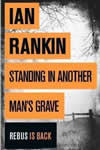
I failed to read the "final" Rebus novel - partly intentionally, as it was widely advertised and I was concerned about what might make it "final" in the light of the Remorseful Day. (Why popular detectives have to have dramatic ends and cannot simply retire. I do not know - well I do know - their authors have had enough of them).
Anyway - Rankin is up for more - and so are we.
This was a good and interesting plot - nicely weaving in an appearance from Malcolm Fox (the "Complaints").
I have to say I am no nearer understanding the character of Rebus - even after all this time. - The Drop by Michael Connelly [Read by Len Cariou]
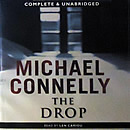
The Drop of the title is a reference to Harry's final retirement date in police vernacular. The cold-case plot (as there are really 2 plots) is particularly interesting as it results from a blind hit in re-examining some old DNA evidence using the latest technology - this leads to an impossible and possibly contaminated result pointing at a suspect who is far too young to have committed the crime. In addition - due to his reputation for high integrity - Harry is pulled into a political nightmare of a case checking out a suspected suicide (or is it?). - Inspector Ghote's First Case by H R F Keating [Read
by Sam Dastor]
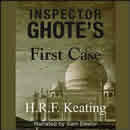
I started to listen to this on iPlayer but failed to keep up, so I borrowed the book from the library. It is utterly charming but I am slightly concerned that it is not very politically correct. I was driven to look into the author whom I only know of through this series, thinking he must be a relic of the British in India - but not a bit of it. He is the right kind of age (maybe) but in the same vein as Alexander McCall-Smith, Keating did not visit India until ten years after he started writing about it. I have no idea how it would seem to someone of Indian ethnicity, but it does seem to me it is written with affection and intelligence and hopefully is not seen as patronising or offensive.
This is one of the last Inspector Ghote books (published in 2008) but revisits his early career. - Into theValley of Death by H R Keating writing as Evelyn
Hervey [Read by Sheila Mitchell]
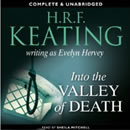
So I indiscriminately grabbed any talking books I could find to while away the journey to Woolfest. For me, this type of Victorian lady detective written by contemporary authors does not really hold much appeal (I say "this type" but clearly some types do appeal ...). Anyway it lived up to my every expectation and fortunately did not require too much attention while driving.
I note that Keating wrote it under a pseudonym - to enhance the "type" I think. - False Scent by Ngaio Marsh [Read by James Saxon]
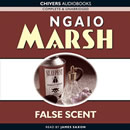
This Inspector Alleyn was delightfully dated with wonderful and improbably drawn, and rather arch characters.
In keeping with all that, the appropriate person "dunnit", and they all lived happily ever after. (Except the murderer of course).
It all centres around a prima donna, a bottle of scent and some paraquat (geddit?).  Busmans
Honeymoon
Busmans
Honeymoon
Ian Carmichael stars as Lord Peter Wimsey with Sarah Badel as Harriet Vane.
So - they tied the knot, and appear to make a comfortable couple. This recording features other great British stars with Peter Jones as Bunter, and Rosemary Leach (unmistakable) as "Miss Twitterton" - where the name says it all. Equally unmistakable is Peter Vaughan as the police inspector - who can forget the sinister Harry Grout in Porridge? Paul
Temple and the Vandyke Affair
Paul
Temple and the Vandyke Affair
Another delightful piece from 1959, starring Peter Coke and Marjorie Westbury.
One wonders at these criminal masterminds who feel bound to telephone all the players involved in their mysterious plotting, leaving their (false) names as a tantalising lead for the police and amateur detectives alike.
Can't remember who dunnit but charming nonetheless. [As I have said before, I love the depicted relationship between Paul and his wife - and I love the fact that she seems to have a proper job of her own - even if it is suitably ladylike.]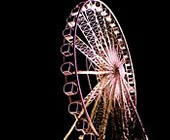 Beggars
Banquet
Beggars
Banquet
Readings of a collection of short stories by Ian Rankin.
- Face the Music read by James Macpherson
- Herbert in Motion read by James Bryce
- The Hanged Man read by James Bryce
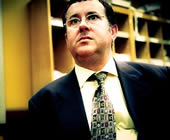 The
Recall Man
The
Recall Man
A set of 7 episodes by David Napthine, which sprang from a stand-alone afternoon play. Jeremy Swift takes the title role in these first 4 episodes.
- Doctor Joe Aston Investigates
- Making Waves
- Over the Border
- Stepping Out
Posted on June 30, 2014 at 7:12 PM
« Previous entry | Main | Next entry »Saturday May 31, 2014
Books in May
- Justice Hall by Laurie R King [read by Jenny Sterlin]
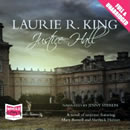
I thought I was up to date in my reading of this series, but somehow after Locked Rooms I missed this one - I think I mixed it up with The Moor (which I have read). So it was delightful to find an extra mystery to enjoy. I do find some of the stories work better than others though that may be whichever ones concern subjects that interest me most. This one has a lot of well-researched detail on WWI which was very moving and is particularly pertinent with all the commemorations this year.
I like the way the author manages to create plots which intertwine what seems a totally British Victorian institution with the Americas in an utterly convincing way (though - note to self - Conan Doyle's first Holmes novel was a plot within a plot where half the action took place in the USA so in fact quite in keeping with the original stories). - Gamble by Felix Francis [read by Michael Maloney]
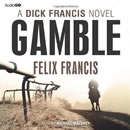
Finally I read one of Felix's books standing on his own merits - and he is well up to the task. I have read some criticisms with the obvious comparisons - but I think people are being selectively blind in this respect in that quite of the few Dick Francis novels were really not very good. He always followed his own formula and in the case of the personal lives of the heroes I always found him rather original and refreshing - his heroes often emotionally fettered but not with conventional home lives. However I found Dick only at his very best when racing came into the story somewhere - and here Felix seems to be following the pattern well. His heroes have very different careers but have either direct or indirect connections to the world of racing and this seems to give them an edge. I look forward to reading some more. - Paul Temple and the Kelby Affair
by Francis Durbridge [read by Toby Stephens]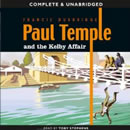
Another cheerfully dated Paul Temple novel. I am not sure entirely what the Kelby affair was - Kelby went missing near the beginning - but it was the usual complicated plot that saw me nicely through a long car journey.
Beautifully read by the excellent and versatile actor Toby Stephens, (who also narrated PT and the Geneva Mystery). - Dandy Gilver and the Proper Treatment of Bloodstains
by Catriona McPherson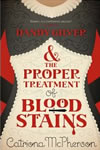
I am eking out these novels as I enjoy them so much on a number of different levels. However, I was not so compelled by this one - perhaps I am taking them for granted now and setting my expectations higher. Having said that, the unravelling of the plot turned out to be really interesting - it had been getting to the point where I could not see any way the events described could be explained, and was expecting some sort of cop-out. And then, in fact, it all fitted into place with a completely believable set of circumstances and motivations. 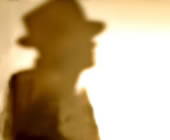 Resnick
Cutting
Edge BBC Radio Play
Resnick
Cutting
Edge BBC Radio Play
John Harvey’s thriller from 1996 starring Tom Georgeson and the-then-not-so-famous John Simm** plus Sean Baker, Kate Eaton and Paul Bazeley.
Actually I really fancy Tom Georgeson, wholly based on having first noticed him in a production of Tom Stoppard's Night and Day with Gwen Taylor at the Watford Palace in the early 1980s. This may seem odd to some as - with the passing of time - he has evolved into a comfortable character actor who appears frequently these days on TV in some of my favourite series (ie Poirot, Foyle's War - but also recently in the BBC's The Hollow Crown) - but I always see him as the jaded rough-diamond journalist Richard Wagner.
Currently the BBC are airing two more Resnick stories this month with another of my favourite actors Philip Jackson as the eponymous hero
**John Simm's fan club spotted that he was in this play - a fact which he initially denied - and I do believe his explanation (he did such a lot of stuff that he forgot) since it was not such an appalling early performance or drama that he would need to try and to wipe it from history.
Posted on May 31, 2014 at 11:10 PM
« Previous entry | Main | Next entry »Wednesday April 30, 2014
Books in April
- Bryant and May and the White Corridor by Christopher
Fowler
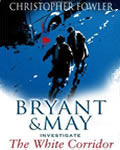
Now working my way back through the series.
The plotting (and writing of course) seemed to really work here. Nice descriptions of the team development back at base, as well as the noble efforts of the elderly gents trying - and succeeding - to survive, having been stranded in their car (van) on an A road in the snow.
I felt a real sense of danger from the inevitable murderer, as well as the weather - and a warning against trying to manipulate others through bogus occult dabblings, even with the best of intentions. [Clearly, real occult dabblings are fine... unless you are a fan of Dennis Wheatley]. - Harbour Street by Anne Cleeves
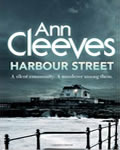
Very keen to read the latest Vera novel and it lived up to all my expectations. Great plot and great characters.
The new TV series started soon after and opened with this story. I was a bit surprised they changed the murderer (although it still made good sense of the story) and could not see why - however subsequent episodes were "made for TV" and one of those had a rather similar villain so I could understand the decision.
It is a bit of a shame that Vera is not really played as she is in the book, even though Brenda Blethyn has really made her her own woman. TV Vera has fewer layers of complexity - more police drama. I think they had the same problem with Inspector Frost, in that although the TV character was pretty awful, neither he nor the city backdrop were quite as gritty as on the page. Or as I understand it, the author had a problem with it - I was less critical and thought they did real justice to the books by making a single book into multiple episodes, while still managing to make it a series rather than a serial. - Crosssfire by Dick Francis and Felix Francis
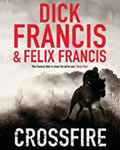
This was an exciting enough thriller which I read really quickly - so one might say "un-put-downable" - if you were not Pedanticus writing in the Guardian. This may sound grudging praise from me but it is not. There is some debate about the worthiness of Felix taking on his Father's mantle, but I think if there is anything to be said about it - or if there is no longer quite the massive readership there once was - it's probably because the taste for the Francis brand of novel has gone off the boil, rather than due to any change of authorship.
Anyway - quite as good as any stock Francis thriller in my opinion. -
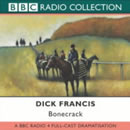 Bonecrack BBC Radio Play
Bonecrack BBC Radio Play
This is a BBC radio full-cast dramatisation of the Dick Francis novel, starring Francis Matthews, Caroline Blakison and Mark Colleano.
Fresh with the Dick Francis bug, I was attracted to this play as it stars Francis Matthews - and of course the excellent Caroline Blakiston. I have not read the book but the plot seemed a bit thin and the result pretty predictable ("spoilt brat finds Father Figure"). However, there was a real sense of menace, which was so strong that it was hard to see how our hero would manage to extricate himself. [Plot spoiler alert: "But he did"].
Posted on April 30, 2014 at 11:01 PM
« Previous entry | Main | Next entry »Monday March 31, 2014
Books in March
- Bryant and May and the Memory of Blood, the Victoria Vanishes,
and the Invisible Code
by Christopher Fowler
Determined to catch up with all the other Bryant and May outings. Excellent.
[Was less keen on the Memory of Blood - I didn't like the subect matter nor the technique used in unravelling the plot. However the latest, Invisible Code, was excellent and well worth its Crime Thriller award nomination.]
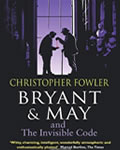
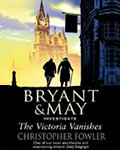
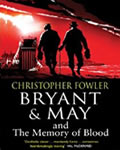
- StageStruck by Peter Lovesey [read by Steve Hodson]
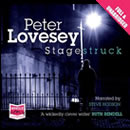
I would term Peter Lovesey as a good old fashioned crime writer - in the very best of ways. Don't mistake my meaning and think I mean nostalgic or twee; his books are very much in the here and now. But he seems to possess a solidity and high quality craftsmanship that one used to associate with a "Jolly Good Book". This one provided a welcome interlude and escape on my journeys to work during a period where nothing else seemed at all solid or reliable. -
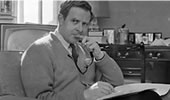 A Perfect Spy - with James Fox, Brenda Bruce, and Harriet Walter.
A Perfect Spy - with James Fox, Brenda Bruce, and Harriet Walter.
BBC full-cast radio drama of John le Carre's bestselling novel with James Fox as Magnus Pym. Apparently this recording (from 1993 I believe) was thought to be lost but then recently rediscovered - which is great, as it has a truly excellent cast including Harriet Walter as Magnus' wife and Julian Rhind-Tutt as the young Magnus. The character Jack Brotherhood is the unmistakable voice of the excellent James Grout who sadly died in 2012.
Posted on March 31, 2014 at 11:58 AM
« Previous entry | Main | Next entry »Friday February 28, 2014
Books in February
- Bryant and May on the Loose and Bryant and May off the
Rails
by Christopher Fowler [read by Tim Goodman]
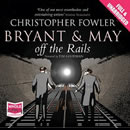
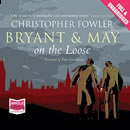 I was alerted this series when the "Invisibe Code" was nominated
for the ITV3 Crime Thriller Book Club Best Read and (of course)
was immediately taken by the heroes names. But they turned out to be
not at all what I anticipated.
I was alerted this series when the "Invisibe Code" was nominated
for the ITV3 Crime Thriller Book Club Best Read and (of course)
was immediately taken by the heroes names. But they turned out to be
not at all what I anticipated.
I think I was expecting Agatha Raisin meets Inspector Steine (both of whom I love) - something rather nostalgic and twee. In a sense they are much more "realistic" if that's not too ridiculous a description, given the basic premise of a forgotten branch of the police force whose two key officers are in their 80s, and who solve crimes using distinctly surreal methods. Far from a disappointment, these books truly appeal to my nostalgic leanings; the author uses the peculiar reminiscences and esoteric researches of Arthur Bryant to provide a QI style compendium of interesting facts - and if it starts getting too out of hand, reins him in using the other characters, (although I have to say he is in no danger of losing me as an fascinated listener).
And finally on top of all that as a mere background - he tells a jolly good crime story to boot. I love them. If I have any criticism at all it is that Bryant is such a great character he positively leaps from the page and seems more fleshed out than the others, though I feel this is resolving itself as each new book appears. I am guessing there is a kind of "Sherlock Holmes" problem with the character.
These two books brought the characters back in a "two book deal" after the closure of their premises in Mornington Crescent threatened an end to the Peculiar Crime Unit; the "Mr Fox" storyline is continues through both books - but no need to feel short-changed as it runs alongside a new plot in Off the Rails.
"The critically acclaimed cult detectives Bryant & May are the stars of ten deranged novels that explore London’s most arcane mysteries, from its hidden rivers to its secret societies." - Beneath the Bleeding by Val McDermid
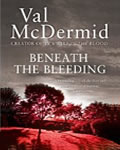
I haven't read many of this series but did do a marathon of the repeated "Wire in the Blood" series on TV. In this story, Tony is laid up in hospital and Carol pursues a serial killer. [Much less sensationalism than the TV thankfully].
I especially enjoyed the construction of the plot here - several threads in parallel and no predicatable connections - it is a thing about Val's writing (do you mind if I call you Val?) I really like. Many of the (TV) plots I've seen recently contrive very interesting and mysterious scenarios that are then a bit disappointing in the denoument; by this I mean the explanation is either blatantly inconsistent or just does not seem to be convincing in terms of human behaviour and motivation.
I noticed Val on TV a couple of times recently - once demonstrating her quiet superiority and intelligence on "Only Connect" - which is a pretty challenging quiz even when made slightly easier for the "celebrities". - Short Stories by Michael Connelly
Another example of the digital short story used as a marketing technique. So I duly purchased my three stories for 99p each plus their included "tasters" of newer novels. Excellent.
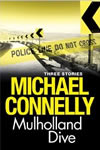
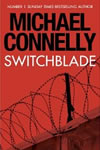
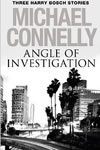
- Mullholland Drive: includes the stories Mulholland Drive, Two Bagger, and Cahoots - plus a taster of The Black Box.
- Switchblade: includes the stories Switchblade, Two Bagger, and Cahoots - plus a taster of The Gods of Guilt.
- Angle of Investigation: includes the stories Christmas Even, Father's Day, and Angle of Investigation - plus a taster of The Drop.
 I listened to another of the Lord Peter Wimsey BBC dramatisations "Murder
Must Advertise" on Radio 4 Extra. Lord Peter goes "under
cover" in an advertising agency - not altogether successfully -
and the author draws on her own work experience in this environment.
I was really keen to listen to this because about 10 years ago my friend
Helen lent me a boxed set of audio cassettes of this radio play. I listened
to the first cassette - but then when I moved on to the second I was
greeted to a jolly Highland version of "Marie's wedding" -
it was excellent but no match for Ian Carmichael. Helen concluded that
the real second cassette had somehow been left in the player in her
car - which had been taken away to that great car dealer in the sky
- so I was left with a cliff-hanger.... Until now.
I listened to another of the Lord Peter Wimsey BBC dramatisations "Murder
Must Advertise" on Radio 4 Extra. Lord Peter goes "under
cover" in an advertising agency - not altogether successfully -
and the author draws on her own work experience in this environment.
I was really keen to listen to this because about 10 years ago my friend
Helen lent me a boxed set of audio cassettes of this radio play. I listened
to the first cassette - but then when I moved on to the second I was
greeted to a jolly Highland version of "Marie's wedding" -
it was excellent but no match for Ian Carmichael. Helen concluded that
the real second cassette had somehow been left in the player in her
car - which had been taken away to that great car dealer in the sky
- so I was left with a cliff-hanger.... Until now.
Posted on February 28, 2014 at 11:57 AM
« Previous entry | Main | Next entry »Friday January 31, 2014
Books in January
- Revelation by C J Sansom
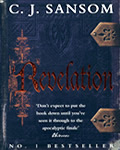
I took this with me to France - these Shardlake books are sufficiently exciting that I easily complete one in the week, and am always confident of a thoroughly good read.
This was no exception, providing lots of interesting period detail, and (particularly appreciated), notes at the end as to what is research and what is extrapolation. Here we have an element of the usual political intrigue but the nub of the plot overlaid on the Tudor background centres on a serial killer - a foreign concept in those times. This historical evidence for such crimes is thin - but one has to conjecture that it is because most of them would never have been caught - or if they were it was more along the lines of "he's a bit weird - he must have done it". - The Seven Wonders by Steven Saylor
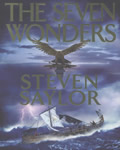
This is a collection of short stories from Gordianus' early life. It is set around a "coming of age" trip to see the seven wonders. I liked it, but I note that there are some criticisms by others. It is true that if you treat each story separately, some of them are better than others, but as an overall themed volume, I was quite satisfied. This is not the first anthology of Gordianus short stories, and I can see why authors find a place for them when they write "puzzle" mysteries, and they have ideas that are simply not sufficient for a full novel - for example the first Sherlock Holmes mystery is actually a story within a story in order to manage a full scale novel, and he fairs much better in short story culture. However, I think short story writing is a skill of itself and maybe "quite satisfied" is not really sufficient praise for Steve Saylor, when his earlier Gordianus novels are "quite excellent". It seems clear that in many of his tales he is quite inspired by historical events and the recent offerings have been lacking; I hope he finds more and better inspiration in the future - either within Roman history, or with a new hero who can cover other historial periods.  So...
this is going to be a bit patronising.
So...
this is going to be a bit patronising.
I recently listened to a vintage Paul Temple Mystery ("PT and the Lawrence Affair") from 1954, starring Peter Coke and Marjorie Westbury. I was expecting to like it with that delightful whiff of nostalgia, as well as having fun at the expense of the dramatic offerings of the day (you know: limited technical support and no CGI). However - not a bit of it. I had forgotten that this was an era when radio programmes were the height of mainstream drama, and I cannot begin to describe how good it was and how high a quality they achieved. I was especially impressed by the relationship as written between Paul Temple and his wife - which was somehow weirdly modern as well as strictly within 1950s non PC limits. I'd strongly recommend it if you get the chance to hear it again. [I would say - they can't do anything about the basic plot though - you have to live with that]. I listened to another of the Lord Peter Wimsey BBC dramatisations "Have
His Carcass". I like the stories which involve Harriet
Vane, and watched the TV adaptations with Edward Petherbridge and Harriet
Walter, but I don't think I have actually read this one. It's interesting
seeing or hearing different versions, as I think I was under the impression
that at he end of this tale they got the culprit bang to rights and
so on - but this rendition leaves it a little more open - which I am
guessing probably follows the book more accurately.
I listened to another of the Lord Peter Wimsey BBC dramatisations "Have
His Carcass". I like the stories which involve Harriet
Vane, and watched the TV adaptations with Edward Petherbridge and Harriet
Walter, but I don't think I have actually read this one. It's interesting
seeing or hearing different versions, as I think I was under the impression
that at he end of this tale they got the culprit bang to rights and
so on - but this rendition leaves it a little more open - which I am
guessing probably follows the book more accurately.
Posted on January 31, 2014 at 2:42 PM
« Previous entry | Main | Next entry »Tuesday December 31, 2013
Books in December
- Dark Fire by C S Sansom
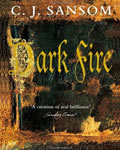
I enjoy these books more than I can really explain or understand why. True that I find the historical content and detail really interesting, but even though they are suspense novels I never expect to find them quite as absorbing as I clearly do. I don't reveal the time I take to read each book - just the month in which I finish reading; however, I think I have read each of these Shardlake novels within just a few days of starting. Not all people find Sansom's writing style quite so compelling but I find I can't put his books down.
The Dark Fire of the title is a pretty interesting historical mystery in its own right, involving alchemy and mysterious long lost chemical formulae. - Caught by Harlan Coben [read by Carrington MacDuffie]
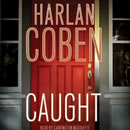
This is the first Harlan Coben book I have read. Apparently, he is well known for his twists of plot, and this book is no exception - very thrilling with at least three twists at the end, only one of which I was expecting - and I suspect my guessing it was the author's intention in any case. I shall definitely seek out more of his work; however, most of his other books are part of a series, which I am prejudiced against as they have a sporting bent. Sports themes do not appeal to me very much. [Horse racing clearly "ok" for me though - sport of Kings and so on...]. - Thorne at Christmas by Mark Billingham
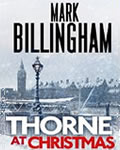
I think this is really good idea. A couple of short stories, delivered in ebook format only, at a budget price, and with a seasonal theme.
I am sure that if you count the words, the cost is the same as a full novel; however, for some reason, I seem unwilling to pay authors for their work (ridiculous I know!- you can see, most of my books come from libraries or are loaned by friends). Anyway, this was an entertaining idea and made me part with my money for a change.
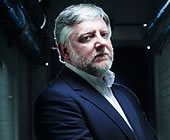 From
the BBC I listened to a dramatisation of John
Le Carre's The Honourable Schoolboy with Simon Russell Beale
as George Smiley. It was part of The Complete Smiley on Radio
4 Extra, but I could only manage to listen to this one story. Such rich
books condensed into a short format need more concentration than I can
manage (while knitting). I had just watched the recent film of Tinker
Tailor (again) on TV, followed by a reshowing of the BBC series from
1979 with Alec Guiness, so I decided to forgo the Radio version. However,
I did not realise how many Smiley books there are - so maybe I will
read some of the others in full.
From
the BBC I listened to a dramatisation of John
Le Carre's The Honourable Schoolboy with Simon Russell Beale
as George Smiley. It was part of The Complete Smiley on Radio
4 Extra, but I could only manage to listen to this one story. Such rich
books condensed into a short format need more concentration than I can
manage (while knitting). I had just watched the recent film of Tinker
Tailor (again) on TV, followed by a reshowing of the BBC series from
1979 with Alec Guiness, so I decided to forgo the Radio version. However,
I did not realise how many Smiley books there are - so maybe I will
read some of the others in full.
Posted on December 31, 2013 at 4:54 PM
« Previous entry | Main | Next entry »Saturday November 30, 2013
Books in November
- A Question of Belief and Beastly Things [read by David
Colacci]
by Donna Leon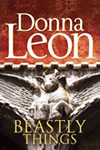
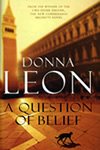
As usual excellent themes binding the stories together in each book - and as usual there are two layers of the crimes - one layer poignantly sad, sympathetically illustrating all human weakness, and the other demonstrating the despicably evil depths of human nature.
Annoyingly true to life, in the Question of Belief, the morally guilty party disappears without facing justice, (and it's debatable what laws he actually broke in person).
In Beastly Things the we are led to believe the murderer will face the law in due course. However, the strong sub plot (if it can even be called that - shall we say the background to the murder story) may influence you never to eat meat again. Alison told me she was forced to skip passages in the reading - I listened to the narrative in the car, and was not able to skip any of it.... - The Impossible Dead by Ian Rankin [read by Peter Forbes]
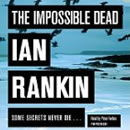
Initially our hero is leading his Internal Affairs team to follow up on suggestions of wider corruption in another police force after one of their number if convicted. However, Malcolm is drawn into re-investigating a 25 year old cold case, which seems to involve a cover-up at the highest levels within the force. A nicely interwoven tale of the type we can rely on from this author.
Malcolm Fox is still in "the complaints" but since it's a fixed assignment role, we find him considering his abilities to take up a post in CID once again. Clearly (I hope) this is shaping up for future books with wider potential for the story lines. - V is for Vengeance by Sue Grafton [Read by Liza Ross]

This book seems to be a slight departure in the author's writing style - or maybe it's evolving. Much of the story is from the perspective of characters other than our heroine. The author has certainly done this before but maybe not to this extent. I really enjoy the fresh approach in a book series, where the author can maybe avoid getting trapped in a sequential narrative.
Unusually, some of the organised crime "baddies" seem to achieve an apparent happy ending (you have to assess for yourselves how "bad" they actually are - though pretty bad is my assessment, even though my sympathies were with them) - whereas the author seems to have a truly zero-tolerance attitude to shop-lifting. The latter I suppose is to point out to ones such as I that shop-lifting is not a "soft" victimless crime but simply stealing, and someone has to pay for it.
Posted on November 30, 2013 at 12:58 PM
« Previous entry | Main | Next entry »Thursday October 31, 2013
Books in October
- He Who Fears the Wolf and When The Devil Holds The Candle
by Karin Fossum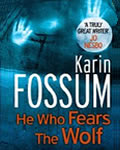
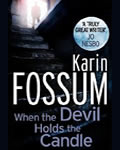
The second Inspector Sejer book, delighted me from the first - having not so much a surprise ending as a surprise beginning. And I can't say more without spoiling the surprise (beginning).
The end was pretty good as well - one of those simple solutions where there was all the evidence given to you but still a "whodunnit" nonetheless.
I have seen mixed reviews about lack of characterisation, which may be true, but I felt it was a good detective story.
The third book is (impressively) yet another completely different plot line albeit with what seems to be the usual poignant and sad resolution. Sejer's personal life is looking up but his chosen lady is a bit of a challenge to his rather staid nature. - As the Pig Turns by M C Beaton
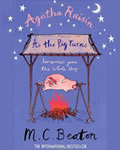
"Someones gone the whole Hog".
Sorry - I can't do better than the blurb on the book cover. (Well not in terms of puns anyway). Agatha manages to stop the locals chomping into what would have been a spit-roast human - recognising it as such only by means of a tattoo (!). I have heard that roast humans do look like roast pig (so-called "long pigs" in The Coral Island - read by me at an impressionable age).
All the same.... - Where the Bodies Are Buried by Christopher Brookmyre
[read by Sarah Barron]
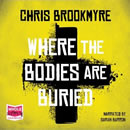
This is apparently a departure for Brookmyre in that he is aiming for less gory satire and more down-to-earth thriller. He seems to have been successful - I did notice it was not as "funny" as his previous novels - in one of which I found a description of a self-decapitation side-splittingly funny - which it has to be said is not "normal"...
So he has gained something and lost something in equal measure.
This is a pretty good police procedural thriller. But not so funny. - The Dying Hours by Mark Billingham [read by the author]
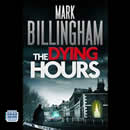
Loved it. (Though creepy).
Having a bit of difficulty with Thorne himself though. He is back in uniform and not enjoying it. I found his reaction to his difficulties a bit hard to understand. I guess I never understood the character that well in the first place - which is my fault not the author's.
I do like the current developments in his personal life though. I hope he is not destined to be one of those detectives who are permanently unable to settle with one woman - the current woman has a lot going for her. - Djibouti by Elmore Leonard [read by Nick Landrum]
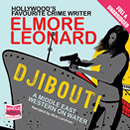
As usual, the book has interesting characters and was pretty educational - for me - and being about Somali pirates is also pretty apposite as it references in passing the hijacking incident which has inspired the recent Tom Hanks film Captain Phillips.
Leonard is one of my favourite authors - so I was doubly dismayed at somewhat belatedly realising that he passed away this year.
Posted on October 31, 2013 at 10:24 PM
« Previous entry | Main | Next entry »Monday September 30, 2013
Books in September
- Clutch of Constables by Ngaio Marsh [read by James Saxon]
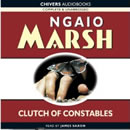
I have temporarily abandonned Montalbano as in-car entertainment - and gone back to the delightfully dated Inspector Alleyn.
This is a locked room mystery with Troy taking the active role on a boating excursion in what we would now call "Constable Country", where she is apparently co-incidentally - at many levels - sharing the craft with an internationally famous criminal ("The Jampot" - need I say more).
Alleyn takes the role of narrator, using the story as a classroom teaching example to new recruits as part of their training. - Even Money by Dick and Felix Francis [read by Tony Britton]
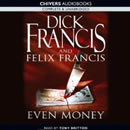
A lot of Felix in this book I suspect - but written before Dick passed away. I enjoyed it a lot - it's about a trackside bookie and I found the background pretty interesting.
It led me to see if Felix was continuing to write - and he is. I read only the synopsis of reviews of his first novel and they mentioned his lack of first-hand racing experience - which is a blow really. Dick ventured into other fields but I always felt his racing plots were the best - in fact some of the non-racing themed books were distinctly ropy. So I hope Felix progresses with his writing without being too bogged down with negative comparisons to his Father, though from what I can see he has a very loyal fan base. - A Spot of Bother by Mark Haddon
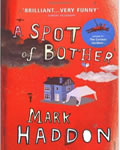
This is a very funny book which had me clutching my sides laughing out loud - but pretty black humour really. The title is a pun - with the spot being both literal, (and I can empathise strongly with the emotional concern that a trivial medical condition is actually life threatening!) as well as idiomatic. It does not shy away from serious issues, though, while highlighting all the surprising and unconventional human characteristics that lead to the all-round "bother" in the title.
Posted on September 30, 2013 at 8:17 AM
« Previous entry | Main | Next entry »Saturday August 31, 2013
Books in August
- Don't Look Back by Karin Fossum
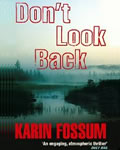
My first venture into an Inspector Sejer book, and it delighted me from the first - having not so much a surprise ending as a surprise beginning. And I can't say more without spoiling the surprise (beginning).
The end was pretty good as well - one of those simple solutions where there was all the evidence given to you but still a "whodunnit" nonetheless.
I have seen mixed reviews about lack of characterisation, which may be true, but I felt it was a good detective story. - Drawing Conclusions by Donna Leon
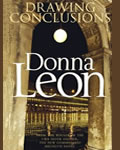
I'm a great fan of Donna Leon and I enjoyed this book - but the ending really surprised me. Not in terms of the plot but in terms of abruptness. I thought the last chapter must have been missing. Having said that - it was more "arty" to end as she does but I felt I needed some cosy rounding off - after all that hard work investigating and so on. - which makes me feel rather dull-witted! - Fifth Witness by Michael Connelly [read by John
Chancer]
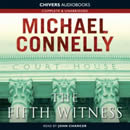
What can I say? Another great read.
Maybe a bit heavy on the courtroom detail - the whole plot turning on courtroom tactics, but .... can't stop myself using banal prose like "really good".
There is also a wonderful twist at the end - again all the evidence there before you, but not seen until the author chooses.
- Busy Body by M C Beaton [read by Penelope Keith]
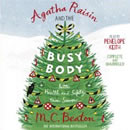
Another cheerful book with all our old friends present and correct.
We start and end with the Carsley Ladies (joint meeting); like the village itself, it's a real caricature - but - as is often the case - utterly recognisable for anyone living in a village or belonging to any kind of club or society.
Hating to admit it but I do empathise with Agatha's complicated relationships with her male friends, and her constant search for the perfect man. However, unlike Agatha, I am convinced that when you meet an appealing and yet unattached man of mature years that it is no accident that he is unattached. Not implying a sinister reason - but there will be a reason. - Bone Bed by Patricia Cornwell
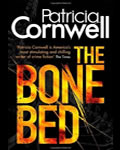
I'm all Scapetta-ed out.
Well - not really of course.
We are back into more conventional mad serial killer territory here and back in my comfort zone. Well "not really" to that one as well - but I prefer the politics, anti-Scarpetta conspiracies, and military involvement to be incidental to the plot and not fundamental to it.
So this offering much more to my taste.
I found it most interesting to see an interview with Cornwell on ITV's "Crime Thriller Club". The latter is little more than a publicity blurb for the awards of the same name but lots of fun with Mark Billingham in full support for the "this prestigeous" (!) event.  From BBC Radio 4 Extra I enjoyed recordings of a dramatisation of
Terry
Pratchett's Night Watch with Philip Jackson*
as Sam Vimes, and an original dramatisation of Laurie
King's The Beekeeper's Apprentice with James Fox as a very
appropriate Sherlock - still sharp but perhaps a little weary.
From BBC Radio 4 Extra I enjoyed recordings of a dramatisation of
Terry
Pratchett's Night Watch with Philip Jackson*
as Sam Vimes, and an original dramatisation of Laurie
King's The Beekeeper's Apprentice with James Fox as a very
appropriate Sherlock - still sharp but perhaps a little weary.
* ...Philip Jackson who will always be Inspector Japp to me - and yet what a really skilled actor he is. I have seen him in many roles outside Poirot, (in which he was brilliant - aided by a delightful script "swipe me!"), and he is always utterly convincing with no distracting shades of Japp peeping through.
Posted on August 31, 2013 at 2:48 PM
« Previous entry | Main | Next entry »Wednesday July 31, 2013
Books in July
- The Patience of the Spider and August Heat by Andrea
Camilleri
[translated by Stephen Sartarelli and read by Daniel Philpott]
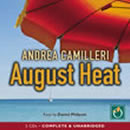
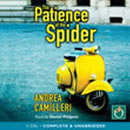 Another two Montalbano mysteries as "easy listening" in the
car. In fact they are so good that it got to the point that I was almost
inventing car journeys just so I could listen to more of them.
Both very poignant tales - the mysteries are satisfactorily revealed but
owing to the nature of the stories (murders) the outcomes could never be described as satisfactory.
In August Heat I truly felt for Salvo - he (like me) is of a certain
age and not quite able to come to terms with getting older - hardly believing
he could be attractive to a beautiful young woman - and yet at the same time - believing.
He is still firmly tied to Livia (though she is "away" and blaming
him for all kinds of things outside of his control) so there is just lots
of guilt and real bitter sadness when realisation strikes.
Another two Montalbano mysteries as "easy listening" in the
car. In fact they are so good that it got to the point that I was almost
inventing car journeys just so I could listen to more of them.
Both very poignant tales - the mysteries are satisfactorily revealed but
owing to the nature of the stories (murders) the outcomes could never be described as satisfactory.
In August Heat I truly felt for Salvo - he (like me) is of a certain
age and not quite able to come to terms with getting older - hardly believing
he could be attractive to a beautiful young woman - and yet at the same time - believing.
He is still firmly tied to Livia (though she is "away" and blaming
him for all kinds of things outside of his control) so there is just lots
of guilt and real bitter sadness when realisation strikes.
- Port Mortuary and Red Mist by Patricia Cornwell
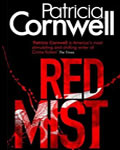
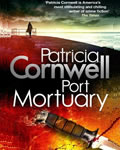 The plots of these books is strongly linked - almost a continuation
of one another. I was not keen on Port Mortuary to start with - too
much military and cloak and dagger - but it developed into the usual
good story and exciting
climax. I liked Red Mist a little better - it was more personal to "Kay"
- and the "bad guy" was more your traditional run-of-the-mill lunatic
and motivations did not involve some military conspiracy theory plot.
The plots of these books is strongly linked - almost a continuation
of one another. I was not keen on Port Mortuary to start with - too
much military and cloak and dagger - but it developed into the usual
good story and exciting
climax. I liked Red Mist a little better - it was more personal to "Kay"
- and the "bad guy" was more your traditional run-of-the-mill lunatic
and motivations did not involve some military conspiracy theory plot.
- The Martin Beck Killings: The Locked Room by Maj Sjöwall
& Per Wahlöö [Translated by Paul Brittén and dramatised for Radio
4 by Katie Hims]
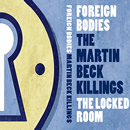
Radio 4 has produced the entire Martin Beck series of 10 detective novels by Swedish husband and wife team Maj Sjöwall and Per Wahlöö in the Saturday afternoon drama slot - and with an enviable cast of excellent British actors.
The books about Martin Beck and his colleagues in the National Police Homicide Department in Stockholm were written between 1965-1975, (when Per died), and are police procedural novels.
Unfortunately, I've only managed to catch one of them so far but I think I would quite like to read the books - as usual, it is a challenge to fit a full novel into a 1 hour play.
Posted on July 31, 2013 at 1:24 PM
« Previous entry | Main | Next entry »Sunday June 30, 2013
Books in June
- The Sacred Stone by the Medieval Murderers [read by
James Saxon]
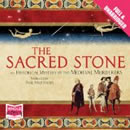
Another collection of short stories by the Medieval Murderers who are authors (and performers); you can read more about them here.
I do like the idea of a themed collection of stories - this theme concerns the fate of a fragment of an asteroid ( or some such..) with holy powers attributed to it by its owners through the ages - and I enjoyed this set more than House of Shadows; I did like some of the stories more than others but I'm not prepared to say which ones! They might be used as a guide to the quality of an author's solo works - but I am not sure because short story writing is an art in itself and not necessarily a good indicator of all writing in different forms.
- Prologue: Greenland, 1067: by Susanna Gregory
In which the stone is discovered by a band of hunters - Act 1: Welsh Border, 1103: by Simon Beaufort
In which the stone causes a rift between Church and State - Act 2: North Devon, 1236: by Bernard Knight
In which the stone is invoked to heal a manor lord's sick wife - Act 3: Norwich, 1241: by Karen Maitland
In which the stone is acquired by a Jewish merchant - Act 4: Oxford, 1272: by Ian Morson
In which the stone finds its way to King Henry's bedchamber - Act 5: London & Jersey, 1606: by Philip Gooden
In which the stone plays a part in the kidnap of Nick Revill - Epilogue: Present Day
In which the stone resurfaces
- Prologue: Greenland, 1067: by Susanna Gregory
- The Voice of the Violin and Rounding the Mark by
Andrea Camilleri
[translated by Stephen Sartarelli and read by Daniel Philpott]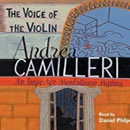
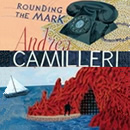 I've been listening to these in the car - and how wonderful they are.
Daniel Philpott is a great reader - and somehow manages to get plausible
accents and jokes even spoken in English (with credit also due to the
translator of course).
I've been listening to these in the car - and how wonderful they are.
Daniel Philpott is a great reader - and somehow manages to get plausible
accents and jokes even spoken in English (with credit also due to the
translator of course).
I have seen the TV adaptations and can't really find that they left much out (from memory). However, when I watched the TV version of the Terracotta Dog I found a lot seemed to be missing - and I found a web review where the reader said a later novel was not a patch on the previous one (Terracotta Dog) - and I am thinking that these later novels are perhaps getting a little slimmer - and thus are more suited - or perfect - for adaptations. Add to that, throughout his career Camilleri has studied and worked as a director and screenwriter, so clearly has an excellent eye for visual and dramatic interpretations. - The Teahouse Detective - The de Genneville Peerage by Baroness
Orczy [Radio Play]
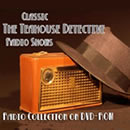
A BBC Radio 4 series adapted from a series of short stories written by Baroness Orczy between 1901 and 1925.
The original book called The Old Man In the Corner is about an unnamed armchair detective who examines and solves crimes while sitting in the corner of a genteel London tea-room in conversation with a female journalist ("Polly").
8 stories were adapted and broadcast in 1998 and 2000 featuring Bernard Hepton as the eponymous hero - I managed to catch only one of them (recently rebroadcast on BBC Radio 4 Extra) thanks to the vagueries of BBC iPlayer. - The Serpent's Back by Ian Rankin [Radio Play]

This appears as a short story in Beggars Banquet but this version is a radio play written by Rankin and broadcast first in 1995. It's a black comedy set in 18th-century Edinburgh.
"Mr Cullender, a resourceful caddie and manservant, searches for a double murderer in the seething Old Town of Edinburgh."
Directed in Edinburgh by Patrick Rayner with Alexander Morton, Richard Greenwood, Norman Maclean, Paul Young, Kern Falconer, Wendy Seager, Tom Smith, Liam Brennan, Michael Elder, Simon Scott, Sheila Donald and Steven McNicoll.
Sadly I missed the second play with the same character: The Third Gentleman. - Thorndyke, Forensic Investigator by R Austin Freeman
[adapted for Radio 4 Extra and read by Jim Norton] ]
Dr John Evelyn Thorndyke (pretty clearly) bears direct comparison with Sherlock Holmes - given the dates, 1907-1942, and his methods - and though he is focussing on physical evidence, in truth, Holmes is much the same ("give me data"). In addition, Thorndyke is described as tall, athletic, handsome, and clever, yet unmarried, and his friend and foil, Christopher Jervis, acts as narrator.
The 9 adaptations are 15 minutes each and seemed a little stark or lacking in warmth when compared with Doyle's stories. It is possible that the style of the full novels may lend themselves better to a more rounded and less brusque manner of dealing with a plot.
Posted on June 30, 2013 at 1:23 PM
« Previous entry | Main | Next entry »Friday May 31, 2013
Books in May
- Started Early Took My Dog by Kate Atkinson
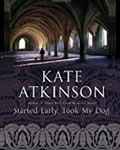
I've had this book in my possession for a very long time - I had just read the first 3, and at the same time we had the first series of the TV adaptation. Now at last I got round to reading the 4th - and here it is on TV again.
So before I launch into a lot more text - which is mainly about the TV and not about the book - may I say - it's great - do read it.
The TV adaptations have now wandered so far from Jackson's life in books that they are finding it hard to get back on track - which they are trying to do, I think - now that they want to make more shows and yet keep using the books as source material. I don't really see why they needed to alter the plots quite so much. My biggest regret for this book is that "Tracy and Courtney" are the real stars with eccentric and yet convincing characters despite the extraordinary circumstances that they both find themselves in, and also create - and they even used Victoria Wood to play Tracy who would have been great if she'd actually been asked to play the character in the book but instead she played a rather serious woman with a past, in a dead beat job. As to book-Courtney - she was a wonderfully stoic kid with a good deal of her own dry wit, coming across loud and clear despite little dialogue - but on TV she was a sullen child showing signs of the abuse she had clearly been experiencing in her short life to date. Added to that they skipped the charming enigma of whose child Courtney actually was.... the mystery was simply removed.
I do realise they have to change stories to make them fit their 1.5 hour format*, and granted Kate Atkinson's rather black humour and interesting morality might not be considered suitable... (though really: why not? - I mean after all, the stories and characters do actually have a pretty clear moral compass).
No. I'm afraid the only saving grace to make you want to continue watching the TV adaptations is in the shape of Jackson himself - that one they seen to have got completely right. Jason Isaacs hits completely the right note.
* ... and that's another thing... why not reap the benefits of the rich plot lines you can get from a full blown novel .... and .... make the drama longer. Hey - here's an idea - have several parts to cover one story - you could, say, call it a "serial".
I know. I know. People just don't have the attention span these days to watch a whole series that they have to wait for every week ... Oh but wait... I seem to remember some foreign thing... The Killing? And we had to sit through enough episodes of flipping wonderful-but-sure-as-heck-long Broadchurch for goodness sake.... - Rush of Blood by Mark Billingham [read by Toby Longworth]
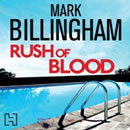
Another stand-alone novel without Thorne - though he does make an appearance towards the end and we learn something about his new circumstances after the debacle surrounding the end of his last case.
As usual, I was prejudiced against this novel - not the classic police detective murder mystery, new characters to get to know, and a different writing format. Our old friend the serial killer was still there though, and of course, I am sure the change was very refreshing for the author and this comes over in making the novel more interesting and fresh for the reader too.
That killer though - totally bonkers or what? I do hope Thorne follows through tying up loose ends on that at a later date. - Cover Her Face by P D James [Radio Play]
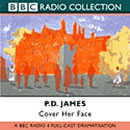
A BBC Radio 4 dramatisation of P D James first Dalgliesh book - a replay from Radio 4 Extra (or 7 as I like to think of it) seemingly from 2002. This one not exactly starring Hugh Grant - though the blurb featured him heavily. I was never sure what to make of his character - Felix - I thought he was "the good guy" and yet James writes complex characters, and none of them is particularly likeable - with the exception of Dalgliesh of course - and even he's a bit odd.
The real "star" is Sian Philips (as the matriarch and narrator) with her wonderful and distinctive voice. We are currently enjoying her portrayal of Livia in a rerun of "I Cladius" from the 1970s; marvellous actress in a marvellous role. - The Sign in the Sky by Agatha Christie [Read by Martin
Jarvis]
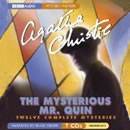
From Radio 4's 15 minute Afternoon Readings, and written in the 1920s, this is the 3rd of 3 recent readings featuring Harley Quin - a character who turns up from time to time and inspires the somewhat introverted bachelor Mr Satterthwaite to come out of his shell and see that justice is done. [In this episode he inspires him to whizz off to Canada...]. There have been at least half a dozen of these stories in this series - perfectly read by Martin Jarvis - taken from the book of short stories The Mysterious Mr Quin.
There are two other stories featuring these two characters, The Harlequin Tea Set and The Love Detectives from Problem at Pollensa Bay, which I read in 2009.
Mr Satterthwaite turns up in the novel Three Act Tragedy alongside Poirot - for no apparent reason, other than perhaps Christie was apparently fond of him. His character was omitted in the recent TV adaptation, with David Suchet and Martin Shaw, but he was played delightfully by George Cole in the BBC Radio 4 "full cast dramatisation". - Sad Cypress by Agatha Christie [Radio Play]
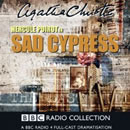
BBC Radio 4 Extra "full cast dramatisation" with John Moffat as Hercule Poirot, and Emma Fielding as Elinor Carlisle, directed by Enyd Williams.
Helen and I were just discussing the book and agreeing that it is a favourite, even though in my opinion it's pretty dark. This comes across in this radio play and the TV adaptation with David Suchet. The character Mary Gerrard is portrayed as charming, sensible, cheerful, and kind - she regularly visits and reads to an elderly lady. She wants to "make something of herself" using the opportunities she has been given by said elderly lady - perhaps training as a nurse. So her death should really be a poignantly sad event - instead of which she seems just a pawn in the plot, and Elinor Carlisle is heavily portrayed as the sad victim (even though, as Helen observes "she is still actually alive"). Mary's real problem is that she is very beautiful, and, (Helen again) Agatha does not much like beautiful women; they are often portrayed as flighty, naive butterfly creatures - often rich - victims who put their trust in the wrong people, (viz: Evil Under the Sun, Death on the Nile, The Plymouth Express, The Blue Train). Interestingly, Mary does not quite fit the mould - she is not rich, (although money does seem to be the motive for her demise) and sees straight through Elinor's weak - but presumable handsome! - cousin Roddy. However, none of this is enough to save her. Poor Mary.
Emma Fielding is pretty perfect for the role of Elinor, a thoroughly decent but slightly icy character, who is confused by her emotions of jealously, ill-will, and ultimately guilt. But as Poirot says - thinking about murdering someone is not the same as acting on it, and luckily he is there to save the day. - On BBC Radio iPlayer and Listen Again I have also been enjoying Dixon of Dock Green, Alan Garner's Elidor, and Father Brown Stories with Andrew Sachs.
Posted on May 31, 2013 at 9:18 AM
« Previous entry | Main | Next entry »Tuesday April 30, 2013
Books in April
I know! Six books.... [Well, I was on holiday, and they were exciting....]
- In the Dark by Mark Billingham [read by Adjoa Andoh]
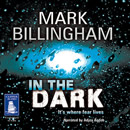
As I promised myself, I went back to read the stand-alone novel with Thorne as "a peripheral character". It was excellent, and I engaged with our new heroine "Helen" right away. I think she is an excellent addition to Thorne's friends and I hope we see much more of her. Much better than the colourless Louise - I guess Mark likes her better.
Prepare to get your hankies out though... it's not all happy endings. - Sovereign by C J Sansom
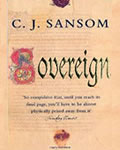
I like to read books in the "right" order but unfortunately this is the 3rd novel in the Shardlake series and I have not read the 2nd yet. However, apart from offending my anally retentive nature, this made not a jot of difference to my enjoyment of the book.
It dwells to an eye-watering degree on medieval methods of torture, and the high possibility and extreme fear of being wrongly accused. Some criticism has been made of Sansom's overly detailed writing style - but I find what he says interesting enough not to notice. - The Black House by Peter May
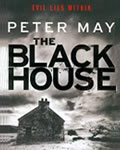
Such a great read that I immediately shelled out for book 2 of what is apparently a trilogy. (Not the norm you will notice - most of my books are gifts or loans). After the high drama of this one, it's hard to see how there could be 2 more plots.
I did find that at the start the flavour of the book affected me at a rather fundamental level - the hero's general discontent with his marriage struck some kind of chord - I really found it almost too depressing as it seemed weirdly true to life. However, much to my relief, all was explained at the end in a manner with which I most certainly cannot empathise - even weirdly - so I do not have to come to terms with quite such a bleak world view.
I am optimistic that he will continue with 3 books with "happy" endings.... - Swing Brother Swing by Ngaio Marsh [read by James
Saxon]
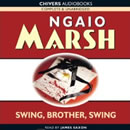
This book, also entitled "A Wreath for Riviera" in the US edition, is from 1949 and the 15th in the series - so we are back to a time when Alleyn and Troy's son Ricky. is a mere baby. It's a delightful period piece and the plot is completely preposterous as befits a traditional murder mystery of this era (effectively a locked-room mystery). Have to confess I was pretty sure who dunnit, though, astonishingly, the police were a lot slower to catch on - they probably didn't realise they were in a novel. - There Goes the Bride by M C Beaton [read by Penelope
Keith]
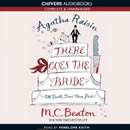
Time to catch up on Agatha's rural life - though this one sees her on a few foreign trips to kick off the novel. No surprises as to what happens to James Lacey's new fiance. (How does James manage to fall for such appalling women? I think MC has men pretty well summed up in their unfailing weakness for good looks and youth - and when they come in the same package.... irresistable).
Posted on April 30, 2013 at 9:32 AM
« Previous entry | Main | Next entry »Sunday March 31, 2013
Books in March
- Miss Peregrine's Home for Peculiar Children by Ransom Riggs
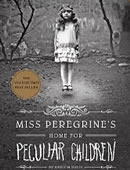
Well.... how peculiar is this.
I guess it's as a fantasy novel, though this was not entirely clear to me at the outset - which I guess is to its credit. The author invents an "other" time-travelling world with its own set of rules and so on which makes me think this may be intended as the start of a series - especially how the book ends with the characters setting out on a "quest".
We'll see.
Anyway, the interest, or gimmick, in this book is that the author has a collection of interesting examples of weird and wonderful photos from the late 19th or early 20th century. He has used these with some lent by others, and written a story around them. The photos are interesting in their own right but the story would probably stand on its own too I think.
Some of the pictures involve "trick" photography with (then) new techniques - like those that produced the infamous fairies at the bottom of the garden that fooled Conan Doyle. I can begin to see from this where this author's interests lie. On looking up his other work, I find that his apparently only other work is The Sherlock Holmes Handbook, which is (maybe) written by a (young) American, for (young) Americans eg was cocaine really legal back then? and why were the British so terrified of Australia? but it's an amusing tome that I had co-incidentally bought as a little gift for Tony last year - who likes all things Sherlock. - Last Ditch by Naio Marsh [read by James Saxon]
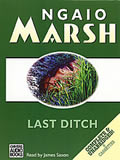
This is the twenty-ninth novel featuring Inspector Alleyn, and was first published in 1977. It's set in the Channel Islands, with Alleyn and Troy's (now adult) son, Ricky, in a central role; I enjoyed this a lot, having read some of the novels before Alleyn met Troy, during their early relationship, and one when Ricky was a small boy. Although Ricky is an impossibly decent fellow - just how you'd like your son to be - and though it's clear he respects his parents, they are very much his parents, and he has his own life private from them. His youth and freshness are well-conveyed along with his adolescent style crush on the sophisticated older woman and so on, while his Father offers an air of experience and solid support. - Clean Break by Val McDermid [Radio Play]
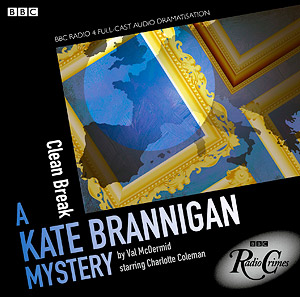
A BBC Radio 4 dramatisation of a Kate Brannigan mystery starring Charlotte Coleman as the Manchester-based private eye.
The plot? Thieves steal a Monet from a stately home where Kate had arranged the security. She sets off on a chase that takes her across Europe bringing her head to head with organised crime.
Can't say I warmed to Kate very much..... - A Series of Murders by Simon Brett [Radio Play]
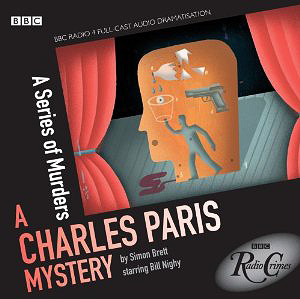
Part of the Charles Paris series of novels, many of which seem to have been produced on BBC Radio 4 starring the delightful Bill Nighy as a very convincing Charles - just the right mix of likeable charm and weakness.
Charles Paris has landed a nice juicy part playing Sergeant Collins in a TV detective series. Needless to say, a cast member is killed, and although it seems like an accident, Charles can't shake the suspicion that she was murdered. On top of all that he tries to stay away from booze and women, in order to get back together with his wife.
I have often heard the odd episode of these series while driving, (they seem to be on mid-morning), so it was great to hear one all the way through.
Posted on March 31, 2013 at 3:04 PM
« Previous entry | Main | Next entry »Thursday February 28, 2013
Books in February
- The Nine Tailors by Dorothy L. Sayers [Radio Play]

Another BBC radio play starring Ian Carmichael as Lord Peter Wimsey, from the novel of 1934, which is apparently the 9th Wimsey novel. I'm having trouble dating the recording date of this radio play, but it was also made as a TV adaptation in 1974 (which I remember seeing) with similar if not the same cast.
The plot is a bit better than the shenanigans at the Belladonna Club - but I think the criticisms of Wimsey and his world, in that they lack of realism, don't have much relevance when reviewing the stories now.
The explanation of the title is as follows: there is a tradition of announcing a death with a church bell in some English parishes. Broadcasting the age and sex of the deceased would be enough to identify them in a small village. So the death was announced by "telling" (single blows with the bell down) to indicate the sex, and then striking off the years. Three blows meant a child, twice three a woman and thrice three a man. After a pause the years were counted out at approximately half minute intervals. The word teller in some dialects becomes tailor, hence the saying "Nine tailors maketh a man", which is much recited in this play.
The bell used in this novel for the announcement is the largest (tenor) bell which is dedicated to St Paul. Hence "teller Paul" which is corrupted to "tailor Paul" in dialect. Apparently the author is acknowledging the assistance of Paul Taylor of Taylor's bell foundry in Loughborough, who provided detailed information to her on all aspects of ringing. - The Glass Room by Ann Cleeves [read by Charlie Hardwick]
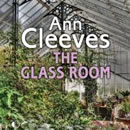
I've been looking forward to catching up with the latest Vera Stanhope novel, and I'm pleased to say this was quite as good as the preceding ones. I suppose these are almost police procedural novels, except that Vera does not seem to follow the procedures too well - which makes for the interest of course. Her behaviour does not leave the bounds of realism though; she manipulates situations intelligently and does not openly flout the rules - as you would expect from a policewoman of her rank. We only know of her wayward nature (and maybe passions) through her thoughts rather than her actions. In this novel, she manages to remain in charge of the case, despite being pretty thoroughly connected with the prime suspect, and being inexplicably present at the crime scene before the police were actually called.
I do find quite a lot to empathise with in Vera, even though I don't imagine we are at all similar in character; Vera's eccentricities are quite definitely due to her childhood with her unpleasant Father, probably both via his genes as well as his bringing her up. She is painted as physically unattractive, which is not in itself sufficient to account for the lack of a man or children in her life, both of which she vaguely mourns from time to time, while those around her would be amazed to think she even noticed the opposite sex at all. A common attitude to the older professional woman, whether unattractive or not, is that they are either ignored or objects of humour. In fact, my sister once observed in the 1970s that women in business were regarded either as bimbos (if you were attractive) or battleaxes (if you were not), and I privately wonder if underlying attitudes have really changed very much since then. In hearing Vera's thoughts, we learn that she has basic desires which are not very different from a lot of other people. She is not perfect, and in her lonelier moments, (maybe every evening!), she does turn to drink, but she seems fairly at one with herself even though she feels there are some things lacking. At the same time, Vera has her eyes wide open to the fact that she would not cope well with being part of a conventional family, and through her Sergeant, Joe, we have a picture of a very robust family life drawn as a contrast.
In re-reading the above I am also struck by the fact that this description could equally apply to the Jane Tennison character in Prime Suspect (1991), portrayed by Helen Mirren as a highly attractive professional police woman. Externally, she could not appear to be more different from Vera, and yet she is similar in her doubts and insecurities revealed in her private life.
Posted on February 28, 2013 at 9:38 AM
« Previous entry | Main | Next entry »Thursday January 31, 2013
Books in January
|
Posted on January 31, 2013 at 9:37 AM
« Previous entry | Main | Next entry »Monday December 31, 2012
Books in December
|
Posted on December 31, 2012 at 1:42 PM
« Previous entry | Main | Next entry »Friday November 30, 2012
Books in November
I did not read much fiction this month, but I did do a lot of knitting! So here are a couple of knitting booklets and magazines I am enjoying:
- Debbie Bliss magazine (issue 9) by Debbie
Bliss

This is Autumn/Winter 2012, and though the designs did not hit me in the face with this issue, it does contain some excellent reading (as a magazine should):
- Rosy devotes her letters section to some excellent advice on toy-making - including how to make those tiny little buttons you need for dolls clothes. (A subject close to my own heart).
- Nell gives a recipe for a yummy Polish apple cake.
- One of the book reviews is about Cute and Easy Crochet by Nikki Trench, which inspired me to think about crochet tops for home-made jam given as a gift (or for yourself if you are posh!). I was thinking you could use my Pattern of the Month motif - crochet to the size of your lid, then do a few rows of dc (or sc) without increasing, and finish with a row of increasing and picot to create the frill. I know you are supposed to be inspired to buy the book not run away and do your own thing - but they are on the cover.... I can only imagine the rest of the book is even more inspiring if this is what you get from the cover alone!
- There is a trend report on coming fashions - which leads into
the knitting.
- Snow Whites - probably the most appealing to me and maybe I do feel a chunky white cabled polo-neck in the offing.
- Furry Tales - some great accessories, with knitting in combination with fake-fur fabrics (I love these combinations), and some gorgeous pom-pom mittens.
- Two simple knits for beginners with user experiences.
- Little Critters - kids with animal-knit accessories (cute!).
- Folklore - reminiscent of those 1950s Tyrolean knits with embroidery in folksy colour combinations. In theory I like this - in practice - not. Lovely pom-poms again though....
- Boys - the perfect magazine - no less than 6 wonderful mens' designs and 2 for kids as well.
- Home on the Range - my least favourite section (which is just me - I don't like this Peruvian/Ranch style one little bit - though having said that there is the most adorable pair of bootee moccasins with beading in 3 shades of Baby Cashmerino...)
- Rowan magazine 52

Rowan's Autumn/Winter 2012, seems very muted and traditional in style. Where there are more innovative pieces, they are too quirky and I don't want them - but then Rowan is always one step ahead of where I want to be and I often find I knit things from the magazines a couple of years after they published them (when I've got used to the idea!).
However, there is a lot of traditional stuff here, (that I love), seemingly in rather dull colours - BUT - I happened to see one of the cardigans (Orkney) on display at Alexandra Palace this year and the colours absolutely glowed! So I had to have the wool for this cardigan (Felted Tweed - my favourite!) and I have already started the knitting. There is also an appealing pattern for some slippers along the lines of Snowflake Slippers (one of the free Rowan patterns I knitted very successfully) for which I have also bought the wool.
Posted on November 30, 2012 at 2:16 PM
« Previous entry | Main | Next entry »Wednesday November 21, 2012
Woking Library
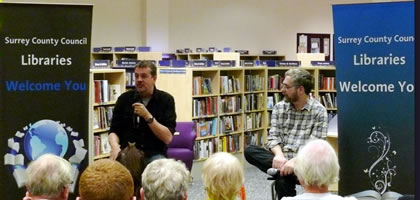
The Surrey Library Newsletter told me some time ago that Mark Billingham was due to appear for an evening at the Woking branch so I duly got tickets and Rob and I trekked out there to see him "in conversation" with another author.
As I have mentioned before in the context of his reading his own work for audio books, Mark is originally a performer and so provided a very entertaining evening. It seemed clear to me before the event that his billing with another somewhat lesser-known author was in order to give more exposure to the latter. However Stav Sherez is a very interesting chap and the excerpts he read sounded excellent so certainly another set of books get put on the crime list for me. His roots are as a journalist and as I have said before, there must be something I like about a journalistic style in crime fiction. I think I like the rich yet sparing prose of the journalist. However Stav is a bit more poetic than most - possibly as he was a journalist for a music paper - and I would strongly recommend following him on twitter (@stavsherez) since his poetry, music interests, and general attitude to life, make his contributions interesting and well-suited to the medium.
Stav's crime novels are: The Devil's Playground (2004), The Black Monastery (2009), and now A Dark Redemption (2012) which is the start of a series pairing of detectives "Carrigan and Miller".
Mark's next book is a Tom Thorne novel The Dying Hours and will be published on May 23rd 2013. This is deemed to be Thorne's twelfth outing and dealing with the ramifications of a major career change; apparently, readers of Rush of Blood will already know what that is. [Although the last Thorne novel was Good as Dead (2011), he has appeared peripherally in the two stand-alone novels In the Dark (2008) and Rush of Blood (2012).]
Posted on November 21, 2012 at 11:31 PM
« Previous entry | Main | Next entry »Wednesday October 31, 2012
Books in October
Posted on October 31, 2012 at 11:08 PM
« Previous entry | Main | Next entry »Sunday September 30, 2012
Books in September
Posted on September 30, 2012 at 8:28 PM
« Previous entry | Main | Next entry »Friday August 31, 2012
Books in August
|
Posted on August 31, 2012 at 8:16 AM
« Previous entry | Main | Next entry »Tuesday July 31, 2012
Books in July
- Black Ice by Michael Connelly
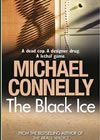
The first Harry Bosch novel I read was The Concrete Blonde, which was his third outing - and I was hooked. This one is his second, and I think I must have missed it in my haste to devour all the others. It was interesting reading an early Connelly book after all the later ones; interesting to note his changes of style - though I could not put my finger on what the changes are as I'm by no means capable of such an analysis. I guess it's a little less polished, but I'm not implying that this is a negative thing at all, just a little different. I like the way Harry started out like this - a conventional policeman in fiction - a loner and misfit - and also I admire the fact that you can see the character has not changed over the years; he has managed to continue with his police career, so has by defnition mellowed and been very canny in his dealings with his bosses, but fundamentally just the same. - U is for Undertow by Sue Grafton [Read by Liza Ross]
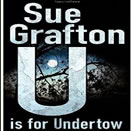
The author works her way doggedly towards Z and her retirement - or so I assume. Despite the elapsed time of her literary journey through the 1980s, the stories remain varied and interesting; there is often some sort of theme but this never takes over the dialogue and thus I think it serves any "cause" better than a soapbox approach in the writing.
"V" is already available, and I'm still very much looking forward to continuing the series. - Grave Secrets by Kathy Reichs [read by Katherine Borowitz]
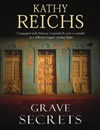
This was the author's second book I think. It was quite interesting, but with all her books I have read now, I am seeing a pretty well the direct opposite to my comments above. Reichs always does seem to have a theme and, although that part is fine, I find the heroine's continual pontificating on the issue in question to be more than a little irritating.
I have read reviews complaining on the formulaic nature of the stories, and also about the co-incidences that bring the strands of the plot together. I have few complaints about those points: a thriller has to have some sort of denoument with the heroine in danger, and as for the coincidences - it's a fictional story....
Posted on July 31, 2012 at 12:04 PM
« Previous entry | Main | Next entry »Saturday June 30, 2012
Books in June
- The Burry Man's Day by Catriona McPherson
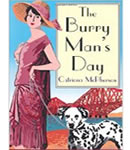
I was very keen to read more of Dandy Gilver's doings, but could only find a "real" book of the second novel so it took me a while to get round to it. I did guess at the nub of the story before it was clear to the characters, but judging by the previous book, I think that is the author's intention. This is another author that really seems to be able to evoke the period she is writing about. I think this is a difficult line to tread from the perspective of today; I have read others questioning Dandy's attitude to her offspring, which I find quite easy to accept, and this may because I have no children, but also, the environment in which she exists means that she cannot be so fully absorbed by her children in the way we all are today, otherwise all parents of that era and class would have been in a perpetual state of torment and loss. The stories in general, and this in particular, strongly reflect on the effects of WW1, about which our attitudes to fighting, "lack of moral fibre" and desertion have done a complete about face in the intervening century; I think it must be hard to keep your characters sympathetic while keeping them true to the times, and have their expressing views that they must have feasibly held, but which are not the normal PC views today. However, I think the author does an excellent job and, as before, I am looking forward to reading all the following books. - Straight by Dick Francis [read by Tony Britton]
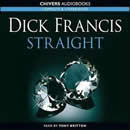
I was surprised to find a Francis novel I had not already read - and pleased of course. This is one of those novels where the action is around a non-racing theme, but unlike some, I think this one works particularly well for two reasons: it is firmly embedded with a racing background, and the hero is a jockey who has been thrust into the world of gem stones by the death of his brother. This gives a more plausible way for the gem stone business to be explained to the reader - ie through the eyes of the novice hero. Other than that, the usual exciting thriller with minor romance thrown in. - The Reversal by Michael Connelly [read by Michael Brandon]
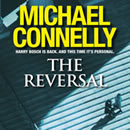
This is a great book which offers all I have come to expect in anticipating each of his crime novels. It brings together almost all his heroes in one book, as Haller, Bosch, and Walling all appear - which is fun. I like the way he rings the changes on his characters; for example in this book, Haller is prosecuting. I know it sounds unlikely, but the basic premise is well explained and his inexperience on the other side of the fence is also nicely covered. I did think this was his latest, but there are 2 more after this and another expected to be published later this year, so I am much in arrears, but with lots to look forward to. - Silence by Jan Costin Wagner (translated by Anthea Bell)
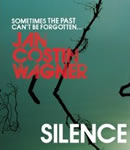
This was a book suggestion from the Slockavullin Book Group. From what Helen said I was expecting this to be glum and introspective in the same vein as the non-Wallander Mankell novel that I accidentally read. As such I was pleasantly surprised to be reading a fairly solid detective story plus interesting features of the detectives' lives. I would recommend this as a pretty good read, and I understand it to be the second one featuring the same characters; see also Ice Moon - the first book - and The Winter of the Lions published more recently.
Posted on June 30, 2012 at 8:55 AM
« Previous entry | Main | Next entry »Thursday May 31, 2012
Books in May
- TV Detectives Omnibus edited by Peter Haining
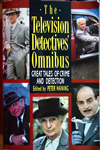
This is an omnibus of original short stories by the well-known creators of detectives who have subsequently made it on to the TV screens. The book I have is the 1992 Orion edition, so it's a snapshot of TV detectives to that date. For me it's a very interesting book including not only the (then) more recent TV detective adaptations like Jeremy Brett's Sherlock Holmes and more recent detectives such as Morse, but also refers to the more historical original stories about Charlie Chan, Perry Mason, Ellery Queen, Sam Spade, Philip Marlowe, and so on. each story is carefully chosen with a few - often fascinating - facts about the character and author at the start of each section. For example - who knew? - Miss Marple made it on to American TV in 1956 with Gracie Fields in the starring role (!) and Roger Moore playing the part of Patrick Simmonds.
Peter Haining has also done a similar Crimebusters Omnibus at a slightly later date including Taggart, Tennison, Spender, Columbo and Kojak. - The Ladies of Grace Adieu: and Other Stories by Susanna
Clarke
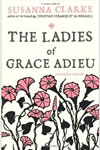
An excellent introduction to the folklore and stories of Susanna Clarke, hopefully a good preparation for Jonathan Strange and Mr Norrell, which was recommended by Alison and is a mighty tome currently waiting to be read - but more of that next month.
This book of short stories is much easier to digest, and has great variety and interest in the way each story is presented. Despite being (in some cases well known) fairy stories, they are all weirdly disturbing, and appropriately classified by the library as "science fiction". It fits well with my recent reading of Puck of Pooks Hill. - A Fatal Inversion by Barbara Vine [read by William Gaminara]
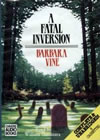
This is Ruth Rendell of course, writing under her psychological thriller pseudonym. I'm afraid I am one of her readers that likes her "bread and butter" police novels with dear old Inspector Wexford, so I tend not to read Barbara Vine. However, the Guardian list of "1000 novels: crime" recommended it, which gave me the incentive. And of course it really is excellent, as you would expect, and despite the "crime" being fairly clear from the start, it did completely surprise me with its ending. At one point, one of the characters says "we've got away with it" which is (no doubt intended to be) deeply ironic, since, as the plot unfolds, it is pretty evident that none of them truly got away with "it" at all.
Posted on May 31, 2012 at 9:20 AM
« Previous entry | Main | Next entry »Monday April 30, 2012
Books in April
- House of Silk by Anthony Horowitz

I can't praise this book enough written in the true spirit of the Conan Doyle originals. Added to that we have delightful historical detail that Horowitz is so good at researching, and a few political points slipped in as Watson's minor digressions in the course of telling the tale. Almost as a bonus, the storyline is excellent, although is a little wistful and sad at the end, as Watson is writing this in old age and in somewhat poor health with Holmes already long departed. - Bones and Silence by Reginald Hill [read by Brian Glover]
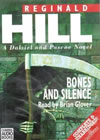
This is another book with a sad little ending.
Of course, I suppose classic detective stories featuring murders are never going to be a bundle of laughs, but this was one of the sub plots which you hoped would be resolved positively. I don't really want to hint at the resolution of any parts of the plot, but in my defence, this is an old novel, which I even saw on TV, so hopefully it's not really a spoiler. - Agatha Raisin and a Spoonful of Poison by M C Beaton
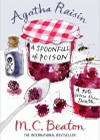
Finally tracked down this book, which made a pleasurable afternoon's read while knitting a plain sock from the "sock blank" experimental dyeing project.
So ... it's LSD in the jam at the local village fete. What larks! .. or it would have been if one of he elderly residents had not thought they could fly off the church tower, with predictable results.
"Harmless" prank? or cunning murder plan (albeit a rather scatter-gun approach..).
No sad endings here - all the jolly fun a murder mystery should be ....
Posted on April 30, 2012 at 6:17 PM
« Previous entry | Main | Next entry »Saturday March 31, 2012
Books in March
- Silent Voices by Ann Cleeves [read by Charlie Hardwick]
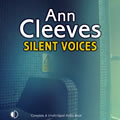
Vera appeared in the opening chapter of this novel, and so I was hooked from the start. She is the most interesting character and, in the earlier books, I was always willing her to appear as soon as possible. Ann Cleves does not simply churn these novels out at a great rate, and so there is not a huge canon for the TV series to take up. Thus I am sure that the next series will have new plots written for TV. This is always dangerous; in my estimation they absolutely ruined the Dalziel and Pascoe novels by doing this - they deviated dramatically from the characters own stories and reduced it from a work of near genius to a run of the mill cops and robbers drama. However, lets look on the bright side: often, a great novel is too big an enterprise to reduce to a couple of hours (eg the Rebus novels - which have never been successfully dramatised, even after they chose a suitable leading actor - purely due to their short duration*) - and Morse seemed to survive well even with the "written for TV" episodes.
* I had just read Ian Rankin's "Fleshmarket Close" when I watched the TV drama. Although it retained the title, as far as I remember the "action" referring to the place was presumably considered extraneous to the main plot and therefore cut out - consequently I remember no reference during the episode to its title. - Hidden Depths by Ann Cleeves [read by Anne Dover]
So smitten with Vera that I went straight on to another novel. This one was the first to be shown in the TV dramatisation, and the 3rd chronologically. It involved a very memorable "MO" (not horrific I hasten to add - just sad - as any murder would be), so I remembered the story but not so much who "dunnit" - luckily.
I'm looking forward to the 5th (latest) Vera book which came out in February this year. - The Vault by Ruth
Rendell [Read by Nigel Anthony]
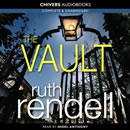
This is a library download, which I chose as part of my reawakened interest in Ruth Rendell, only to discover that it is the latest Wexford mystery set after the Inspector's retirement. I had heard more than one reference to this book - mildly scathing comments about the premise of allowing the hero to continue working with police business after retirement. However, I found this entirely forgiveable - certainly as reasonable as, for example, allowing Dixon of Dock Green to never rise through the ranks and to continue to be played by an actor in his 80s, and certainly more appealing than having him die rather than retire. After all - how realistic is crime fiction and murder myteries at all? I think Oxford had more murders in one episode of Morse than they ever had in reality in the course of an entire year.
As to the plot - it's as well that I find myself such a source of amusement. While reading, I began to find the story a little familiar - similar to what is possibly the only non-Wexford Ruth Rendell thriller that I have read - no idea of the title - researched on web to find that it is "A Sight for Sore Eyes" (I title I have no memory of at all) and that in some places The Vault is actually described as a sequel. Anyway - I enjoy writers revisiting old plots or characters from a different perspective (eg Ian Rankin's "Blood Sport" - and most of Michael Connelly's novels), and this one did not disappoint.
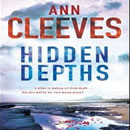
Posted on March 31, 2012 at 10:59 AM
« Previous entry | Main | Next entry »Wednesday February 29, 2012
Books in February
- Recalled to Life by Reginald Hill [read by Brian
Glover]
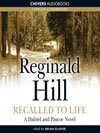
Returning to Dalziel and Pascoe to read the 13th in the series. Dalziel has the opportunity to visit New York, while Pascoe stays at home worrying about the state of his marriage (and Dalziel).
I like the way Dalziel is portrayed as a tough, intelligent, and serious-minded policeman, (though to some extent, a figure of fun as far as his colleagues are concerned). He may be "the Fat Controller" but he is also fit, making him a physical as well as a mental force to be reckoned with.
Brian Glover made an excellent reader, both with and without his Yorkshire accent. - The Dogs of Riga by Henning
Mankell
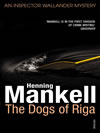
Working through the Kurt Wallander series with this, the second, book. First published in 1992, the theme is around political change in the Eastern Block countries and what it means when "the authoritites" are corrupt and cannot be trusted.
It is due to be one of the English (Kenneth Brannagh) adaptations of the Wallander novels - series 3, not yet aired. - Death Comes to Pemberley by P D James
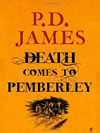
More P D James than Jane Austen pastiche, which is what you might expect. The author has used the characters, and, in my opinion, kept them pretty well all in character.
I found the introduction, revisiting previous scenes, quotes, and general scene-setting, rather dull - I feel I am already overly familiar with the material "to date", although I appreciate that the book needs to stand alone, and it might be useful for those who are not familiar with Pride and Prejudice. The author does advance theories about the relationships between the characters, somewhat outside the original novel, which I found quite interesting (never having studied English Literature academically), though I am not sure I agreed with all of them. - Telling Tales by Ann Cleeves [read by Julia Franklin]
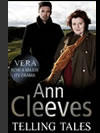
I wanted to read these books as I saw the excellent TV series with Brenda Blethyn playing DI Vera Stanhope. Having listened to this one (the second in the series) I think they did a pretty good and faithful job of dramatising them - and Brenda was wonderful of course, making a fair stab at disguising her many positive physical attributes in order become the frumpy Vera.
The book had a slow start for me, only becoming interesting once Vera appeared on the scene - but the I obviously warmed to it and I became just as interested in everyone else as I got towards the end of the book.
Posted on February 29, 2012 at 9:53 AM
« Previous entry | Main | Next entry »Tuesday January 31, 2012
Books in January
- Who Guards a Prince? Reginald Hill [read by Ian Redford]
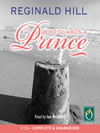
I am a great admirer of Reginald Hill but only more recently started to read books outside the Dalziel and Pascoe series. I think he is a marvelously inventive writer as well as being able to tell a thrilling tale, (this one perhaps less plausible than some but I am more than willing if there is a need for any suspension of disbelief).
So you can imagine my dismay when, on my own birthday, George stated with casual bluntness "he died recently didn't he?". I'm afraid I did not register the fact before and I am very sad - for him and for us. My only consolation is - I still have many of his books still to read. - The Speaker of Mandarin by Ruth Rendell [Read by Michael Bryant]
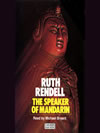
In the 1980s and 90s I read all "the latest" Wexford mysteries as they came out. While I don't pretend Ms Rendell's popularity has ever faded, her books became less essentially fashionable than they seemed to be in the 1980s, and I realise that since then I have not read any - until Rob gave me The Monster in the Box, which made me realise she was still writing new "Wexfords", despite declining to be involved with any more TV adaptations. This book is from 1983 and I really enjoyed it - the murder mystery was not so mysterious, but the storyline was great and very interesting. Makes me look forward to more, and, encouraged by the Guardian's list of "Crime Novels everyone must Read", I plan to read some of the "other" novels as well as those written as "Barbara Vine". - The Geneva Mystery by Francis Durbridge [Read by Toby
Stephens]
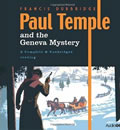
A Paul Temple Mystery. Interesting to listen to as a "retro experience" and well-read. Paul made his first appearance in 1938 - but he and his wife "Steve" seem still in their prime in this story written in 1971, apparently set in the 1960s. Best known as a radio series from 1938-1968, with a few remakes in the 2000s, many of the early episodes now being lost. I fondly remember the TV series starring Francis Matthews from 1969-1971. - House of Shadows by the Medieval Murderers [Read by
Paul Matthews]
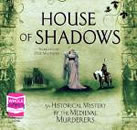
When I started listening to this book (on a long car journey) I thought it was deathly dull, and I did not understand the authorship. It got a little better - and I think the concept of the book - which is a collection of short stories by different authors around a common theme - is pretty interesting. The Medieval Murderers seem to be authors and performers - anyway you can read about them yourself here. I was interested to see C J Sansom is one of their number, though he did not contribute to this book.
Posted on January 31, 2012 at 9:16 PM
« Previous entry | Main | Next entry »Saturday December 31, 2011
Books in December
- From the Dead Mark Billingham [read by the author]
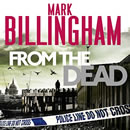
Well - as I have observed before - cold cases are always popular. In this case it's a slightly different twist. A wife organises her husband's murder via a contract killing and has served 10 years in prison as a result. However it seems the evidence of the man's death was falsified since he appears to be very much alive after all.
As well as looking into all this, teaming up with a (female) private investigator, Thorne's private life is not going well. I have to say I find it hard to like Thorne for much of the time, but I am not keen his girlfriend Louise; she seems to be a very "serious" character which follows through to why she is so excellent at her job - but somehow she seems too "grown up" for him. I freely admit to not understanding the writing process, but I think she's a dull character, and Thorne must be so frustrating to have a relationship with that she can only try and limit him with her dullness - so I think and hope we'll be saying goodbye to her...
- The Language of Bees by Laurie R King [read by Jenny Sterlin]
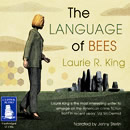
It seems a long time since I read the last of this series and so I was really looking forward to this one. As fascinating a plot as ever with an even more incredible scenario (if having Sherlock Holmes married to a young wench were not incredible enough for you) - yet set out in a totally convincing way. Jenny Sterlin is an excellent reader - but I am in two minds as to whether I sort of expect Mary Russell to have an American accent - or at least the remains of one maybe in her "normal" voice - I would of course expect Mary to be able to produce a variety of accents when called upon to do so.
Set chronologically in 1924 after some months traveling abroad in Japan and California, the couple return home to Sussex. No sooner back than they are visited by Holmes' estranged son, Damian Adler, who asks for their help in finding his missing wife and daughter. They soon connect the disappearance with a religious cult called The Children of Lights, and the climax of the novel, is set in an ancient circle of standing stones in Orkney.
I am sure there are lots of holes in the story but - if there are - then we are just taking a leaf out of "Dr Doyle's" original ideas. The real snag is - it's a two-parter, and we are left on somewhat of a cliff-hanger....
Posted on December 31, 2011 at 1:27 PM
« Previous entry | Main | Next entry »Wednesday November 30, 2011
Books in November
- The Babes In The Wood by Ruth Rendell [read by George Baker]
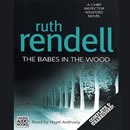
I belatedly decided to start knitting a Christmas cardigan for George in late November - I worked out that 6 weeks was enough. (And in fact it was - I finished it at 4am Christmas morning... but that's another story). So this nineteenth Wexford book was a perfect accompaniment. It's a slow moving plot, probably following a more realistic pace for a police investigation. A babysitter along with her 2 young charges mysteriously go missing - the parents are immediately convinced they are dead, and after the police fail to find any trace of them that's the only realistic conclusion. It's not until many months later that the discovery of a car wreck and a body reopen the case.
The memorable thing about this book for me is the descriptions of the season and the weather, which echo the flooding throughout the country in recent years. Every morning Wexford watches the water as it rises - and then eventually recedes in his garden.
There hadn't been anything like this kind of rain in living memory. The River Brede had burst its banks, and not a single house in the valley had escaped flooding. Even where Wexford lives, higher up in Kingsmarkham, the waters had nearly reached the mulberry tree in his once immaculate garden. - Puck of Pook's Hill by Rudyard Kipling
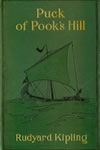
I found this book a bit hard going, about which I am rather ashamed considering it's intended for children. It is something of an instructional book from Kipling, presented in an entertaining way. The basic idea is that on Pook's Hill, two children meet Puck, a mischievous and capricious magical being (as more famously depicted by Shakespeare). Puck takes them on magical journeys which illustrate the stories he is telling them, which are set in different periods of English history. Since it is fantasy I am tempted to relate it to the Just-So stories but this book interweaves something of historical fact and literature into the tales (hence educational).
Being a Sussex girl (though West not East) I was interested in the location of Pook's (or Pook) Hill; the book fairly clearly describes the landscape in the area around Bateman's, and there seems to be evidence for Pook Hill with a house or farm bearing the name, but the existence of name and place prior to the publication of the book is debated by Kipling researchers.
Finally - why did I want to read this book? In my childhood home we had a few ancient books - plain covered - no dust jackets - which I discovered offered a treasure trove of escapism once opened and read. One such Was Rewards and Fairies - the title made no sense to me and again I found it too hard going and never finished reading it. I was aware that it was a sequel to Puck of Pook's Hill and felt that it assumed you already knew the premise.
[I was interested in Puck talking about fairies ("People of the Hills" - they "don't care to be confused with that painty-winged, wand-waving, sugar-and-shake-your-head set of impostors") in England saying that they used to be plentiful "a few hundred years ago" but "Unluckily the Hills are empty now, and all the People of the Hills are gone. I'm the only one left". I have not looked into the folklore at all but I notice this as a point in common with Susanna Clarke's fairy books suggesting similar traditional ideas. The title of the sequel that so mystified me is from Richard Corbet's poem Farewell, Rewards and Fairies which laments the fairies' departure "But now, alas, they all are dead; Or gone beyond the seas...".] - Faceless Killers by Henning Mankell
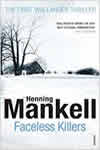
Having enjoyed the TV adaptations for so long, I thought it was about time I read the books - there are only about a dozen and in 2009 Mankell published what he said to be the last in the series. In fact, the TV series that defined the actor Jan Krister Allan Henriksson as Wallander to me (and many) is not an adaptation of the books but a kind of follow-on series where his daughter is adult, and the series begins where she starts her active duties as a police officer alongside her father; the story-line was really intended to focus more on her. Wallander comes over more of an avuncular figure than he appeared in the books, I think - maybe he mellowed with age.
Faceless Killers was dramatised later as one of the British TV adaptations starring Kenneth Branagh, (rather too handsome for the role I fear), but prior to that I saw an earlier manifestation of an altogether less appealing Wallander, played by Rolf Holger Lassgåd, who I think was more true to the character as written.
This story begins in a remote farmhouse where an old man has been tortured and beaten to death, along with his barely surviving wife. When the news leaks that 'foreigners' may be responsible it unleashes a tidal wave of racial hatred in the area. Mankell's books always highlight social issues, injustices, and racism in Sweden; he intentionally sets them in Ystad, which, prior to the success of his books, was known as a historic medieval town set in a beautiful and peaceful coastal area. He reveals its darker side, using it as an allegory for the state of modern Sweden. Now of course Ystad and Malmö are mostly known (by foreigners anyway) for 'Wallander tourism'.
Posted on November 30, 2011 at 1:27 PM
« Previous entry | Main | Next entry »Monday October 31, 2011
Books in October
- Nine Dragons by Michael Connelly [read by Michael Brandon]
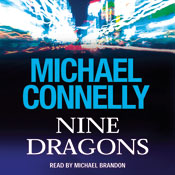
The opening chapters of this book remind me a little of Sherlock Holmes with Harry demonstrating his skills gained through years of experience ("data" rather than magical little grey cells).
There has been an apparently (and sadly) conventional scenario involving a shooting at a Chinese liquor store but Harry methodically observes clues that the cops first on the scene have ignored - and which lead him to conclude it was not an "ordinary" hold-up. The action then takes him from LA to hook up with Eleanor again in Hong Kong, and where a set of surprising events change his life pretty dramatically. In reuniting with his daughter, they find they both have to come to terms with deep feelings of guilt and loss.
I note again that some other readers (I guess clearly those who came to the books after watching the TV series) complain about the departure of the story-line from that on the TV regarding Eleanor and her HK life. However, I think you have to not only accept but embrace the fact that "Bosch" is an adaptation of the books, and includes many changes (Gulf v Vietnam war; stray dog v coyote; etc) in order to make it a contemporary drama and not a period piece. - The Teracotta Dog Andrea Camilleri [read by Mark Meadows]
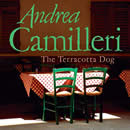 This is the second in Andrea Camilleri's Inspector Montalbano series. If I am not mistaken, this is one of the longer (or maybe the longest) book in the series, with a satisfyingly intricate plot line. It seems to me to draw together many themes used in other stories, involving communications with a mafioso, a contemporary local criminal investigation, and a 50 year old mystery from WW2. As usual Montalbano's approach to the problem - and his way of getting at a just solution - are novel to say the least.
This is the second in Andrea Camilleri's Inspector Montalbano series. If I am not mistaken, this is one of the longer (or maybe the longest) book in the series, with a satisfyingly intricate plot line. It seems to me to draw together many themes used in other stories, involving communications with a mafioso, a contemporary local criminal investigation, and a 50 year old mystery from WW2. As usual Montalbano's approach to the problem - and his way of getting at a just solution - are novel to say the least.
The stories were not filmed in order of the books, so having seen the initial couple of episodes in 2008, I read this book before I saw any TV depiction, and I anticipated that it would be tough to squeeze all the subtleties of this story into one episode. And I was right (unlike the other books which could almost - and maybe were, given Camillieri's background - have been written with a dramatic production in mind). - The Egg and I by Betty Macdonald
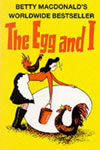
A charming memoir which was immensely popular when it first appeared in the 1940s and is still capable of charming the audience of today. The author has a self-deprecating and wryly humorous style wry recording the apparently peculiar choice of her husband to up sticks from an office job in the city, and buy a poultry farm in the middle of nowhere [the wilds of Washington State]. As a a newly wed, she followed where her spouse led, joining in with gusto the impossibly hard life that ensued. Their decision was probably not as mad as the book implies - this was in the era of the great depression and unemployment and poverty was the reality for many. Also I note that in practice the author only tolerated this husband for about 4 years before going her own way...
I also note that, while very entertaining, the picture painted of the local native American population is not very flattering to say the least, and I would have said "racist by today's standards" or as was claimed "in the context of the 1940s such stereotyping was far more acceptable". However it's pleasing to note that this was not really the case since after the book became such a success, the author faced law suits filed by members of the Chimacum community - rather less pleasingly I don't think they were successful, but it demonstrates the point.
Posted on October 31, 2011 at 4:38 PM
« Previous entry | Main | Next entry »Friday September 30, 2011
Books in September
- After the Armistice Ball Catriona McPherson [read by the Hilary Neville]
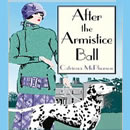 This was recommended by Alison as a "book I would like", and my goodness how right she was. I have been a slave to Dandy Gilver ever since. The rather dramatic appeal for me is less in the thriller/mystery - although I have to say immediately I think the plots are excellent and very cleverly related to their time - but much more in the writing and background. I can barely believe that the (relatively young) author is able to evoke such an authentic sense of time, manners, and period language. [I grew up as a late baby in a family full of relatives for whom "between the wars" was their prime, where vinegar papers, the art of stain removal (without washing), and the way to natural glossy hair (with infrequent washing otherwise it would all fall out) were all very familiar.]
This was recommended by Alison as a "book I would like", and my goodness how right she was. I have been a slave to Dandy Gilver ever since. The rather dramatic appeal for me is less in the thriller/mystery - although I have to say immediately I think the plots are excellent and very cleverly related to their time - but much more in the writing and background. I can barely believe that the (relatively young) author is able to evoke such an authentic sense of time, manners, and period language. [I grew up as a late baby in a family full of relatives for whom "between the wars" was their prime, where vinegar papers, the art of stain removal (without washing), and the way to natural glossy hair (with infrequent washing otherwise it would all fall out) were all very familiar.]
Dandy's first meeting with Alec in this book is so perfectly expressed that it tugs at the heart (my heart anyway) demonstrating their deep connection which remains unexpressed: I think it would have been at that moment, if I were the type to fall in love, that I should have fallen in love with Alec Osborne. And in subsequent books, Dandy's maturing relationships with her husband, children, and Alec are wholly and believably described with humour and sympathy. - The Shape of Water Andrea Camilleri [read by Mark Meadows]
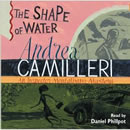 The first Montalbano story with our streetwise but honest Sicilian police inspector - irascible but always compassionate. In this introduction to Montalbano, he is determined to unravel the truth when a local bigwig is discovered deceased, apparently in flagrante, on waste ground much used at night by drug dealers and prostitutes. The powers-that-be want the case closed quietly with the coroner's verdict of natural causes, but Montalbano is not satisfied. This is also our introduction to Ingrid Sjostrom and explains the roots and somewhat complicated nature of his ongoing friendship with her.
The first Montalbano story with our streetwise but honest Sicilian police inspector - irascible but always compassionate. In this introduction to Montalbano, he is determined to unravel the truth when a local bigwig is discovered deceased, apparently in flagrante, on waste ground much used at night by drug dealers and prostitutes. The powers-that-be want the case closed quietly with the coroner's verdict of natural causes, but Montalbano is not satisfied. This is also our introduction to Ingrid Sjostrom and explains the roots and somewhat complicated nature of his ongoing friendship with her.
'What shape is water?'
'Water doesn't have any shape!' I said, laughing. 'It takes the shape you give it.'
[The truth] 'is up to you to discover, if you so desire. Or else you can stop at the shape they've given the water.'
[Writing a subsequent note here to say I was totally confused by the now famous 2017 film of he same name - excellent and well worthy of its reception and awards - but nothing to do with this book!] - About Face Donna Leon [read by David Colacci]
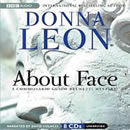 This is the 18th Brunetti novel - which is as interesting, amusing, and well written as the previous 17. As usual, the author tackles political topics of the day as part of the story, revealing hypocrisy and corruption through Brunetti's liberal eyes. Other crime authors also use their books as a kind of soapbox for political topics but... I want to say that Leon does it with more subtlety, however that would not be correct. The points she makes are pretty overt, but to my (somewhat liberal) mind, she engenders far more interest in her stories than simply using her protagonist as a mouthpiece to deliver an instructive polemic.
This is the 18th Brunetti novel - which is as interesting, amusing, and well written as the previous 17. As usual, the author tackles political topics of the day as part of the story, revealing hypocrisy and corruption through Brunetti's liberal eyes. Other crime authors also use their books as a kind of soapbox for political topics but... I want to say that Leon does it with more subtlety, however that would not be correct. The points she makes are pretty overt, but to my (somewhat liberal) mind, she engenders far more interest in her stories than simply using her protagonist as a mouthpiece to deliver an instructive polemic.
In this case, she discusses cosmetic surgery - Brunetti pondering why society should encourage a charming and educated young woman to mutilate her face - and, (a rather more specific topic for Italy or Naples at the time), the subject of waste management (lack of), and subsequent pollution resulting in long-term regional impacts. [The reason for the crisis in Campania in the 80s and 90s was due to corrupt awards of tenders to companies run by organised crime, which resulted in illegal dumping of waste.]
The two subject matters become interwoven as part of a murder investigation. - Murder on the Short List Peter Lovesey [read by Gordon Griffin]
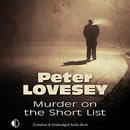 This is Peter Lovesey's 'short list' of his best ever short stories. It includes the Crime Writers' Association's best short story of 2007, 'Needle Match', and features some of his most popular detectives such as Bertie, Prince of Wales, Sergeant Crib and Rosemary and Thyme.
This is Peter Lovesey's 'short list' of his best ever short stories. It includes the Crime Writers' Association's best short story of 2007, 'Needle Match', and features some of his most popular detectives such as Bertie, Prince of Wales, Sergeant Crib and Rosemary and Thyme.
- The Field [Green for Danger 2003]
- Bullets [Mammoth Book of Roaring Twenties Whodunnits 2004]
- Razor Bill [Sherlock, issue 60 2004]
- Needle Match [Murder is My Racquet 2005]
- A Blow on the Head [ID Crimes of Identity 2006]
- The Munich Posture [The Rigby File 1989]
- The Best Suit [Ellery Queen's Mystery Magazine 2008]
- The Man Who Jumped for England [Mysterious Pleasures 2003]
- Second Strings [The Strand Magazine, June-September, 2004]
- Bertie and the Christmas Tree [The Strand Magazine 2007]
- Say That Again [The Ideas Experiment 2006]
- Popping Round to the Post [The Verdict of Us All 2006]
- Window of Opportunity [Sunday Express 2003]
- The Case of the Dead Wait [Daily Mail 2004]
I listened to this book on a CD from the library which unfortunately did not play on the final disk - after which I resorted to the book... - West End Girls Barbara Tate
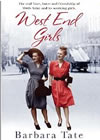
A best-selling book, of interest to me mostly for the fact that it is autobiographical. It tells of Barbara Tate's life as a "maid" to a prostitute in Soho in the late 1940s and early 1950s.
At the age of 17 Barbara Tate had won a scholarship to Ealing School of Art, and subsequently went on to achieve fame as an artist, but this is the extraordinary account of her first few years after college, full of life and colour, and vividly depicted, rather like a painting itself. Tate moved from the naivety of thinking she was to be employed in housework, to being educated in the ways of survival in the shabby backstreets of Soho. A true story of adventure, survival and growing up.
Posted on September 30, 2011 at 4:15 PM
« Previous entry | Main | Next entry »Wednesday August 31, 2011
Books in August
- The Scarecrow Michael Connelly [read by John Chancer]
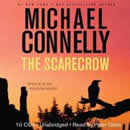 I'm a great fan of Connelly and have very high expectations (always met) of every book, consuming each with concentrated enthusiasm. However, for some reason I can't really explain, I found this one even more thrilling than usual.
I'm a great fan of Connelly and have very high expectations (always met) of every book, consuming each with concentrated enthusiasm. However, for some reason I can't really explain, I found this one even more thrilling than usual.
I only came to read Connelly in the early 2000s and so I probably read the earlier novels out of sequence and focused mainly on Harry Bosch. So this was probably my first introduction to Jack McEvoy. He's a reporter "of a certain age", employed in a cut throat industry in the process of great change. "Real" journalists are being laid off from traditional newspapers, in favour of employing free-lancers with "stories" rather than real skill. He feels he has reached a dead end in his career - or at least in his employment - and needs to move on. His plight struck a chord with me, even though I'm not a journalist, and Connelly, as a former crime reporter, writes all this with great sympathy. Against that background is the really gripping story of Jack's pursuit of a serial killer. I think also there was an enhanced sense of jeopardy, simply because Jack is not Harry, so you are by no means certain that he has to survive to be in the next book (!).
[Note that I listened to this as a talking book narrated by John Chancer - who was excellent - but I note that many available versions elsewhere seem to be narrated by Peter Giles.] - Friends at Thrush Green Miss Read [read by the Gwen
Watford]
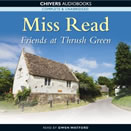 Another chance to listen to Gwen Watford's charming narration of these gentle tales from Miss Read centred on her two fictional villages. The book I read previously was one of the Fairacre series from 1964, whereas this one is much later from 1990, and - as the title suggests - set in Thrush Green. The novels are generally humorous with subtle social commentary.
Another chance to listen to Gwen Watford's charming narration of these gentle tales from Miss Read centred on her two fictional villages. The book I read previously was one of the Fairacre series from 1964, whereas this one is much later from 1990, and - as the title suggests - set in Thrush Green. The novels are generally humorous with subtle social commentary.
Thrush Green's two former schoolteachers are now retired, and return for a visit. It's spring and everyone is keen to share all the latest gossip with their friends. As one reader aptly put it " the literary equivalent of a good cup of tea".
[Gwen Watford was a lovely actress fitting perfectly with the retro charm of this era and society. I particularly loved her interpretation of Miss Marple's best friend Dolly Bantry in the Joan Hickson TV series.] - Major Pettigrew's Last Stand Helen Simonson
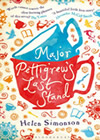
This is essentially a love story. The Major is a confirmed bachelor, pretty definitely "set in his ways". When his brother dies, he develops an unexpected friendship with a widowed shopkeeper from the village - who happens to be a Pakistani. As their relationship develops, all those covert attitudes to "foreigners" surface among the village society. I say "covert", though I am guessing that Mrs Ali has been made all too aware of them all the time she has lived there - but the Major has a lot of catching up to do. And not only does he have the local community to deal with, but he has scheming relatives...
Some people find the Major unbelievable in this day and age - and he is a bit of an anachronism - but for me he is a bit like Wallace (as in: "and Gromit"), in that he is created by a person "of a certain age" - in this author's case, younger than both Nick Park and me - but she was brought up in East Sussex and moved to the US after college, so I think probably retains good memories of such characters set in place and time. And to a great degree this is all about the Major facing up to the realities of the 21st century.
The words "charming", "delightful", "gentle humour", "heart-warming" etc spatter the reviews of this book - but like the Miss Read books there is a strong underlying message. - 206 Bones Kathy Reichs

This is a book written in two time lines beginning with the present, where we find Tempe tied up in a dark enclosed space. This is a way to make a book tense and thrilling, while in the timeline of the past, we plod through an investigation. The books are of course formulaic, where Tempe always or often ends up in danger, and is then rescued (I hope that's not a spoiler, but there are books that follow this one). And then there's a polemic about something or other at the end.
Apparently the human skeleton is made up of 206 bones; from the title, I just thought: 'hey - Tempe is in her element - lots of bones...'. I think I read the whole of the book without really "getting it" (despite the detailed descriptions - maybe like many other readers I was skipping the tedious science bits). - Unseen Academicals Terry Pratchett
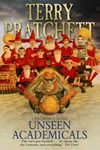
The 37th novel in the Discworld series was published in 2009 after a short hiatus following the author's diagnosis of his serious, and ultimately fatal, illness. The novel satirises football (as well as the many renowned and eccentric Oxbridge traditions) with one Mustrum Ridcully setting up an Unseen University football team, which has the Librarian as the goalie (obviously...). This all comes about because tradition mandates a football game (town versus gown) in exchange for a large financial endowment to the University by a wealthy family. The local version of football is very violent and deaths are common; thus the wizards are somewhat concerned for their own safety, and impose new 'official' football rules, which includes forbidding the use of hands and mandating the use of official footballs as opposed to the makeshift balls the street games use.
I'm not a true and dedicated fan of all the Discworld novels as some are; however, Pratchett has a touch of genius in benignly ridiculing the most (and least) preposterous aspects of modern life. Weirdly - unlike much other satirical humour - it's always achieved with a certain fondness for humankind, despite their follies.
Posted on August 31, 2011 at 8:38 AM
« Previous entry | Main | Next entry »Sunday July 31, 2011
Books in July
There have been more audio books than usual this month as I work my way round painting the kitchen to show at least some progress in time for Alison's impending visit. (She claims it's not important.... but we know better...)
- Wolf Hall Hilary Mantel
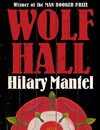 This won the Man Booker 2009 - when I thought the Sarah Waters The
Little Stranger should have won - but that was before I read
this. I borrowed it as an eBook from the library - all new experiences
- and the choice is currently limited. However, what a great choice
it turned out to be. A fantastic novel - almost not a novel of course.
Had I not been so engrossed in the text I would have wondered where
the title came from, but this became abundantly clear in the closing
pages.
This won the Man Booker 2009 - when I thought the Sarah Waters The
Little Stranger should have won - but that was before I read
this. I borrowed it as an eBook from the library - all new experiences
- and the choice is currently limited. However, what a great choice
it turned out to be. A fantastic novel - almost not a novel of course.
Had I not been so engrossed in the text I would have wondered where
the title came from, but this became abundantly clear in the closing
pages.
Co-incidentally I have been since exposed to several other cultural experiences about the same historical period through TV, film, and country house exhibitions, and it is really fascinating. 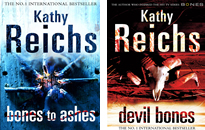 Bones to Ashes and Devil Bones Kathy Reichs
[read by Lorelei King]
Bones to Ashes and Devil Bones Kathy Reichs
[read by Lorelei King]
More library loans, which make good listening for long car journeys, or painting walls! Tony is a great Reichs enthusiast. However, Rob surprised me by saying he did not enjoy the book he read, finding it tedious in forensic detail - I wonder if they are better as spoken word.- The Private Patient P D James [read by Michael Jayston]
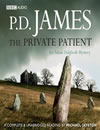 This is completely in the standard mould, confined in the setting of
a private hospital for plastic surgery. The characters are a shade wooden
and dated, but I think I have always felt that about James books. I
think I am more of a "plot" person with less interest in the
psychological depths of the characters - and the characters are not
very warm or likeable. However, as far as I can tell James writing is
as good as ever, and the actual plot (under all the psychology) is quite
strong.
This is completely in the standard mould, confined in the setting of
a private hospital for plastic surgery. The characters are a shade wooden
and dated, but I think I have always felt that about James books. I
think I am more of a "plot" person with less interest in the
psychological depths of the characters - and the characters are not
very warm or likeable. However, as far as I can tell James writing is
as good as ever, and the actual plot (under all the psychology) is quite
strong.
PD James has recently been awarded the Theakstons Old Peculier Outstanding Contribution to crime fiction - only the second author to receive it. - Bloodline Mark Billingham [read by the author]

Eighth in the series proved as interesting as ever. I am pleased to say that although he sticks with the serial killer theme, the books rely far more on the likeable character of Tom Thorne, than weird and wonderful ways people can be murdered. The writing encompasses Thorne's life and work to equal degree, without becoming boring about either. I find the characters very real, which is quite something when reading about murders which by sheer weight of numbers have to be pretty far from reality. - Lord Peter Views the Body Dorothy L. Sayers [read by
Ian Carmichael]
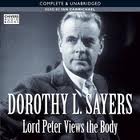
An enormously entertaining short story collection:
- "The Fantastic Horror of the Cat in the Bag"
- "The Unprincipled Affair of the Practical Joker"
- "The Vindictive Story of the Footsteps That Ran"
- "The Bibulous Business of a Matter of Taste"
- "The Piscatorial Farce of the Stolen Stomach"
- "The Unsolved Puzzle of the Man with No Face"
- "The Adventurous Exploit of the Cave of Ali Baba"
- "The Abominable History of the Man with Copper Fingers"
- "The Undignified Melodrama of the Bone of Contention"
Posted on July 31, 2011 at 8:37 AM
« Previous entry | Main | Next entry »Thursday June 30, 2011
Books in June
Posted on June 30, 2011 at 2:52 PM
« Previous entry | Main | Next entry »Friday June 10, 2011
New Technology
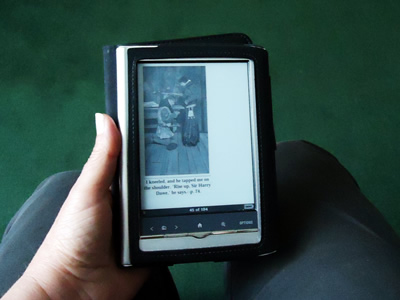
I have a new toy: an electronic reader. The title says "New Technology" but almost before I can put pen to paper (fingers to keyboard, stylus to screen, etc) it is not longer new, nor unique in its function. This is hardly a surprise as I bought it "used" on eBay, although it is virtually new.
I chose to get the smaller version of the Sony eReader. for a number of reasons, some of which are no longer relevant. One of them is unchanging, which is, that it is light in weight and fits well into my bag, while at the same time feeling quite like holding a little book when reading. I first saw it when out with Helen (she was buying a Netbook), and was smitten, but reviews did not rate it as the best; a closer look however seemed to show that many reviewers did rate it as "the best" and their main objection was the price. My eBay purchase, of course, overcame that objection.
I think the eBay seller had bought some other device with a reading app making a specific reader device redundant. However, despite my now owning a Sony tablet - with Sony eReader and Kindle apps installed - I still find I have a very strong need for the eReader, which is just like putting a tiny light-weight book in my bag when travelling. It's very useful having the reader apps on my tablet, but I would not use the tablet as a replacement for the specialist device.
Posted on June 10, 2011 at 8:24 AM
« Previous entry | Main | Next entry »Tuesday May 31, 2011
Books in May
- Nemesis and Alexandria Linsey Davis [read by
Christian
Rodska]
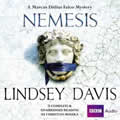
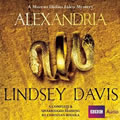 Lots of fun, and delightfully read by my hands-down favourite narrator.
Lots of fun, and delightfully read by my hands-down favourite narrator.
In Alexandria, the Falco family go on a jaunt to Egypt to provide Davis with a chance to poke fun at libraries and academia. It's an enjoyable book, but - although the author often uses this technique to provide new interest in the way of a foreign backdrop for her novels, I always feel that Falco is never truly on top form except on home territory in Rome.
Nemesis sees him back in Rome although there is an extensive swampy excursion. Here the novelty is provided perhaps by the crime story rather than the surroundings, where the concept of an ancient Roman serial killer is explored. - Kissing Christmas Goodbye M C Beaton
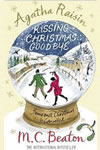 Surprisingly little to do with Christmas (it puts in an appearance towards
the end). Agatha spends her time planning for the great event, but meanwhile
gest involved with a rather unpleasant family business - o - and there's
a murder. Or perhaps not.
Surprisingly little to do with Christmas (it puts in an appearance towards
the end). Agatha spends her time planning for the great event, but meanwhile
gest involved with a rather unpleasant family business - o - and there's
a murder. Or perhaps not.
Agatha dreams of that perfect Christmas - yet another concept I can equate to - and yet despite the preparations and the lifestyle books, it can never quite be perfect. The reason? that (however perfect one is oneself..) those around you are not the perfect stuff of daydreams. And despite her obsessive imaginings, by the time her great love James turns up to kiss her under the mistletoe, Agatha discovers that he does not stir her emotions to complete that picture of perfection.
And you know what? She discovers that she's having a great time anyway.
If there is a link between these novels, it is that they both have major/peripheral
characters where I find it hard to put the flesh on the bones. In the
Falco series it's Anacrites. He is presented as Falco's sworn enemy, though
somehow that enmity lacks conviction for me. On occasion we have almost
been given an insight into a deeper character and then it's whipped away
and replaced by Falco's continued assertions about Anacrites low character.
With Agatha, it's James Lacey, and maybe this one is somehow more understandable
as we most often see James through Agatha's obsessed eyes. Mrs Bloxham
provides an apparently objective view, though of course she is very biased
against him in her concern for Agatha's welfare.
Perhaps as these are both enjoyable light-hearted mystery series and I
am simply trying to read too much into them!
Posted on May 31, 2011 at 10:58 AM
« Previous entry | Main | Next entry »Saturday April 30, 2011
Books in April
- The Girl of his Dreams Donna Leon [read by Gordon
Griffin]
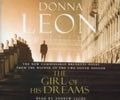
Another excellent Commissario Brunetti story. The backdrop is a social comment - as usual - this time involving the Romany community around Venice. The contrast is easily drawn between the children sent into the city to pilfer, and the "idle" rich in their far more oppulent surroundings. Differing viewpoints are elicited through the mouths of Brunetti, his colleagues, and family members - some more naive than others. - Forfeit Dick Francis [read by Tony Britton]
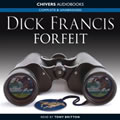
Interesting listening to this, as I believe it was the very first Dick Francis novel I ever experienced. From memory, it was serialised on Radio 4 around 1977 in their regular afternoon slot at about 4:30 - frustratingly cannot remember the title of the programme. I don't think it was narrated by Tony Britton. I was addicted to the radio then (while knitting of course - I have precise memory of the sweater - a gift for my Mother from a pattern in Stitchcraft!). They followed it with a reading of Flying Finish. Utterly thrilling, and for all that - still an excellent book, even discounting the knitting nostalgia, with his wife Mary's influence apparently clear.
Posted on April 30, 2011 at 9:56 AM
« Previous entry | Main | Next entry »Thursday March 31, 2011
Books in March
Bedtime listening. Yawn.
- Fresh from the Country by Miss
Read [read by Gwen
Watford]
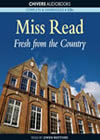
I really enjoyed the gently humorous homely tales in "Over the Gate". However this book is not written in the same mould at all. It's an account of a newly-qualified female teacher's experiences in the early 1960s, and I found it rather tedious with little substance. I also disliked the representation of the "perfect" and patronising head teacher who was clearly the potential role model for the heroine; one can only hope that the very tiny intimations of romance might swiftly blossom into the traditional marriage proposal and acceptance, thereby rescuing her from such a fate for good (!).
One of the problems may be that I cannot relate to the story in the same way that perhaps those in the teaching profession could. Nonetheless, I think some of her other stories are much more pleasing and fun. - Depths by Henning
Mankell [read by Seán Barrett]
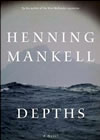
This is a very gloomy book - all icy wilderness and barrenness bleakness, set during the First World War. It was hard for me to empathise with this hero, and as it's told from his point of view, (and he is clearly psychotic), it's hard to get to grips with how others view him. He is deeply disturbed throughout, and entangles himself in a web of deceit, leading to multiple murders, and fairly inevitably, as his duplicity is unravelled, his own demise.
(It reminded me a little of Zola's "Thérèse Raquin", and to confirm me as a Phillistine, I did not like that much either.)
And yes - I am one of those idiots who thought this would be a Wallander novel.
Posted on March 31, 2011 at 9:56 AM
« Previous entry | Main | Next entry »Monday February 28, 2011
Books in February
- Silks by Dick Francis and Felix Francis [read by Tony
Britton]
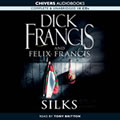
I always felt I had a problem with Tony Britton reading Dick Francis novels, as they usually feature relatively young men (20s-30s) - and Tony Britton, though a great reader, has a very mature upper middle class voice. That's what I thought. But I had no problem with this one. Maybe it's because the hero is a barrister (Tony sounds like one of whatever age - no problem) - or maybe this is just a stronger novel than ones I have read recently. Anyway - a fine read - and nicely encompassing a bit of horseyness too.... 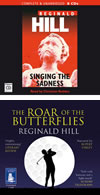 Singing
the Sadness [read by Christian Rodska] and
Singing
the Sadness [read by Christian Rodska] and
The Roar of the Butterflies [read by Rupert Farley]
by Reginald Hill
A very different detective created by Reginald Hill. Jo Sixsmith is an ex machine operator turned private detective living in Luton, though his adventures take him elsewhere.
It is almost an old-fashioned style of book, with very ordinary old-fashioned style people but yet set in our very contemporary world. Full of charm and humour, but for all that does not sacrifice the a very real sense of danger and the thrill of the whodunnit.- Love, Lies and Liquor by M C Beaton [read by Penelope
Keith]
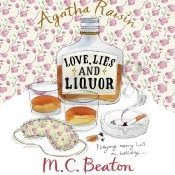
An Agatha Raisin novel, in which experience triumphs over hope.
O no - my mistake - got that the wrong way round.
Agatha thinks she will rekindle the romantic flame by going on holiday with ex-husband James - poor James' idea is a nostalgic trip to a coastal English resort (but seemingly in the dead of winter!), which, funnily enough, lives up to the expectations of neither party.
It does seem like she might really be cured of James this time...
Posted on February 28, 2011 at 9:55 AM
« Previous entry | Main | Next entry »Monday January 31, 2011
Books in January
These are the lovely books I received as gifts - a lovely start to the New Year.
- The Knitter's Year by Debbie Bliss
As is often the case with this type of book, I look at the projects and think "why - these are simple little things - I could have made this up myself".... but then you didn't did you? For a book like this, (knitting projects all year), they need to be quick fun things, - which they are - and this book is beautifully styled and produced, providing the motivation and desire to knit the "little projects" and also then make some up yourself! - Around the World in Knitted Socks by Stephanie Van Der
Linden
You'd buy this book for the cover alone wouldn't you? It's all so colourful and lovely, I wanted to start them all right away. I felt that Rowan felted tweed would provide the look I was after but the 4ply weight is discontinued (and the patterns would be hard to adapt due ot the patterning); plus I think the felted tweed might not be robust enough for socks. So - I guess I'll have to try that new territory and use the recommended yarns... - Nordic Knits by Martin Storey
This is the sort of book that non-knit-lovers (as well as knitters) would like projects from. Perfect gifts for those not keen on hand-knit clothing - though you need to check out their liking for folksey! I think it's packed with pretty tasteful stuff and immediately knitted the cushions on the cover for Alison to decorate in her new "cabin" (house to you and I).
Posted on January 31, 2011 at 4:01 PM
« Previous entry | Main | Next entry »Saturday December 11, 2010
Books in December
The Girl who Played with Fire and The Girl who Kicked the Hornets Nest by Stieg Larsson, (translated
by Reg
Keeland) [read by Saul Reichlin]
I spent this month listening to conclusion of Stieg Larsson's Millennium trilogy. As it was so long since I read the first book I started by listening to the audiobook version of the Girl with the Dragon Tattoo before starting on the other two.
I found the second book a fairly good thriller, but by the time we got to the third - which was really just an extension of the plot of the second, it all sounded rather like the first book all over again.
The hero ends up by finding the perfect woman (physical and intellectual) as well as the journalistic scoop of a lifetime - again - and of which we are led to believe is his third such scoop. Reading page after page of what really amount to the fantasies of an aging journalist became rather tedious in the third book.* However, the books are well-deserved best-sellers and it is a shame there are not going to be any more like them.
* As usual, I looked at other reviewers ideas and was surprised that they did not speak with one voice. Some were critical of the writing and the plot, while others praised it - though I felt perhaps on the grounds of "approving" of the underlying strong moral stance.
Posted on December 11, 2010 at 4:06 PM
« Previous entry | Main | Next entry »Tuesday November 30, 2010
Books in November
- The Triumph of Caesar Steven Saylor [read by Peter Wickham]
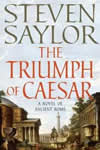 I was a bit surprised (and pleased) that Saylor has written a further Roma Sub Rosa novel. I thought we had seen the last of Gordianus in Egypt in The Judgement of Caesar. As the earlier novels progressed rapidly through history, I always felt that Saylor planned to continue the sagas perhaps by focusing on other members of Gordianus' family, but this never fully developed. I think Gordianus proved to be more interesting than any of the others. However, our hero is certainly getting on a bit now, and the style of the novel seems affected by that fact, (which is interesting in that the author himself is not so very ancient). This is a way of saying that I did find the pace a bit slow and the basic plot a little weak, but as usual the historical detail is very interesting in itself, and clearly where Saylor's interest and expertise lie.
I was a bit surprised (and pleased) that Saylor has written a further Roma Sub Rosa novel. I thought we had seen the last of Gordianus in Egypt in The Judgement of Caesar. As the earlier novels progressed rapidly through history, I always felt that Saylor planned to continue the sagas perhaps by focusing on other members of Gordianus' family, but this never fully developed. I think Gordianus proved to be more interesting than any of the others. However, our hero is certainly getting on a bit now, and the style of the novel seems affected by that fact, (which is interesting in that the author himself is not so very ancient). This is a way of saying that I did find the pace a bit slow and the basic plot a little weak, but as usual the historical detail is very interesting in itself, and clearly where Saylor's interest and expertise lie.
I think that may be the overriding reason that we have not moved to later periods in history with G's sons or daughter. And - presumably to keep a plausible lifespan for Gordianus, while avoiding a chronological dead-end for the series - the next novel is said to be a "prequel that will take the young Gordianus to the Seven Wonders of the World".
I look forward to it. - Scarpetta by Patricia Cornwell [read by Lorelei King]
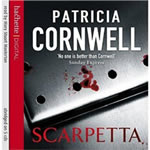 So - I plod on reading the Scarpetta series - always a good read (if you like crime thrillers - not so good if you don't). You can see from other notes on these books, I have some reservations about the portrayal of the heroine. However, in this book I seemed to discern a change. Kay seems to have become much more human, and I had a greater sense of warmth from all the characters - as if a study in black and white had suddenly been tinged with colour. I think the analogy works well as the black and white depiction stands on its own artistic merit as well as colour adding interest.
So - I plod on reading the Scarpetta series - always a good read (if you like crime thrillers - not so good if you don't). You can see from other notes on these books, I have some reservations about the portrayal of the heroine. However, in this book I seemed to discern a change. Kay seems to have become much more human, and I had a greater sense of warmth from all the characters - as if a study in black and white had suddenly been tinged with colour. I think the analogy works well as the black and white depiction stands on its own artistic merit as well as colour adding interest.
Looking back on the series and Cornwell's other novels I think she has quite simply adopted different writing styles and that alters how I feel when reading. The most notable is writing in the third person and yet in the present tense. You (I) would imagine that writing in the present tense would add to the tension and immediacy of the action, but the use of the third person makes for a sense of icy detachment, as if you are watching the characters and the plot unfold through a pane of glass.
In this book we return to third person past tense ("normal"!) and the characters suddenly seem more alive. So I'm looking forward to her next couple of books which seem (from excerpts I have read) to continue with this style.
Posted on November 30, 2010 at 9:24 AM
« Previous entry | Main | Next entry »Sunday October 31, 2010
Books in October
- Popco Scarlett Thomas
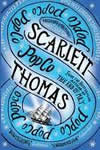 This was an enjoyable book - well written, fun to read. There is a "but" coming as I had some reservations about completely enthusing about it. It has a number of layers to it and retains interest throughout but I think the author showed more inspiration in writing some of the passages than others.
This was an enjoyable book - well written, fun to read. There is a "but" coming as I had some reservations about completely enthusing about it. It has a number of layers to it and retains interest throughout but I think the author showed more inspiration in writing some of the passages than others.
The opening was excellent and engaging as the heroine commenced her overnight train journey, to join a "team building" exercise run by her huge international company at their own country-house training centre. I found this all well-observed and funny - I could easily empathise as it is all very familiar territory to me (not that my own dear multi-national company ever offers quite such lavish affairs). The coffee-table style explanations of mathematics were interesting enough though not new to me, and Popco's global marketing strategies were very interesting, if somewhat sinister. However, I found the back story and the ending less satisfying - as if the book had been written and then it was simply necessary to tie up loose ends.
Overall though - do read it. To quote Kim Newman in the Independent in 2004: "..it's hard to resist a book which comes complete with a crossword puzzle, a list of prime numbers, a frequency chart for the occurrence of letters in English (bound to come in useful) and a recipe for "Let Them Eat Cake" cake. - Euclid's Window by Leonard Mlodinow
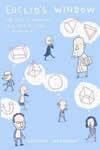 Reading Popco made me want to read this book again. Before I recommend it, be aware that it definitely is about maths. You don't need to be a mathematician to read or understand it but you do need an interest in that direction. I find it interesting and fun.
Reading Popco made me want to read this book again. Before I recommend it, be aware that it definitely is about maths. You don't need to be a mathematician to read or understand it but you do need an interest in that direction. I find it interesting and fun.
"An optimist would say that although the probability of winning the lottery is 14 million to one, you can't win if you don't buy a ticket.
However a mathematician would say that the probability of winning is the same whether you buy a ticket or not."
Posted on October 31, 2010 at 9:33 AM
« Previous entry | Main | Next entry »Thursday September 30, 2010
Books in September
- The Suspicions of Mr Whicher: or the Murder at Road Hill House Kate Summerscale
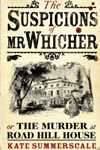 I can highly recommend this book as a fascinating read. Some other reviewers say that there was far too much detail based on the author's research and complain that it's not much of a mystery novel; my conclusion is that they were misled by the cover blurb which does the book an injustice if it implies it's in the detective fiction genre. I would class myself as a fairly lightweight reader who enjoys murder mysteries - and yet I was really gripped by this book, in the same way that I loved The Victorian House (Judith Flanders).
I can highly recommend this book as a fascinating read. Some other reviewers say that there was far too much detail based on the author's research and complain that it's not much of a mystery novel; my conclusion is that they were misled by the cover blurb which does the book an injustice if it implies it's in the detective fiction genre. I would class myself as a fairly lightweight reader who enjoys murder mysteries - and yet I was really gripped by this book, in the same way that I loved The Victorian House (Judith Flanders).
I really appreciated the frequent references, and also the absence of material where there is no historical information available. The picture of the early detective force in the 1850s seems to show their reliance on keen observation identifying somewhat naive criminals, and arrests of the form "come along quietly now lad" followed by immediate confession. Not to underrate their skill, but it makes an interesting contrast to today's methods of detection, where increased skill in producing hard evidence seems to have led to increasingly sophisticated criminals. It is very interesting to understand through writings of the day, how much social class influenced the role of the police - they had an odd status, having the power of the law behind them but no power at all in social standing - their need to pry into everything to uncover the truth was not considered right or decent. [In fact, I even noticed something similar in a contemporary TV episode of Midsomer Murders where on being asked whether the suspect had "stayed overnight" with the witness she replied stonily "how is that possibly any of your business?" - even though the question had a clear purpose.]
I find it hard to see how this book could be taken for a conventional murder mystery as such - the actual murder is really so horrid (as real-life murders always are) that it does not make for a good fiction story. It was the sensational news of the day akin to Ian Brady or Ian Huntley, and seems to have spawned the original police detective story. A number of authors of the day produced fictional stories, using the (then) police methods, but none reproducing anything like the actual Road Hill House murder.
The author cited The Moonstone frequently, showing how it very much followed the pattern of clues in the true story and how the detective (Cuff) was an amalgamation of Whicher and some of his fellow detectives at the time - so I thought I had better read it again to compare... - The Moonstone Wilkie Collins [Read by Peter Jeffrey]
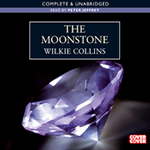 I say "read it again" but actually I am not sure I ever made it through the whole book before even though I have owned the book for a number of years. This time I listened to a spoken-word version - and it was great. The tale is told in sections by a number of different narrators; the story has a conversational style which changes according to the "writer" and therefore is well-suited to the spoken word, especially as Peter Jeffrey seems exceptionally adept in giving the characters voice. So I found it very digestible; in addition, there is a lot of tongue-in-cheek humour in the book, and I must say even though I think I take an interest in Victorian history, I was surprised by how much the humorous content felt quite contemporary. The story was originally written for serialisation in a magazine, so it is episodic in nature and somewhat "spun out" - and this also worked well as an audiobook.
I say "read it again" but actually I am not sure I ever made it through the whole book before even though I have owned the book for a number of years. This time I listened to a spoken-word version - and it was great. The tale is told in sections by a number of different narrators; the story has a conversational style which changes according to the "writer" and therefore is well-suited to the spoken word, especially as Peter Jeffrey seems exceptionally adept in giving the characters voice. So I found it very digestible; in addition, there is a lot of tongue-in-cheek humour in the book, and I must say even though I think I take an interest in Victorian history, I was surprised by how much the humorous content felt quite contemporary. The story was originally written for serialisation in a magazine, so it is episodic in nature and somewhat "spun out" - and this also worked well as an audiobook.
Given that the story is about a theft and not a murder, it is astonishingly similar to the Road Hill House crime, and is very obviously inspired by it. It follows the form: crime in a "posh" house, (erroneous) suspicion falling on a young lady, the key clue of the "missing nightgown" (stained with paint rather than blood), the character and fall from grace of Detective Cuff... and so on. Unlike the real world of course, it concludes with a satisfyingly happy ending.
[Sadly, no happy ending would ever have been possible for the real murder story.]
Posted on September 30, 2010 at 10:11 AM
Comments
I really liked Mr Whitcher, read on your recommendation. I also suggest The Woman in White - I believe you still have my copy.
hahahahaha
Posted by: Alison on October 21, 2010 4:20 PM
« Previous entry | Main | Next entry »Tuesday August 31, 2010
Books in August
This month saw the publication of a brand new magazine for spinners here in the UK called the Yarnmaker. I have been anticipating it for a while and it is truly excellent - quite a slim first issue but packed with content - and all about the things which interest me most (so my love for it may be a rather personal preference). I have immediately signed up with a subscription and fervently hope that they can keep up the high standard they have set.
Also this month, Rowan published their magazine for autumn/winter 2010 (No 48) somewhat earlier than usual. However the controversy about this year's free gift for members cast a bit of a shadow. I was absolutely delighted by the idea of their giving away an eco-friendly tote bag, and having received it now, I have to say it pretty well lived up to my expectation. However, there was a mass of complaints about it on Ravelry and other fora. Many people wanted yarn and not yet more tote bags, some did not want a bag "advertising a company", but mostly they complained about the quality - and I think Rowan's supplier did rather let them down over the latter. For myself - I have a lot of yarn, and the free gifts never gave me enough yarn to make anything I really wanted so my previous year's free gifts are all sitting around untouched. But even though I actually liked my bag, I was also sent an additional free book "to compensate me" - Winter Kids.
Anyway - the magazine itself is great - the Russian Doll section is especially lovely although I doubt I will ever knit any of its complex Fair Isle patterning (been there, done that, still working on it...); I had no time for the Timeless section - hated the presentation and pretty much hated the styles.
Posted on August 31, 2010 at 9:09 AM
« Previous entry | Main | Next entry »Saturday July 31, 2010
Books in July
- Dissolution C J Sansom
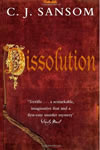 This is another book gift which it took me a while to get round to reading - it seems it's Sansom's first book of a series (up to about 5 now I think) featuring Matthew Shardlake a hunchback lawyer in the Tudor times.
I am not a really a fan of historical "detectives" as such, with whodunnits being an invention of the Victorian era as I see it; some contrivances completely lack credibility - and are then poorly written. But a good story (well executed) is always a good story and I thought this one was excellent. One aspect I particularly enjoyed for myself is that it imparts a lot of information on this period of Tudor history about which I knew relatively little. I do like to learn new things in such a digestible form.
This is another book gift which it took me a while to get round to reading - it seems it's Sansom's first book of a series (up to about 5 now I think) featuring Matthew Shardlake a hunchback lawyer in the Tudor times.
I am not a really a fan of historical "detectives" as such, with whodunnits being an invention of the Victorian era as I see it; some contrivances completely lack credibility - and are then poorly written. But a good story (well executed) is always a good story and I thought this one was excellent. One aspect I particularly enjoyed for myself is that it imparts a lot of information on this period of Tudor history about which I knew relatively little. I do like to learn new things in such a digestible form.
Many other reviewers have used the description "gripping" and I leave you with some words from James Naughtie, writing in the Sunday Times: "As good a new thriller as I have come across for years. The London of the 1530s smells real, the politics and the religious machinations are delicious and Sansom's voice rings true. His troubled hero Shardlake, doing Thomas Cromwell's dread work in the burning monasteries, is a kind of Tudor Morse and a character to treasure. Great stuff."
[There was some rumour of the BBC commissioning a series starring Kenneth Branagh but that seems to have evaporated. Someone suggested Tony Robinson for Shardlake - an excellent choice but sad to say a bit too old for the role now, as the character is pretty young - I would suggest maybe Burn Gorman.] - Charlotte Gray by Sebastian Faulks [Read by Jamie Glover]
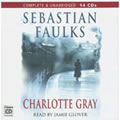 I will begin by saying the book is excellent and well worth reading. Again, I learnt a lot about (rather more recent) history. Although I am familiar with the facts of the chronological progress of WWII, I never before had pointed out to me - or bothered to look into - what the occupation of France really meant, with the wilful collaboration of the Vichy government after 1940, and the so-called "free zone" of France.
I will begin by saying the book is excellent and well worth reading. Again, I learnt a lot about (rather more recent) history. Although I am familiar with the facts of the chronological progress of WWII, I never before had pointed out to me - or bothered to look into - what the occupation of France really meant, with the wilful collaboration of the Vichy government after 1940, and the so-called "free zone" of France.
I was very interested in seeing the film starring Cate Blanchett when I saw the trailers in 2001; most of the reviews suggest it lacks passion, but despite that I am keen to catch it some time on DVD.
I understand that Faulks did a lot of research using contemporary accounts as the source for his fiction - this makes compelling and heart-breaking reading. I did find - though this is not necessarily a criticism - that the story was in two parts - the traumatic sub-plots sourced on real events, and the love story involving Charlotte. For all the detail about Charlotte's passion for her airman, I did not really feel for her; she is a restrained and someone cold little soul and I can see why they had trouble bringing her to the screen.
I do notice that the film has a different ending from the book. I think Faulks wanted to make a broader point about keeping faith, but I thought Charlotte's relationship with the Frenchman was more real than what I was perceiving as a fantasy about the airman. I was a little surprised by the reconciliation that ended the book - and also that it had a "happy" ending, (at least to Charlotte's romance - though you can't help feeling that it was rather small beer in comparison with the other events described).
Posted on July 31, 2010 at 8:49 AM
« Previous entry | Main | Next entry »Wednesday June 30, 2010
Books in June
-
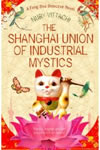 The Shanghai Union of Industrial Mystics Nury Vittachi
The Shanghai Union of Industrial Mystics Nury Vittachi
This is a "Feng Shui detective novel" - part of a series - a remarkably original gift from my step-daughter. It is a light-hearted humorous book - albeit rather black humour. Personally, I feel sorry for the elephant - yes, I am afraid to tell you that innocent elephants were indeed harmed in the making of this book.... -
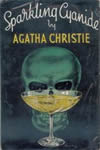 Sparkling Cyanide Agatha Christie
[Read by Robin Bailey]
Sparkling Cyanide Agatha Christie
[Read by Robin Bailey]
I enjoy listening to Robin Bailey reading Agatha Christie novels. His voice is like a comfortable chair - like listening to one of my old uncles reading to me (not that they ever did - this is an imaginary uncle).
I first read this novel when I was a teenager in a single afternoon - but remember little of the plot, as so often happens when you read a book quickly. Listening to it now, I quickly realised that this is a revamp of the short story "Yellow Iris" (1937) which featured Poirot. This novel (1945) does not feature her famous detective - though it does feature his good friend "Colonel Race". However, it is told from the point of view of an innocent heroine, Iris, (as opposed to Iris being the victim in the short story) and the victim is her sister Rosemary "for remembrance" whose character is somewhat altered and expanded. [The person wot dunnit has also changed!].
Iris does not see quite everything as we the readers do, and it is a (slightly) psychological thriller similar in feel to Margery Allingham's "Black Plumes". Will she escape the fate of her sister? Is she in love with the murderer?
I recently watched a very modernised TV adaptation (2003) starring Pauline Collins and Oliver Ford Davies - where they appear to be playing some kind of "Tommy and Tuppence" characters in a pretty unconvincing scenario (to be fair - probably no more unconvincing than those two fictional characters and their plots always were!) -
Taken at the Flood Agatha Christie
[Read by Hugh Fraser]
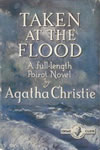 It was good to listen to the original text - and good to hear Hugh Fraser reading it. I have seen/heard several adaptations including the radio play - which seemed to stick pretty closely to the novel - and the TV adaptation as part of the David Suchet Poirot series - which did not.
It was good to listen to the original text - and good to hear Hugh Fraser reading it. I have seen/heard several adaptations including the radio play - which seemed to stick pretty closely to the novel - and the TV adaptation as part of the David Suchet Poirot series - which did not.
I did not much like the deviations in the TV adaptation - I think they were done mainly to fit with resetting the plot into the 1930s. As a consequence the fundamental foundation of the story line becomes a pre-planned "gas" explosion rather than an unplanned air raid. This not only does not fit half as well with the characters and their occupations (the heroine has been away serving her country and the emphasis is on how the war disrupted all their lives) but it also rather spoils the title reference.
"There is a tide in the affairs of men. Which, taken at the flood, leads on to fortune; Omitted, all the voyage of their life Is bound in shallows and in miseries. On such a full sea are we now afloat, And we must take the current when it serves, Or lose our ventures."
It is a quote about grasping an opportunity as it arises - now or never. It is not about anything preplanned.
I am not universally opposed to plot changes to suit adaptations of AC's work. Some are very original and she herself rewrote her own plots (as above in Yellow Iris for one example). I much enjoy the recent reworking of the Miss Marple stories where she is shoe-horned into other people's adventures in a completely seamless way. After all, Joan Hickson said all there was to say about the original character as written, and these newer stories are exploring ways to add something. But... the Poirot alterations have not been so good; David Suchet has yet to complete his definitive TV adaptations of the canon - so it's not the time to fiddle about with the plots to such a degree. Sadly, "Cards on the Table" was a particularly unworthy of his stated aims for the series - and, now it's done he will have no opportunity to "correct" it.
Posted on June 30, 2010 at 8:58 AM
« Previous entry | Main | Next entry »Monday May 31, 2010
Books in May
I have been catching up on a lot of podcasts this month - very ancient "Front Row" highlights from Radio 4. However, the copious quantities of knitting have led to the consumption of a couple of "old favourites" - reading to match my vintage knitting I think.
- Over the Gate by Miss Read [read by Gwen Watford]
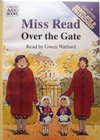
While idling through one of Lucy Mangan's regular articles in the Guardian earlier this year, I was caught by her reference to the "Miss Read" stories. I was aware of Miss Read from my teenage years, but spurned her books as cosy and trivial (once I had discovered they were not about crime). However - I find myself drawn to Lucy and her opinions - and she seems very keen on these books - so I figured it must be "OK" to read them...
As she puts it they tell "the (very small) adventures of fine English folk in a variety of fine English villages" and admittedly she has more of an excuse to read them than I do - in her case being a "palate-cleanser between meatier courses" whereas in my case I suspect they are undoubtedly the main course - in fact the only course.
They are of course charming (you have to use that word) and I enjoyed this reading by Gwen Watford giving the perfect voice to the school mistress. - Queen Lucia by E F Benson [read by Geraldine McEwan]
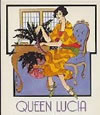
E F Benson seems to have a cult following akin to that of G&S or the Goons. Despite my enthusiasm for Lucia - I was a bit surprised to discover this (when I visited Rye and found there was an E F Benson tourist walk). I suppose I first came upon the books through a non-purist route of seeing Geradine McEwan capture Lucia on the television - and after listening to the audiobooks, those TV adaptations seem to me to have achieved a perfect depiction.
I listened to several of the books in the 1980s read by McEwan and Prunella Scales (Miss Mapp on the TV), and I thought they were worth revisiting - and again I was surprised that although the audiobooks are available, the versions read by these two actresses are hard to obtain. Anyway - this was the first - and just as much fun as ever.
Posted on May 31, 2010 at 3:03 PM
« Previous entry | Main | Next entry »Friday April 30, 2010
Books in April
- The Little Stranger by Sara Waters
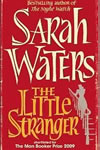
I saw a review of this book along with 5 other Booker Prize nominees in 2009; it did not win the prize but is also nominated for the Orange prize 2010. I loved it from the start as it drew me in to the description of post-war rural Britain and a declining country estate. However, it is a strange and rather sad tale about the "little stranger" which it took me a while to catch on to as I was so enjoying the story of the characters.
It reminded me of my favourite J B Priestley novel Bright Day which is set somewhat earlier before the war (both wars in fact), and also recounted as a reminiscence. It also has two layers - the first being a wonderful cosy description of the hero's life as he starts out working in what is actually Bradford - somewhat autobiographical I believe - and then the actual nub of the story and moving on to "present day" (1946) with the sting in the tail. Like many of Priestley's stories ( Inspector Calls, Dangerous Corner ) this is a kind of morality play - and this moral I particularly like. It points out how misleading it is to believe someone else's life to be "perfect" and perhaps wishing you were they.
Little Stranger is a very different story but has the same flavour, poignantly evoking an older culture - and where things are not quite as they seem on the surface. I highly recommend it. - Third Girl by Agatha Christie [read by John Woodvine]
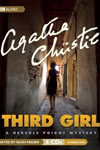
Having seen the TV adaptation of this book with David Suchet, I went back to the source. This is from AC's 1960s period where you can feel her own sentiments about the modern age coming through - Poirot is a little perplexed and out of his depth - "modern girls" and their lifestyles are explained to him (and us!) by Mrs Oliver - he is told he is "too old!" ...and he feels it. There is a lot of time spent where we watch the little grey cells at work through the pages. Overall the TV adaptation did it justice - they are generally not able to reproduce the chemistry of the cast, and light-heartedness of the short story adaptations in the 1980s.
Having said that, I recently watched a TV adaptation of The Pale Horse (1997) - which I remember as a gripping book. Here AC seems totally at home among the new generation of bright young things - I always thought there was a great similarity in culture between the 1930s and the 1960s - both times of great change in art, lifestyles, and outlook. However, seeing the publishing date of 1961, I guess it more reflected the 1950s art world - certainly the TV adaptation was very true to the styling of the late 50s with the hero in leather jacket and black turtle neck (he was an artist...). Third Girl is squarely in 1966 - swinging London, mini-skirts, .... drugs (pretty central to the plot).
Posted on April 30, 2010 at 11:15 PM
« Previous entry | Main | Next entry »Wednesday March 31, 2010
Books in March
- Walking in Pimlico by Ann Featherstone
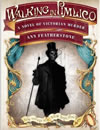
I thought this book was absolutely wonderful. It is a psychological thriller - a great story, as well as well written. Another of Robert's choices for me, it also has a connection with arts and entertainment. The author is (or has been) a lecturer in performance history at Manchester University, and a researcher in drama department at Royal Holloway, University of London. She presents her dialogue (or at least some of it) in the argot of the Victorian music hall and - unlike my final book for this month - provides a fantastic depiction of the life, including the police force, of that time. I cannot comment on whether or not it is correct but it is is utterly convincing. She uses her research and knowledge apparently effortlessly within the plot, making for a fascinating read, while skilfully allowing the narrative flow and not be bogged down by extraneous detail.
To 'walk in Pimlico' is colloquially "to be handsomely dressed". - The Monster in the Box by Ruth Rendell [read by Nigel Anthony]
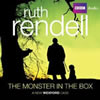
Inspector Wexford story in which he looks back to his life as a young policeman in order to solve his current case. One could view the outcome as successful or not - given that he is sure of the murderer from the outset but not only fails to prevent a further murder, but actually seems to instigate one. The book explores our attitudes to a multicultural Britain from a few different viewpoints, though I am not sure I felt any conclusion is reached. - The Railway Viaduct by Edward Marston [read by Sam Dastor]
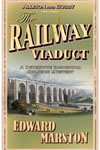
This is not the best book I have ever read. A rather strange depiction of policing in general as well as Victorian Britain, and criminal motivation.
Good enough to amuse me while driving and while spinning (....not at the same time), since the plot is not hard to follow and is delivered at a pedestrian pace.
Posted on March 31, 2010 at 1:06 AM
« Previous entry | Main | Next entry »Sunday February 28, 2010
Books in February
All knitting books this month - not doing well with reading. I did make an attempt at Eat, Pray, Love - lent by my sister, though she was not very smitten by the book but, like me (and, I presume, all women), recognised some of the scenarios. I could not read more than a chapter or two as I was not very interested in the author or what happened to her. Read the Wikipedia entry where it quotes the New York Times critic descibing it as "narcissistic New Age reading" - which about sums it up for me.
-
Debbie Bliss magazine (issue 4) by Debbie Bliss
Another lovely magazine from Debbie Bliss. I have not felt so smitten by the designs in this issue - but maybe I am not so keen on casual summer knitwear in general. However, it is a whole "lifestyle" magazine with knitted soft furnishings, and even recipes - in the true Stitchcraft magazine tradition! I love the insights into Debbie's inspirations, and her book (and other) collections. -
 Rowan Magazine 47 edited by Marie Wallin
Rowan Magazine 47 edited by Marie Wallin
As you know I am committed to the Rowan canon and this is another excellent magazine from the brand. Again, I am rushing off to buy the wool - which may, be as above, that I am less smitten by summer styles, or it may be that I already have a lot of outstanding UFOs. I have only recently knitted one of the winter offerings - I find my style influences tend to be a couple of years behind the times - takes a while for me to get used to new trends! Of these designs I did like Brighton (from new designers I think) and Tourquay the theme here being the ice cream colours used assymetrically. -
500 Handmade Dolls: Modern Explorations of the Human Form (500 Series) Lark Books
A weird and wonderful book of art dolls - a sort of Mervyn Peake world in 3-D miniature. Needless to say, this delightful book was found for me by Robert, who has a knack for turning up the unusual.
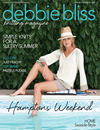

Posted on February 28, 2010 at 10:04 AM
« Previous entry | Main | Next entry »Sunday January 31, 2010
Books in January
No fiction again this month. I have been listening to podcasts of the BBC series The History of the World in 100 Objects, which in itself is a fascinating project even without the series - and by the way - isn't it curious to choose to "display" objects in this way on the radio? But then - I think that is part of the point - see them on line and at the British Museum.
- Respect the Spindle Abby Franquemont
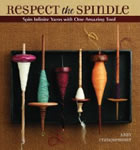 All my spinning books start with some elementary spindle information, but I never found it very interesting - it bore little relation to the act of using a spindle I felt. I included this book on my wishlist, as I don't have a book on this topic and I thought - why not?. I have my new (decorative only?) spindle from Woolfest - so I felt I could invest a little more in the knowledge. I certainly had no intention of "going into" spindle spinning in preference to the wheel. But...
All my spinning books start with some elementary spindle information, but I never found it very interesting - it bore little relation to the act of using a spindle I felt. I included this book on my wishlist, as I don't have a book on this topic and I thought - why not?. I have my new (decorative only?) spindle from Woolfest - so I felt I could invest a little more in the knowledge. I certainly had no intention of "going into" spindle spinning in preference to the wheel. But...
This is really is one of the most interesting books I have read. The author really made me understand - and believe - that the spindle is a better and faster tool for spinning certain types of thread. It is not an accident or lack of technology that prevented ancient peoples developing the wheel, but appropriate choice for the job in hand. She also discusses the physics of spindles - which is fascinating for me - and made me think I might actually start to see the point of angles of momentum, and moments of inertia in a way that I did not when at school - no-one ever discussed spindles at that time, or it might all have been different.
It also indicates that my apparently random choice of spinning my little bag of alpaca on my fancy spindle might just have been a sound one after all. - The Hummingbird Bakery Cookbook Tarek Malouf
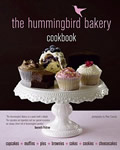 Tony recommended this American cup cake recipe book from the Hummingbird Bakery. So it became another wishlist item, along with a set of reusable silicon cake cases. Now I simply want to make all the cakes at once, they sound so good, (though I shall be making fairy cakes not cup cakes of course...!).
Tony recommended this American cup cake recipe book from the Hummingbird Bakery. So it became another wishlist item, along with a set of reusable silicon cake cases. Now I simply want to make all the cakes at once, they sound so good, (though I shall be making fairy cakes not cup cakes of course...!).
I like the recipes as they are not simply plain cakes with inventive decorations but actually different flavoured cakes and toppings. The decorations are relatively restrained - but I am sure you can use your own initiative on that score. The only snag I see now is that I need a food mixer (or jolly strong arms) - Tony acquired mixer and book together I think. Not sure if I am ready for a new gadget... maybe... George and I did get out his juice extractor to make the clementine and cranberry marmalade....
Anyway - "Yum's the word". - Rôtis Stéphane Reynaud
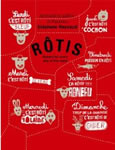 This was a surprise gift, and though I am always pleased with a cookbook, I did think it was odd to have a book all about roast dinners. I imagined each recipe must read: heat up oven, put in large joint of meat, take out joint of meat, carve, eat.
This was a surprise gift, and though I am always pleased with a cookbook, I did think it was odd to have a book all about roast dinners. I imagined each recipe must read: heat up oven, put in large joint of meat, take out joint of meat, carve, eat.
Well... there we are - I was quite wrong. This is a book of "every day" roasts and includes pot roasts - which are almost stews - and is not restricted to meat and poultry but includes fish - and veg.
The layout appeals to me as well - each dish wonderfully photographed; this stems from my first and still favourite cookery book today - the Good Housekeeping Picture Cookery Book from the 70s - which has pictures. A trained chef friend of mine always scorned my love of pictures in cookery books - but it really does help if you have never seen the dish before. A German friend once produced some little cakes with a big flourish saying "no need to tell you what these are!" - but I had no idea - I was racking my brains for a well known English cake - they looked like brioche - anyway they turned out to be scones, and they were delicious... just... different. A schoolfriend once entered a competition for "rock cakes" but hers were in little cake cases and looked like fruited queen cakes - she was quite amazed to see everyone else's untidy little piles of cake.
Back to the roasts - "yum" again.
Posted on January 31, 2010 at 12:53 PM
« Previous entry | Main | Next entry »Thursday December 31, 2009
Books in December
Frantic activity all through December left little room for reading. However, I received some great books as gifts.
- Make Do and Mend: Keeping Family and Home Afloat on War Rations (Official WWII Info Reproductions)
foreword by Jill Norman
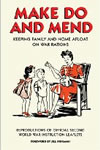 A wonderful book reflecting my interests in this aspect of history and culture. These are fac similes of the "Make Do and Mend" leaflets issued by the British government during World War II. Clothes rationing was implemented by issuing coupons which allowed minimal purchases of not only clothes but the raw materials to make your own clothes - so recycling of fabrics** and yarns was a necessity. The initial coupon allowances introduced in 1940 were gradually reduced throughout the war, and ironically, when the war was "won", (and America ceased to subsidise the British economy), even stricter rations were imposed.
A wonderful book reflecting my interests in this aspect of history and culture. These are fac similes of the "Make Do and Mend" leaflets issued by the British government during World War II. Clothes rationing was implemented by issuing coupons which allowed minimal purchases of not only clothes but the raw materials to make your own clothes - so recycling of fabrics** and yarns was a necessity. The initial coupon allowances introduced in 1940 were gradually reduced throughout the war, and ironically, when the war was "won", (and America ceased to subsidise the British economy), even stricter rations were imposed.
There is some suggestion that many of the rules and guidelines could still be applied today - which is true. However, I think it's worth remembering that these makeovers had none of chic associated with the current fad for so-called recycling; everyone loathed it.
** I also own an original 1940s sewing pattern telling you how to cut out the two-tone blouse from "two of your husband's old shirts". - Spin Control: Techniques for Spinning the Yarns You Want
by Amy King
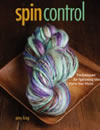 I have been longing to read this book. I think I already "know" (the theory of) some of the fundamental information in it - with respect to woollen and worsted spin, and different methods of drafting - but there is so much more here. It gives excellent photos and explains clearly the actual effect of what what you are doing with respect to a finished knitted result - concepts I had never really considered.
I have been longing to read this book. I think I already "know" (the theory of) some of the fundamental information in it - with respect to woollen and worsted spin, and different methods of drafting - but there is so much more here. It gives excellent photos and explains clearly the actual effect of what what you are doing with respect to a finished knitted result - concepts I had never really considered.
Now I have already read it from cover to cover, I am not sure it will actually alter my ability to control what I spin. However, I know I will refer to it again and again to remind myself what to expect from the techniques I am using. And who knows? maybe - gradually - the control will come. - Knitted Socks East and West: 30 Designs Inspired by Japanese Stitch Patterns
by Judy Sumner
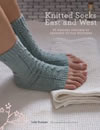 An interesting book with some great patterns - lots of complex stitch work though, so not so much for patterned yarns. I think this is a lovely and original collection, though I would take issue with the author's assertion that the actual stitches are unknown, or never before conceived of in the West. It's not that she is "wrong" and I am sure that she did spend many interesting hours interpreting Japanese patterns - and making it so much easier for us. However, there are a lot of old "western" patterns with many interesting techniques and frankly bizarre stitches which do reflect the same "kinds of" (that is not identical) techniques described in this book. As to the complexity of the stitches - my past experience of being taught the "Japanese" way of doing short rows and wrapping stitches gave me the impression that the method seemed unnecessarily complex for very little benefit, and very little observed difference in the result.
An interesting book with some great patterns - lots of complex stitch work though, so not so much for patterned yarns. I think this is a lovely and original collection, though I would take issue with the author's assertion that the actual stitches are unknown, or never before conceived of in the West. It's not that she is "wrong" and I am sure that she did spend many interesting hours interpreting Japanese patterns - and making it so much easier for us. However, there are a lot of old "western" patterns with many interesting techniques and frankly bizarre stitches which do reflect the same "kinds of" (that is not identical) techniques described in this book. As to the complexity of the stitches - my past experience of being taught the "Japanese" way of doing short rows and wrapping stitches gave me the impression that the method seemed unnecessarily complex for very little benefit, and very little observed difference in the result.
But I do not wish to sound churlish - this is a lovely book and I look forward to knitting a number of the patterns from it in the next 12 months. [Maybe not so many of the type indicated on the cover photo ie those without toes or indeed in some cases no feet at all. Just to reassure you that many of the socks depicted are ..... well..... socks].
Posted on December 31, 2009 at 11:29 AM
« Previous entry | Main | Next entry »Monday November 30, 2009
Books in November
This month I have been doing a lot of machine knitting - none of which worked out very well, and is due to be unraveled. However I worked to the accompaniment of a number of podcasts from the BBC, and a couple of light-weight talking books.
- Agatha Raisin and the Haunted House and the Deadly Dance by M C Beaton
[Read by Penelope Keith]
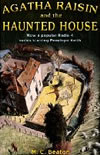
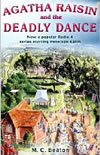
Agatha finally opens her own detective agency, and realises that the opportunity for investigating murders on a professional basis is not what it's all about. In fact, it offers more in the line of finding lost cats. Despite this, she is soon embroiled in more "murders and mayhem" - and still trying to fight the signs of ageing whilst pursuing unworthy men.
Sigh.
Posted on November 30, 2009 at 10:31 AM
« Previous entry | Main | Next entry »Saturday October 31, 2009
Books in October
Almost a repeat of my entry for May - the autumn books from Debbie Bliss and Louisa Harding are now available.
- Debbie Bliss magazine (issue 3) by Debbie Bliss
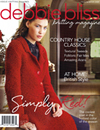
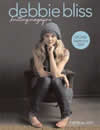 A number of interesting articles, and, as usual, a great selection of winter patterns from Debbie. Take a look at them at the Laughing Hens site. I love the cabled slipper socks, the fair-isle hot water bottle cover, the tartan tea cosy... and ... and... It's like POM condensed into one magazine ...well maybe with better looking and more up to date styles! Anyway lots of projects to look forward to this winter - will any of them make it as Christmas Gifts I wonder?
A number of interesting articles, and, as usual, a great selection of winter patterns from Debbie. Take a look at them at the Laughing Hens site. I love the cabled slipper socks, the fair-isle hot water bottle cover, the tartan tea cosy... and ... and... It's like POM condensed into one magazine ...well maybe with better looking and more up to date styles! Anyway lots of projects to look forward to this winter - will any of them make it as Christmas Gifts I wonder?
I have put two cover images here, but it is only one magazine - the image on the left was the "preorder" marketing cover, and the one on the right was the one that was actually chosen when the magazine was published. I really preferred the preorder version (and when Laughing Hens sent me the magazine I thought I had received the wrong one somehow!) - but I can see the final choice may have more marketing impact. Not sure what this says about my fashion/style preferences - certainly not that I don't like red - but I have not rushed into knitting any of the items inside that red cover. Maybe I just have too many other things to finish right now.
- Little Cake and Queen of Hearts by Louisa Harding

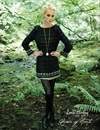 Now here, unpredictably, I have already rushed into buying wool to make a couple of these styles. I bought wool at Ally Pally to make a cardigan (Puzzle ), and a dress (Two), both from Queen of Hearts. One item from Little Cake (Featherbed has already "made it" as a Christmas Gift (yes, completed and ready to go).
Now here, unpredictably, I have already rushed into buying wool to make a couple of these styles. I bought wool at Ally Pally to make a cardigan (Puzzle ), and a dress (Two), both from Queen of Hearts. One item from Little Cake (Featherbed has already "made it" as a Christmas Gift (yes, completed and ready to go).
I find the styling of the models most beguiling - even though I don't buy into looking like that myself (which is just as well - not just an age thing although that doesn't help!). I don't think I had the sense of style or the imagination to look like this even when I were younger. However, I love the idea of these quirky goth type models, and hope I can look stylish nonetheless. But first I have to knit them - right?
Posted on October 31, 2009 at 11:51 AM
« Previous entry | Main | Next entry »Wednesday September 30, 2009
Books in September
- T is for Trespass by Sue Grafton [Read by Liza Ross]
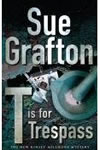 A frightening tale for all of us who are "getting on a bit" - though I am not in possession of any substantial material wealth in the shape of jewellery or real estate, so maybe I don't warrant the attention of con men (or women). Lets hope.
A frightening tale for all of us who are "getting on a bit" - though I am not in possession of any substantial material wealth in the shape of jewellery or real estate, so maybe I don't warrant the attention of con men (or women). Lets hope.
I see there is a version read by Lorelei King, who I think is an excellent reader and would very much like to hear her as the voice of Kinsey Millhone. I find Liza Ross a little whiny - partly this is her accent - but it has to be said that the character is a little whiny so I am not overly critical of her style! - Saving Fish from Drowning by Amy Tan
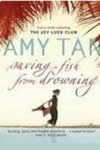 This is a strange novel in that it starts with the premise that the narrator is dead - in that context I suppose it has some ethereal features in common with the Penelopiad. Even though the plot is fantastic in the true sense of the word, it is utterly gripping in a very much down-to-earth sense; you are right there with the characters, fearing for their every stupid move. Right up to the last few pages I feared for the outcome for the unworthy western heroes, which seemed would inevitably to end in tragedy. And I suppose if I had proper consideration for all the characters rather than just the western ones - it really did end most tragically. As usual, a very poignant (and political) story, even if told with a slightly more fantastical air.
This is a strange novel in that it starts with the premise that the narrator is dead - in that context I suppose it has some ethereal features in common with the Penelopiad. Even though the plot is fantastic in the true sense of the word, it is utterly gripping in a very much down-to-earth sense; you are right there with the characters, fearing for their every stupid move. Right up to the last few pages I feared for the outcome for the unworthy western heroes, which seemed would inevitably to end in tragedy. And I suppose if I had proper consideration for all the characters rather than just the western ones - it really did end most tragically. As usual, a very poignant (and political) story, even if told with a slightly more fantastical air.
- End Games by Michael Dibdin
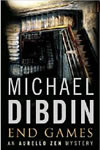 This book is regarded as a return to form - it has a less glum feel about Zen's health and personal life. The plot however does bring us back to the usual deeply depressing view of a corrupt society - and the rather gruesome black humour.
This book is regarded as a return to form - it has a less glum feel about Zen's health and personal life. The plot however does bring us back to the usual deeply depressing view of a corrupt society - and the rather gruesome black humour.
I think Peter Guttridge's article from 2007 provides an excellent review of both this book, and Dibdin's writings. [The reference to tomatoes in the title of the article refers to Zen's apparent dislike of their constant use in Calabrian cuisine]. I note that the first book, the Sherlock Holmes pastiche, which I found so very remarkable, has been "constantly in print in the UK for 30 years".
It's hard to adjust to the idea that this really was the end of the game.
Posted on September 30, 2009 at 11:43 AM
« Previous entry | Main | Next entry »Monday August 31, 2009
Books in August
My peaceful August boating holiday gave me plenty of time to catch up with my reading as well as listening to the spoken word.
- The Brass Verdict by Michael Connelly
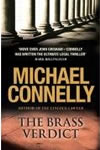 I think it's fair to say that I could not wait to get my hands on this book and enjoyed every minute of reading it. Our hero maintains some of what seems the Connelly tradition of being unable to retain any kind of settled relationships (and I mean that loosely - not with a capital "R") but maybe that's actually how life is, as well as adding drama to the book. He (hero) has been through a lot since we last met him and is having to reshape his life as the books starts out - and we leave him at the end of the book with a stated direction of reshaping his life yet again - but through choice this time.
I think it's fair to say that I could not wait to get my hands on this book and enjoyed every minute of reading it. Our hero maintains some of what seems the Connelly tradition of being unable to retain any kind of settled relationships (and I mean that loosely - not with a capital "R") but maybe that's actually how life is, as well as adding drama to the book. He (hero) has been through a lot since we last met him and is having to reshape his life as the books starts out - and we leave him at the end of the book with a stated direction of reshaping his life yet again - but through choice this time.
His interaction with Bosch is quite interesting. I find it hard to see the character we know and love portrayed as he is in this book - but it's just because it is through anothers eyes. And Bosch has some relevant baggage that he's hefting around.....
This book is excellent in my opinion but .... although I hate to say it out loud.... not as good as the Lincoln Lawyer. I don't think it was simply due to my high expectation - I just think Lincoln Lawyer plot was so excellent that it's hard to match it - and I am not at all disappointed that Connelly did not quite do so. - The Penelopiad by Margaret Atwood
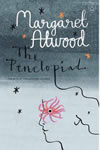 Helen recommended that I read this book - she felt it was just the sort of thing I would enjoy - and she was right. It was very refreshing and funny. For some reason I conjured the idea of Ray Winston as Odysseus - not necessarily given her physical description of him (in case he finds my comparison offensive!).
Helen recommended that I read this book - she felt it was just the sort of thing I would enjoy - and she was right. It was very refreshing and funny. For some reason I conjured the idea of Ray Winston as Odysseus - not necessarily given her physical description of him (in case he finds my comparison offensive!).
I have enjoyed a number of other Atwood novels - they are a joy to read in the sense of the written word - and they break your heart. I recommend Blind Assassin, Alias Grace, and her short stories.
Rob lent me Alias Grace, (which I like a lot), and I gave him Surfacing, which he found perplexing... I have yet to read it. - Five Quarters of the Orange by Joanne Harris [Read by Diana Bishop]
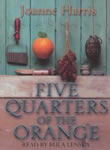 This was the novel I listened to while we were chugging along in our boat - and while I was knitting. It was brilliant and exceeded my expectation. I have seen the film version of Chocolat, and I have also read Blackberry Wine - which was perfect for me as the hero reminisced about his childhood in the same period as my own - and the book was set in two separate time periods with two stories running side by side, with a good dollop of romance thrown into the present day.
This was the novel I listened to while we were chugging along in our boat - and while I was knitting. It was brilliant and exceeded my expectation. I have seen the film version of Chocolat, and I have also read Blackberry Wine - which was perfect for me as the hero reminisced about his childhood in the same period as my own - and the book was set in two separate time periods with two stories running side by side, with a good dollop of romance thrown into the present day.
Five Quarters of the Orange was of exactly the same form, but with an elderly heroine looking back to a much earlier period - and still managing an, albeit mature, romance in the present day. She described the struggle during her adolescence in her relationship with her Mother and siblings - and I found it all very resonant despite not having been brought up in poverty on a small holding in occupied France during WW2. Added to this there was almost a murder mystery element - so I was charmed and enthralled.
The book was helped a lot by being simply beautifully read - totally convincing voice for the mature heroine, sounding both slightly wistful about the past and yet firmly settled in the present, and the inevitable phrases in French were excellently rendered - neither pretentious nor over-emphasised. Just perfectly judged.
Posted on August 31, 2009 at 12:45 PM
« Previous entry | Main | Next entry »Friday July 31, 2009
Books in July
- Jackson's Dilemma by Iris Murdoch [read by Juliet Mills]
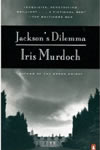 It's a long time since I read any Iris Murdoch novels - probably not since I was a student at which time she was very much in vogue. I am not sure I understood them very well at that time - I was trying to expand my reading matter and everything was new to me. Even now, when I read AS Byatt, or Angela Carter, I find it hard to understand them - so maybe it was just that era.
It's a long time since I read any Iris Murdoch novels - probably not since I was a student at which time she was very much in vogue. I am not sure I understood them very well at that time - I was trying to expand my reading matter and everything was new to me. Even now, when I read AS Byatt, or Angela Carter, I find it hard to understand them - so maybe it was just that era.
This is her last novel and has engendered some harsh criticism which I think is unwarranted. I presume she had probably already begun to feel the effects of her disease, and there seems little point in saying what basically boils down to "it's not as good as her other novels". One critic complains that the people are not believable and date from a pre-war era - I think he is mistaken - the people are not 21st century, maybe not meant to be, but rather more from the 1960s I would say - one forgets how backward society still was at that time .... Literary criticisms when it was first published comment that "the writing is a mess" and sum it up as a "very odd book".
For myself I did find it hard to see the dilemma of the title. However it seems clear that the tone of the book relayed anxiety, and towards the end, Jackson sits alone and reveals a confused state of thinking which surely must have reflected some of the authors own confusion.
In addition, I'm afraid this novel was not improved by Juliet Mills as the reader. - Book Of The Dead by Patricia Cornwell [read by Lorelei King]
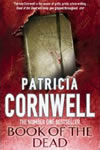 This was an interesting novel, as usual from Patricia Cornwell - gory but interesting. I do find the characters hard to empathise with - all of them actually - not just Scarpetta, who is such a cold fish, for all her Italian genes. They seem to behave in a wholly unbelievable way. A certain amount of irrational behaviour makes a book interesting, and is eminently believable. But all the characters seem constantly embroiled in battling with each other, and all seem victims of such weird hang-ups you can hardly see how they function in society - and that's not even the serial killers...
This was an interesting novel, as usual from Patricia Cornwell - gory but interesting. I do find the characters hard to empathise with - all of them actually - not just Scarpetta, who is such a cold fish, for all her Italian genes. They seem to behave in a wholly unbelievable way. A certain amount of irrational behaviour makes a book interesting, and is eminently believable. But all the characters seem constantly embroiled in battling with each other, and all seem victims of such weird hang-ups you can hardly see how they function in society - and that's not even the serial killers...
At he end of this volume Marino goes missing, and we have to wait for the next book for him to turn up again. Alive or dead I wonder? - Bare Bones by Kathy Reichs [Read by Barbara Rosenblat ]
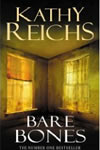
I am firmly hooked on the Kathy Reich's forensic detective novels, which have a far more human heroine in Tempe Brennan than the comparable Kay Scarpetta. This is an earlier book in the sequence, than the other novels I have listened to.
These characters are believable and easier for me to understand - just classic detective novels, not psychological thrillers. Not so gory - more clinical - and not so weird.
So on that basis, is my approval good or bad for an author?!
Posted on July 31, 2009 at 8:25 AM
« Previous entry | Main | Next entry »Tuesday June 30, 2009
Books in June
- The Girl with the Dragon Tattoo by Stieg Larsson, (translated by Reg Keeland)
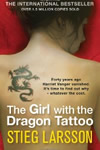 This is yet another much publicised book that passed me by - my friend Helen said "...have you read it yet..." as opposed to "...have you heard of...." - so I immediately went to order it from the library to find it was another 30-copy investment on their part - but still with 12 reservations outstanding. There are two further novels involving the same characters, so I had better get my name into the reservation queue...
This is yet another much publicised book that passed me by - my friend Helen said "...have you read it yet..." as opposed to "...have you heard of...." - so I immediately went to order it from the library to find it was another 30-copy investment on their part - but still with 12 reservations outstanding. There are two further novels involving the same characters, so I had better get my name into the reservation queue...
I notice there has been some criticism of the actual writing style, and a suggestion that the characters may not be fully drawn, but it did not spoil my reading of the book. Jonathan Gibbs in the Independent says if it is "a little amateurish, then perhaps that works to its advantage. This never feels like a by-the-numbers thriller."
The author was a journalist and this is his début novel. Given my devotion to Michael Connelly, I am further confirmed in my view that there is something about journalistic style in crime novels that I find particularly appealing. I say Larsson "was a journalist" since the author presented his publishers with this crime trilogy and promptly died of a heart attack. This sounded so unlikely - and since these are conspiracy-type books involving investigative journalism - I wondered if it were some kind of warped publicity stunt (début novels, died "suddenly" etc). However, all too sadly, it is true and so we also have to enjoy these books as his first and last. - Ella Minnow Pea by Mark Dunn
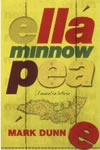 This book was featured in BBC's "A Good Read" on Radio 4 in early June. It sounded so intriguing that I had to read it.
This book was featured in BBC's "A Good Read" on Radio 4 in early June. It sounded so intriguing that I had to read it.
In order to intrigue you as well I have to mention the plot:
There is a statue dedicated to an island's most famous celebrity, the (supposed) inventor of the pangram "The quick brown fox jumps over the lazy dog.". However, the sentence, which is inscribed on the statue, begins to crumble, and one by one the letters gradually fall off - so the council decides to bar islanders from using the fallen letters. Read on...
The island on which the book is set must be modelled on Tangier Island (a little like Sark in the Channel Islands) - proud to embrace an "older" style of life and proud of its isolation. The book is slightly satirical about that in itself. However, mainly it is about the dangers of political power, religious manipulation as a tool of the state, and corruption. One cannot help making the comparison with Orwell, given the linguistic distortions imposed on the islanders by the council, though this is a much more light-hearted, (nonetheless thought provoking) novel. It is a very clever book and has lots of fun as it presents itself in the form of letters, each written to conform to the new and increasingly impossible laws. - Deep Black by Andy McNab [Read by Clive Mantle]
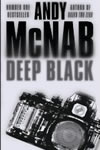 I read Remote Control after I found I much enjoyed listening to a couple of other McNab thrillers (read by Colin Buchanan) on OneWord Radio*. Remote Control was his first fiction book in the Nick-Stone-action-hero series and introduced us to his ward Kelly; it was very moving and his relationship with Kelly was charmingly drawn. Hence I was a bit bit disappointed to find she had been despatched somewhere along the line and this book sees Nick in a resulting slough of despond at the start. It soon picks up, of course, and the usual exciting thriller ensues.
I read Remote Control after I found I much enjoyed listening to a couple of other McNab thrillers (read by Colin Buchanan) on OneWord Radio*. Remote Control was his first fiction book in the Nick-Stone-action-hero series and introduced us to his ward Kelly; it was very moving and his relationship with Kelly was charmingly drawn. Hence I was a bit bit disappointed to find she had been despatched somewhere along the line and this book sees Nick in a resulting slough of despond at the start. It soon picks up, of course, and the usual exciting thriller ensues.
His books are very convincing, and I retain a lot of sympathy with McNab after hearing him describe his childhood "in the system" prior to joining the army. I don't mean I feel sorry for him, just that, again, everything he said rang so true of that era from my own experiences. (I should make it clear that I did not by any means have a deprived childhood, but could see many around me not so fortunate).
* OneWord Radio - the "only radio programme devoted to the spoken word" - specialised in broadcasting famous literary works, read either by the authors themselves or by well known actors; it ceased broadcasting at the beginning of 2008. - Dead Heat by Dick Francis and Felix Francis [Read by Tony Britton]
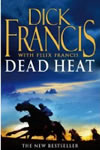 This and other recent books published under the "Dick Francis" brand have been written with his son Felix, (and in at least one passage I can clearly hear the voice of the jump jockey's son coming through in the voice of the hero). This type of collaboration is not really a departure as he always acknowledged the heavy contributions of his wife to his previous books, even though she was never overtly credited as an author. However, this book lacked something - as much as I can narrow it down, it failed to convey the underlying threat of any real danger to the hero, and there was no sinister-villain-with-a-smile-on-his-face. I don't necessarily attribute this to being to do with the new co-authors - I remember being a little disappointed with Reflex which was written in 1980. Mostly I attribute it to being more of departure from the racing themes. There is no doubt that the racing-based novels are the best ones - and although they all seem to have a link with racing in some way, some seem less contrived than others.
The heroes always have some less than average profession, and some of the novel is spent in telling you all about that profession - somehow this works better for Francis when the description is about racing - he knows what to explain and what to assume you know.
This and other recent books published under the "Dick Francis" brand have been written with his son Felix, (and in at least one passage I can clearly hear the voice of the jump jockey's son coming through in the voice of the hero). This type of collaboration is not really a departure as he always acknowledged the heavy contributions of his wife to his previous books, even though she was never overtly credited as an author. However, this book lacked something - as much as I can narrow it down, it failed to convey the underlying threat of any real danger to the hero, and there was no sinister-villain-with-a-smile-on-his-face. I don't necessarily attribute this to being to do with the new co-authors - I remember being a little disappointed with Reflex which was written in 1980. Mostly I attribute it to being more of departure from the racing themes. There is no doubt that the racing-based novels are the best ones - and although they all seem to have a link with racing in some way, some seem less contrived than others.
The heroes always have some less than average profession, and some of the novel is spent in telling you all about that profession - somehow this works better for Francis when the description is about racing - he knows what to explain and what to assume you know.
And while we are on the theme of formula writing - his novels are written to a clear formula - explained in Wikipedia - though I beg to differ on their description of the love interests of his heroes. I always found the personal circumstances of the heroes and peripheral characters most interesting, often not revolving around simple nuclear family ideas - nor even conventional "difficult" marriages. They often express people quietly adapting their lives to their own requirements for modern living and making a go of things as best they can.
His heroes are usually very successful in what they do, and in their prime - aged around 30. And this brings me to my problem with the reader. Tony Britton is an excellent reader and I have heard him read other Francis novels... but... Even in his prime Tony Britton always sounded avuncular and mature. He just does not sound like a 30 year old, and this is accentuated by the books being written in the first person. I note that there is a version of the book read by Martin Jarvis - he is no young slip of a lad but I would be interested to hear if he sounds any more convincing.
Posted on June 30, 2009 at 9:50 AM
« Previous entry | Main | Next entry »Sunday May 31, 2009
Books in May
Good value books and magazines with fresh wearable styles for the summer.
- Debbie Bliss magazine (issue 2) by Debbie Bliss
 This is an excellent value magazine - it has a lot of great patterns and it's about a third of the price of most pattern books. But never mind the width - this magazine has high quality too. It is a magazine in the true sense of the word with many really good knitting articles, not just feature padding, and lots of ideas and information about Debbie's own inspirations over the years. I found it a very interesting read.
This is an excellent value magazine - it has a lot of great patterns and it's about a third of the price of most pattern books. But never mind the width - this magazine has high quality too. It is a magazine in the true sense of the word with many really good knitting articles, not just feature padding, and lots of ideas and information about Debbie's own inspirations over the years. I found it a very interesting read.
Some of the patterns have appeared before in other collections - or at least I noticed one specifically - but this is a magazine not a "new pattern" book. Added to which, Debbie Bliss creations are so very wearable and if not timeless, certainly time resistant, which is what you want if you have put your heart into a knitting project. It's a shame I did not spot issue 1 of the magazine as it briefly hit the shops and then sold out - but I'm not keen to rectify this oversight by paying £20 for it now on eBay! I noticed that it is pretty clearly aimed at the American as well as the UK market - maybe that's why we sold out so quickly here... - Deco and Nouveau by Louisa Harding

 These are great books with very fresh and stylish presentation. I looked at them initially because the Debbie Bliss magazine had an article on Louisa and a pattern for one of her bags (which is lots of fun and just what I would knit if only I had the time....).
The stitch patterns are nicely complicated and very pretty. It is great to find some designs with pretty patterns which change throughout the design adding to the shape as an inherent part of it.
These are great books with very fresh and stylish presentation. I looked at them initially because the Debbie Bliss magazine had an article on Louisa and a pattern for one of her bags (which is lots of fun and just what I would knit if only I had the time....).
The stitch patterns are nicely complicated and very pretty. It is great to find some designs with pretty patterns which change throughout the design adding to the shape as an inherent part of it.
The yarns are Louisa's own which basically translate to a double knitting, or an Aran. I have already started knitting the cardigan Anouk from Nouveau - and although Louisa's own yarns are lovely, I am using the ivory colour in Rowan bamboo yarn as I loved knitting it so much for the POM summer cardigan last year; the bamboo is a little finer than the specified yarn so I am having to make a few adjustments in the size. In fact, that would be my only comment - for summer designs I would favour a finer yarn - however, the benefit is they knit up quickly.
Posted on May 31, 2009 at 7:16 PM
Comments
Sometimes, one is lucky enough to have friends who get you the books that they like so much - Thanks!
Posted by: Alison on June 2, 2009 6:37 AM
« Previous entry | Main | Next entry »Thursday April 30, 2009
Books in April
- Black Plumes by Margery Allingham [read by Francis Matthews]
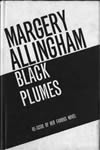 I have fun listening to Margery Allingham's work, but it is very dated. In fact that's probably part of the fun. It is so very dated by the language and manners portrayed - the society it reveals in the more casual asides to the plot, one can hardly believe ever existed... and yet it did, and therein lies some of the interest.
I have fun listening to Margery Allingham's work, but it is very dated. In fact that's probably part of the fun. It is so very dated by the language and manners portrayed - the society it reveals in the more casual asides to the plot, one can hardly believe ever existed... and yet it did, and therein lies some of the interest.
This book is all about a wealthy upper class family who, when a murder happens in their midst, seem most concerned about being shunned by society, rather than by the shocking conclusion that one of them is going around murdering people. Quote of the book for me was: "....and the terse notes which arrived from him for every member of the family, stating fully, in the most abominable commercial English, that he would be glad if they would give him their attention for half an hour at 3 o'clock...". No need to tell you that "he" is not one of the Family, but merely one of their employees.
Written in 1940, Albert Campion is not featured, though there is a hero (David) in similar mould playing the romantic lead. However, this book is a little darker than the Campion series. The story is not told through David's eyes, but those of Frances, the youngest girl in the family. It's an interesting viewpoint as she is not solving the crime, she is just the victim of the events going on around her, and does not fully understand them. The plot itself is an interesting mystery. - A Cure for All Diseases by Reginald Hill
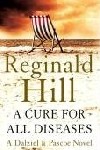 This is a very enjoyable book if you like Jane Austen as well as Reginald Hill. It is a kind of extension of the unfinished Austen novel "Sanditon" - of which, I confess, I had never heard prior to this book drawing it to my attention. Apparently, Hill often uses "one writer or one oeuvre as a central organizing element of a given novel".
This is a very enjoyable book if you like Jane Austen as well as Reginald Hill. It is a kind of extension of the unfinished Austen novel "Sanditon" - of which, I confess, I had never heard prior to this book drawing it to my attention. Apparently, Hill often uses "one writer or one oeuvre as a central organizing element of a given novel".
It is a Dalziel and Pascoe novel, and set firmly on the contemporary Yorkshire coast (rather than 19th century Eastbourne). He has taken some names from the original, and it definitely has that Austen air in the humour and the claustrophobic society he describes - though possibly fewer murders in Austen.
He uses several characters and methods to tell his story. Alongside the usual narrative of the police investigation led by Pascoe and Wield, we have a convalescing Dalziel dictating his thoughts into a tape (as well as secretly taping others inadvertently and otherwise), and we have a character writing a series of letters to her sister abroad (which would be very Austen but for the fact they are emails). - Three Bags Full by Leonie Swann
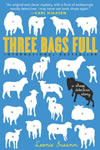 I set out to find this book in my local libraries, as it was reviewed by Cathy, and sounded like the sort of book I would like. [A sheep detective story - neatly combining all my interests in one]. However, it's obviously a very popular book that many have liked as there are about 30 copies of it available in Surrey libraries (and that's a fair number).
I set out to find this book in my local libraries, as it was reviewed by Cathy, and sounded like the sort of book I would like. [A sheep detective story - neatly combining all my interests in one]. However, it's obviously a very popular book that many have liked as there are about 30 copies of it available in Surrey libraries (and that's a fair number).
The novel is set in "Glennkill" which is nice wordplay as Kill or Kil is common in Gaelic place names, meaning chapel or church. And chief among the amateur sheepy sleuths is "Miss Maple". However, picking these puns in isolation makes the book sound a bit crass - which it is not. It is full of charm as the sheep loyally think their woolly way through the mystery to its conclusion.
Its anthropomorphic view of sheep is probably comparable to the rabbits in Watership Down (but less scary). Fun and easy to read.
Posted on April 30, 2009 at 3:11 PM
« Previous entry | Main | Next entry »Wednesday April 1, 2009
Stitch in Time
 I have been waiting for some months to feature this book, as I wanted to keep it as a secret gift for Alison's birthday. The waiting has been hard - but is now finally over (Happy Birthday Alison). It is such a wonderful book but as usual my skill with words is not sufficient for me to describe how much I like it. It has obvious appeal to me, of course, but who could fail to be entranced by its beautiful production and styling?
I have been waiting for some months to feature this book, as I wanted to keep it as a secret gift for Alison's birthday. The waiting has been hard - but is now finally over (Happy Birthday Alison). It is such a wonderful book but as usual my skill with words is not sufficient for me to describe how much I like it. It has obvious appeal to me, of course, but who could fail to be entranced by its beautiful production and styling?
The book was first printed in 1972, but in a very different form. I purchased the original in a 1980s reprinted edition. This did contain the basic same material, but with only a few colour prints showing some of the patterns reknitted in contemporary yarns. Subsequently - and lucky for us - the plates for this edition were lost which has led to the entire book being revamped with all the designs not only being reproduced as per the originals, but with the patterns redrafted to include modern instructions and yarn information. All the designs are knitted up and beautifully photographed. I particularly love that the knitters are also individually credited for their work in the book.
From my original book, I always liked this design for a Sun-Ray jumper from Woman and Home 1936.
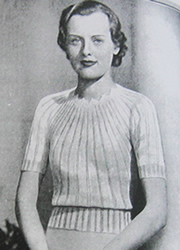
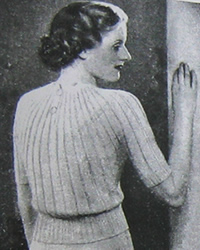
As all the original patterns were published with black and white photos the imagination was fired by the descriptions in the text. The yarn colour names were intended to be evocative of actual colours ("Lipstick Red"), rather than the current trend for yarns and colours with names that inspire an emotion ("Rustic", "Tickle", "Calm"). This pattern came with the following Helpful Fashion Advice on colour co-ordination:
"If you'd like it in Blue - choose a pottery blue with yellow buttons. Wear a buttercup-yellow woollen skirt. A yellow belt, Blue and yellow bracelets."
"If you'd like it in Pink - choose a coral with white buttons. Wear a two-piece of heavy natural tussore*. A matching coral-pink hat trimmed with white petersham ribbon. White shoes and handbag. Wear coral-pink gloves of fine suede" (* Tussore is a coarse brownish silk produced from a tussore moth Antheraea paphia).
"If you'd like it in White - choose glass buttons for the yoke. Wear a white linen tweed skirt. A matching linen hat trimmed with dark green ribbon. White court shoes with green leather trimming. Dark green gloves. Carry a green and white handbag."(sic)
Here is an example of the pages from the new edition - restyled with modern instructions, and reknitted in contemporary yarn, with great colour photos - all printed alongside the original black and white pattern, quoting the source and the year.

Please feel free to offer your own fashion advice in the comments, starting "If you'd like it in Red...".
If your interests are anything like my own - do buy this book. Even if you feel you will never knit these designs, it is a lovely book to own, crammed with historical design interest from the period.
I note it is called: "Volume 1 - 1920-1949", so I am hoping the book is a success and we can look forward to a Volume 2. If this kind of book does interest you, then you may like to look at Jane Waller's Knitting Fashions of the 1940s: Styles, Patterns and History which, like Stitch in Time is also available from Amazon. (And "no - I don't have any shares in these publications"!).
Posted on April 1, 2009 at 9:50 AM
Comments
I can vouch for the fact that this is a lovely book. I also really liked this sun-ray sweater, as well as one from the 1920s which I was keen on until I realized it was mostly crochet. Thank you for my lovely birthday present.
Posted by: Alison on April 2, 2009 7:42 PM
What I really want are those "coral-pink gloves of fine suede" to wear with the pink one! Really, I wouldn't mind seeing more hats and gloves worn again -- more scope for expressing our sartorial creativity. :)
By the way, the Ribbed Cardigan you made from the Rowan men's book looks terrific. Nice job!
Posted by: yarnstruck on April 4, 2009 5:10 AM
Thanks on the ribbed cardigan - more important than how it looks to the objective eye is that he seems to be wearing it all the time - and it has stopped coming back for minor alterations. I think the yarn is a bit stretchy and subject to pilling - but that's because it's a lovely soft wool with some cashmere. Probably the perfect cardigan for George would be a superwash acrylic (my next next project..).
Posted by: Christina on April 4, 2009 9:46 AM
« Previous entry | Main | Next entry »Tuesday March 31, 2009
Books in March
I seem to be spending less and less time reading - unless it's reading knitting books. So it occurred to me that I could actually write about the knitting books - here are a couple of them.
- A Fine Fleece by Lisa Lloyd
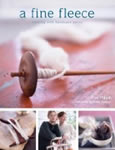 This is a book all about knitting with handspun yarns; George's Mother gave it to me for my birthday. I had not previously looked at the book when I requested it via my Wish List - which is always risky - but it did not disappoint. It is a very good book - these are the specific points in its favour:
This is a book all about knitting with handspun yarns; George's Mother gave it to me for my birthday. I had not previously looked at the book when I requested it via my Wish List - which is always risky - but it did not disappoint. It is a very good book - these are the specific points in its favour: - The author tells us about her journey through learning to spin, discusses mixing fibres, and reviews a few fleece types that she used for projects in the book. I was interested that she reviewed Suffolk fleeces, (Ava's sheep), as I have not seen much about them elsewhere - she used them for socks, which confirms the view I have gleaned while working with this fleece myself.
- The book has a lot of patterns in it, (26 apparently), mostly for proper jumpers, not just little gifts. It is very good value on this point - so many books are lovely with maybe lots of ideas but few real patterns.
- And here's the good bit - every pattern is knitted up not only in a handspun with the fibre content explained, but also in a commercial yarn. This is really an excellent idea. It demonstrates that you can achieve quite different results by changing the yarn type - it's very encouraging.
- Rowan 45 Spring/Summer 2009 edited by Marie Wallin
 Despite the amusement that Rowan's styling always seems to cause everyone (including me), I always like their books and look forward to their publication each season. I admire the way they do their marketing and always hope that their innovations will prove successful.
Despite the amusement that Rowan's styling always seems to cause everyone (including me), I always like their books and look forward to their publication each season. I admire the way they do their marketing and always hope that their innovations will prove successful.
So I was truly dismayed by their anniversary edition (No 44) as, far from celebrating their history, it seemed a complete departure from anything that had gone before. I was motivated to complain to Rowan that there was not a single pattern for men in the book which I thought (apart from anything else) a real betrayal since the company was set up by men and their signature designers were men. Admittedly when they first started, the sweaters styles were not so gender specific, and often displayed on both men and women in the photo shoots. But now the girly, shaped sweaters are definitely not for men. I was impressed that I got a reply directly from Marie Wallin (whether "from the desk of" or whether a standard response is not important). However what she said was less convincing - that they did not "have space" to include men's patterns - though they seem to have space for patterns for dogs and fabric patterns for decorations. She also missed my point really - I am not actually short of patterns to knit for men and in truth I normally welcome the inclusion of patchwork and novelties in the magazines. I was simply angry that in a special anniversary edition she had made what was, in my opinion, an editorial decision ("mistake") to make it girls (and dogs..) only.
So back to Book 45 - I loved it as usual - and I was relieved that men had got back into it.... I am planning to make a couple of the things featured in it, including some household items (placemats and peg bag). These are my favourites:
This is the full text of Rowan's reply on the subject of Rowan 44 "anniversary edition". I note that Marie seems to think that the exclusion of men's patterns is a consequence of it being an anniversary edition - how on earth does that work?
Dear Christina,
I am sorry to hear that you are disappointed that the latest magazine
doesn't include any men's designs.
The main reason for this is that Mag 44 is a celebration of 30 years of
Rowan, and consequently the stories reflect women's wear. As there was so
much we wanted to cover within the stories to reflect the type of design
that has become synonymous with Rowan over the years, there literally was
not enough room to cover menswear as well. I appreciate that you would like
to see more men's designs and we are hopefully planning to do a Rowan men's
book in the near future, I myself would like to do a men's book! There will
be a few men's designs in Mag 45 and there are also some planned for Mag 46.
Best wishes and happy knitting,
Marie Wallin - Head Designer, Rowan.
I do look forward to seeing her men's book. I always like her designs, (despite the simple lines and lack of florals), though many of them are frankly too hip for me to feel I can wear. Narvik (still working on it...) is one of hers.
Posted on March 31, 2009 at 10:34 AM
« Previous entry | Main | Next entry »Saturday February 28, 2009
Books in February
- Problem at Pollensa Bay and other stories by Agatha Christie [read by Jonathan Cecil]
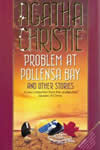 This is a collection of stories published in the early 1990s but written in the 1920s and early 30s. They are very well read by Jonathan Cecil - a stalwart supporting actor in the UK - but a surprisingly (to me) versatile star at reading these books. I would say that usually he is rather type-cast as gormless Hooray Henries from an earlier era. There is also an audio book read by Hugh Fraser, who is excellent, and I am sure chosen for this task due to his role as Captain Hastings in the 1980s TV adaptations of Poirot.
This is a collection of stories published in the early 1990s but written in the 1920s and early 30s. They are very well read by Jonathan Cecil - a stalwart supporting actor in the UK - but a surprisingly (to me) versatile star at reading these books. I would say that usually he is rather type-cast as gormless Hooray Henries from an earlier era. There is also an audio book read by Hugh Fraser, who is excellent, and I am sure chosen for this task due to his role as Captain Hastings in the 1980s TV adaptations of Poirot.
The stories feature Hercule Poirot, but also some other lesser-known but recurring Christie characters.- Problem at Pollensa Bay - 1935 (Mr Parker Pyne)
- The Second Gong - 1932 (Hercule Poirot, and adapted for TV as Dead Man's Mirror)
- Yellow Iris - 1937 (Hercule Poirot, and and adapted for TV with great knitwear!)
- The Harlequin Tea Set - 1936 (Mr Satterthwaite and Mr Harley Quin)
- The Regatta Mystery - 1939 (Mr Parker Pyne - but revamped from the original 1936 version with Poirot)
- The Love Detectives - 1926 (Mr Satterthwaite and Mr Harley Quin)
- Next To A Dog - 1929
- Magnolia Blossom - 1926
- Saturday by Ian McEwan[read by James Wilby]
 This is a novel that shows how we live today - how some wealthy people live today, of course. But it is clear that even for this well-off brain surgeon, he started life in a small flat with 2 kids on limited income; and, though he and his wife have become successful (and wealthy) in their careers, they have their lovely central town house only through inheritance. Their children are grown to beautiful and talented young people, and the hero knows how lucky he is.
This is a novel that shows how we live today - how some wealthy people live today, of course. But it is clear that even for this well-off brain surgeon, he started life in a small flat with 2 kids on limited income; and, though he and his wife have become successful (and wealthy) in their careers, they have their lovely central town house only through inheritance. Their children are grown to beautiful and talented young people, and the hero knows how lucky he is.
And the reader is constantly aware of how very much there is to lose.
Notable for the fact that the action takes place within 24 hours, some readers seem to think it's a day overly packed with activity. However, to me, it does not seem very out of the ordinary in terms of activities - though I'm not a brain surgeon of course, so that part of it would be extraordinary for me. Basically, he gets up, has breakfast with his son, goes out, sees the anti-war march, has a minor car accident, plays squash, visits his Mother in a care home, collects stuff to eat for dinner, briefly drops in to watch his son rehearse with a band, spends the evening with his family, gets called in to work to do an emergency operation.
That tells you everything and nothing.
It is paced quite slowly - especially noticeable as a talking book- the squash game, for example, is described point by point, and made me glad I had a few lessons when I was about 20 so I could better empathise with what was happening. However, throughout, there is a constant feeling of lurking menace, which made me permanently anxious for the plot to move on. I understand it was born out of the authors own sense of anxiety around potential global threats. The hero explores his general unease with moral dilemmas relating to the concept of war and terrorism - but this is suddenly sharply focussed by a very local threat, which leads to a very real moral dilemma. - Back to Bologna by Michael Dibdin
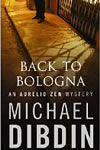 I am a real fan of this author and his hero, Italian police inspector Aurelio Zen, even though the books are often suffused with a sense of gloom, despite the humour. I picked up this book by chance, and realised that I have not actually read Dibdin's last couple of books, which is a pleasant surprise for me as there will be no more.
I am a real fan of this author and his hero, Italian police inspector Aurelio Zen, even though the books are often suffused with a sense of gloom, despite the humour. I picked up this book by chance, and realised that I have not actually read Dibdin's last couple of books, which is a pleasant surprise for me as there will be no more.
The book features amusing and topical characters, in the shape of a dead owner of a football team (killed with a Parmesan cheese knife), and a temperamental operatic TV chef. Poignantly, Zen himself is suffering after an operation, and also suffering from hypochondria - and also not doing well in his love life. However, to quote a reviewer, it "delivers both comic and serious insights into the realities of today's Italy".
Posted on February 28, 2009 at 8:59 PM
« Previous entry | Main | Next entry »Saturday January 31, 2009
Books in January
Just one solitary book for this month. I have a pile of books to read but have been so caught up in my work and other hobbies that I have not read many real books. I actually had to make a trip to the library to renew my books this month, as I had had them loan for so long.
This was my bedtime talking book all this month, along with a couple of the BBC radio plays.
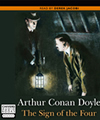
-
The Sign of the Four by Arthur Conan Doyle [read by Derek Jacobi]
An old favourite (for me) and an interesting choice of reader. He does well enough in his narration as Watson but is occasionally stretched when giving voice to the ne'er-do-well "Jonathan Small". This story almost follows the Doyle formula for the Holmes novels, being a book within a book, and consequently, Small has a large part of the narrative while telling his life's tale of adventures abroad. -
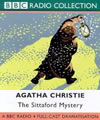 The Sittaford Mystery BBC Radio Play
The Sittaford Mystery BBC Radio Play
The play stars Stephen Tompkinson, and also John Moffatt - though not in his usual role as Hercule Poirot, who does not appear in this novel. The detective is, instead, an "Inspector Narracott", (who was used again by AC in a 1954 radio play). It was interesting to compare this radio play to the altered version of the novel used in the recent TV adaptation "Marple" - where Miss Marple was simply added into the cast of characters - perfectly suitably I thought...
Posted on January 31, 2009 at 10:41 AM
Comments
You're not alone. I used to read a lot, all the time, but since the knitting started up again, it seems to take forever to get through a book!
Posted by: Cathy in Va. on February 13, 2009 2:36 AM
« Previous entry | Main | Next entry »Wednesday December 31, 2008
Books in December
- The Death of Dalziel by Reginald Hill
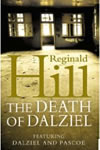 I love these books - and I used to love the TV series - until they started to deviate so substantially from the novels. I have no purist objection to additional stories written for TV (as in "Morse") but Ellie Pascoe and "Ivor" Novello were two of my favourite characters - played by really strong actresses - and they were just written out.
I was sad, as they left the door open in the script at one point to get back on track with Ellie - but then closed it again. Ivor was replaced for a while by "Harris" Tweed - which was a bit daft as they could have simply changed the actress, if that were what drove it, though I don't think a changeling would have worked for Ellie.
I love these books - and I used to love the TV series - until they started to deviate so substantially from the novels. I have no purist objection to additional stories written for TV (as in "Morse") but Ellie Pascoe and "Ivor" Novello were two of my favourite characters - played by really strong actresses - and they were just written out.
I was sad, as they left the door open in the script at one point to get back on track with Ellie - but then closed it again. Ivor was replaced for a while by "Harris" Tweed - which was a bit daft as they could have simply changed the actress, if that were what drove it, though I don't think a changeling would have worked for Ellie.
In this book - and increasingly - Ellie and Peter's relationship is really important to the novels, so once they removed her from the picture they have been forced to change the plots more and more. The disconnect happened at around the time of Arms and the Woman - again one of my favourites, being a lot about Ellie - and I can see it would have been very hard to portray this book on screen, at least hard to portray it within the straight police mystery genre into which the TV series falls. It, and this book, Death of Dalziel, have a surrealist or sci-fi element which is both humourous and witty/intellectual, as well as excellent writing - but (unsurprisingly) absent from the TV interpretation.
I should also say I admire Ellie for representing a class of woman all too often absent in mainstream drama. [Although increasingly common in mainstream "life" I think]. Namely, a strong intelligent middle class woman portrayed in a supporting role. Some might imagine that she appeals to me as a Bolshy feminist lefty - well she might - or she might not - but that's not it. She has her own life, and I do not think the substance of that life matters; it just matters that she has one. And she chooses to live it with Peter Pascoe and their daughter.
PS - you don't really think he's dead, do you? - The Secret Hangman by Peter Lovesey
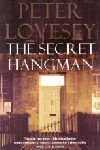 Peter Lovesey is what I would call a traditional English crime writer - as Agatha Christie probably was, prior to her somewhat surprising rise to megastar status. His settings are ordinary contemporary situations, not 1930s period piece locked-room mysteries, but happily with the expected (unrealistic) high body count. In the books I have read, (The Circle and The House Sitter), he writes about police detectives rather than amateurs, even if the police are not necessarily the main players.
Peter Lovesey is what I would call a traditional English crime writer - as Agatha Christie probably was, prior to her somewhat surprising rise to megastar status. His settings are ordinary contemporary situations, not 1930s period piece locked-room mysteries, but happily with the expected (unrealistic) high body count. In the books I have read, (The Circle and The House Sitter), he writes about police detectives rather than amateurs, even if the police are not necessarily the main players.
Having said that, his first books in the 1970s were the "Sergeant Cribb" series, which is set in Victorian London. Cribb is probably his best known character due to the 1980s TV series starring Alan Dobie. - All Fun and Games until Somebody Loses an Eye by Christopher Brookmyre
[Read by Cathleen McCarron]
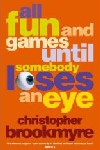 This book seems to have had mixed reviews. It seems that Brookmyre fans have had expectations stemming from what they subjectively felt he was expressing in his previous books, rather than maybe what he really was expressing. Some readers put off reading this book owing to the apparently negative reviews, and were then pleasantly surprised when they finally read the book.
This book seems to have had mixed reviews. It seems that Brookmyre fans have had expectations stemming from what they subjectively felt he was expressing in his previous books, rather than maybe what he really was expressing. Some readers put off reading this book owing to the apparently negative reviews, and were then pleasantly surprised when they finally read the book.
It is definitely not a very realistic book - at many levels - it involves a fictional international Bond-style organisation from the outset, and progresses through a middle-aged woman's wish fulfilment. I was a bit neutral after the first chapter, but it swiftly drew me in, and as usual his witty writing and plot digressions were a lot of fun.
Posted on December 31, 2008 at 9:01 AM
« Previous entry | Main | Next entry »Sunday November 30, 2008
Books in November
- Monday Mourning and Break No Bones by Kathy Reichs [Read by Barbara Rosenblat ]
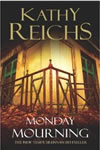
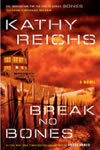 Two detective-aficionado friends have told me they are keen on these Temperance Brennan novels, while sharing my scorn and derision for the TV series based on the characters - so I thought I should read them. And they were right; the stories are interesting and well written.
Two detective-aficionado friends have told me they are keen on these Temperance Brennan novels, while sharing my scorn and derision for the TV series based on the characters - so I thought I should read them. And they were right; the stories are interesting and well written.
The TV series is "Bones" - and when I say 'based on the characters', I use the term loosely, since the name of the leading character seems to be the only item in common with the books. However, it seems the TV character is intended more to be based on the author herself (who is an academic who writes detective mystery novels...). - The Confession of Brother Haluin by Ellis Peters [Read by Stephen Thorne]
 Over the years I have really enjoyed the Brother Cadfael stories. I am not sure why - perhaps the historical context is interesting, but I do like the simplicity of the tales and the certainty of right and wrong that is portrayed in the stories; any inconsistency of what was considered right in the day, compared with what might be right 1000 years later, is overcome by making Brother Cadfael a little more of a liberal thinker than his peers. However, they are tales of human nature, and when it comes down to it, that has not changed very much.
Over the years I have really enjoyed the Brother Cadfael stories. I am not sure why - perhaps the historical context is interesting, but I do like the simplicity of the tales and the certainty of right and wrong that is portrayed in the stories; any inconsistency of what was considered right in the day, compared with what might be right 1000 years later, is overcome by making Brother Cadfael a little more of a liberal thinker than his peers. However, they are tales of human nature, and when it comes down to it, that has not changed very much.
I really enjoyed the television series with Sir Derek Jacobi, supported by a strong cast of excellent and experienced British actors. [I always thought, though, that Jacobi was miscast in this role. Don't get me wrong - he is excellent and his portrayal is excellent, but he does actually look credibly like an intellectual monk, whereas there is an implication in the text that Cadfael's physical appearance always betrays his background as an aging but tough ex-soldier.**].
This is one story that I did not know at all, so it was interesting to find it. However, almost from the moment of the "confession" in the first few chapters, I could see the entire plot laid out before me, and simply had to wait to hear it unfold. This did not spoil the pleasure of it, but it was a bit slow in the telling. Of course, in real life, and to the characters, the outcome would not have been expected in this way, but unlike them, I knew they were in a mystery story....
**Years ago, my friend Helen suggested Don Henderson (now no longer with us) for the role. In 1989 Henderson had a great part as a priest (opposite Leslie Grantham, his fictional brother) in "The Paradise Club" - but he has appeared in many mainstream productions in his career, even including StarWars, and towards the end of his life in Red Dwarf. Here is a lovely picture of him with another of my favourites, Michael Elphick from their cookery series "The Absolute Beginner's Guide to Cookery".
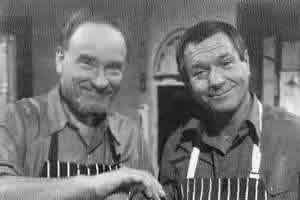
Posted on November 30, 2008 at 1:31 PM
« Previous entry | Main | Next entry »Friday October 31, 2008
Books in October
- The Lincoln Lawyer Michael Connelly [Read by Michael Brandon]
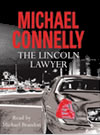 Having already read this book "on the page", I listened to it as a talking book; it was just as enjoyable second time around - and I could knit at the same time... Now I am suitably prepared for for Connelly's next book which features the same hero - and I must say I am looking forward to this. I feel warmly towards Michael Haller - I wonder if he shares more, or fewer, characteristics with the author than Harry Bosch?**
Having already read this book "on the page", I listened to it as a talking book; it was just as enjoyable second time around - and I could knit at the same time... Now I am suitably prepared for for Connelly's next book which features the same hero - and I must say I am looking forward to this. I feel warmly towards Michael Haller - I wonder if he shares more, or fewer, characteristics with the author than Harry Bosch?**
**Colin Dexter said that you cannot help writing a certain amount of your own views and tastes into your characters: "like me, he, [Morse], is diabetic, an atheist, and a lover of music and art". But also admitted that it was not true of all characteristics and I thought I heard in an interview that Dexter himself does not like beer - though I am sure I have seen film of Dexter (apparently) enjoying a pint.
It amuses me that, (judging by the publicity photos in the books), when physically describing Bosch, Connelly could be describing himself - and I notice this is also true of MC Beaton describing Agatha Raisin. - Agatha Raisin and the Day the Floods Came M C Beaton
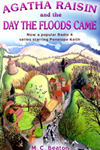 Continuing my reading of the series in which Agatha gains a new (dishy) next door neighbour, and her aristocratic friend gains and loses a wife.
Continuing my reading of the series in which Agatha gains a new (dishy) next door neighbour, and her aristocratic friend gains and loses a wife.
Small exchanges between Agatha and the vicar's wife never fail to amuse me:
Agatha: "... [middle-aged] men let themselves go."
Mrs Bloxby: "Not necessarily. Look at my husband. Alf's in good shape."
Agatha thought of the vicar - grey-haired, glasses, scholarly, slightly stooped - and reflected that love was indeed blind. - Death Message Mark Billingham [Read by Paul Thornley]
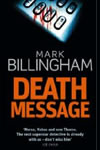 Here we find Thorne, in the latest novel in the series, settling down to some kind of domestic life - the only sort that 2 working detectives can share; however, there is even talk of fatherhood, so it must be serious.
Here we find Thorne, in the latest novel in the series, settling down to some kind of domestic life - the only sort that 2 working detectives can share; however, there is even talk of fatherhood, so it must be serious.
As in the previous book, there is, I am relieved to say, much less of a perverted mind at work; you are made to go along with Thorne and have sympathy with the killer, and thus accept Thorne's rather strange choice of rough justice.
I note that Billingham's next work departs from the Thorne series - maybe getting too bogged down with the threat of all that domesticity on the horizon. Time for a change.
Posted on October 31, 2008 at 8:57 AM
« Previous entry | Main | Next entry »Tuesday September 30, 2008
Books in September
- The Knitting Circle Anne Hood
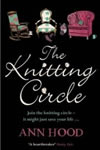 I chose this book for its title of course, and I did enjoy it very much, although the nub of the tale is very sad indeed, made all the more so by the knowledge that it is the author's own experiences of grief that we are reading about. However, this is a feelgood novel about female friendships and the path to recovery from loss - mostly bereavement - and very well written, given the grim little histories that each of the characters reveals as we move along. The only thing I was less keen on is the idea that knitting is therapy and that a circle is some kind of support group for the mentally ill - of course, it is therapeutic and so on - I'd just be worried to have it thought that this is all it is - as if, now they are all feeling better, they can stop all this silly knitting stuff.
I chose this book for its title of course, and I did enjoy it very much, although the nub of the tale is very sad indeed, made all the more so by the knowledge that it is the author's own experiences of grief that we are reading about. However, this is a feelgood novel about female friendships and the path to recovery from loss - mostly bereavement - and very well written, given the grim little histories that each of the characters reveals as we move along. The only thing I was less keen on is the idea that knitting is therapy and that a circle is some kind of support group for the mentally ill - of course, it is therapeutic and so on - I'd just be worried to have it thought that this is all it is - as if, now they are all feeling better, they can stop all this silly knitting stuff.
Ann Hood has her own website about her books, her biography, and with a blog. - Buried Mark Billingham [Read by Paul Thornley]
A disturbing but thrilling tale from Mark Billingham - his 6th book. Perhaps (thankfully) a little less overtly gruesome than previous efforts; I am thankful for this because even though he seems to be able to make the distasteful more palatable, I worry when I find myself interested in books about sick subjects.
It occurred to me that the hero of this series, Tom Thorne, and the whole setting of the books in London, is the antithesis of Inspector Morse. Thorne is vulgar, drinks lager, and works in the less appealing police premises in North London. Both Thorne and Morse share a general lack of success with women, but I understand that this is a necessary plot device for detective heroes - reference the spin-off Lewis no longer having cosy wife and family. Though perhaps Barnaby and Wexford demonstrate that this is not a universal truth. - Saturnalia Lindsey Davis [Read by Christian Rodska]
This is all about "Christmas" - with all the usual problems of lists of presents, co-ordination with relatives, and huge supplies of traditional food. The main difference is that instead of just having to cope with one or two days it lasts from December 17th through to the New Year - heaven forbid....
"Yo, Saturnalia!" - I'm looking forward to it already...
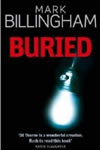
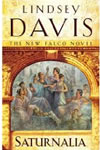
Posted on September 30, 2008 at 9:42 PM
Comments
Oh, no, he drinks lager -- worst of all! :)
Posted by: Cathy in Va. on October 3, 2008 1:12 AM
Now I have to defend my comments - even though you are smiling.
Morse: dreaming spires, real ale or a good claret, Times crossword, Opera and the classics.
Thorne: Hendon and the North Circular, lager, pub quiz trivia, country and western music.
Simply opposites.
[Though I have to say I'd rather date Morse - but on the other hand I do drink those little French lagers...].
One of my favourite episodes of Morse is Happy Families from 1992, which not only stars Gwen Taylor - who, I may have mentioned, is a great actress - but explores a theme that interests me greatly, namely the tabloid view that intellectual aspiration is not for 'ordinary' people, and that a passion for books and music is made to sound like a vice.
Posted by: Christina on October 3, 2008 10:02 AM
Someone who can enjoy both the fancy and the simple and hearty might be the most fun of all. Will stick with the real ale and claret, though! (And I do agree with you on not liking anti-intellectual attitude.)
Posted by: Cathy in Va. on October 8, 2008 2:25 AM
« Previous entry | Main | Next entry »Sunday August 31, 2008
Books in August
- The Good Husband of Zebra Drive Alexander McCall Smith
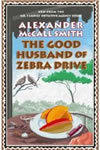 I was introduced to this set of novels by Robert, somewhat before they achieved quite such world-wide acclaim. I would like to say I was immediately charmed, but I did think them childish, as I began to read the first one. By the end of the book though, I was charmed like everyone else. Ordinary people coming to terms with their problems and overcoming difficulties. The characters value the richness of their lives, and although they do not necessarily have the choice to be richer in a material sense, they do not spend their time in longing for some life they don't have. A nice parable for our own lives told in a simple way. However, as I have said before, to regard his straight-forward writing style as simple is to seriously under-rate the skill of the author.
I was introduced to this set of novels by Robert, somewhat before they achieved quite such world-wide acclaim. I would like to say I was immediately charmed, but I did think them childish, as I began to read the first one. By the end of the book though, I was charmed like everyone else. Ordinary people coming to terms with their problems and overcoming difficulties. The characters value the richness of their lives, and although they do not necessarily have the choice to be richer in a material sense, they do not spend their time in longing for some life they don't have. A nice parable for our own lives told in a simple way. However, as I have said before, to regard his straight-forward writing style as simple is to seriously under-rate the skill of the author.
- The Jupiter Myth Lindsey Davis [Read by Christian Rodska]
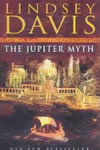 My friend Diane loaned me the very first Falco book (The Silver Pigs) in the late 1980s and I was hooked. Since then I have read the steady stream of Lindsey Davis' output ever since, usually borrowing the books from Diane, Helen, and the library (!). Lindsey has an excellent website covering her books and lots of other interesting material.
My friend Diane loaned me the very first Falco book (The Silver Pigs) in the late 1980s and I was hooked. Since then I have read the steady stream of Lindsey Davis' output ever since, usually borrowing the books from Diane, Helen, and the library (!). Lindsey has an excellent website covering her books and lots of other interesting material.
I read the Jupiter Myth quite a while ago, but to my delight I found the talking book in the library read by none other than the fantastic Christian Rodska** - what a perfect combination! I swear CR could make any book he reads fascinating - he has such an array of voices that he can adopt, and he produces them very subtly, making the books really come to life. However, the Falco books are full of lively characters for him to play with - a complete joy.
** Since "discovering" Christian Rodska as a narrator I have taken great delight in watching his (again very subtle) character performances in what seems like every single British TV series ever produced - all the TV detectives through to a recent appearance in Doc Martin I noticed.
Posted on August 31, 2008 at 3:31 PM
« Previous entry | Main | Next entry »Thursday July 31, 2008
Books in July
- Devil Water Anya Seton
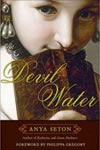 Well - it was in my local library - which says something for the quality of the book, after all this time (please read my previous entry for June). So curiosity has made me read it at last, albeit 30 years too late. And what a riveting and rollicking 18th century tale it is.
Well - it was in my local library - which says something for the quality of the book, after all this time (please read my previous entry for June). So curiosity has made me read it at last, albeit 30 years too late. And what a riveting and rollicking 18th century tale it is.
Nicely for the American author, it is interwoven with action in Virginia - and none of this mere invention. Obviously a lot of the story includes the sort of liberties taken by any historical novelist, but this author is known for her research and you can be pretty certain that the factual information included is actually factual and not invented. Even some of the more unlikely intimate thoughts of the characters are found to be taken from their contemporary diaries and writings.
So all in all, I also would recommend it; a fascinating historical read, as well as a good history lesson. [And with a little more meat than my usual readings, plus the actual length of the book, has meant I have read little else this month.] - The Cat that went Bananas Lilian Jackson Braun
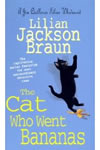 I noticed this series of books in the library and was so amused by the concept of cats and detection that I had to read one. These are mysteries featuring journalist James Qwilleran and his "lovable, clue-sensitive cats".
I have to say it was pretty terrible, but there are a few mitigating factors: one is that there is a fairly gently humour being poked at small town East Coast life, which I think I don't understand properly; another is that this is the author's 27th "Cat Who..." mystery, and one reviewer implied that she is no longer at her best, [but I shan't be testing any others].
I noticed this series of books in the library and was so amused by the concept of cats and detection that I had to read one. These are mysteries featuring journalist James Qwilleran and his "lovable, clue-sensitive cats".
I have to say it was pretty terrible, but there are a few mitigating factors: one is that there is a fairly gently humour being poked at small town East Coast life, which I think I don't understand properly; another is that this is the author's 27th "Cat Who..." mystery, and one reviewer implied that she is no longer at her best, [but I shan't be testing any others].
Strangely - the cat aspect of the book was more appealing than I had expected. They were not altogether twee, or endowed with powers beyond those of a normal cat. I did find it very entertaining that every person in the book had a cat or cats and they did express something of the owner's personalities, but with rather more than a simplistic superficial analysis.
Posted on July 31, 2008 at 10:07 AM
« Previous entry | Main | Next entry »Monday June 30, 2008
Books in June
Kids' stuff...
- Borrower of the Night Elizabeth Peters
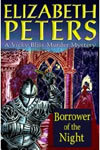 Again I picked this author originally due to a similarity to "Ellis Peters" and was smitten by the concept of Victorian archeologists combined with Thriller/Detection. However, I was not very thrilled with the 'Amelia Peabody' series, and laughed out loud at the book blurbs declaring "an author so popular that copies of her books in the public libraries have to kept under lock and key!" [on which planet I wonder?].
Again I picked this author originally due to a similarity to "Ellis Peters" and was smitten by the concept of Victorian archeologists combined with Thriller/Detection. However, I was not very thrilled with the 'Amelia Peabody' series, and laughed out loud at the book blurbs declaring "an author so popular that copies of her books in the public libraries have to kept under lock and key!" [on which planet I wonder?].
This book is a 'Vicky Bliss' mystery. The first in the series, written in 1974, and quite interesting for me to read a contemporary view of modern manners - I would say "to remember" but I was not quite adult enough in the 1970s to take anything other than the subjective view of a participant. Vicky Bliss is just as irritating as Amelia. Need I say more? Strangely enough I find this author's more serious writing - which you get to experience in the Amelia series when Amelia's children take over the narrative - quite good; however I don't really enjoy what I imagine to be tongue in cheek humorous stuff which is exhibited through Amelia, and to some extent Vicky.
The view of the 1970s, in combination with the antagonistic relationship of hero and heroine brought back memories - not only Mills and Boon but - of Mary Stewart. I realised I have not given her books a thought for at least 30 years.
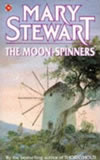 I read her novels initially as mystery/suspense/thrillers - but in fact I am sure I took to them as much for the romance angle. To quote from Wikipedia she maintains "a full mystery while focusing on the courtship between two people"; I note that they also say that she was "at the height of her popularity in the 1960s and 70s", though I also notice these novels were written more in the 1950s.
She writes unashamedly to a very specific formula - and is successful every time I would say. She has an exotic picturesque setting, a 'difficult' man (who turns out to be "the one"), often some protegé, (maternal instincts), and the element of danger and mystery. Perfect fodder for the teenage me.
I read her novels initially as mystery/suspense/thrillers - but in fact I am sure I took to them as much for the romance angle. To quote from Wikipedia she maintains "a full mystery while focusing on the courtship between two people"; I note that they also say that she was "at the height of her popularity in the 1960s and 70s", though I also notice these novels were written more in the 1950s.
She writes unashamedly to a very specific formula - and is successful every time I would say. She has an exotic picturesque setting, a 'difficult' man (who turns out to be "the one"), often some protegé, (maternal instincts), and the element of danger and mystery. Perfect fodder for the teenage me.
In this respect, it came to me that there is a strong similarity to Dick Francis - another favourite, and excellent thriller writer. It is really no surpise to relate these similarities to the acknowledged fact that Francis's wife contributed many ideas to his books. He has a hero rather than a heroine, of course, but always very sensitive with a bittersweet emotional intensity. He also chooses a specific setting though usually by means of an unusual job for his hero.
Mary Stewart also wrote fantasy/historical novels (the Merlin series) in which I was not so interested, even though historical novels were a mainstay of my reading materials of that time. This led to more memories of such intensity, I was compelled to go and review my own bookshelves, and then wander through a maze of internet pathways to recall authors that I am ashamed to say I had simply forgotten.
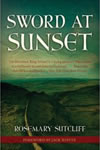 At school we were generally encouraged to read historical novels for children - by 'suitable' authors, naturally. I began with
Rosemary Sutcliff's
Eagle of the Ninth first published in 1954. It is set in Roman Britain in the 130s and follows the story of a boy's search to discover the truth about the disappearance of his father's legion in the north of Britain. This was the first in a sequence of novels: The Silver Branch, The Lantern Bearers, and Sword at Sunset. This last one is really an adult book, and is a modern interpretation of the legends of King Arthur. This is the one in residence on my bookshelf. I feel I ought to read it again - though all I remember of it is that it is unbearably sad. I must say that I did not even realise it was related to her other Roman books in any way.
At school we were generally encouraged to read historical novels for children - by 'suitable' authors, naturally. I began with
Rosemary Sutcliff's
Eagle of the Ninth first published in 1954. It is set in Roman Britain in the 130s and follows the story of a boy's search to discover the truth about the disappearance of his father's legion in the north of Britain. This was the first in a sequence of novels: The Silver Branch, The Lantern Bearers, and Sword at Sunset. This last one is really an adult book, and is a modern interpretation of the legends of King Arthur. This is the one in residence on my bookshelf. I feel I ought to read it again - though all I remember of it is that it is unbearably sad. I must say that I did not even realise it was related to her other Roman books in any way.
I remember her as an excellent writer, and we all fell in adolescent love with her heroes, (Beowulf, for example...!).
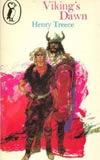 I then remembered
Henry Treece . I had somehow managed to totally wipe him from my memory. He was a little more 'serious' for me than the female writers, but I was drawn into his work by the desire for more "Roman" fiction, and then on to his Viking Series. The Eagles Have Flown published in 1954, deals with Britain after the Romans, and and again with the supposed historical figure behind the legends of Arthur.
I then remembered
Henry Treece . I had somehow managed to totally wipe him from my memory. He was a little more 'serious' for me than the female writers, but I was drawn into his work by the desire for more "Roman" fiction, and then on to his Viking Series. The Eagles Have Flown published in 1954, deals with Britain after the Romans, and and again with the supposed historical figure behind the legends of Arthur.
Much as I am inclined to do today, I think I read a 'set' of books on Arthur - the third of which was T H White's famous Once and Future King - which again was suited to the adolescent reading transition from child to adult.
Even more amusingly, just like moving from Ellis Peters to Elizabeth Peters - Henry Treece led me to Geoffrey Trease (nearby on the library shelf) - another author of children's historical novels. So perhaps my easy substitution of names is not due to old age and loss of marbles, but simply a genetic trait after all...
 Finally I need to mention a book which I have not read at all! When I was at school our Deputy Head Mistress, Mrs McCarthy - amazing woman, straight out of he 1940's complete with hair roll - taught us not only about ladylike manners, and what make-up was suitable for young women (ie none), but also history. This included the Jacobite rebellions of 1715 and 1745; apart from the rather fundamental difference of which King or Prince was "pretending" at the time, we always got the events and battles muddled. Her advice (more than once) was to read a "very good book" by
Anya Seton and "you will never mix them up again". I think this must have been Devil Water as it's about the Earl of Derwentwater and his involvement with the Jacobite rising of 1715, and his brother Charles, beheaded after the 1745 rebellion, the last man to die for the cause.
Finally I need to mention a book which I have not read at all! When I was at school our Deputy Head Mistress, Mrs McCarthy - amazing woman, straight out of he 1940's complete with hair roll - taught us not only about ladylike manners, and what make-up was suitable for young women (ie none), but also history. This included the Jacobite rebellions of 1715 and 1745; apart from the rather fundamental difference of which King or Prince was "pretending" at the time, we always got the events and battles muddled. Her advice (more than once) was to read a "very good book" by
Anya Seton and "you will never mix them up again". I think this must have been Devil Water as it's about the Earl of Derwentwater and his involvement with the Jacobite rising of 1715, and his brother Charles, beheaded after the 1745 rebellion, the last man to die for the cause.
Sounds great doesn't it? Maybe they have it in the library...
I shall end here - Mrs McCarthy was also our English teacher, and asked my parents what I (aged 12) read, as my writing style was not very good. [And the answer was Agatha Christie - so her inferences were probably correct].
Posted on June 30, 2008 at 11:27 PM
« Previous entry | Main | Next entry »Saturday May 31, 2008
Books in May
Ha!
There weren't any...
I have been completing a lot of knitting projects, and have thus been listening extensively to my iPOD - however, sadly not to "proper" books. George told me that "there are a lot of MP3s of books out there on the internet" and to prove it downloaded a stack of BBC radio plays - all Miss Marple (portrayed by June Whitfield) and Poirot (played by John Moffat) - I'm afraid I am not keen on the latter - the French accent seems to consist of strangely pronounced "w" - as if there were extraneous "h"s present.
I have a love/hate relationship with these plays but they kept me well amused while concentrating on other things. However, one or two of the downloads are David Suchet reading some of the Poirot short stories, which I am looking forward to listening to in the future.
Posted on May 31, 2008 at 8:19 AM
« Previous entry | Main | Next entry »Wednesday April 30, 2008
Books in April
- Locked Rooms Laurie R King
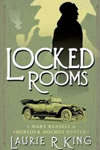 This is the latest in a series of novels which start with The Beekeepers Apprentice, or, "What Sherlock Did Next". It follows the famous sleuth after he retires to Sussex to keep bees. Apart from the excellent (really excellent) work by Michael Dibdin**, I have found modern Holmes pastiches to be truly poor - even comparing them with the later Conan Doyle stories, which were often poorly written. And it is true that a synopsis of the basic premise of the books [young American jewish girl meets older Holmes and marries him..] does sound pretty bad - to us fans.
This is the latest in a series of novels which start with The Beekeepers Apprentice, or, "What Sherlock Did Next". It follows the famous sleuth after he retires to Sussex to keep bees. Apart from the excellent (really excellent) work by Michael Dibdin**, I have found modern Holmes pastiches to be truly poor - even comparing them with the later Conan Doyle stories, which were often poorly written. And it is true that a synopsis of the basic premise of the books [young American jewish girl meets older Holmes and marries him..] does sound pretty bad - to us fans.
However, I'm no purist and Laurie King is easily forgiven. She writes very well, the stories are true adventure stories with the emphasis on the word story, in the very best traditions of Conan Doyle or Rudyard Kipling, and they are not pastiches, being really about Mary Russell, rather than "More Adventures of Sherlock Holmes". Probably neither she nor you need my justification, but perhaps I feel I need to justify why I read them!.
Any changes observed in the Holmes character are easily attributed to his being seen through different eyes, and he is, after all, much older. It is amusing to see that Mary is clearly King herself, even down to physical descriptions, and I think because of this she writes with such sympathy and love for her subject matter, that you can forgive her messing about with such an English institution. She makes her premise entirely plausible - I was not so sure about the idea of Holmes marrying, but for the time about which she writes, and our own reader's sensibilities, it would be hard to create stories about an unmarried couple careering around together in such intimate circumstances. It also occurred to me that she has a good contemporary model for such an idea, in Lord Baden-Powell, who, famous Victorian hero of Mafeking, and a bachelor at 55, in 1912 met and married Olave, aged 23; wikipedia notes "not an uncommon age gap at that time".
My favourite of these novels to date has been "The Game" - I think because it is set in India, (always interested me due to family connections) and has nice references to Kipling throughout. Now I have got to grips with my iPod, I have been listening to an audio version of it recently (read by Jenny Sterlin), in tandem with reading Locked Rooms.
Laurie King has a great website with lots of fanzine materials and links, plus a most enjoyable blog which illustrates her charming and fun personality.
** The last Sherlock Holmes Story is such an excellent book that I was astonished to see it was his first and dates from 1978. It really is perfect, in my opinion, so that even while proposing a heretical view of Holmes character, the portrayal is so very accurate that you wonder how we could have ever have perceived the detective in any other way.
I remember a similar sensation when I saw the all male version of Swan Lake - how could anyone ever stage it any other way?! - At Bertrams Hotel Agatha Christie
Read by Rosemary Leach
"In which Christina learns a new word."
I am pleased when my excursions into re-reading Christie novels of dubious literary merit do in fact enrich my intellectual life in some way... The word in question is "simulacrum", and it is the foundation upon which the novel is set. Bertram's Hotel is not simply a nice old-fashioned hotel with all the "old standards", nor is it a commercial Olde Worlde copy for the benefit of tourists - it is a hyper-real stagey version of an old hotel. Not stagnant but actively groomed and polished to produce the required effect.
Within the elderly class-ridden society that inhabit it, all are agreed how wonderful it all is. Yet, most satisfyingly, it takes Miss Marple - who is not one for mawkish nostalgia - no time at all to shrewdly take it all in and regard it not only with suspicion, but also as somewhat threatening. To my mind, this is most vividly portrayed in the Joan Hickson TV series, where the plot is fairly accurately followed - though it could be said, improved upon. In the book, there is a rather tedious focus on the police investigation, and perhaps more true to life, less focus on Miss Marple - she is after all just a little old lady.
Here are some snatches of reviews which I think give a good idea of the overall quality of the book:
"...can hardly be called a major Agatha Christie..."
"...denouement is really too far-fetched..."
"...seldom at her best when she goes thrillerish on you..."
"...a reasonably snug read..."
"...plot is rather creaky, as in most of the late ones..."
"...Elvira Blake is one of the best observed of the many young people in late Christie..."
"...seemingly trashy fiction that nevertheless contributes to a genre of speculative fiction..."
This last reviewer goes on to draw comparisons with other examples of synthetic worlds that seem at first to be benevolent: The Portrait of Dorian Grey, Blade Runner, Westworld, Jurassic Park, and The Truman Show.
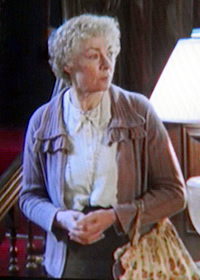 In addition to listening to the book, I watched (again) the Geraldine McEwan version in "Marple". This deviates from the book considerably - as do all the Marple series - but in a Good way. Some episodes of this series were very disappointing (for example Murder at the Vicarage, which promised so much with such a fabulous cast but...); however, generally, they offer some nice variations in themes and characters, which I quite approve of. Joan Hickson provided a definitive version - so why repeat that?
In addition to listening to the book, I watched (again) the Geraldine McEwan version in "Marple". This deviates from the book considerably - as do all the Marple series - but in a Good way. Some episodes of this series were very disappointing (for example Murder at the Vicarage, which promised so much with such a fabulous cast but...); however, generally, they offer some nice variations in themes and characters, which I quite approve of. Joan Hickson provided a definitive version - so why repeat that?
The side plot with Martine McCutcheon and Stephen Mangan adds very positively to the story, and reinforces the more light-hearted tone of the Marple series. I read that McEwan has abandoned the role and it will be taken up by Julia McKenzie - it seems slightly odd as they must have filmed almost all of them by now (even some that were not actually Marple stories) and it seems odd that they have filmed Nemesis without the prequel Caribbean Mystery.... but I digress.
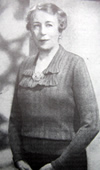 More important than any of these considerations - McEwan wears a delightful cardigan throughout - which I fondly imagine having been knitted by someone in the costume department. It seems to me to be a recreation of the pattern from 1936 "My Home" (although this was a jumper not a cardigan) as reprinted in Jane Waller's 30s Family Knitting Book*** published in 1981.
More important than any of these considerations - McEwan wears a delightful cardigan throughout - which I fondly imagine having been knitted by someone in the costume department. It seems to me to be a recreation of the pattern from 1936 "My Home" (although this was a jumper not a cardigan) as reprinted in Jane Waller's 30s Family Knitting Book*** published in 1981.
Note that Miss Marple has her trusty knitting bag over her arm, and much is made of the knitting in the recent portrayals. Julia McKenzie says of her new role "I suppose I shall have to remind myself how to knit". I think originally it was introduced to emphasise her persona as one of harmless old lady; in one story she use the pretence of buying some wool in a local shop in order to pick up information. I can't imagine Christie herself knitting somehow, but I guess it was and is a fairly common pursuit.
This must have been a fun role for McEwan - but I was most delighted by her portrayal of Lucia in the TV series of the E F Benson books. These were surely perfect, and the audio books - some read by McEwan and some by Prunella Scales - are also wonderful to listen to.
*** I notice that Amazon show this as a "rare" book and one seller is asking £121 for a copy. Jane Waller mentioned to me that she thought her books from the 1980s - Stitch in Time, 30s Family Knitting Book, and Mens Book - would be worth reprinting, but the publishers were not interested in doing so.
Posted on April 30, 2008 at 8:14 AM
« Previous entry | Main | Next entry »Monday March 31, 2008
Books in March
- The Fourth Bear Jasper Fforde
I think I was probably introduced to Jasper Fforde (Thursday Next novels) by Robert, and swiftly passed them on to Alison. Although I continued with Thursday Next's adventures, I never bothered with the "Nursery Crime" books until I was given (Robert again) two for my birthday. Through an administrative error I took the second one to France with me, so I have read them out of sequence, but I don't think that has impeded my enjoyment.
Like Terry Pratchett, Fforde's novels are tagged Fantasy Satire, and like Pratchett, they are brilliant. A fantasy world makes you somehow able to look at what is obviously our own world with more objective eyes - and see humbug and hypocrisy for what it really is - and have a good laugh.
I do not have journalistic skills to write an elegant review - instead try this. - The Right Attitude to Rain Alexander McCall Smith
This is third in the series about Isobel Dalhousie; a quick read, and most enjoyable. The main character really reminds me of my friend Diane; that is really "reminds" me of her, rather than being actually the same as her. It is her sense of what is fundamentally Right, perhaps, as well as the the descriptions of the Edinburgh locations. Alison said she was very surprised by the ending of the book, and it provoked a quite interesting few moments of discussion on the characters' motivations.
This author also has several series of books, but I have followed only the Ladies' No 1 Detective Agency** with any dedication. I am certain I would like them all, as I suspect they would all be flavoured with the authors quiet brand of philosphical ideas, as applied in every day life, albeit possibly by rather extraordinary people. Perhaps that is the key to his popularity: you can see that the people are ordinary enough on the outside, but rather extraordinary on the inside - and isn't that how we all are?
** Over Easter the BBC screened a film version of the Ladies' No 1 Detective Agency, directed by the recently late Anthony Minghella. They made some changes, which are in my opinion all excellent, in order to take it properly from page to screen. They (and I) are clearly delighted that they filmed it on location in Botswana - it was the Right Thing to do. It is my understanding that this is the pilot for a TV series, though I can't see any direct reference for it being so; I hope they manage to sustain the high quality of actors, script, and direction if it continues.
Posted on March 31, 2008 at 5:05 PM
« Previous entry | Main | Next entry »Friday February 29, 2008
Books in February
There is an interesting and wholly unintentional link in the main 3 books of this month in that they were all written in the 1960s.
- Several Perceptions Angela Carter
I think I can safely say I really didn't understand this book, and further I am not sure if I enjoyed it or not. It seemed rather removed from my own experience of life. Quite some time ago I read Shadowdance, her first novel, published 2 years before this one, and I seem to remember much the same reaction to that one. Having read the glowing reviews by authors I admire, (like Salman Rushdie and Anthony Burgess), I can only conclude I don't have the intellect to quite "get it".
I did enjoy the actual time period, as it is a contemporary work (1968) about the flower power generation and revolves around a university town. As a Sunday Times reviewer said: it offers a picture of the Swinging Sixties without the romantic gloss of middle age.
Rob gave me two books by her for my birthday, and I will ask him to read them too to see if he can explain what I should be seeing! I think I would like to read "Wise Children" - her last book before her untimely death in 1992, (aged 52). - The Clocks Agatha Christie
Read by Robin Bailey
Moving on to a much loved (by me) favourite. I am pretty sure I have in my time read all of Agatha Christie's output - much of it in my teens, which, according to my teachers, for ever ruined my ability to write good prose, [on the up side, I have a pretty good ear for dialogue though!]. I am sure I read this one before, as I had a good grip on the plot pretty well right away and I don't think it's because I'm any better at unravelling mysteries these days. I spent the first few chapters confusing it with the Seven Dials Mystery (and a rather bad TV adaptation) until I researched it on the web.
Anyway, I can recommend reading it - or revisiting as I did. It contains some really nice classic AC plot devices which I much enjoyed, (people being murdered just as they are about to name the guilty party- as soon as a character says "I can't tell you now - meet me in half an hour in the tea shop", you know it's curtains - and - is it 61? or is it really 19?). Hercule Poirot features though not as a main character. He does not leave his flat in Whitehaven Mansions to solve (or advise on) the mystery, and Miss Lemon is still with him. There is a nice little diversion, while Poirot offers some interesting reflections on other crime authors and fictional detectives - he has been amusing himself in retirement, reading novels and working out the puzzles. There is criticism that the plot fizzles out after an interesting beginning, but I think that is part of the actual design; it is often an AC theme that the crime is quite simple, and you have to strip away the red herrings to leave the basic elements, money, sex, etc which are the usual triggers for murder.
The book is written in the first person by a young "hero" who ends up with the young "heroine" (in many of ACs crime books there is a strong romantic element, and she did write pure romances under a pen name). The setting is sixties but the heroine is pure 1930s - strong, independent, a good sport - but at the same time quite flawed - a dizzy dame - needs a decent chap to take control when it all gets too much (don't we all...). AC was 73 when she wrote this and the characters have words put into their mouths which are clearly AC trying to come to terms with a modern (Swinging Sixties) world to which she can't quite relate.
The book was read charmingly and effectively by Robin Bailey, such a familiar British stalwart that I had not registered that, sadly, he passed away in 1999.
I have read that this novel follows the style of GK Chesterton, who was admired much by AC; I have never read the Father Brown stories but now feel I should. - Murder in Mind P D James
This book was also written in 1963, and I would like to say "couldn't be more different" - but hey, it's a detective story... I had recently seen reruns of the TV adaptation of this book - they are fairly faithful to the books, and Roy Marsden is perfect as Commander Adam Dalgliesh, but... they are very dated. I was surprised that this one was 1995 - I thought they were all made in the 1980s. Also these adaptations come from the days when books were adapted into 7 part series, and no-one attempted to squeeze masterpieces like Ian Rankin's Rebus books into a mere hour and a half. I think the problem with PD James books is that there is a lot of psychology in them, which is hard to portray, except by a lot of ponderous pauses - and these are frankly dull on a TV cop show, especially when they go on for so many episodes.
So - I wondered what the book was like.
James is 30 years younger than AC so was in her prime when she wrote this. Like the previous novel, it follows the author's typical formula, being set in an "enclosed" environment, (compare: quasi religious orders, convalescent or care homes, retreats, museums, legal chambers, organisations always privately supported by trusts - settings on islands, towers, lighthouses etc etc) and being in this case, a locked room mystery - a defined parameter from the start - so we're all clear about the suspects. Again, in the end, the answer all comes down to money - the simple explanation.
It may not be apparent from the above, but I really enjoy her books; I think the style is slow (turgid probably too strong). However, while maintaining that nice policeman's pace, solid plodding but relentless, she still manages to have quite a gripping end (will they make it in time or not?) - the policemen end up stuck in a traffic jam, which seems appropriate. - Agatha Raisin and the Curious Curate M C Beaton
Another pleasing fantasy excursion into the world of the 50 year old single woman.
Maybe I could open a detective agency...
Posted on February 29, 2008 at 11:41 AM
« Previous entry | Main | Next entry »Thursday January 31, 2008
Books in January
- Flashman on the March George MacDonald Fraser
I wanted to read a Flashman novel in commemoration of the author, who died on January 2 at the age of 82. He revived the cowardly bully from Tom Brown's Schooldays in 1969 to continue his caddish ways in the first of about a dozen novels. My tutor at college was very fond of these books and I feel his tastes were not to be dismissed lightly. However, I shall not be rushing to read any more.
George MacDonald Fraser also wrote the screenplay for Octopussy - again not one of my favourite Bond films, but possibly not the fault of the script. - Agatha Raisin and the Love from Hell M C Beaton
Agatha moves on. Or perhaps not - her appeal for me is definitely woman in fifties behaving like teenager (mostly at its worst...).
"I have to go home. My feet are killing me"
"Such a shame. Those shoes look so glamorous"
Agatha smiled at Mrs Bloxby, who always managed to say the right thing. A lesser woman would have said: "You should wear sensible shoes.".
Posted on January 31, 2008 at 10:06 PM
« Previous entry | Main | Next entry »Monday December 31, 2007
Books in December
- At Risk Patricia Cornwell
Her 2006 novel, but without Dr Kay Scarpetta, although it had a detached professional heroine Scarpetta look-alike. I thought the book read slightly oddly, and I now see that - like the last Michael Connelly I read - it was originally serialised for the New York Times. I have a love-hate relationship with her books - they are exciting and absorbing, but these ice-queen heroines do not evoke any empathy - even with detached professionals.... - Agatha Raisin and the Wizard of Evesham M C Beaton
Finally back in sequence, finding out what led up to the last two Agatha books I read.
In this book, the author digresses a bit more than usual in talking about Evesham and its history; I feel she must like it very much, and it has certainly caught my interest, as it's an area with which I am not familiar.
As I have mentioned previously, these books are, at face value, very light weight reading, and don't need to be pondered over to find some inner enlightenment. But really they do describe some very telling experiences which I find all too familiar, and make me laugh twice over; are all professional women in their 50s like this... or is it just me?! Here are a couple of quotes from this book:
On grey hair: "She had bought one of those colour rinses but it had turned the grey to purple."
On visiting the museum at the Almonry: "Agatha became uneasy as she saw household items she remembered from her youth."
Posted on December 31, 2007 at 8:34 AM
« Previous entry | Main | Next entry »Friday November 30, 2007
Books in November
- The Ten Word Game Jonathan Gash
This is a Lovejoy novel, the main character probably known better to us from his portrayal by Ian McShane in the eponymous TV series. In this story, Lovejoy comes across as a little more in control than in the previous (and only other) Lovejoy novel I read. The joy of this book, however, is not so much in the story, but in the fascinating information and trivia that Lovejoy shares with us along the way - this is presumably an outlet for Gash's own knowledge of interesting historical and antique-trade gossip.
The title refers to an amusing game where you attempt to condense any description (event, person) into 10 words - try it with Hamlet - or Pride and Prejudice.... - Living on a Prayer Sheila Quigley
Third in the Grannylit series of thrillers set on the (fictitious) Seahillls Estate. This time a group of kids become involved with a sinister religious cult, and our DI heroine moves slightly closer to a life of bliss with her second in command. - Agatha Raisin and the Witch of Wickhadden and the Fairies of Fryham M C Beaton
Picked up these Agatha Raisin titles in the library, despite their being slightly out of my chronological reading sequence. I had hoped Alison and I might read them during my holiday - but we were too busy with joint knitting to do any joint reading. So they ended up as the perfect light reading on the flight home. I have reserved the missing title [Agatha Raisin and the Wizard of Evesham] for next month's literary delights.
Posted on November 30, 2007 at 12:01 PM
« Previous entry | Main | Next entry »Wednesday October 31, 2007
Books in October
Halloween already....
As Alison explained, we were both a bit busy to be blogging while I was in Los Gatos, and I have been ill with a bad cold since getting back. [Alison struggled (wo)manfully on with her cold while I was there but I seem unable to recover properly...]. I will be entering some retrospective entries on our activities in due course.
Anyway - it's an ill wind etc - I have been doing a lot of reading this month:
- S is for Silence Sue Grafton
As usual, an excellent plot and thrilling finish. Following what seems to be a literary trend, Kinsey finds herself investigating a 30 year old disappearance, thus providing delightful period detail from both the 1950s and the 1980s.
Also amused by the author's foreword. Sue Grafton is a lady of a "certain age" and seems to tolerate fools less gladly than ever before (along with her heroine!). Clearly pacing the writing of her alphabet series to last her through to retirement - by the time she gets to Z I am sure she will have totally lost patience with the general public. - The House Sitter Peter Lovesey [Read by Steve Hodson]
Another charming (if murder can be...) police drama set between Bath and Bognor. Like the previous novel I read, the setting provided the interest for me, as I grew up on the south coast, and much of the action seems to take place around Sussex. - The Overlook Michael Connelly
I spotted this latest novel in the library at Los Gatos during the weekly meeting of Alison's knitting group.
It was relatively short but gripping and excellently written as usual. Apparently, this story was originally serialized in the New York Times Sunday Magazine, but the plot has been revamped and expanded to fit into the current Harry Bosch timeline.
If you're a fan take a look at Michael Connelly's website - it's a lot of fun with added multimedia excerpts for you to enjoy. - Quietly in their Sleep Donna Leon
I raided Alison's own bookshelves for this one. I think it's the latest Brunetti novel in paperback at the moment. - Under Orders Dick Francis
I pounced on this one when I saw it in the library - as I surmised, this is his first new novel in a number of years - since his wife died in fact. There is some scurrilous suggestion that his wife wrote the books, but he seems happy to freely acknowledge and credit her input. Maybe at the grand age of 87 he simply feels no need to keep the day job. Anyway - happily for us he has written another jolly good novel.
Appropriately, he returns to his hero Sid Halley, one of my favourites from early on in his writing, and the subject of a TV series in 1978 starring Michael Gwilym. I do remember how odd it was having to visually accept a such a tiny hero (ex-jockey - easy to overlook in a book).
Posted on October 31, 2007 at 1:15 PM
« Previous entry | Main | Next entry »Sunday September 30, 2007
Books in September
- Harry Potter and the Deathly Hallows J K Rowling
It's official.
I am the last person to read it.
Nuff said. - Clerkenwell Tales Peter Ackroyd [Read by Nigel Graham]
I'm fond of Peter Ackroyd - his books and his expressed interests in history and London. This book is set in the reign of Richard II. Chaucer is an obvious influence on the work, with short chapters, each focussed on one of the characters borrowed from Chaucer's Canterbury Tales. It's very educational for me, knowing little about the politics of the period, and full of charming (and disgusting) period details of medieval life. - White Jazz James Ellroy [Read by L.J. Ganser]
Set in 1958, this another story of crime and corruption in the LAPD of the time. I have not read an Ellroy novel before, (though I saw and was very impressed by the film LA Confidential), so I was quite taken aback by the writing style; that and the intense slang of the period made it very hard to listen to - but more evocative to listen to with the right accent. It became easier as the CDs and I progressed together through the story, and I think now that perhaps it would have been equally hard for me to read, and that part of my confusion was trying to take in all the character names presented to me in the first few chapters.
I now find Ellroy is renowned for writing in fragments rather than sentences, and it is certainly a powerful method which he uses very skilfully. Quoting from the publisher's review: "Ellroy's telegraphic style, which reduces masses of plot information to quick-study shorthand, captures the seamy stream-of-consciousness."
This is the last volume of what is known as Ellroy's "L.A. quartet" of crime novels, which includes his previous L.A. Confidential (1990), The Big Nowhere (1988), and The Black Dahlia (1987). It's disturbing but riveting. - The Last Detective Robert Crais [Read by William Roberts]
Having seen a very amusing TV series with Peter Davison and also a 70s film with Bernard Cribbins in the title role, I thought it would be fun to "read" the original book; I should have known better, as I well know that the "Dangerous Davies" books were written by Leslie Thomas, (popular in my teenage years for the "Virgin Soldiers" which was appealing to me and my peers at the time as it contained "adult themes" - we were just lucky it was well written and funny).
I was alerted to my mistake by the opening chapter which was read by an American, and pretty well unmistakably about bear hunting in Alaska. After a few minutes minutes it began to dawn on me that the venue was not about to change to 1970s North London. Once I had overcome my disappointment, it turned out to be a pretty good detective novel set in LA.
Yet another case of mistaken identity - I seem to unwittingly extend my literary choices and find new authors in this manner so I try to think of it as a positive thing. - Bad Moon Rising Sheila Quigley
Rob bought me two books by this author as a present; they turned out to be her second and third books, so I borrowed and read the first (Run for Home) from the library. The author was first published in her fifties, is a grandmother living on an estate in the North East, and writes about what she knows; there is a Woman's Hour interview with her from 2004. The books are thrillers set on the (fictitious) Seahillls Estate and have a "gritty realism" that also seems quite comfortable and reassuring, if that's possible. Slightly sadly, I think she's writing about how she would like the atmosphere of the estate she lives on to be (minus the evil drug barons etc!) rather than maybe how it is.
This is the second book of the four she has written to date. (Grannylit apparently).
Posted on September 30, 2007 at 12:02 AM
« Previous entry | Main | Next entry »Friday August 31, 2007
Books in August
August reading:
- Echo Park Michael Connelly
After the Lincoln Lawyer, we are back to Harry Bosch. I think I can only agree with the book blurbs and say how Connelly gets better and better. His is somewhat journalistic - which is where his roots are - and this makes for a pleasing economic and evocative style, for those who like a yarn. This story (in common with many in this series over the years now I come to think of it) is an old crime re-investigated, and of course now Harry is in a "cold case" squad this is quite apt! Is it me or are these cold case dramas taking over the crime genre lately? Anyway if they are all as well told as this one I am not complaining.
[Reinforces to me that Peter Turnbull's style is awful after all... See below]. - A Big Boy Did It and Ran Away Christopher Brookmyre
I listened to this as a talking book read by Kenny Blyth. The author's style really lends itself to being read aloud and is enhanced for me hearing the vernacular in the proper accent. I also listened to The Sacred Art of Stealing, which I did not like quite so much as some of his other books - far too much characterisation and not enough plot (!) - but it occurred to me then that it sounded slightly like there was a prequel. Turns out this is it - same heroine (Angelique de Xavia) though wholly different situation - same problem with slightly too much back story for me. - False Knight Peter Turnbull
I originally selected a Peter Turnbull novel on the grounds of it's being a crime genre talking book, and because I mistook his name for that of a another author (!). The first book was "Reality Checkpoint" and I felt a bit lukewarm about it - mostly as I became increasingly irritated by the slow elderly reading style (Who, pray, pronounces "cassette" in two distinct long syllables, the first to rhyme with cat?). I am obviously ageist here, but the whole style of the book seemed very dated - partly appealing and partly wearyingly slow **. Anyway I now discover that the author is not too far from my own age so I'll shut up. I liked the happy ending....
This book proved better, mainly I think due to a different reader. The two books I have listened to do seem to dwell rather unpleasantly on the black serial killer aspects, and as this neither adds to the tension (compare Mark Billingham) nor the humour (Christopher Brookmyre) I feel I could do without it. But then the book would be short. I guess that's why I'm not an author.
** I have just read an amusing review of one of his books which actually pretty well captures my own negative views but much more coherently (that's why I'm not an author!). "Welcome to Peter Turnbull's world, where things never 'are' they 'reveal themselves to be'.", and, when "...[the hero]'s wife died she didn't just drop dead, she 'was seen to collapse', as if had not some passersby been there to see it, she might not have died after all...". - Miss Marple's Final Cases Agatha Christie
This is an unabridged talking book of short stories read by Joan Hickson. It includes: "The man found dying in the church sanctuary", "The puzzle of Uncle Henry's hidden legacy", "The baffling mystery of the stabbing of Mrs Rhodes", "The question of the murderer with the tape-measure", "The case of Mrs Skinner's maid", and "The curious conduct of the caretaker".
Perfect accompaniment to sock knitting.
Posted on August 31, 2007 at 8:04 AM
« Previous entry | Main | Next entry »Tuesday July 31, 2007
Books in July
More crime books consumed by me in July:
- The Lincoln Lawyer Michael Connelly
The more of his books I read, the more impressed I am by his story-telling style and ability to grip the reader. The pace always accelerates towards the end of the books, which means it is always a disaster for bedtime reading. Far from dropping off after a chapter, you find that anywhere after half way through, you keep thinking "just one more chapter" and before you know it you have reached the end and it's 2am.
This book is not one of the Harry Bosch series, and (unusually I think) does not make any peripheral reference to him either, although it is set in LA, with the hero being a defence lawyer. - Agatha Raisin and the Wellspring of Death M C Beaton
About number six in the series featuring Agatha Raisin. Fascinated by the tongue in cheek title "Agatha Raisin and the Quiche of Death" I borrowed the library book and was instantly captivated by this amateur sleuth (yes, she has to be a "sleuth"). I realised later that my liking for her is probably born of some very noticeable parallels: Agatha is 50, a very successful though semi-retired business woman with no kids, and a complete slave to her hormones. The books are written in a simple style but very skillful and amusing. - Be My Enemy Christopher Brookmyre
The usual blend of thoughtful writing and black humour. A party of business people on a team building exercise are left stranded and helpless (apparently) when a mysterious group of para-military lay siege to their remote country hotel in Scotland. Laugh out loud at the amazing self decapitating man.... no really ... it's very funny. - Friends in High Places Donna Leon
Alison kept recommending Donna Leon, and finally lent me a few of the early books while I was in the US. It took me a while to warm to Commissario Guido Brunetti - I needed more than one book to become interested in, and grow to like and appreciate all the characters properly. I have read quite a few since, up to the latest offerings. However this was an early book that I had not read, so I broke or bent my rule about talking books, (which is to always listen to the unabridged versions). The book was excellently read by Tim Pigott-Smith, which I am sure added to the enjoyment, but it was sufficiently good that I feel I should try and read the full text in the future (even though I now know who dunnit).
Posted on July 31, 2007 at 11:22 PM
« Previous entry | Main | Next entry »Saturday June 30, 2007
Books of the Month
I'm not a great bookworm but I thought about adding a "stuff wot I am reading" list in the sidebar. As my sidebars are overly cluttered already, and its not very craft related, I decided it might be a better as a category in my blog. I have pretty mainstream interests in literature - I doubt you will find an eclectic inspirational set of works that you never heard of before but - if you find you like what I like (which you will swiftly discover is twee crime novels) then there may be the odd previously unconsidered title here.
Add to this that I'm a slow reader so there may be months when nothing appears but... here we are for June:
- Blue Shoes and Happiness Alexander McCall Smith
The usual charming fare about the straight-thinking lady detective and her agency. - Black Book Ian Rankin
About number six in the series featuring the Edinburgh detective, John Rebus. I heard Ian Rankin say that Jekyll and Hyde was the inspiration for his first book Knots and Crosses, where he had two characters - one good the other bad versions of the same person sharing the same (SAS) roots - he was surprised to hear that from reviewers that he had written a crime novel. Before I knew about John Rebus and Gordon Reeve, I listened to "Blood Hunt" as a talking book (read by that genius Christian Rodska - "versatile British actor"); it featured a different version of Gordon Reeve who had previously played Hyde to Rebus's Jekyll. Blood Hunt as a talking book was utterly gripping and I can thoroughly recommend it - Ian Rankin wrote it under the pen name Jack Harvey. - A Tale Etched in Blood and a Thick Black Pencil Christopher Brookmyre
First brought to my attention by my friend Helen (like much of my diet of crime) with what I think was his first book "Quite Ugly One Morning". I was slightly disappointed with "The Sacred Art of Stealing" but this book is very appealing. The subject focussed a lot on children as they went through school, finally brought together again as adults - a kind of "we are what life makes us" moral tale. However, I found it particularly strange that all these childhood memories were so familiar, when you consider we are talking about kids (a lot about boys) in a Scottish school set in an era about 20 years after my own schooldays.
Posted on June 30, 2007 at 10:54 PM
